.....
|
|
|
|

(delwedd B9160) (tudalen 300)
|
303 WEST SOMERSET WORDS.
That there gurt heavy plough-tackle idn no
ways greeable to your 'osses: they
baint nothing near big enough vor the land.
J>ann take )>e iij. clothe, & ley the bou3t on >e Inner side
plesable, and ley estate with the
vpper part, >e brede of half fote is greable.
1450. John Russell's Boke of Nurture (Furnivall), 129/190.
Alle prechers, residencers, and persones >at ar greable, apprentise of
lawe In courtis pletable. M>> P-
l8 9-
GRP:EDY-GUTS [gree-di-guuts], sb. A glutton. (Very com.)
A GREEDY-GUT. Glouton, gourmandcur, gourmand, goulard, sacre,
gobequinaut, gouillart, freschedent,
bauffreur. Cotgrave (Sherwood).
GREEN [gree'n], sb. Immature, unripe as green drink, the wort before it is fermented into beer.
Green timber, that which is
unseasoned; a green goose; green apples. In carving a joint it is very common to ask, "Do
you like it green or dry?"
meaning underdone or well done. Green walls are walls newly built, or freshly plastered, which have not
had time to dry. Green cheese, new
cheese fresh from the press. (Always so called.)
A GREEN GOOSE or young goose. Oison, oyson, oyon, coupau.
Cotgrave (Sherwood).
Pandulf. How green are you, and fresh in this old world!
King John, III. iv.
There is iiij sorts of Chese, which is to say, grene Chese, softe chese,
harde chese, or spermyse. Grene chese
is not called grene by y e reason of colour,
but for y e newnes of it, for the whay is not half pressed out of it,
and in operacion it is colde and
moyste.
A. Borde, quoted by Furnivall, John RusselFs Boke of Nurture, p. 2OO.
GREEN-LINNET [gree-n-liin-ut], sb. The Green-finch. This bird is always so called. Coccothraustes
chlorts.
GREEN-MEAT [gree'n-mai't], sb. Succulent vegetable food, in distinction to dry-meat (q. v.}. (Always so
called.)
There idn nothin in the wordle do do osses so much good this time o' the year 's a bit o' green-mate; a
vew thatches, or trayfoliun or ort.
beware of saladis, grene metis, and of frutes rawe for ]>ey make many a man haue a feble
mawe.
John Russell's Boke of Nurture (Furnivall), 124/97.
GREENS [gree-nz], sb. The leaves of any kind of kale but not applied to those of cabbage, brocoli,
or cauliflower; also the second or
winter shoots of turnips hence we speak of "A vew greens vor dinner “curly -greens,
winter-greens, turmut-greens.
GREENY [gree-nee], v. /'. To become green. (Very com.) Nif this yer weather do last 't'll zoon
'gin to greeny, and we shall have some
keep vor the things.
t>ise >inges make> J>e grace of }>e holy gost mid herte, and
hi de> al g reny and flouri, and
bere frut. 1340. Ayenbite of Imvyt, p. 95.
|
|
|
|
|

(delwedd B9161) (tudalen 301)
|
WEST SOMERSET WORDS. 301
CREEP [gree-p], sb. A bundle; a grip such as can be carried under the arm of straw, sticks, &c., in
distinction from a burn (q. v.).
I meet'n comin along way a greep o' hay, vor the boy's rabbit, I s'pose.
GREY [grai-], sb. Morning twilight, early dawn. Never heard it applied to evening. See DIMMET,
DUMPS. Jist in the grey o' the mornin.
GREYBIRD [grai'buurd], sb. Fieldfare. (Com.) Turdus pilaris.
GREY-MARE [grai-mae-ur]. A wife who rules, in the very common saying: “The grey mare's the best
oss."
GRIBBLE [grtib-1], v. t. To cut off the dung which accumulates and mats the wool about the tails of sheep.
[Dhee goo yun- een Vauk/smoar un grub'l dhai yoa'z,] thee go yonder in Foxmoor and gribble those ewes.
GRIBBLE [grub'l], sb. A wild apple-tree; an apple-tree for grafting. The fruit of the wild or seedling
apple-tree. Same as GRAB.
GRIDDLE [guurdl], sb. i. Gridiron. Called also gird-ire.
Seint Lorens also ifcolede ]>e te gredil hef him upwardes mid berninde
gleden.
Ancren Riwle, p. 122.
Ich theologie ]>e tixt knowe, and trewe dome wytnessej>,
|>at laurens )>e leuite, lyggynge on ]>e gredire,
Loked vp to oure lorde: Piers Plow. III. 129.
2. v. t. To broil on a gridiron.
Mate idn a quarter so good a-vried eens 'tis ^.-girdled.
GRIG [grig], sb. i. A cricket.
"So merry's a grig" or "So merry's a cricket," are
equally common, and have the same
meaning they are the regular
superlative absolute of merry. See W. Som. Gram. p. 22.
A MERRY-GRIGGE, Roger bon temps, gale bon temps, goinpre. Sherwood.
2. sb. In phr. "Sour as a grig" the usual superlative absolute of sour j but I have no idea what a grig is
in this sense.
3. A pinch; a bite.
Nif th' old Bob (horse) didn gee me a grig in th' arm, eens I can't hardly bear to muv-m (move it).
GRINCUMS [gring-kumz], sb. Lues venerea. (Very com.) Called also crinkum-crankums.
Calipso. .... no bridge
Left to support my organ if I had one:
The comfort is, I am now secure from the crincomes, I can lose nothing that way.
Massinger, The Guardian, IV. iii.
|
|
|
|
|

(delwedd B9162) (tudalen 302)
|
302 WEST SOMERSET WORDS.
GRINDING-STONE [gruyneen-stoaim], sb. Grindstone. (Always.)
GRIP [griip], sb. A ditch cut through a bog common on the hills of North- West Somerset (Exmoor
District).
Our hill idn a quarter zo bad's he used to, sinze the squire had they there grips a-cut drue the zogs.
GRYPPE, or a gryppel, where watur rennythe a-way on a londe, or watur forowe. Aratiuncula. Promp. Parv.
GRIP [griip], v. t. To rid out, or cleanse a ditch.
And will and shall properly grip up and surface gutter all the meadow
and pasture land hereby demised; Lease
of farm, dated Sept. 27, 1884.
GRIST [gree-s; //. gree'stez], sb. The corn carried at one time to be ground. Formerly the miller always took
his payment in a toll of the corn, and
hence one of our most common proverbs:
[Dhu toa'l-z moo'ur-n dhu gree's^\ the toll is more than the
grist. The precise equivalent for Le
Jeu ne vaut pas la chandelle.
The small mills for grinding people's own corn, all over the country side are always called ^m/-mills
[gree'S-mee'ulz].
GRIZZLE-DE-MUNDY [guurzl-di-muun'dee], sb. Abusive epithet. Awkward sawney; grinning idiot
generally used wither/ before it.
(Com.)
GRIZZLY [guurzlee], v. i. To grin; to laugh; to jeer. Hot art thee girzlin to? I'll make thee
larf the wrong zide o' thy mouth
torackly, s'hear me?
GROANING [groa-neen], /0/V. sb. Labour; childbirth.
GROANING-CHAIR [groa-neen chee-ur], sb. The large chair often found by bedsides.
GROANING-DRINK [groa-neen-dringk], sb. Ale brewed in anticipation of childbirth. Not many years
ago this provision was made in most
farm-houses.
GROAT [grairut], sb. Fourpence. The usual simile for exactness is:” 'Tis so near's fowerpence is
to a groat."
GROGRAM [graug-rum], adj. Mottled; grey in colour. Tech. in weaving; a white chain and black abb.
Hence "a grogram forrell” is a
plain band of black yarn woven at the end of a white piece of cloth. Grogram as a colour is
quite well understood as a woven
mixture of white and black, and not a mixture of wools before spinning. The latter is grey.
GROPE [groa-p, groa-pee], v. t. and /. To catch trout by gently feeling for the fish under the stones where
they lie, then seizing them behind the
gills a good groper is a deadly poacher of trout.
|
|
|
|
|

(delwedd B9163) (tudalen 303)
|
WEST SOMERSET WORDS. 303
I once witnessed a dinner improvised on Exmoor. "Jack, go and catch a dish of fish." Jack walked
into the stream, and in a very few
minutes over twenty mountain trout were ready for us.
I grope a thyng that I do nat se; 2e taste. Palsgrave.
Muche him wondrede of }>at cas ' and ]>an gropede he euery wounde, And founde hem )>anne in euery plas '
ouer all hoi & sounde.
Sir ferumbraSj 1. 1388.
GROSS [grau*s], adj. Over fat applied to meat.
Bacon can't never be to gross vor me.
That there beef's to gross, our vokes 'ont ate it.
GROSS [grau-s], sb. i. Scum; dross of melting metals or other liquids.
2. Thick stoggy food, such as porridge, pig's-meat, &c. Thick there dog' 11 ate the clear vast
enough, but he 'ont tich o' the gross.
GROUND [graewn], sb. Cultivated land; the use of the word is redundant. A "good piece, or field
of ground" would be understood to mean simply a good field. When
directly qualified by an adjective it
means surface land. Thus [ee'ul graewn,'] hill ground, does not imply hilly land, but poor, rough,
uncultivated soil, covered with furze,
heath, and ferns. See FIELD.
GROUND-NUT [graewn-niit], sb t Bunium flexuosum.
GROUND-RAIN [graewn-rai'n, or raa'yn], sb. A steady, soaking rain, that well saturates the ground.
We shan't ha' no turmuts, 'nif we don't get a downright good ground-rain, purty quick.
GROUNDRISE [graewnruyz], sb. Of a sull. A shoe or guard corresponding to the landside, which
was fixed to the bottom of the old
wooden broadside, to raise the soil and
take off the wear and tear from the wood. In modern iron implements there is no groundrise to the
turnvore.
GROUND-STICK [graewn stik], sb. A sapling of any kind growing from its own roots, and not a mere
offshoot, as- [graewn oak; graewn
aarsh; graewn uul'um^\ (elm).
GROUT [graewt], v. t. and sb. Tech. To pour in thin mortar or liquid cement upon wall-work, so as to
entirely fill up all interstices.
Hence it is common to see in architects' specifications: Every third course to be well grouted.
GROUTS [graewts], sb. pi. The grounds of tea or coffee.
GRUB [gruub], v. t. and i. i. To dig out by the roots; to root up; to clear land of roots.
|
|
|
|
|

(delwedd B9164) (tudalen 304)
|
304 WEST SOMERSET WORDS.
I should like to grub thick piece o' ground, now the timber's ago, but mus' let it alone, 't'll cost to
much money.
2. To feed; to eat.
The horse is very bad, he ont grub.
GRUBBER [gruub'ur], sb. i. A tool for rooting a combination of axe and mattock. Sometimes called a
[gruub-een eks, or reofeen eks,]
grubbing or rooting axe. See BISGY, TWO-BILL.
2. sb. Applied to horses. A good grubber is one that is never off his feed hearty at all times, but
especially after a hard day's work.
[Dh-oa'l au's d-au'vees leok wuul", ee-z jish gruub'ur^] the old horse always looks well, he is such (a)
good feeder.
GRUMBLE-GUTS [gruunrl-guuts], sb. A confirmed grumbler. D' I know th' old Jack Hooper? Know un?
Ees! there idn no such old
grunfle-guts 'thin twenty mild o' the place.
GRUMPHY [gruum-fee]. GRUMPY [gruunvpee], adj. Surly, sulky, ill-tempered. Same as GLUMPY.
GUBBY [guub'ee], adj. Thick, sticky, viscous.
This here paint wants some thinners, 'tis so gubbfs bird-lime.
GUDGEON [guuj-een]. i. The journal or end of an arbor or spindle. The gudgeon is usually of
smaller diameter than the rest of the
arbor, so as to prevent its moving laterally in the "bearing" (q. v.) or journal-box.
No part of a spindle on which it may
turn, other than the end, is called the gudgeon.
2. The pin driven in or fixed to the end of any shaft upon which it may revolve. A barrow-wheel is
usually made with a wooden stock,
having a gudgeon driven into each end.
GULCHY [guul-chee], v. i. To swallow; to gulp. Sometimes, though rarely, [gluucrree].
Somethin the matter way his droat; can't gulchy vitty.
In literature the word seems to imply greedy swallowing, gluttony it has lost this meaning in the dialect.
ne beo hit neuer so bitter, ne iuelefc heo hit neuer: auh gulche%> in
^iuerliche, & ne nimefc neuer
3eme. Ancren Riwle, p. 240.
Galaffre: m. A ravenous feeder, greedy devourer, glutton, gulch, cormorant.
Cot grave.
Tueca. . . . slave, get a base viol at your back, and march in a tawny
coat, with one sleeve, to Goose-fair:
then you'll know us, you'll see us then, you
will, gulch, you will. Ben jonson, Poetaster, III. i.
GULLET [guul-ut], v. and sb. Term used by sawyers in sharpening their large saws. The gullet is
a hollow formed by a
|
|
|
|
|

(delwedd B9165) (tudalen 305)
|
WEST SOMERSET WORDS. 305
round file at the bottom of each tooth, alternately on each side of the saw-plate, by which a very sharp
edge is obtained at the back of each
tooth. A sawyer, who had sharpened a large saw for me, said:
[Dhu guul'uts oa un, zr, wuz au'l u-wae'urd baak', zoa aay-v u fraa'sh guul'ut-n au'l drue un aewt], the
gullets of it, sir, were all worn
back, so I have fresh gulletted it all through.
GUMMER [guunvur], sb. A name/..?, good-mother, prefixed to that of an old woman.
[Dh-oa'l guuni'ur Greedy's kyat-n aawurz,] the old mother Greedy's cat and ours.
Zo th' old gummer Marks is dead to last: well, I spose her've a put ever so many to bed by her time, an'
now her turn's a-come.
GUMPTION [guunrshun], sb. Intelligence; common sense. [Ee ul due - , dhur-z zm guunrshun een
ee',] he will do, there is some sense
in him.
GUN-BOW [guun'-boa], sb. A cross-bow. These are very common playthings for boys, but are never
called cross-boivs.
GURDLY [guurdlee], v. i. Growl. (Usual word.)
[Poo'ur oal An 'dee! ee mivur doa'un guurdlee dhaewt t-iiz
stranjurz,] poor old Handy! he never growls except it is strangers. Is thick dug a chained up firm? Darn un! I
be afeard o' un;
he gurdled to me an' showed his teeth s' ugly's the devil by now.
GUTS [guuts], j. The stomach; the intestines generally; the abdomen.
The ball meet wai un right in the guts i. e. struck him in the stomach.
" More guts'n brains," is a very common summing-up of character.
At is heste >ey wente per-to: & softe gunne taste is wounde,
His lyure, ys lunge & is guttes al-so: & found hem hoi and sounde.
Sir Ferumbmsy 1. 1095.
if you would walk off, I would prick your guts a little, in good terms as
I may; Henry V. II. i.
Who wears his wit in his belly, and \teguts in his head.
Troihts and Cress. II. i.
Chad a most a bust my guts wi' laughing. Ex. Scold. 1. 151.
Diseases of the guts and adjacent parts.
Phil. Trans. Royal Society, 1695, vol. xix. p. 77.
GUTSING [guurseen], adj. Greedy.
A gutsing son of a bitch, better keep he a week'n a month.
GUTSY [guufsee], v. i. To eat greedily.
There they'll gutsy an' drink all Zunday, and gin the money's a-go, and then they be most a-starved vore
Zadurday night.
x
|
|
|
|
|

(delwedd B9166) (tudalen 306)
|
306 WEST SOMERSET WORDS.
You never didn zee the fuller o' he; he'll keep on gutsing so long's ever you or anybody else '11 vind
mate vor'n.
GUTTER [guut-ur, guaoVr], sb. A drain; a common field drain made with the ordinary draining pipes.
"The gutter's a chucked," is the commonest way of saying
"the drain is choked."
You 'ont make thick field dry 'thout some cross gutters.
A house-drain is usually "a andergroim'-/fcr.*
GUTTERING [guufureen, guadween], sb. i. Draining land -
i,e. digging out trenches, laying pipes along the bottom, and filling in the earth.
I yerd you was gwain to zet on some guttering, sir, so I com'd in to zee nif I could take it to doin.
2. sb. and adj. Guttling, gormandizing. Same as GUTSING. You on't vind the fuller o' he vor
gutterin, not here about, once!
A goffering hawchamouth theng! Ex. Scold. 1. 187. GUTTER TILES [guad'ur tuyulz], sb. Com.
draining-pipes.
GUTTERY [guut-uree], v. i. A candle in a draught, when the tallow runs down on one side and forms
wasteful masses, is said to guttery.
Put vast the door, Sam, dost'n zee how the can'l's a guttering mid so well burn daylight.
GWAIN [gwai-n, gwa a yn], /#?-/. Going; also
used as an adv. following, in
sequence, as:
[U uun'did gwai'n^\ a hundred following one after the other.
GWAINS ON [gwaaynz au'n], sb. pi. Goings on; doings; proceedings.
[Dhai-z bee puurdee gwaaynz au'n, shoa'ur nuuf-! dhai'z yuur yuur bee,] these are nice goings on, sure
enough! these here here are. See
PUT-GWAIN.
H [ae'uch]. This letter, or aspirate, when
initial, is seldom sounded in the
dialect, except by way of emphasis. Certain literary words amongst the following, which have no
initial aspirate, are here spelt with
k. They are mostly interjections, or else for some reason pronounced with strong emphasis.
HA [u; ae-u, or hae'u, emph.; aa, or haa emph. before negative], v. To have. The v is only sounded before a
vowel and not always even then.
|
|
|
|
|

(delwedd B9167) (tudalen 307)
|
WEST SOMERSET WORDS. 307
I 'ont [u] ha none o' this yer nonsense. The usual invitation to drink is, [Haut-1 ee ae'u? ] what will
you have? [Dhai aa-n. u-gaut noa'un,]
they have not got any. See W. S. Gram. p. 59.
Also II. A. p. 2.
If ]my lyuede ywot to wysse Of hem y scholde ha herd or J>ysse,
and now y ha lost hem so. Sir Ferumbras, 1. 4011. See also 1. 954'
Then brother anglers, mind your eye,
In arder haa yer traps ta vishy
Good spoort, wi' all my heart, I wish ee.
Pulman, Rustic Sketches.
HA [u], pr. He, she, it. The sound is usually very short, precisely like short e in the book spoken
rapidly. This form is most common in
the Hills of W. Som. and in N. Dev.
Thy missus is bad again idn ha? Sometimes written a. See III. A. 2. See W. S. Gram. p. 96.
Nixt J>an: ha zette streng]>e ' J>et
J>e vyendes J>et sle^e zent to zygge to keste out. Ayenbite of Inwyt, E. E. T. S., p.
263.
By Mahomet ys o]> f^anne a swer. Sir Fentmbras, 1. 82.
]>an Jx^te he as a stod. Ib. 1. 92.
& by seynt dynys a swer is o]> ]>at after ]>at tyme a
nolde. Ib. 1. 127.
Nefde ha bute iseid swa, ]>* an engel ne com lihtinde, \vi<$ swuch leome, from
heouene.
Life of St. Katherine, 1. 665.
how ha mullad and soulad about tha. Ex. Scold. 1. 167.
Hot ded tha Yoe do ... but vurst ha buttoned.
2b. 1. 214. See Ib. Note, 6. p. 49.
HAB [ab], v. A very common form of have. When followed by n or m (the shortened form of him\ hab
is nearly invariable.
Well then I tell ee hot tis, I 'ont \ab-m~\ i. e. have it in no price.
He come to me and zaid how you should zen 'tin vor to borry my hook, zo I zaid to un, now s' I, nif I
lets thee \ab-m~\ wi't thee bring un
back agean?
The n is changed to m always after p, b, f, v. See W. S. Dial. p. 17. See also W. S. Gram. p. 57.
)>ou ne sselt habbe god bote me: ne worssipie ne serui.
Ayenbite of ' Inwyt, p. 5.
In bytoknyng of trawj^e, bi tytle >at hit habbe^.
Sir Gawayne, 1. 626.
]>e betere y hope ^ow may spede, and J?e sykerer ben on al $our dede, Hab }e hem se^e eft-sones. Sir Ferumbras,
1. 5041.
HAB OR NAB [ab- ur nab-], //jr. = "Get or lose”“ Hit or miss" "I'll chance it."
(Very com.) In a market, a buyer pretending
to walk off, says:
X 2
|
|
|
|
|

(delwedd B9168) (tudalen 308)
|
308 WEST SOMERSET WORDS.
Then you 'ont take no less? (Seller). No, I 'ont, not one varden. (Buyer.} Then I'll ab-m hob or nab!
This is probably the original form, still surviving, from which the hab-nab of literature is derived.
Turfe. I put it
Even to your worship's bitterment, hab nab.
I shall have a chance o' the dice for't.
Ben Jomon, Tale of a Tub, IV. I.
With that, he circles draws, and squares,
With cyphers, astral characters,
Then looks 'em o'er to understand 'em,
Altho' set down habnab at random.
Hudibras, Part II. Canto iii. 1. 990.
HACK [aak*], sb. The long row or open wall in which bricks are set up to dry before going into the
kiln.
The rain come avore we'd agot time vor to cover em, and spwoiled the wole hack o' bricks.
HACK [aak-], v. t. and /'. i. To dig with a mattock, so as to break the clods. The term rather implies
digging ground which has already been
turned up with a spade. (Obs. as a sb.)
Spit it (the ground) up rough, and after 't have a lied a bit, take and hack it back.
Connected with axe, hatchet, adze, and Hackle (q. v.)
A HACC. Videns, & cetera: vbi hake.
An Hak; videns, fossorium, ligo, marra. Cath. Aug.
To HATCH, or HATCHEL flax serancer du lin. Sherwood.
Agolafre com for}? wij> ys hache: "Ribaux," said he, “ich 3ou
attache, A3eld Jow anon to me. Sir
Ferumbras, 1. 4517.
I hacke small lentaille, andyV hache. Palsgrave.
2. To kick especially in wrestling and football.
They there Wilscombe fullers, hon they be a little bit a-zot up, they do hack sure 'nough.
3. To ride on horseback along the road.
I've a-knowed th' old man hack all the way to Horner, to meet, and that's twenty mild vull up, and then
he'd ride all day way the hounds, and
hack home again arterwards.
4. In the phrase hack about. To scamper; to ride hard; to give a horse no breathing time, or rest.
Ter'ble fuller to ride; I wid'n let-n hack about no 'oss o' mine vor no money.
5. To chop; to cut unevenly; as to hack a joint. A good gate hacked all abroad.
HACKETY [aa-kutee], v. i. To hop on one leg.
|
|
|
|
|

(delwedd B9169) (tudalen 309)
|
WEST SOMERSET WORDS. 309
I ve a -squat my voot, eens I be a-foc'd, otherways to bide still, or else to hackety 7 pon tother.
HACKETY [aa-kutee], sb. Sometimes called \ - ik- utee-aak'utee^ hickety-hackety. The game of hopscotch.
Come on, Bill! lets play to hackety! (Never” let's play at.")
HACK-HORSE [aak-airs], sb. A hackney; a roadster. What sort of a thing is it?
Well there, tis a useful sort of a hack-horse like, but I 'ont zay he've a-got timber 'nough vor to car you.
HACKLE [aa-kl], sb. i. The long piece of gut attached to the end of the line, together with the
artificial flies for fishing attached
to it. The flies themselves severally are never so called, but
the name is used for the whole
apparatus, gut and flies together.
2. A feather from a fowl's neck, suitable for making an artificial fly.
Our Jim can dress a hackle way anybody t. e. prepare the feather and tie it on to the hook, after which it
becomes a” fly."
HACKLE [aak'l], sb. and v. A kind of rough comb, through which the fibres of flax are drawn to
prepare it for spinning. The process
is called hackling; by it the outer skin of the fibrous stalk is broken up and got rid of.
HEKELE (heykylle, HARL. MS. 2274), Mataxa.
HEKELYNGE. Mataxatio.Promp. Parv.
An HEKYLLE: mataxa.Cath. Ang.
To hackle flax is to prepare and separate it from -the raw stalk to the fibrous condition.
Hetchell fcr flaxe, serancq, serant.
I heckell flaxe. le cerance. Am I nat a great gentylman my father was a hosyer and my mother dyd heckell flaxe.
Palsgrave, p. 582.
To HATCHEL. Serancer, serencer, brosser.
A HATCHELLER. Serancur.Cotgrav*(Shtr*wA).
HACKLY [haa-klee], v. i. To haggle; to chaffer. (Com.) They'd bide and hackly for an hour about
twopence.
HACK-MAL, HACKY-MAL [aak'-maal, aak'ee-maal], sb. The common torn-tit. Parus cczruleus. (Very
com.)
We 'ant a got no gooseberries de year, the hacky-mals eat all the bud.
HACKNEY SADDLE [aa'kn-ee zad'l], sb. The ordinary saddle on which a man (not a woman) rides. This is
a relic of the time when the
pack-saddle was commonest, and hence the riding-saddle had to be distinguished. If spoken of as an
equipment for a saddle
|
|
|
|
|

(delwedd B9170) (tudalen 310)
|
310 WEST SOMERSET WORDS.
horse, we always say a [bruydl-n-zad*l] bridle and saddle, but if the saddle only were spoken of, we say: [Kaar
een dh-aa'kn'ee-zad'l-n. ae'un u
diie'd,] carry in the hackney-saddle and have it mended, to distinguish it from the cart or the gig
saddle.
HAKENEY, horse. Bajullus equifirus. Promp. Parv.
HACK-SAW [aak'-zau, or zaa,] sb. A saw used by smiths and others for cutting iron.
There idn nort better vor a hack-zaw-n. a old zive (scythe).
HAD [ad*], p. part. Got. Very com. in this sense.
Could'n look vor much of a crap; we ad'n ad but two little tad-dicks o' dung
a-left, vor to dress all thick spot o' groun.
Her zaid how, gin her'd a-paid everybody her ad'n ad but thirty shillins for to go on way.
This use is only found in negative construction.
HADDOCK [ad-ik], sb. The usual complement of the superlative absolute of
deaf. We seldom hear "deaf as a post" or any other than “so deef 's a 'addick."
Whether haddock is intended I much
doubt; but I never heard adder called addick.
This simile is quite common all over Devon and Cornwall. A friend living not far from the Land's End
said in a letter “Why do the people
always say ' so deaf as a haddock ' 9 Is a haddock more deaf than other fish?”
Th'art so deeve as a Haddick in chongy weather.
Ex. Scold. 1. 123. See Ib. note 1 6, p. 37.
HAFT [haaf], sb. Handle as of a knife, hook, &c. Not so common as hart (q. v). A. -Sax. hceft.
HEFT. Manubrium. Promp. Parv. p. 232.
And he schal have al the wordes^ Under
heft and under hond.
Weber, Met. Rom. Seityn Sages, 1. 258.
Of |)o two ])O haftes schynne outward be,
Of j>o thrydd ]>e hafte inwarde lays he.
Boke of Curtasye, 1. 675.
Hafte of any tole, mane he. Palsgrave.
HAG [ag], sb. A witch; a wizened old woman: applied also to the fairies or pixies.
HAGGAGE [ag'eej]. A term of reproach to a woman; baggage. Ya gurt Haggage.Ex. Scold. 1. 27.
HAGGAGING [ag-eejeen], adj. Slovenly in dress; beggarly; dressed like a hag.
cluttering. . . . lonching, haggaging Moil.
Ex. Scold. 1. 64. See also Ib. 1. 503.
|
|
|
|
|

(delwedd B9171) (tudalen 311)
|
WEST SOMERSET WORDS. 311
HAGGLE-TOOTHED [ag'1-teo-dhud], adj. Having teeth growing across or
projecting; snaggle-toothed. (Com.)
Wey zich a whatnosed, /^^-tooth'd, stare-bason ... as thee art.
Ex. Scold. 1. 54.
HAG-MALL [hag-maa'l], sb. Hag-moll an epithet for a slattern, or draggle-tail.
Her's a purty old beauty, her is a rigler old hag-mall.
HAG-RID ED [ag'ruydud], adj. Suffering from nightmare. Also applied to horses which often break
out into a sweat in the stable, and
are said to have been hag-rided, or pixy-rided. The belief is quite common that the pixies come
and ride the horses round the stable
in the night. Most farm stable-doors have a
rusty horseshoe nailed, sometimes to the threshold, generally on the inside of the lintel, to keep off the
pixies.
HAG-ROPE [ag-roo'up], sb. The wild clematis whose tangled growth is much like cordage. It is
uncertain if hag in this word has any
connection, as it has been suggested, with pixy, though the plant may well be called fairy's cordage.
(Clematis vitalba?) It seems much more
probable to be the survival of the A.-S. haga^ hedge. Hedge-rope appears more rational.
HAG -THORN [ag'-dhuurn], sb. The hawthorn. Cratagus oxyacantha. In this, there can be no doubt,
we have the older form haga, than the
haw of Lit. Eng.
Alba Spina, haeg-])orn. Earle. Eng. Plant Names.
HAIN [ai'n], v. t. To stone; to throw. Ang.-Sax. hdenan, to stone. See AIN for illustrations.
as here staat axi]> bi fals dom of J>e world, ]>ei schullen be hatid
and hayned doune as houndis, (stoned
down like dogs), and eche man redi to peiere hem in name and worldly goodis. Wyclif, Works, p.
250.
Tha wut drow, and hen, and slat, ....
Tha henst along thy Torn, &c.
Ex. Scold. 11. 248, 255. Also note, p. 134.
HAIRY FARMER [ae'uree paarmur], sb. The palmer-worm the common hairy caterpillar, (Very com.)
HAIVS [ai'vs], sb. Haws. Berries of the white hawthorn. We be gwain to have a hard winter, the
haivs be so plenty.
HALFEN DEAL [aa'frn dae'ul], sb. A half part of anything. The word rather implies a division by
counting, although it is used
occasionally with reference to division by measure only, as of liquids, cheese, &c.
I let'n had a full half en deal, same's off we was to share and share alike.
|
|
|
|
|

(delwedd B9172) (tudalen 312)
|
3 I2 WEST SOMERSET WORDS.
)>at hahiendol ]>an di}te he; wi|)inne for]) to stonde,
& )>at o>er dol wyjxmte to be; to shute and caste with honde.
Sir Ferurnbras, E. E. T. Soc. xxxiv. 1. 3253.
half to me, and the tother hahiyndel to Walkyn my sone.
Fifty Earliest Wills, E. E. T. Soc. p. I, 1. 7.
HALF DOWN, or TO HALFEN DOWN [aa'fm daewn], v. Tech. To make a kind of half ploughing, by
which a shallow sod is turned upside
down upon the adjacent unmoved sod. This
is a very common operation, when it is desired only to rot the surface growth without burying it deeply.
HALF-FOOL [aa-feol], adj. Generally used with fellow [fuuVur], or some word expressing person. Stupid,
ignorant, half-witted.
I never widn ha nort to zay to no jis half-fool fellow as he, [aa'feol fuul'ur-z ee 1 ].
HALF-SAVED [aa'f-sae'uvud], part. adj. Stupid; half-witted a very common description.
Poor bwoy, you can't 'spect much vrom he he idn 'boo half a-saved.
HALLANTIDE [aa'luntuyd]. All Saints' day November ist. (Rare.)
'Twas a ter'ble hard winter tho I mind 'twas nort but vrost and snow vrom Hallantide gin Can'lmas.
HALLOWMAS [auiurmus], sb. The feast of All Hallows, or All Saints November ist.
We always reckons to pay our Michaelmas rent to Hallowmas \\.-au' lurmus],
whose father died at Hallcnvmas: Was't not at Hallowmas, master Froth?
Measure for Measure, II. i.
Once Hallaivmas come, and a fire in the hall
Such sliuers do well for to lie by the wall. Tusscr, 23/1.
HALSE [hau'ls, haa-ls], sb. Hazel; the hazel nut. (Always.) Three adjoining parishes in the district
are Halse, Oak, and Ash in Domesday
the former is Halsa. A hazel-rod is always a
"halsen stick." Corylus Avellana.
HALSENING [aal'zneen], sb. Predicting evil; speaking evil.
Oil vor whistering and pistering, and hoaling and halzenin^, or cuffing a
Tale.
Ex. Scold. 1. 298.
HALSENY [aa-lznee], v. i. To divine with the hazel-wand hence to foretell or predict; then to
predict evil; and hence the present
meaning to wish evil; to foretell the worst; and so generally to speak evil. Rarely pron. [oa'znee]. See
DOWSE.
You never don't hear her zay no good by nobody, but her'll halscny all the day long 'bout everybody.
|
|
|
|
|

(delwedd B9173) (tudalen 313)
|
WEST SOMERSET WORDS. 313
Aug. -Sax. h&lsian, h&lsian (augurari, obsecrare}. O. ii. Germ, heilison (augurari).
" Ich halsie ou," he sei$; Seinte Peter, "alse unkufce &
pilegrimes.
Ancren Riwle, p. 348.
ich you helsny ]?et ye ase oncouj>e and pilgrimes.
Ayenbite of Inwyt, p. 253.
and halsede hure on J?e heie name ' er hue Jennys wente.
Piers Plowman, II. 7-
These examples are rather of obsecrare than augurari.
HALTER [airltur], v. t. To bridle a colt for the first time. I had'n a rough colt never haltered.
In the year 1816 I bought an Exmoor pony for twenty-three shillings, a
fair price in those clays. When
haltered (caught, that is, after I had concluded my bargain and secured him) for the first time
in his life, he proved to be two years
old. Collyns, p. 156.
O. H. Germ, halftra. O. Dutch, halfter, halter. Heltyr (or halter, s.). Capistrum, Promp.
Parv.
HALTER-PATH [airltur-paa'th], sb. A horse-road, but not suitable for any carriage. There are still
many of these left in the Hill
district where, since my recollection, pack-horses were the chief mode of transit. See PLOUGH-PATH.
Across a farm of my own is a very ancient {au'ltur paa'th"}, called “Hart's Path," which was never
wide enough for two horses to walk
abreast; it is worn in some parts from five to six feet deep, and is in fact a mere trench, but it is a
public road.
Bridle-path is also used, but not so commonly.
HALY FARMER [ae'ulee paarmur]. See HAIRY FARMER. Whether this is a slovenly pronunciation of
hairy, or whether it stands for holy
palmer, as is very probable, I cannot say.
Palmer, a common surname, is likewise always pronounced [paarmur].
For if a prest J)at synges mes
Be never swa ful of wykednes,
pe sacrament, ]?at es swa haly,
May noght apayred be )>urgh his foly.
Hampole, Pricke of Conscience, 1. 3688.
HAM [aa-m], sb. Flat, low-lying pasture land. (Very com.) A meadow near a river, if flat, is nearly
always "The Ham? or "The Ham
mead." I have three different Ham meads on my own property. Some well-known flat grazing
lands, just beyond this district, near
Bridgwater, are called “Pawlett Hams." The word rather implies land subject to be flooded,
but yet rich, and by no means swampy
or wet land. See MARSH.
Low Germ, hamm (pratum sepe circumdatuni}.
Comp. O. L. Germ. Hammabiirg. Stratmann, p. 247.
By no means to be confounded with A. -Sax. ham = home.
|
|
|
|
|

(delwedd B9174) (tudalen 314)
|
314 WEST SOMERSET WORDS.
The Annual Letting of 700 acres of the Pawlett Hams, and Lands in Cannington, Huntspill, and Puriton, will
take place at the Clarence Hotel,
Bridgwater, on Wednesday, the 8th December, 1886, at Three o'clock
p.m., on the usual conditions.
Wellington Weekly News, Dec. 2, 1886.
HAMESES [ae-umzez], sb. pi. A pair of hameses are the strong curved wood or metal pieces strapped to a
horse's collar, and to which are
attached the chains or traces wherewith he draws his load.
In the dialect there is no singular. To denote one of the separate parts, it is necessary to say,
“one o' the zides o' th' hameses"
or "one o' th' hameses" See TUG.
They must haue hombers or collers, holmes withed about theyr neckes,
tresses to drawe by, and a svvyngletre
to holde the tresses abrode.
Fitzherbert, Husbandry, 25/41.
HAM O' PORK [aa-rn u pairurk], sb. The joint, as distinguished from the meat. Hence it is nearly
invariable to speak of “dressing a ham
o' pork," while the same speaker would say, “Thank 'ee, I'll have a little bit o' ham."
They'd a-got everything all in order: they'd a-dressed a ham o 1 pork and a gurt piece o' beef, but
twadn no good arter all. Aug. 14,
1884.
HAMPER [aanvpur], v. To coerce; to bridle a colt for the first time. (Very com.) See HALTER.
[Aay boa'ut dhik poa'nee au'l ruuf, uvoa'r u wuz livur u-aar-purd,~] I bought
that pony in a wild state, before he was ever
bridled.
[Ees! un u puurdee jau'b wee-d u-gairt vur tu aam-pur-n!] yes! and a pretty job we had to bridle him!
For wham myn hert is so hampred: & aides so nobul, ]>at flour is of alle frekes: of fairnes
and mi^t.
Will, of Palerme, 1. 441.
HANCH [arrsh], v. t. To gore with the horns said of a bull or cow. Less commonly used than horch (q.
v.).
HANCH [arrsh], sb. i. That side or end of a gate which is hinged, or "hung."
Thick piece'll mak a very good head, but he id'n stiff enough for a hanch.
We be bound vor to drow another piece o' oak vor zome more gate-stuff. There's a plenty o' larras
a-cut out, but we be short o' heads
an' [an'shez] hanches.
2. A haunch.
The Squire zend 'em a beautiful hanch o' venison.
HANCHING [an-sheen], sb. Carpentry. In the side of a door, sash, or other frame, the part which is
left outside the end mortices is so
called.
|
|
|
|
|

(delwedd B9175) (tudalen 315)
|
WEST SOMERSET WORDS. 315
The sarsh was too long; vore he'd fit, fo'ced to cut away all the handling.
HAND [an-], sb. i. The shoulder of a pig, when cut as a joint, without the blade-bone, is called "a
hand of pork."
2. In the phr. "out of hand" = (a.) immediately; without
delay. You might depend, sir, I'll do
un vor ee, right out <?' hand.
(b.) = Finished; completed.
The job shall be a-put out 0' hand in a proper, workmanship manner.
OUT OF HAND. Hastlvement, sans marchandcr, ades, actuellement .
Sherwood.
3. (a.) In the phrase, hand in i. e. in practice, or "having the knack." I shall do it faster when I
get my hand in.
(.) = Complicity; taking part. Joe Hill'd a-got a hand in thick job.
HAND-BARROW [an'-baar'u], sb. A kind of large tray on legs, with four projecting handles, by which it
is carried by two men. In constant use
by gardeners for carrying flowers, &c.; also in quarries for carrying stones. No other
name.
HAND BAROW ( handbarwe, K. s.). Epiredium.
Promp. Paw.
A handbarrow, wheel ebarrow, sholue and a spade, A currie combe, mainecombe, and whip for a
jade.
Tusser, 17/3.
HANDBEATING [an'bee-uteen, an-barteen], sb. The act of digging up with a mattock old weedy and
furzy turf (which is too full of roots
to be ploughed) for the purpose of burning it, and so rendering the land arable. The turf so dug
is called beat (q. v.). When the turf
is free of stones and roots, another process is adopted. A large flat knife called a spader is
pushed along by the chest, so as to
slice the turf. This is called “spading the beat."
whare they be shooling o' Beat, handbeating, or angle-bowing.
Ex. Scold. \. 197.
HAND-DOGS [an-duugz], sb. Commonest name for andirons. In large old-fashioned chimney-places it
was usual to have two pairs of irons.
The dogs, which were the most used, were at the middle of the hearth, and bore the fire
always. The andirons stood on each side,
and were only needed when an extra large
fire was wanted. The latter, much larger and heavier, usually had some ornamental finish, as a brass head, a
scroll, or a knob, and in kitchens the
upright part of the iron was furnished with a row of hooks, one over the other, on the side away
from the fire. On these hooks rested
the great spit on which the meat or poultry was roasted. All this is now swept away by
modern kitchen-ranges; in
|
|
|
|
|

(delwedd B9176) (tudalen 316)
|
316 WEST SOMERSET WORDS.
the few farm-houses where hearth fires are still used, hand-dogs remain, but the great spit has given place
to the Dutch oven. I well remember the
erection of the "new range" in my father's house, in the old chimney corner, where
many an *' ashen faggot” had been
burnt, and where all the cooking used to be done with a wood fire, with hand-dogs such as are
here described. It may be but the
fancy of advancing years, but I have a firm conviction that never since have
there been such delicious roasts as
there used to be in the old days of wood fires. We used to call both sets of irons hand-dogs; only distinguishing
those with the spit-hooks as big, and
the others as little. See DOG.
It is pretty clear that although both andirons and dogs have now become hand-dogs, yet the distinction was
well maintained in the Elizabethan
age. In the Inventory of the goods, chattells, &c. of Henry Gandye, Exeter, 1609, we find:
In the Haule
It'm a payre of iron dogges in the chimney . . xij d . (but no andirons, showing probably that the
fireplace was small.)
In the Parlor
It'm a pair of andirons, ij dogges, a fier shovell, a paire of | ..- 9 ...
d tongs, a paire of bellowes, and one
iron backe . j xxl1 ^ V11 ^ '
In the Kitchinge
It'm one paire of andirons, one paire of dogges, one iron ) 8 to sett before the drippinge panne, and ij
brandizes \ x '
See SAVER, AN DOG.
It is most likely that inasmuch as Mr. Gandye's house was in the “Citty of Exon," only two of the
rooms had chimneys wide enough to take
such a fire as to require the use of andirons.
HANDLUM [an'lum], adj. Awkward; clumsy of hand; apt to let anything fall from the hand. (Very
com.)
[Uur-z dh-afrlums maa'yd livur aay zee'd; uur-ul tae'ur ubroa'ud moo'ur cloa'm-un ur wae'ujez kau'ms the,]
she is the handlumest girl I ever saw;
she will tear abroad more crockery than her wages come to.
HAND-OVER-HEAD [arroavur-ai'd], adv. phr. In a reckless, thoughtless manner.
They be bound vor to go wrong (/. e. come to grief); can't go on hand-oTer-head like that there, very long.
HANDSALE WEIGHT [an-sl wauyt], sb. Any article purchased by poising it in the hand so as to judge of
the weight without actual weighing, is
called handsale weight.
How much a pound d'e gee vor they?
I can't tell nezackly I bought em out-an-out by [an'sl wauyf}.
The awncell weight, certainly as old as the fourteenth century, and which was forbidden by statute in the
seventeenth, is most
|
|
|
|
|

(delwedd B9177) (tudalen 317)
|
WEST SOMERSET WORDS. 317
probably the origin of our present usage, although the latter implies rather a different mode from the cheating awncell. See AUNCELL, New Eng. Diet.
HANDSTICK [an -stile], sb. The handle of a drashle (q. v.). It is a round straight piece of very tough
ash, so shaped as to leave a
projecting ring of wood at the top. Over this comes the capel (q. v.), which is hollowed out to fit
this ring, and turns easily upon it
without coming off from the handstick. See FLAIL.
HANDWRIST [armis], sb. Wrist. The word wrist is not heard alone, but is spoken of as part of
the hand.
What is the matter? [Aay-v u-kuuf mee an'rus^ I have cut my wrist.
HANDY [arrdee], adj. and adv. i. Near; close to. This word is used both with respect to place and
time.
They did'n come home gin handy one o'clock. Come, Soce! I zim 'tis handy dinner-time. Her do live up
handy Taun'on.
2. adj. Apt, useful, clever-handed.
I 'sure 'ee, he's a rare fuller to work, and he's s'andy's a gimblet.
HANG [ang]. i. To hang a door or gate, is to set it upon its hinges; hence “to \mhang” is to lift a
door or gate off its hinges.
Technically a carpenter hangs a door or gate when he fits it to its place, fixes the hinges, and
makes it open and shut properly.
2. To set a scythe in its snead is "to hang the zive."
Thy.zive id'n a-Affflg'vitty, the toer o' un's a cocked up to much."
HANGDOG-LOOK [ang-daug-leok'], sb. A vile expression. Me, gwain to have thick hangdog- looking
fuller! why, I widn be a zeed in a
ten-acre field way un.
HANGE [anj], sb. The pluck /". e. the liver, lungs, and heart of any animal. (Always.) In dressing sheep,
the head is usually left attached by
the windpipe; this is always called a "sheep's head and hange" A calf or pig always
has the head separated; hence one
hears only of a "calf's hange" or a "pig's hange"
HANG-GALLIS [ang'gaal-ees], adj. i. Bad; villanous-looking; disreputable; “hang-gallows." A common
abusive expression, implying “fit for hanging."
You hang-gallis oseburd, tid'n good I catch thee.
Who's thick there hang-gallis fuller?
What don't know he? Why, that's the Squire's son.
2. sb. An epithet for a profligate; ne'er-do-well. I calls'n a proper hang-gallis why, I wid'n
be a zeed in a ten-acre field way un.
|
|
|
|
|

(delwedd B9178) (tudalen 318)
|
318 WEST SOMERSET WORDS.
This last phrase is very commonly used to express repugnance at association or contact with any one.
HANGING FAIR [ang-een fae'ur], sb. An execution.
Jack and Liz be gwain to be married next Thuzday, 'cause there's gvvain to be a hanging fair to Taunton
thick morning, and they must lost a
day's work, so they be gwain there fust, vor a bit of a spree.
This actually occurred. The wedding was fixed on that day, so that they might go to see the man hung,
and be married with the loss of only
one day. I knew both parties well.
HANGING-HEAD [ang-een-ard], sb. Same as HANCH. The upright part of a gate, to which the hinges
are attached.
HANGING-POST [ang-een pau's], sb. The post to which the gate is hung or attached by its hinges.
Thick piece mid do vor a vallin-post, but he id'n good 'nough vor a hangin-post.
HANGINGS [ang-eenz], sb. i. The hinges or other apparatus on which a gate, door, or cover is made to
swing. Hinge is a term for a specific
kind of “hanging." The hook and eye or hook and twist are the common forms of gate
hangings.
(You) can put wiren hangings to thick box, neef 'ee mind to.
2. sb. Curtains of all kinds, as “\v\udiei-hangings"
"bed-hangings."
HANGYNGE of an halle, or tente. Velarium. Promp. Parv.
HANGKECHER [ang-kechur], sb. Handkerchief.
There a was, way his box hat, and his walking-stick, and a silk hangkecher sure, just like a gin'lman.
Handkerchiefs seem to have been unknown till Henry the Eighth's time, for in 1460 we read:
Yf J?y nose J>ou dense, as may be-falle,
Loke J>y honde f>ou dense wythe-alle;
Priuely with skyrt do hit away,
he tin teet at s so gay.
Boke of Cttrfasye, 1. 89.
OJ?er ellis thurghe tin tepet >at is so
But among the New Year's gifts of Henry VIII.,
an , xxxij. (1541), we find:
Item, to ye kinges launder that gave y e king handkerchers xx 8 .
MS. Anmdel, No. 97, fol. 167 (Furnivall, Babees Book, p. xc).
The Duke of Somerset, in the Tower, asks to have allowed him,
ij. night kerchers; item vj. hatide kerchers, and for the Duchess vj. hand
Ellis, Letters (Babees Book, p. xc).
By 1577 they were naturalized, and not mere luxuries confined to kings
and dukes, for we read in a book of
etiquette:
|
|
|
|
|

(delwedd B9179) (tudalen 319)
|
WEST SOMERSET WORDS. 319
Blow not your nose on the napkin
where you should wype your hande; But
dense it on your handkercher,
then passe you not your band. Rhodes,
Book of Ntirtiire and Schoole of Good Manners (Furnivall), p. 78, 1. 261.
And in 1619 we see how completely fifteenth-century manners, as taught
in the Boke of C^trtasye and by John
Russell, were to be eschewed, by the following very distinct instructions:
Nor imitate with Socrates
to wipe thy snivelled nose Vpon thy
cap as he would do,
nor yet upon thy clothes. But keepe it
clene with kandkerckifff^
provided for the same, Not with thy
fingers or thy sleeve,
therein thou art too blame. 1619,
Westers Book of 'Demeanor; 1. 45 (Babees Book, p. 202).
This latter date shows that the polite handkerchief \i*.& then superseded
the more primitive handktcher, which we
still retain in the West.
HANGLES [ang-lz], sb. In farm-houses and places where wood only is burnt, a bar of iron is placed
across the chimney, six or seven feet
from the ground; from this are hung iron hooks so made as to lengthen or shorten at will, and on
these are hung the various pots and
kettles over the fire. Thess hooks are sometimes called hangles, or “a pair o* angles" but
oftener “chimbly crooks."
HANGMAN'S WAGES [ang-munz wae'ujez]. Thirteen pence half-penny. The tradition is that in the
time of good King George, or “Farmer
George," as he is still called, the hangman, himself a reprieved convict, received the clothes of
the condemned and thirteen pence
half-penny for each culprit. The price of a box of pills is still facetiously spoken of as
hangman's wages. The rate, though low,
must have proved remunerative in those
Draconic days, as pills do now. On a famous gibbet, called “Stone Gallows," not far from my home,
my father remembered nine men hanging
in a row all executed at one time.
HANGMENT [ang-munt], sb. Entanglement; also hanging, execution. (Very com.)
I thort I never should'n a-got droo they there brimmles, 'twas jish hangmen /'s never you behold.
They do zay how thick there fuller's a-let off, zo there 'ont be no hangment to Taun'on thease year.
Ac ho so rat of regum: rede me may of mede,
Hou hue absolon: to Jiougement a-broujte;
Piers Plowman, IV. 1. 411.
HANG UP [ang aup], phr. To bring in debt. A man having a bill brought in unexpectedly for goods ordered
on his account by his wife or servant,
would say:
I'm darned if I'll be a hanged up like this here. (Very com.)
|
|
|
|
|

(delwedd B9180) (tudalen 320)
|
320 WEST SOMERSET WORDS.
This phrase is most likely the same in origin as "chalk up" viz. from the score due to a publican being
written on a slate and hung up, the
more primitive method having been to chalk it on the back of the door. It is easy to see how
the expression might get to be applied
to a more systematic debit. See PACKMAN.
HANG UP HIS HAT [ang; aup tiz aa't]. When a man marries and goes home to the wife's house
to live, he is said to "hangup
his hat"
The phrase is an everyday one, perfectly well understood by every one. It is a bantering and rather
depreciatory saying.
HANK [ang'k],^. A skein of twine, yarn, or thread of any spun material. See PAD i. See also CUT in jB
rocket fs Gloss.
HANK AFTER [ang-k aartur], v. To hanker; to keep longing for; to desire earnestly.
He do hank arter her sure-lie!
HANKS [ang'ks], sb. Connection or dealings with used only with a negative construction.
Her said how her wid'n ha no hanks way un.
The word is also applied to animals generally. I have heard people warned, moreover, "not to have
no hanks" with a certain horse,
or with an undesirable bargain.
HANKY-PANKY [ang'kee-pang'kee], sb. Shuffling; trickery; underhand dealing.
I told'n he was a vrong directed wi me; I zeed droo his hanky-panky in a
minute.
HAN'LE [an-1], sb. Handle. B or d is seldom sounded between m or n and /. Cf. caril, sham' I, warn' I,
&c.
(We) must have a new han'l to the plump, he's to short.
HANT [aa-nt]. Have not, or has not.
I han't, thee has'n, he han't or hatJin, we han't, you han't, they han't. Often written ant. See W. S. Gram.
p. 57.
HANTIC [han'tik], sb. Emphatic form of antic.
Hot ailth the mare? her's all vull o' her hantics.
HANTIC, adj. Frantic; full of excitement and gesticulation. Whot's the matter . . . what art tha
hanteck?Ex. Scold. 1. 620.
HAP [aap], v. To chance; to happen; to light on. By good luck I hap 'pon the very man. (Very
common.) Happen is never heard. Comp.
MAYHAP.
J>e couherdes hound )>at time as happe by-tidde, feld foute of J>e child and fast
>ider fulwes.
William of Paler me, 1. 32.
|
|
|
|
|

(delwedd B9181) (tudalen 321)
|
WEST
SOMERSET WORDS. 321
HAPPE. Fortuna eventus, casus, omen. Prompt. Paw."
Is wi]> tresor so full begon,
That if 3e happt Jjervpon,
Je schull be riche men for cure.
Gower, Tale of the Coffers, 1. 62.
Happe that ^a//^ maye: Happe what happe shal: viengne que vouldra. And the worste happe: au pis aller.
Palsgrave, p. 578.
Hit by lott hafped ]jat Tyrrhenus went oute wy]> many men.
Higden Pol. Trnisa, vol. i. p. 157 (Rolls).
HAP [aap], sb. Chance, fortune. See GIRT HAP.
By good hap we jis meet'n eens he was a comin out.
Bisohte him help, *\ hap, *\ wisdom, as wisliche as al ]>e world is iwald
]>urh his wissunge. Li/e of St. Catherine,
1. 185.
I have a pris presant: to plese wi]> )>i hert.
I hent t>is at hunting: swiche hap god me sent:
Will. of Palerme, 1. 411.
Teche $e me, and Y schall be stille, and if in hap Y vnknew ony thing,
teche Je me. Wyclif vers . Job vi. 24.
HAPENNY [ae-upmee, aa'pmee], sb. Halfpenny.
I'll bet thee {aa'pmee kee'uk,] a ha'penny cake, let me ha the fust bite nif I [lau*stus] lose.
HAPORTH [ae-uputh, ae'upurd, aa'purd], sb. A halfpenny-worth. (Always.)
[Plaiz tu spae'ur mau'dhur u aa'purd u miilk,] please to spare mother a haporth of milk.
HAPPERY [aap'uree], v. i. and adj. Snap or crackle.
How that there 'ood do happery!
Vir (fir) tops baint much o' viring, they be so happery.
HAPPY-GO-LUCKY [aap-ee-goa-luutee], adj. Thoughtless; laisser aller; careless; easy-going.
Her's a good-tempered sort of a maid, but there, they be both o'm a rig'ler happy-go-lucky sort of a
couple like.
HAPSE [aaps], sb. and v. t. Hasp; fastening.
Th' hapse o' the gate's a-tor'd, an all the bullicks be a-go to road.
Mind and hapse the door arter ee, you do 'most always lef-m onhapsed.
In this and many other words the much despised Hodge of the West is correct, while the literary form is
the corruption.
A.-S. keeps ^ sera, fibula.
And encombred with couetyse * )>ei conne nat out crepe, So hard hath aueryce ' hapsed hem
to-gederes.
Piers Plowman, II. 192. Y
|
|
|
|
|

(delwedd B9182) (tudalen 322)
|
322 WEST SOMERSET WORDS.
HARBOUR [aa-rbur], sb. i. Shelter; place of entertainment. [Kairm soa'us! lat-s goo \.-aarbur,~\ come
mates! let's take shelter. The word
shelter is unknown.
HERBEREWE (Jierbonve, K. hcrbercnv, H. herbtrowe, p.). Hospittum.
Promp. Parv.
an HARBAR: hospicium, diuersorium: to HARBER: hospitari, hospituare.
Cath, Ang.
j>e frenschemen Jeanne to hure herburghes wende, And of )>e mete and drynke ]?at god hem
sende,
Murye ]>ay dude hem make. Sir Ferumbras, 1. 5689.
For archa not, nyme]> hede ' ys no more to mene, Bote holy churche, herbergh ' to alle
]>at ben blessede.
Piers Plowman, xii. 246.
2. Hunting. The place where a deer lies or has been lying; the bed of a deer.
An old stag always tries to find a young deer to turn out of his harbour, and so to put the hounds on a
fresh scent.
HARBOUR [aa-rbur], v. i. \. To frequent.
The police kept watch on the places he was known to harbour.
Her told em how he did'n harboury there.
A litel hus to maken of er}>e,
So }?at he wel ore were
Of here herboru, herbonved J>ere: Havelok, 1. 740.
2. v. t. To shelter; to conceal.
'Tis a place where they do harbour thieves and all sorts o' rough car'iturs.
HERBERWYN, or receyvyn, to hereboroghe (herbergwyn, K. herborowen, P.). Hospitor, et si significet to take
herboroghe, tune est quasi deponens. Promp. Parv.
HARBOROWE. I lodge one in an inne. le herberge t
I intende to harborowe folkes no more. Palsgrave, p. 579.
as chirchis or castelis to herberwen lordes inne and ladyes.
Wyclif, Works, p. 5.
3ondyr is an house of haras that stant be the way, Amonge the bestys herboryd may ye be.
Coventry Mystery, p. 147.
HARBOUR [aa-rbur], v. t. i. Term used in stag-hunting. To ascertain by tracking, or other means, that
the deer is harbouring or laired in a
particular spot or covert.
To HARBOUR a stag. Aller a la veue. Cot grave (Sherwood).
Here's little John hath harbour' d you a deer,
I see by his tackling. Ben Jonson, Sad Shepherd, I. ii.
Soon after eleven Lord and Lady Ebrington arrived. This was the signal
for lufters to be taken out, and the
huntsmen went down into the densely-wooded
coombe under Leigh Hill in quest a harboured stag.
Wellington Weeklv Neivs, Aug. 18, 1886.
|
|
|
|
|

(delwedd B9183) (tudalen 323)
|
WEST SOMERSET WORDS. 323
2. v. i. Hunting. Of a deer to haunt; to frequent; to make his habitat, or lair.
One glance at the slot would satisfy him. However, one point is
established. There is a stag in the
neighbourhood, and no doubt that deer has harboured with one or more hinds in the covert below.
Collyns, p. 79.
HARBOURAGE [aa'rbureej], sb. i. Shelter, stopping-place, entertainment. (Very common.)
[Noa' aa'rbureej yuur!] no shelter here! is the usual reply to a tramp.
I heard a bleak moor described as [lig u dai'zaa-rt, u-dhaewt aj', aewz, ur aa'rbureej ',] like a desert,
without hedge, house, or harbourage.
The alliteration of the dialect is more forcible than that of the received English.
2. Hunting. Covert, refuge, lair, hiding-place. The deer made for Bollam Wood, but there
was no harbourage there, so he went
on.
HARBOURER [aa'rburur], sb. Hunting. A man whose duty it is to ascertain where the deer is lying.
He is a most important person, because
upon his skill depends the finding of a stag or hind according to season, without
disturbing the other. This he can do
with great comparative certainty. Before a "meet" in any neighbourhood where it is known that
deer are used to haunt, he obtains
information from farmers and others. He then carefully examines round the outsides of the various
coverts both at evening and at
daybreak. He then knows by the slot or foot-prints whether any deer have gone in or out of the covert,
and from the shape of the slot he
knows whether stag or hind, while by its size he can tell the age, whether “warrantable” or
not /. e. fit to be hunted. He is
careful not to disturb or scare the deer, and having found the slot he wants, by making a
circuit of the cover he can readily
determine whether the particular deer has passed on or is harboured in that place.
It is of great consequence to have good and honest harbourers: there is
not one worth a farthing at Porlock.
Records of N. Devon Staghounds, 1812-18, p. n.
To the harbonrer of a stag ,\ is. od. Ibid. p. II.
The harbourer ... is as important an officer in the establishment of a
pack of hounds kept for hunting the
wild deer as the huntsman himself. Indeed it
would be well if every huntsman was to serve a novitiate as harbourer.
It unfortunately happens that every uncler-keeper and loiterer about the
haunts of the wild deer, thinks he can
act as harbourer. Collyns, p. 76.
HARD [aard], adj. i. Hardy, robust; but not full-grown, understood. Hal. is quite wrong. The word
does not mean full-grown it rather
means growing. A "hard pig" is what in
Y 2
|
|
|
|
|

(delwedd B9184) (tudalen 324)
|
324 WEST SOMERSET WORDS.
other counties is a “store pig." A ''hard boy” is a most common description of a strong lad, fit to work.
So we hear of a "hard colt,"
“hard slips” (young pigs of either sex), a “hard maid” this means a strong, growing lass.
2. adj. As applied to cider or beer sharp, sour. Good hard cider 's best to work by.
3. adj. Tech. In planing a true surface, any convex part is said to be hard; if concave, slack (q. v.).
HARD AND SHARP [aard-n shaa'rp], adv. phr. Accomplished with difficulty, or only just in time; a
near miss.
Ees, mum, we was there, but 'twas hard and sharp; the train was jis pon comin' eens we stapt.
HARD OF HEARING [aard u yuureen], adj. Rather deaf.
HARD-PUSHED [aard-peo'sht], part. adj. Hard set; hard put to it.
We was terrible hard-pushed to get em a-dood in time.
HARD WOOD [aard eo'd], sb. i. Firewood in logs or brands as distinguished from faggot-wood
[faak'ut-eo'd], or wood, simply. The
former is sold by the cord (q. v.), and the latter by the score.
To be sold, about 100 cords of hard wood, in lots to suit purchasers. Advert.
2. Applied to oak, ash, elm, and beech, to distinguish them from fir timber.
HARE'S FOOT CLOVER [ae'iirz veot kloa'uvr]. (Trifolium arvense. )
H ARREST DRINK [aarus dringk], sb. Ale brewed for harvest. It is usually thin stuff, and “fresh” or
new.
I be very zorry, zir, we 'ant nort in house but harrest-drink, and you widn care much about that, I reckon.
HARRESTING [aarusteen], sb. Working about the harvest; the act of getting in the corn.
He bin to work along vor Mr. Bird harrestin, but now he ant a got nort to do.
We cant 'tend to no such jobs as that there, while the harrestiris about.
HARK [aark, aar kee], v. i. To hearken. (Always.)
I cant never abear to hark to jis stuff. Don't you harky to he.
HARK-BACK [aark-baak-], v. i. To go back and try again. The phrase is taken from hunting talk, when
if the hounds lose the scent they are
made to hark-back, i. e. go back to a spot where they had the scent, and try to get it
again; in fox-hunting more generally
they have to “hark-forard."
|
|
|
|
|

(delwedd B9185) (tudalen 325)
|
WEST SOMERSET WORDS. 325
HARNESS [aa-rnees], sb. The heald or arrangement of loops of twine by which in weaving, the threads
of the warp (see CHAIN) are changed in
position at every passage of the shuttle. See BOSOM.
Webster is wrong in describing harness as part of a loom; it is used in a loom, but is no more a part of it
than is the fabric woven; it is
adjusted into the loom along with the warp to which it belongs.
HARM [aa-rm], sb. The distemper in dogs. In buying a young dog it is usual to ask, “Have 'er had the
harm?”
HART [haa'rt], sb. Hunting. A male deer past mark as to his age. An old stag of seven years and
upwards. See Bow.
HART [aa-rt], sb. Handle, haft.
Thick wid'n be a bad knive, neefs had (if thou hadst) a new hart an' a new blade to un.
HART'S-TONGUE [aa-rts-tuung], sb. The common smooth-leafed fern.
(Scolopendrium vulgare.) More generally called "Lamb-tongue."
HARUM-SKARUM [ae-urum-skae-urum], adj. Headlong, thoughtless, wild.
Ter'ble harum-skarum fuller 'bout ridin an drivin.
HASH [hash, haaysh], adj. Harsh. Chiefly applied to texture or material, to denote want of softness.
The word would not be applied to
conduct.
This yer cloth dont han'le soft enough, tis too hash; I be safe t'ont wear.
HASLING PIECES [aas'leen pees-ez], sb. Tech. Upright pieces of wood fixed from the floor to the
roof in an attic, to form the sides of
a room. Upon these hasting pieces are attached the laths and plaster.
HASSOCK [as'ik], sb. A soft kind of footstool; generally made of carpet and stuffed with straw.
HAT [aaf], v. t. To hit; to strike; to knock. This is the invariable word. Pres. hat; past, hat; p.
p. a hat.
[Ee aup* wai uz vuys-n aat'-n daewn,] he up wi his vist and hat him down.
A blacksmith wanting his mate to smite with the sledge, would say, “Hat a blow, will'er?
Mind you don't [aa'f] your head. Aat een thick nail. What's aa't the boy for? He'd aa't hard, if he was
to vail (said of a pole). He've u-aa't
the tap of his vinger all abroad.
An that wance an ole clummun, droo Kenton did pass, An was hat be a chap thit vired straight ta
Starcrass.
Nathan Hogg, T/ia Rifle Corps.
|
|
|
|
|

(delwedd B9186) (tudalen 326)
|
326
WEST SOMERSET WORDS.
HAT [aa-t], v. t. Applied to corn in
harvesting. To doubly
cap-stitch i. e. to set up the sheaves in a large stook and to cover
down the top with a kind of thatch made of some of the sheaves with the ear downwards. This method is very
common in “lappery” seasons, and it
prevents the corn from sprouting, while at the same time it allows the wind to pass through,
and so dry the straw.
I reckoned to a-car'd thick piece o' whait, but he idn 'arly fit not eet, zo I told em to go and hat'n up.
Sept. 10, 1883. Comp. Hattock,
Shropshire.
HAT [aa't], i. i. To germinate: said of seed, or plant.
The mangel did'n hat, so I put'n (the field) to turnouts. March 1882. (Usual word.)
Capical lot o' plants, most every one o'm hat. This was said of a quantity of young larches which I had
planted, and which grew well.
[Nuudh'urwairn u dhai dhae'ur graa'fs yue gid mee, diid-n aa't,'] neither one of those grafts you gave me,
grew.
HAT-BACK [aa-t-baak'], v. and sb. To hinder; to cause to relapse; to injure pecuniarily; hindrance;
a relapse; an injury in pocket. (Very
com.)
[Dhik dhae'ur aa'rus aa't-n baak' maa-yn luyk,] that harvest injured him severely.
[Twuz u tuurubl aa't-baak' vairr-n haun ee broa'k-s lag',] it was a great loss to him when he broke his leg.
Comp. Fullback, Leicester Glos. p. 219.
HATCH [aach], sb. A half door, as the barn-hatch. Often in cottages called the half-hatch.
I be safe I zeed th' old man a Zunday hon I passed, 'cause he was a stood a lookin out over the hatch.
See HUTCH 3.
Swed. hack; Low Germ. heck.
HEC, hek, or hetche, or a dore, (heche, K. heke, or hech, S.). Antica.
Promp. Paw. An HEKE; Antica. Cath.
Ang.
Hatche of a dore hecq. Palsgrave, p. 229.
The HATCH of a door. Av ant part, guichet. Cotgrave (Sherwood).
Mome, malt-horse, capon, coxcomb, idiot, patch! Either get thee from the door, or sit down
at the hatch.
Comedy of Errors, III. i.
HAT IN THE HEAD [aat-n dhu ai'd], phr. To kill by a blow on the head.
[Aay kaecht u guurt kyat ligee'un z-maur*neen. Haut-s due wai'un? Au! aay aa't-n een dhu ai'd purtee
kwik, aay waud-n gwai-n tu buyd
uytumeen war un.] I caught a great cat again this morning. What did you do with it? Oh! I
knocked it on the head directly, I was
not going to stay playing (or fiddling) with it.
|
|
|
|
|

(delwedd B9187) (tudalen 327)
|
WEST SOMERSET WORDS. 327
HATS IN HOLES [aafs een oa'lz],^. A boy's game. The players range their hats in a row against a wall,
and each boy in turn pitches a ball
from a line at some twenty-five feet distance into one of the hats. The boy into whose hat it falls has
to seize it and throw it at one or
other of the others, who all scamper off when the ball is “packed in." If he fails to hit, he is
out and takes his cap up. The boy
whose cap is left at the last has to “cork” the others that is, to throw the ball at their bent
backs, each in turn stooping down to
take his punishment.
HAT UP [aa't aup], v. t. i. To trip up. Used very commonly in wrestling.
He adn a bit o' chance way un; why he hafn op, 'thout putting his hand aneast'n /'. e. he tripped him up
and made him fall, without touching
with his hands.
2. To knock up, in the sense of putting together hastily. Here, Bill, take and hat up a bit of a box
to put-n in.
HAULIER [hairliur], sb. One whose business is to haul or transport goods for hire. (Never hauler.)
“John Brown, Haulier' 1
HALYN, or drawyn. Traho.
HALYNGE, or drawynge. Tractus. Promp. Pan/.
HAVOC [aveek], sb. Waste. (Very com.)
Zee what havoc you be makin way the hay; there 'tis a-littered all the way in from the rick.
Of haitocke beware,
Cat nothing will spare.
Where all thing is common, what needeth a hutch? Where wanteth a sauer, there hauockc is
mutch. Tusser, 77/3-
HAW! [hair!]. A word used in driving cows or oxen. Haw back! is always said when they are to go
back. See JUP.
Thee art lick a skittish sture jest a yooked: Tha woudst host any
keendest Theng, tha art zo vore-reet,
nif Vather dedn't haape tHa. Ex. Scold. 1. 5 1 .
HAWBUCK [airbuuk], sb. An epithet for a clown; a chaw-bacon.
HAWCHEMOUTH [airchee-maewdh], sb. An epithet often applied to a blustering, foul-mouthed
person; also to one who makes much
noise in eating.
Th 'art good vor nort bet a Gapes-nest a gottering, hawchamouth Theng.
Ex. Scold. 1. 187.
HAWCHEMOUTHED [airch-maewdhud, airchee-maewdhud] adj. Given to coarse, offensive talk;
blustering, bullying, or indecent in talk.
|
|
|
|
|

(delwedd B9188) (tudalen 328)
|
328 WEST SOMERSET WORDS.
He! you never did'n come 'cross a more rougher, hawchemouth-eder, cussin,
girt bully in all your born days.
HAWCHY [au-chee], v. i. To make a loud noise with the lips or mouth in eating. (Very com.)
Where's thee larn thy manners? Why's-n shut thy girt trap, not bide and hauchy, like a girt fat pig.
Whan tha com'st to good Tackling, thee wut poochee, and haiuchec> and scrumpee. Ex. Scold. 1. 187.
HAY. A very common suffix to names of places, as Cot/foy Abbey, Sw'mhay Barton, Clavdstiay (see
CLAVEL, pronounced Classy\ Combe Hay.
Others have the termination hayne, as
, Almes/iayne: this is probably the plural form.
HAY-POOK [aa-y-peok], sb. Hay-cock. The usual
word hay-cock is seldom heard. See
POOK.
Why dedst thee, than, tell me o' the Zess, or it of the Hay-pook, as tha
dedst whileer? Ex. Scold. 1. 87.
HAYWARD [aa-ywau-rd]. An officer who is still annually appointed by some old court leets. His
duties once were to look after fences
and hedges, but his office, like those of scavenger, ale-taster, and
constable, has become obsolete in propria persona.
HE [ee], pron. i. The universal nominative pronoun to represent all things living or dead, to
which the indefinite article can be
prefixed. The old saying that in Somerset” everything is he except a tom-cat, and that he is a
she" is not quite correct. He is
used in speaking of a cow or a woman, but not of corn, water, wool, salt, coal, or such things as
are not individual, but in the mass.
Abundant examples of the dialectal use are
to be found in these pages. See W. S. Gram. p. 29. See III. A. 3. pron.
Ich libbe in love-longinge, For
semlokest of alle thinge, He may me
blisse bringe, icham in hire baundoun.
Wrighfs Lyric Poetry (about 1300), VI. p. 27.
With al mi lif y love that may, He is
mi solas nyght and day, My joie aut
eke my beste play,
aut eke my love-longynge. Ib. xxxiv. p. 95.
Thus was your croune crasid, til he was cast newe. )>oru partinge of Joure pouere, to ^oure
paragals.
Langland, Rich, the Red. 1. 70.
Mantrible >e Citee ys y-called, wyj> marbre fyn ys he walled.
Sir Ferumbras , 1. 4309. The maiden
turned oyain anon, And tok the way he
hadde er gon.
Lay Le Freine, Weber, Met. Roman. 1. 177.
|
|
|
|
|

(delwedd B9189) (tudalen 329)
|
WEST SOMERSET WORDS. 329
And meche tresere he (St. Editha) }aff J/abby to, Wherefore he meche }>e belt' dude spede.
Chron. Vilodunense, Stanza 979.
The Chronicon Vilodunense, which is a life of St. Editha, speaks of her throughout as he. She is not once to
be found.
And Kyng Egbert sustre also he was
And )>ere inne also hee was ybore. Stanza 35.
Erie Wolstons wyff forsothe hee was
Or he toke ye mantell and J>e ryng
And to make a relygiose house ofhur owne place
He prayede hur brother Egbert j?e kyng. Stanza 36.
His owne spencer's dou3t' he was. Stanza 44.
2. Emphatic ace. = him.
Tid'n no good to tris' to he. See ARG, GUMPTION.
Zend vor Recoreder put he too 't We'll
warrant Hawtry zoon wull doo 't.
Peter Pindar, Royal Visit to Exeter.
If ez wife ed but take to her office agen
Her should niver be caddl'd by he.
Pulman, Riistic Sketches, p. 31.
HEAD [ai'd], sb. i. That end or side of a gate furthest from the hinges. See HANCH.
2. Applied to a mill-pond. If full, it is said, “There's a good head of water." So the pond or
reservoir from which the water-wheel is driven is called the m\\\-head, while
the stream running from the mill is
the mill-tail. See TAIL OF THE MILL.
3. Of cream. In reply to an application for milk in the forenoon, a farmer's wife's usual reply is I ont
break my head vor nobody meaning that
now the head or cream has begun to rise, I will not disturb it.
4. Throughout the west it is usual to speak of combing the head instead of combing the hair. It is
commonly said of a virago, “Her'll
comb out his head vor'n!” This of course is
metaphorical, but of a woman who is supposed to be capable of beating her husband, the usual saying
is, “Her'd comb out's head wi a
dree-legged stool.
j?e hosyn on youre shuldyr cast, oil vppon your arme ye hold; youre souereynes hed ye kembe, but furst ye
knele to ground. 1450. John Russelts
Boke of Nurture, 1. 962 (Furnivall, Babees Book, p. 181).
After you haue euacuated your bodye, & trussed your poyntes, kayme
your heade oft and so do dyuers tymes
in the day.
1557. Andrew Borde on Sleep, Rising, and Dress. Ib. p. 246.
When you haue apparelled your selfe handsomely, combe your head softly
and easily with an luorie combe.
1602. William Vaughan, Fifteen Directions to preserve health. Ib. p. 249.
|
|
|
|
|

(delwedd B9190) (tudalen 330)
|
330 WEST SOMERSET WORDS.
The caumberlayiie muste be dylygent & clenly in his offyce, with his
head kembed. Wynkyn de Worde, Boke of
Kernynge. Ib. p. 282.
Thy head let that be kembd and trimd,
let not thy haire be long.
R. Weste, Books of Demeanor, 1. 125. Ib. p. 295.
5. To “take by the head" of a horse, is to lead him by the bridle.
To “be a-tookt by the head" of a man, is to be the worse for liquor.
To be "off his head" is to be mad, unaccountable, suffering
from mental delusions.
To “put heads together” is to consult, to deliberate in committee.
In all senses the pronunciation is the same.
'Bout zebb'n o'clock I creyp'd vrem beyde,
An' out o' winder shuv'd my heyde:
Pulman, Rustic Sketches, p. 17.
HEAD [ai-d], sb. Hunting. The horns of a stag. Webster is wrong: head is not the "state
of," but the horns themselves. He
has a fine head or a “scanty head" according to the size and shape of his horns, without any reference
to his skull. See RIGHTS.
And standing fore the dogs; he bears a head
Large and well beam'd, with all rights summed and spread.
Ben Jonson, Sad Shepherd, I. ii.
When old their heads are shorter in the beani but thicker in the span, and
they have fewer rights At this age their heads vary much in appearance.
Records N. Devon Staghonnds, p. 9.
A large stag with an irregular head. B. T. upright.
Records N. Devon Staghounds, p. 40.
A most singular head, brow and tray, and an upright on one side, and
brow with a tall upright beam on the
other; the brow antlers very long, and the burr close to the head. Ib. p. 44.
And bycause many men can not understande the names and diversities of heades according to the termes of hunting.
1575. Tuberville, quoted by Colly ns, p. 31.
abundance of good and nourishing food, had had its effect in maturing
and perfecting the heads. Colly ns,
Chase of the Wild Red Deer, p. 35.
HEAD [ai-d], adj. Best.
[Aay vrak-nz dhiish yuur dh-ard roa'ud au 1! ubaewt,] I consider this the best road in this neighbourhood.
[Aewt-n aewt dh-ai'd au's aewt,] out and out the best horse out /". e. in the hunting field. Head
carpenter, head mason, head rat-catcher /. e. best, not the foreman.
HEADPIECE [ai-dpees], sb. Cleverness, ability, intelligence. He id'n no ways short, there's plenty o'
headpiece 'bout he. 'Tis all headpiece
've a car'd'n drue it all. Sam's a gurt rough
hedge-boar fellow, but he don't want for headpiece.
|
|
|
|
|

(delwedd B9191) (tudalen 331)
|
WEST
SOMERSET WORDS. 331
HEADY [ai'dee], adj. Strong; intoxicating said of beer or other liquor.
HEAL, HEALER. See HELE.
HEAPED UP [ee-pt aup], adj. Hipped. Tech. Term in building, applied to a roof.
I don't like they there heaped up ruvs, I zim th' old farshin gable's better by half.
HEARST [huurst], sb. Hunting. A female deer, over one, under three, years old. See BROCKET.
A hind and a hearst went down to Pixey Coppice, and Tout with six couple followed them. Records N. Devon Staghounds,
p. 79.
HEART [aa'rt]. i. Often used in exclamations.
Dear heart! whatever shall I do?
Heart alive, soce! whatever b'ee about?
2. The matured wood of a tree as distinct from the sap.
Thick there piece 'ont do; he's most all zape, id'n hardly a bit o* heart in un. Cf. HEART-OAK.
A hearty piece of timber is one which has grown slowly, and has comparatively little sap.
3. Applied to land when well cultivated and in a fertile condition always
qualified by good or an adj. implying good.
Thick there field's in good heart now. Why, I've a dress-n twice over. . . . The word is not used to
express the opposite condition.
HEAR TELL [yuur tuul-], phr. To hear the report. Well, I've &-yeard tell o' jis thing,
but I never didn zee nother one avore.
I HERE TELL. Ie os dire. As soon as he herde tell that my lorde was commyng: aussi tost quit ouyt dire que
monsieur venoyt. Palsgrave, p. 583.
HEART-GUN [aa'rt-gunn], sb. A severe internal pain, colic (obsolescent). Gun, A.-S. gund, seems to
imply inflammatory ailment. See
BARN-GUN.
Is dedn't me-an the Bone-shave, ner the Heart-gun, ner the Allernbatch.
Ex. Scold. 1. 23. Also Ib. 1. 556.
HEA.RT-WHOLE [aart-woa-1], adj. Not fallen in love. This expression is constantly used with
reference to any one who may have been
in circumstances likely to lead to love.
Well! I niver didn look to zee he come home therevrom heart-wolf; but there,
p'raps he idn, arter all.
HEARTY [aartee], sb. i. A colloquial name, like "my boy." Come on, my hearty, we'll show 'em the way.
|
|
|
|
|

(delwedd B9192) (tudalen 332)
|
332 WEST SOMERSET WORDS.
2. adj. Well in health. Two farmers meeting at market would thus greet each other: Well, maister, how
be you? Hearty, thank ee, how's all
home to your house?
HEAT [yiit], sb. Always so pronounced.
'Spare work, could'n catch yit to it.
In heat [een yuf] said of a bitch.
HEATH [yaeth]. The only name for Calluna and Erica of all varieties. In this district heather is
unknown. We have the well-known
long-heath [lau'ng-jtf <?//*] and small-heath [smaa'tyoiM], as described by Britten ex Lyte, E. D. S.
Plant Names, 1879.
HEATH-BROOM [yaeth --breo-m], sb. A broom made of common heath, in distinction from a
birch-broom.
HEATH-POULT [yaeth-poait, harth-poa'lt], sb. The common name for black game. See POULT.
HEAVE [ai-v, oa'vd, u-oa'vd], v. t. To throw.
Quiet! heavin stones, you boys?
The word in this sense, and with its past tense hotfd, is confined to the fisher and seaside folk. See Trans.
Dev. Ass. 1882, p. 142.
HEAVE [ee-v, ai'v], v. t. i. To lift; to raise from the ground; to take up. Less com. than HEFT.
Thick's t'eavy to car to anybody's back, can't heavjm, much more car'n.
2. v. i. To urge, but not actually to vomit.
The breath (smell) was that bad, nif did'n make me heavy to it.
HEDGEBOAR, HEDGEPIG [aj'boa-r, aj-pig],^. Hedgehog; also a term for a lout; a clumsy, stupid
clod.
Purty hedgeboar fuller, he, for to set up for a doctor, better fit he'd take to farrin /. e. farriering.
HEDGE-CAFFENDER [aj--kaa-fmdur] f sb. A rough carpenter, such as repairs gates, rails, &c.
HEDGE-TROW [aj'-troa, trau], sb. The ditch or drain at the side of a hedge, called more often a
ditch-trow in this latter case the
trow, i. e. trough, is of course redundant.
HEEL [ee'ul]. Hounds following the scent in the wrong direction are said to "be running
heel" sometimes, but rarely,
called "running counter." The latter is very fine
gen'lvoke's talk.
The whole pack took it heel, and were stopped before they reached the
edge of the covert. Records N. Devon
Staghounds, p. 45.
HEEL [ee-ul], sb. The bottom end of anything erect, or capable of being set up on end, as the heel of a
post.
There must be a new hanch to the gate, the heel o' un's a-ratted.
|
|
|
|
|

(delwedd B9193) (tudalen 333)
|
WEST SOMERSET WORDS. 333
HEEL-BALL [ee -ill-bail -1], sb. Tech. A kind of wax used by shoemakers. It is the heel-ball which
puts the smooth black finish to the
edges of the soles and heels of new boots. It is sold by all curriers.
HEEL OF THE HAND [ee'ul u dhu an-], sb. The part of the hand on which it rests in the act of
writing.
What's the matter? Bad an', zir, urnd a gurt thurn into the heel c? un, and now he do mattery.
HEEL-TAP [ee-ul-taap], sb. This is still the common term for the liquor left in the bottom of a glass
after drinking. The ordinary use of
the word is, "Come, drink fair no heel-taps f" The term might have arisen at the time when goblets
were made without feet, and every man
was expected to turn his vessel upside down.
The vessel having swelling sides would hold some of the liquor when heeled or lying on its side. Tap is
still often used for the liquor; as,
“This is a poor tap;” hence such a drain as would lie in the drinking-vessel when only heeled may
have been the heel-tap.
HEEVY [ai-vee, ee'vee], v. i. i. Same as EAVY.
2. adj. The condition of damp described above, so often noticed in a thaw, or change of weather.
D'ye zee how heeiy 'tis; I be safe we be gwain to have rain, else 'twid'n heevy so.
HEFT [haef(t], v. t. i. To poise in the hands so as to judge of the weight.
He's a very nice pullet, only please to hefm to try the heft o' un your own zul.
2. To raise; to uplift.
I don't think you be man enough vor to hef thick.
J>e Sarsyn by-gan to waxe wro]>e ' egre & eke fere,
& /if/vp ys swerd, & til him a go> i & smot to Olyuere:
Sir FerumbraS) \. 620.
With his lyft hand he he/his gysarme,
And thought to do Philotas harme.
Weber, Met. Rom. Kyng Alisaunder, 1. 2297.
*\ he, as ha het him,
hefty hatele sweord up
*\ swipte hire of ty heaued. Life of St. Katherine, 1. 2450.
HEFT [haef(t], sb. Weight. This is the only word used to express ponderance. Weight (q. v.) in the
dialect means something quite different.
You'll sure to catch a cold! your things be so light's vanity, there id'n no heft in em.
|
|
|
|
|

(delwedd B9194) (tudalen 334)
|
334 WEST SOMERSET WORDS.
HEIGHGO! [aa'ygoa! haa-ygoa!], interj. Heigho! Heighgo! here's a row! what's up! The g is always sounded in this common expression. Hey go! here's a purty kettle o' fish.
Hey %o! what disyease &c. ..*. Scold. 1. 15; also Jb. 1. 283.
Heigo! Mrs. Hi-go-shit! A Beagle? And hot art thee?
Ex. Scold. 1. 247.
HEIGLER [uyglur], sb. Higgler; a dealer in poultry only. (Very com.) Always pronounced with the *
long.
HEIGLY [uyglee], v. i. To practise the trade of a poultry-dealer.
What is your father doing now?
Well, mum, he do do a little to pork-butchin, and in the winter he \uyglus^\ heigles; but he don't heig'y
so ter'ble much.
HELE [arul], v. t. To cover hence to conceal; to hide. Asking a man what a rough sack in his cart
contained, he said:
Oh, 'tis nort but a thing I brought 'long to hale the 'osses way. Feb. 12, 1881.
The word is in constant daily use. The zeed idn half a haled. Hale up that there lime 'vore rainth. Be
sure 'n /tateup the mangle way the
greens, arter 'ee've a pulled em, fear o 1 the vrost.
Comp. "Httl? Manley and Corringham Gloss, p. 135.
HYLLYN (hyllen or curyn, H. coueren, p.). Operio, cooperio, tego, velo,
contego. HYLLYNG wythe clothys
(hillinge of clothes, K. P.). Tegumentum, tegmen, velamen. Promp. Parv.
I HYLL, Je couuers. You must hyll you wel nowe anyghtes, the wether is colde. Palsgrave, p. 585.
Loke J>at J>ou be armed sad '. & hele )>y bare scolle.
Sir Ferumbras, 1. 353-
Fel )>ou hem me ri}t anone: and for no)>yng hele )>ou no}t
(conceal).
Ibid. 1. 1125.
Also a chariot with twey standardes heled with lether.
Fifty Earliest mils, E. E. T. S. p. 5, 1. 27.
arid yholliche of echen him ssriue be }>an }>et he him y-uel)> gelty
no J)ing to hele (conceal) no )>ing
wyj>zigge. Ayenbite of Inwyt, p. 175.
and thei camen til to me, and thei ben hilcd with schame.
Wyclifvers. Job iv. 21.
A rake for to hale up the fitchis that lie. Tusser, 17/1$.
HELER [ai-lur], sb. i. A horsecloth; coverlet. Better nit put the haler 'pon th' 'oss gin
he've a-colded a bit. Huish
Champflower, Oct. 9, 1883.
2. One who covers up or conceals hence the word is used figuratively in the every-day saying:
|
|
|
|
|

(delwedd B9195) (tudalen 335)
|
WEST SOMERSET WORDS. 335
zu bae'ud-z dhu stai'lur,] the heler's so bad as the stealer.
Y understonde, by thy face, That them
Alisaunder beo; No hele thou nought
for me. Weber, Metrical Romances, Kyng
Alisaunder, 1. 7649.
HELING [arleen], sb. A covering; a coverlet.
Take off the helin off o' the tatee-cave, eens they mid airy a
bit. The covers of books are sometimes
called healings. See Dev.
Provincialisms, iQth Report.
HYLLYNGE, or coverynge of what thynge hyt be. Cooperlura, coopertorium, operimentum. Promp. Pan/.
HYLLING a coveryng couuerture, s.f. Palsgrave.
As wel freres as oj>er folk * foliliche spenden
In housyng and in helyynge ' in hih cleregie shewynge,
More for pomp and prude. Piers Plowman, xvn. 235.
HELLIER [huTyur, huuHur], sb. A slater; one who heles roofs. Hetty ar is quite a common surname, and is
evidently derived from the trade, like
Baker, Taylor, &c. A thatcher is never called a hellier.
We haue some sorts which by the conjectures of the most experienced
Hclliers (or coverors with Slat) haue
continued on houses severall hundreds of years.
Philos. Trans, of Royal Society, A.D. 1669, v. iv. p. 1009 (on Slates).
HELLUM [uul-um, huuVum (emph.)], sb. The stalk of beans, pease, vetches, potatoes, clover, &c.
The haulm. This word is not used in
the dialect to denote straw of any kind /. e. the stalk of grain. A coarse kind of stalk is
implied: for example, clover dried is
called clover hay, but if the clover has been left to ripen its seed, the stalk becomes rank, and after
the seed has been thrashed out, the
residuum is always "clover helium."
Ang.-Sax. healm. Old H. Germ. halm.
HALM, or stobyl, stipula. Promp. Parv.
HELP [uulp], v. When used before another verb, especially as a gerund before the infinitive of the
principal verb, the inflection passes
from the auxiliary to the principal. Thus instead of saying, “I remember helping to load the cart,"
we should always say, “I mind help
loadin the cart." The same transfer occurs in the past construction. Instead of “I helped to load the
cart," it would be, “I help
loaded the cart." See LET, MUST. See INTRODUCTION.
HEM ['m, um],/r. Them. The word them maybe said to be unknown in the dialect; it is never used
for those, as in some districts e.g.
"them bricks," &c. The emphatic form of obj. is always they, as, "I gid 'em all to
they." See EM.
Doggedlich y schal hem grete: swetyng for }>y loue, )x>3 J>er be of hem two hundred: y
wil slen hem helve.
Sir Femmbras, 1. 1289.
|
|
|
|
|

(delwedd B9196) (tudalen 336)
|
336 WEST SOMERSET WORDS.
He sende hem )>ider fol son, To
helpen hem wij) hoc;
Parable of the Labourers , Specimens of Lyric Poetry r , T. Wright, Percy Soc. 1842.
And all J>at he met adou he fett,
And slowe hem att by dene. Chron. Vil. st. 75.
Hem is used throughout this poem. See also Fifty Earliest Wills, E. E. T.
S. HEMPEN [ai-rnpm], adj. Made of
hemp; "A good hempen rope."
HEMPEN-HALTER [armpm-airltur], sb. The ordinary rope head-stall for horses. It is customary for
the seller of a horse to provide [u
ai'mpm-au'ltur}, to enable the buyer to lead off his purchase.
HEN AND CHICKEN [ai-n un chik'een], sb. The large double daisy (Bellis perennis, garden var.).
HER [uur], pr. Used as a nominative nearly always: “Her gid'n to she." Used also for /, for
he, for we, for you, for one.
A woman giving evidence at Cullompton said:
Her come to me, and her zaid how volks was a-tellin 'bout it; but I wadn gwain to zay nort to she. Sept.
8, 1884.
See W. S. Gram. pp. 35 et seq.
In herte hur gan to greue. Sir Fenimbras, 1. 3760. ]>anne hure tornde ]>at mayde brijt.
Ib. 1. 5045.
)>an hur spak J>at made 3yng: "y )>onke god of )>ys tydyng,
& marie ]>y moder dere."
Gwy tok sche bi f>e middel ]>an & custe hym; & sayde,
"gode lemman
now am ich hoi & fere." Sir Fer umbras, 1. 5223.
For lever here (St. Editha) was J>e pore to ffedi
J>e maymot ]>e seeke to wasshe and hele. Chron. Vil. st. 274.
The gode burgeis was horn i-come,
and goth to his gardin, as was his wone,
and fond his ympe up i-hewe.
" Oh," thought he, "her was a sscherewe."
Settyn Sages, Weber s Metrical Romances, 1. 1776.
HERB-BOOK [aarb-beok], sb. A herbal. A widow whose husband had been a “worm-doctor” came to
me, and asked me to buy a Gerard's
Herbal, which she said was “his herb-book."
HERBERY [aarburee], sb. A plantation of herbs for medicinal purposes. There are many Herbalists or
"quack doctors," as they are
called, who still drive a thriving trade. One such was for many years a near neighbour of mine, his cottage
window being remarkable for its display of bottles containing hideous
specimens of intestinal worms. His son
still practises, or, as they say, "travels," and has quite a considerable herbery.
HERB-GRASS [uurb, aarb-graas], sb. Rue; evidently a corruption of herb o 1
grace (Ruta graveolens).
|
|
|
|
|

(delwedd B9197) (tudalen 337)
|
WEST SOMERSET WORDS. 337
HERB-ROBERT [uurb, aarb-raulrurt]. Geranium robertianum. See JENNY WREN.
Herb-Robert. This herb is under the dominion of Venus. It is esteemed an excellent remedy for the stone, and will
stay blood, from whatever cause it may
happen to flow. Culpeper, Herbal, p. 204.
HERBS [aarbz], sb. Medicinal plants.
There's nort like herbs nif anybody's a tookt bad wi' most anything; they be better'n all the doctor stuff in the
wordle.
HERBY [aarbee], adj. Having a medicinal flavour. Where d'ye buy this here tay, missus? I sim
'tis ter'ble arby.
HEREFROM [yuurvraum], adv. Hence. (Very com.)
About a two mild herefrom. I 'on't budge Jierefrom gin you come back. Hence, is quite unknown.
HERE-RIGHT [yuur-ruyt], adv. Here on the spot. No! let's settle it here-right.
Gyoun turde til him hys stede; and sayde j?o, “}>ou schalt lye,
Arst y schal f>e make blede; her rty ich pe diflfye." Sir Ferumb. \.
2738.
HERE'S TO YE [yuur-z t-ee]. The commonest of all the forms of drinking health. The leader of a
party of mowers always drinks first;
before putting the cup orfirk in to his lips, he says, “Come, soce! here's -tee"
" Here's luck” is the equally common form of drinking “towards luck." Before beginning a fresh job,
such as to mow a meadow, or to bee;in
loading corn, the leader says in drinking, “Come, soce! here's luck."
HERRING-GUTTED [uureen, or yuureen-guufud], adj. Thin, lean, lanky: applied to both man and
beast. A herring-gutted old son of a
bitch.
HESK, HUSK [aes-k], sb. A kind of wheezing cough, very common in cattle; also a hoarseness in man.
No! tid'n much, 'tis only a bit of a hesk. See HOSE.
The Campanula trachelium, Linn., is called by Parkinson throat-wort or haske-vtort. Way, Promp. Parv. p. 228.
On a building in Wellington is a large inscription MANUFACTORY, Devonshire Oils. Devonshire Compound for
Husk and Scour.
HESK [aes-k], sb. Hearse. (Always).
"Coming down Porlock Hill the drug-chain brokt, and overwent the hesk, coffin and all, rattle to rip!”
This was told me by the post-boy who
was driving.
HEVEL [aevul], sb. The heddle or loop in the harness (q. v.) through which the thread or end of the warp
passes; consequently each thread must
have its own separate hevel. In other districts
z
|
|
|
|
|

(delwedd B9198) (tudalen 338)
|
338 WEST SOMERSET WORDS.
this loop is called the eye of the heald. Hevcl also means the string, or entire guide for each separate
thread of warp.
HEVEL-TWINE [aevul twuyn], sb. A fine twine, such as is used for healds or harness.
HEVIOR [aeviur], sb. Hunting. A castrated stag.
Met at Cot Bridge at ten o'clock; tried the Arlington Coverts for the
hevior. Blank day. R^c. N. D.
Staghonnds, p. 43.
HEW-MACK [yue-maak], sb. The stock or stem of the wild rose, Rosa Canind, used for budding or
grafting upon. (Always.) D'ye please
to want a nice lot o' hewmacks de year?
HEWSTRING [eo'streen], part. adj. Wheezing, husky, asthmatic. (Common.)
Tid'n no use vor to put a poor old hewstrin old fellow like he 'bout no jich job's that there.
Ya gerred-teal'd, panking, hewstring meazel. Ex. Scold. \. 48. HICK [ik], v. L To hop on one leg.
HICKERY [ik-uree], v. i. To shiver, to chatter with the cold. Why's 'n yeat thy zul, and neet bide there
hickerin? This here wind '11 make
anybody hickery wi' the cold.
HICKETY [ik-utee]. Same as to hick.
HICKETY-H ACKETY [ik-utee-aak-utee], sb. The game of hop-scotch played with a
piece of tile, which has to be kicked by the
player, with the foot on which he hops, over lines and into various squares marked on the ground. Several of
these are still to be seen, scratched
on the ancient pavement of the Roman Forum.
HICKETY-POUND [ik-utee paewn], sb. The game of hop-scotch. (Very com.)
HIDING [uydeen], sb. Thrashing.
Let me catch thee again, you young osebird, and zee nif I don't gi' thee a d n good hidin.
HIE [buy], v. i. and /. To go; to hasten: used very commonly to spaniels "Hie on, Dash" to
encourage them to hunt; but otherwise the word is obsolete, unless hike (q.
v.) may be another form of the same.
I zeed'n, my own zul, hiein o' the dog up in the hedge.
O! there is a fire in suche a place in J>e cite; hy you to ryng your
bellis, and Vat att >e yates of
>e cite wer stekid. Gesta Rom. p. 63.
HIGGLEDY-PIGGLEDY [ig-ldee-pig-ldee],///r. In confusion, upset.
|
|
|
|
|

(delwedd B9199) (tudalen 339)
|
WEST SOMERSET WORDS, 339
Somebody 've a-bin and mixed all the things up higgledy-piggledy together.
Is this Italian iglia-piglia? Precisely the same meaning.
HIGGLER [uyglur]. A poultry-dealer only.
Ter'ble rough lot, some o' they \uyglurz] out about Langley Marsh. See HEIGLER.
HIGH BY DAY [uy bee dar], adv. phr. In broad daylight. Speaking of foxes, a man said to me:
"A little while agone they come down and car'd off some chicken all high by day;” and later he said, “They
be bold, sure 'nough, vor to car off
poultry high by day." May 29, 1881.
HIGHDIGEES, HIGHDEGREES [aa-ydijee-z, aa-ydigree-z], sb. Roystering, high spirits, merriment, dancing,
romping.
When I come on by the house, there was pretty highdigecs gwain on, sure 'nough.
But friendly Faeries, met with many Graces
And light foot Nymphs, can chace the lingring Night
With heydeguys, and trimly trodden traces.
Spenser, Shepherd's Calendar, June, 1. 27.
While some the rings of bells, and some the bagpipes ply, Dance many a merry round, and many a
hydegy.
Drayton, Polyolbion, B. XXV. 1. 1162.
HIKE OFF [uyk airfj, v. i. To skulk off. To slip away, like a rat leaving a sinking ship.
jack agreed to go 'long way us, but come to last he hiked off. This phrase is not used for repudiating a
bargain. See RUN WORD.
HIKE OUT [uyk aewt], v. i. Turn out; get out; be off. Now then! hike out. Look sharp, else I'll
help thee! Hike alone means simply to
go; the addition of out emphasizes
materially.
I cude git a dressmaker wenever I likes,
Uny hold up me vinger, ta walking they hikes.
Nathan Hoggs Love- Letter. HILL
[ee'ul], sb. A common.
[Aewt pun dhu ///,] out upon the common /. e. unenclosed land quite independent of its elevation.
[Vau-lee au*n dhu roa'ud gin ee kairm tiie u ee-ul luyk,] follow on the road until you come to a sort of
common.
In speaking of land, the climax of poverty is “so poor's a /////."
HILL-GROUND [ee - ul graewn], sb. Unenclosed land; rough, uncultivated land overrun with furze or
heath.
I mind very well when 'twas all hill-ground here, so var's ever you can zee; tidn so many years agone since
'twas a-tookt in.
HILL-WATER [ee'ul wairdr,] sb. Water from a bog or moor.
z 2
|
|
|
|
|

(delwedd B9200) (tudalen 340)
|
340 WEST SOMERSET WORDS.
Tidn much account vor no meads, that there hill-water. Feb. 12, 1881.
HIM ['n un 'm], ace. pr. Used for both masculine and feminine, but not so commonly in speaking of female
persons as of animals. Thick zow '11
varrow purty quick, mind and gee un plenty o' mate. See His, HER, UN.
Gwy tok sche be J?e middel and custe hym. Sir Ferumbras, 1. 5225.
See Ex. Scold. Note 6, p. 49; also W. S. Gram. p. 32.
And so he hulde hit twey }er' and more,
By strengthe and lordeshepe of Queue Emme; J?e which had maynteynyd hy gretly byfore,
By cause he j^ou^t to ben heyr' fj'of aft' hym (i. e. Queen Emme).
Chron. Vilod. st. 962.
HIND [uyn], sb. Hunting. A female deer of four years old and upwards. Wild deer do not have young
until four years old, and never have
more than one at a time. See HEARST.
HIND [uyn], sb. A farm bailiff. (Always.) The word -bailiff is not used in this sense, but only for a
sheriff's officer.
How is your son getting on, Thomas?
Au! thank ee, zir, he've a-got a very good place and a good maister: he's hind, you know, zir, to
Squire Coles.
Ang.-Sax. hina, hine, a domestic. An
HYNE; vbi a servande. Cath. Aug. p. 186.
J?e gentyle lorde J?enne paye^ hys hyne
j^at dyden hys heste, J?ay wern |>ere-ine. E. AJlit. Poems, Pear!, 1. 632.
There n'as bailiff, ne herd, ne other him
That he knew his sleight and his covine. Chaucer, Prol. 1. 606.
Ac Alisaundre quic hoteth his hymen,
Under heore walles to myne. Weber, Kyng Alls. 1. 1215.
And yf my neyh3ebore hadde an hyne: oj^er eny best ellys More profitable an myn: ich made meny
wentes, How ich myght haue hit: al my
wit ich caste.
Piers Ploivman, vn. 1. 262. See also Havelok, \. 620.
HINDER [uyndur], v. t. To obstruct: a common pronunciation. I was Hindered in my work. See Trans. Dev.
Assoc. 1882, p. 141.
HINDER-END [uyndur-ee-n], sb. The back part of anything, as, the hinder-end of the train; the seat.
Maister's bad again; he've a got a risin pon his hinder-end now, and 's fo'ced to have a 'oss-collar vor to
zit pon.
HINDERMENT [ee-ndurmunt], sb. Hindrance.
They'm sinking the road, and I reckon that 'th a bin a
hinderment. March 9, 1882.
|
|
|
|
|

(delwedd B9201) (tudalen 341)
|
WEST SOMERSET WORDS. 34!
HIPPETY-HOP, HIPPETY-HOPPETY [eep-utee-aup-utee], adv. Lame, limping in a very marked manner:
applied to both man and beast.
Poor old fuller, he's a come vor to go all hippety-hoppety like.
HIRD [hiird], v.f. i. To clear out, to rid: generally followed by out. (Always so pronounced.)
Me an' Jim Ware 've a tookt the pond to hirdin. I reckon we can hird 'n out in 'bout a vower days, else
we shan't sar our wages.
2. v. t. To sell, to get rid of.
I've a-got to many things by half, I must hird a lot o' it. See THINGS, Too.
HIRDANCE [hurduns], sb. Riddance.
Twas a d n good hirdance, getting they Bakers out o' the parish they wad'n no good to nobody.
HIRDICK [uurdik], sb. Ruddock, the robin; generally called Rabin hirdick.
Rabin hirdick and Jenny Wren Be God
Almighty's cock and hen.
HIRDLE. A sieve. See RIDDLE.
HIRE [uyur], v.t. To hear; not much used except by old people, but I have heard it very often. The
com. form is [yuurj.
I do like to hire our paa'son, he do praich so nice and loud like. Ang.-Sax. hyran.
J>an stode jnis barouns of honour, and lokede jjyderward out of J>e tour, & al
J>ys hyrefy and seej>.
Sir Fertunbras, 1. 3794-
But it seme]) whanne lordis hiren a false confessour
J?ei hiren an anticrist to leden hem to helle. Wyclif, Works, p. 187.
The holygost hnyrety pe nat: ne helpeth fe, be j ow certayn.
Piers Plowman, XX. 220.
And to hyre J?e ydelnesses of ]>e wordle. Ayenbite of Inwyt, p. 231.
Best hire ma? Ex. Scold. 1. 79. Twull do your heart good to hire et.
Ib. 1. 444. See also 11. 31, 139, 566, 617.
HIRE-SAY [uyur zai], sb. Hearsay.
What I do tell 'ee, zir, id'n no hire-say, I hired it my own zel; no, tidn no hire-say sure.
This form is not so common in this neighbourhood as in East Somerset, but a woman born and living far
in the west district (Culmstock) used
the above sentence to me. Dec. 1880.
Ze ]>et ne he]> Jnse uondinges; he ne may noting wel conne; bote ase
me lean ])Q batayle of troye, be
hycre-zigginge. Ayenbite of Inwyt, p. 117.
HIRSTY [huurstee]. See RUSTY.
|
|
|
|
|

(delwedd B9202) (tudalen 342)
|
342 WEST SOMERSET WORDS.
HIS [iiz, emph. zvi\, pos. pr. i. The usual possessive used for a female as well as a male; the lit. pos.
her being very frequently the nom. in
the dialect.
How is the cow? Well, he idn no better; I sim I do want to zee un chow 'is queed. See E, p. 223.
And thenk on, Bryxyn cosyn, how dredfutt hit is.
To by reve holy chirche his possession; Chron. Vilod. st. 986.
2. It is still very customary to use this form instead of the 's inflection in writing. "John Smith his
book," is the commonest
inscription in bibles and other books, even of the newest description.
So firmly has this true piece of bad grammar taken root, that "Mary Jones her book, the gift of her
affectionate father," may also be
seen.
HIS-SELF [iiz-zuLil-], pr. Himself, alone.
[Plai'z-r mus ees g-aewf-n uulp Uurchut? u zaes aew u kaa'n due- ut uz-zuul',~\ if you please, sir,
shall I go out and assist Richard? he
says he cannot do it by himself alone.
HITCH [ee-ch, /. /. ee'ch, /. part, u-ee'ch], v. t. To strike against an obstacle; to entangle.
I hitch my voot in a stone, and down I vall'd all along.
Plaise, sir, must have a boot, vor thick there 'oss he do hitch one voot gin tother, and he've a cut his
vetter-lock sure 'nough.
HITHER [aedlrur], adv. To the left.
In driving it is common to say keep hither to the driver, come hither [km-aedh'ur] to a horse; both mean
keep or bear to the left. The hither
side [aedh'ur zuyd] is the left side more commonly called the near side.
HIT IT [iif ut], v. Hunting: to find the scent; sometimes hit it off.
The hounds then hit it up the river, and carried it on with more or less
scent through Barton Wood. Records
North Devon Staghounds, p. 65.
When the hounds came to a check, and could never //// it off again.
Ib. p. 68.
If then you hit the deer as you draw up stream, keep the hounds moving,
and the chances are you will come upon
him in the water, and there set him up, or
hit him off, if he has broken soil. Collyns, Chase of the Wild Red
Deer.
HITY-TITY [uytee tuytee], adj. i. Haughty, easily offended, stuck up. (?) Fr. haute. tete.
They be ter'ble hity-tity sort o' vokes, I zim.
2. Full of crotchets, fussy, namby-pamby, shilly-shally.
|
|
|
|
|

(delwedd B9203) (tudalen 343)
|
WEST SOMERSET WORDS. 343
I never could'n get on way un, he's always so hity-tity like don't know his own mind not dree minutes
together.
HIZY-PRIZY [uyzee pruy-zee], sb. i. Nisi prius. We could'n get in to yur no prisoners a-tried, zo we
went in the hizy-prizy.
Hence lawyer's tricks, and so any kind of chicanery or sharp practice.
Come now! honour bright, none of your hizy-prizy.
2. adj. Quibbling; litigious; tricky.
He's a proper hizy-prizy old fuller; you'll be saafe to be second best, mind, nif you d'ave much hanks way
he.
HOBBLE [aub'l], v. t. i. Usually applied to horses or asses. To tie the legs together in such a way that
the animal cannot go fast.
2. To hovel, or work as assistant or boatman in bringing vessels to anchor or out of harbour.
3. sb. The cord or rope with which the legs are hobbled.
4. sb. A scrape, a difficulty, or awkward position. We got into a purty hobble over thick job.
HOBBLERS [aub'lurz], sb. Hovellers; boatmen or landsmen employed to assist in bringing a vessel
into or out of harbour. These men are
always known by this name in the little ports of the Bristol Channel.
HOBBY [aub'ee]. i. A child's name for a horse. See BUPPO.
2. sb. A pursuit; a pastime; a favourite plan; a delight.
Horses be all hh hobby. I never widn gee much vor nobody, nif they 'ant a-got a hobby o' one sort or
another.
A piece of landscape gardening near Wellington, consisting of a large pond, an island with temple, &c.,
is always known by old pjople who
remember its construction as Proctor's Hobby , by young people it is always the
HOBBY [aub'ee], v. i. To romp with men in a
wanton, lewd manner: said only of
females. (Very common.) Her '11 hobby
wi' any fuller.
Thee wut steehoppee, and colty, and hobby, and rigzy wi' enny kesson zoul.
Ex. Scold. 1. 267. See also 1. 299.
HOBBY-HORSE [aiuVee airs], sb. A sham horse moved by a person inside; a stage horse. In olden
times the hobby-horse formed part of
the sports of the village revel. At Minehead fair the hobby-horse used to be brought out
annually, up to within fifty years
ago.
Applied to a woman the epithet is coarse and offensive.
|
|
|
|
|

(delwedd B9204) (tudalen 344)
|
344 WEST SOMERSET WORDS.
See Ben Jonson, Entertainment to the Queen, vol. v. p. 211, ed. Walley; als o
Shall th' hobby-horse be forgot then,
The hopeful hobby-horse shall he lie founder'd?
Beaumont and Fletcher, Woman Pleased, I. ii.
In the same act we are told how the horse was carried:
Take up your horse again, and girth him to you, And girth him handsomely.
Net zo chockling, ner it zo crewnting, as thee art, a coiling hobby-horse.
Ex. Scold. 1. 46.
KOBE! [hoa'b!]. The usual call for a cow, repeated deliberately and with much emphasis. The words used for
calling or driving animals are as
distinct and invariable in their use, as the corresponding sounds are when
applied to human beings. See JUP, HAW,
JEE, WUG, CHOOK.
Also in driving oxen the plough-boys use hole! in a sort of sing-song way,
but at the same time shout it angrily when using the gore to prod them, or to cause them to back; then
it is \Hoa'baakF\
This is the same word as Ha-ape in the Ex. Scold. 1. 51. Tha art zo vore-zeet nif Vauther dedn't ha-ape
tha. See also Ib. p. 133.
HOB-NOB [aub-naub], v. i. To sit drinking together.
They was hob-nobbin together down to Clock (Inn) last Zadurday night; I never did'n think they'd vail out
lig that there.
I cannot see any connection between hob-nob and hab or nab (q. v.), at least in the dialect; though
Nares seem to think them identical.
HOCK-HOLLER [auk-airlur], sb. Hollyhock, althea rosea. The name of a hamlet in the parish of West
Buckland, near Wellington.
HOE [hoa], sb. A hill, as the Hoe at Plymouth. Generally used as a suffix, as Pinte, Martin//^, Trentiste
the two latter in the Exmoor district.
Hoe is not an uncommon name for a farm.
HOG [aug], sb. i. Applied to horses or sheep of a year old. Hogs, simply, would be understood to mean
sheep of a year old of either sex;
these would be more particularly described as [yoa'ai/gz] ewe hogs, [wadrrur augz] wether hogs, or \
- aug raa'mz] hog rams.
A hog colt would mean either a colt or filly of a year old. In the Wellington Weekly News of March i4th,
1878, is an advertisement of a sale of “Live Stock," among which is a
“black hog cart mare." The word
hogget is not used, nor is hog applied to swine.
150 splendid fat sheep, nearly all wether hogs. Upwards of ico
exceedingly prime and extra grazed
steers and heifers.
Wellington Weekly News, Dec. 2, 1886.
2. In the com. phr. I 'ont hark to, or I don't care vor hog, dog, nor devil. This is probably an alliterative
change from hob or devil. Cf.
Hob-goblin.
|
|
|
|
|

(delwedd B9205) (tudalen 345)
|
WEST
SOMERSET WORDS. 345
From elves, hobs, and fairies, That
trouble our dairies; From fire-drakes
and fiends, Such as the devils
sends, Defend us, good heaven! Beaumont and Fletcher, Mons. Thomson, IV.
vi.
HOG [aug], v. t. To cut short the mane of a horse or pony, so that it stands straight up like a brush.
Judging from statues and reliefs of
horses, the custom was common among the Greeks and Romans in classic times.
HOG-MANED [aug-mae'imud], adj. A horse Or pony whose mane has been cut short is so described. I
have seen the term used by auctioneers
in their advertisements.
HOGO [hoa'goa], sb. Stink, strong smell. Fr. Haut gout. Well, Soce, this here's a pretty hogo, sure
enough!
HOG-WOOL [haug- eol], sb. The wool of a hog sheep which had not been shorn as a lamb, and
consequently it is the growth of about
eighteen months instead of twelve, the ordinary growth of the fleece. Hog-wool is, by reason of its age,
of greater length of staple, and
generally of more value per Ib. than the fleece of the same animal if it had been shorn as a lamb at
six months old. Of certain breeds, and
in some districts, the lambs are never shorn; but in the south of England it is found that the lambs
thrive better in hot weather without
their coats. Hal. is utterly wrong in his definition.
HOKE [hoa'k], v. To gore; to thrust with the horns: applied to horned cattle. See HORCH.
This word rather implies the playful thrusting of the horns, while to horch implies actual or attempted
goring.
HOLD [oa'l(d], v. i. Applied to vessels containing liquid. To be sound, not to leak; to hold (liquid
understood). Thick there cask 'ont
hold, tidn no good to put it in he /. e. the cask leaks.
The b:iy's a let go, an' I be afeard we shant make 'n holi again.
The wall o' the leat don't hohl, the water's all hurnin away.
HOLDERS [oa-ldurz], sb. The fangs of a dog.
HOLDIN [oa-ldeen], /#/-/. adj. Beholden. I'd zoonder work my vingers to bones, than
I'd be holdin to they.
I am to no man holden trewely
So muche as yovve, and have so litil quyt.
Chaucer, Troylns and Cryseyde, 1. 241.
HOLD UP [oa'ld aup], v. i. To leave off raining, or to continue fine.
I hope t'll hold up zoon, or I can't think whatever we shall do about the wheat sowing.
|
|
|
|
|

(delwedd B9206) (tudalen 346)
|
346 WEST SOMERSET WORDS.
Please God t'll hold?// gin to-marra night, all our hay' 11 be up in rick.
HOLD WITH [oa-ld wai], v. i. To approve of.
I don't hold wi' none o' these here fine, new-fangled notions.
I do hold wf letting volks do eens they be a minded to.
HOLING [oa-leen], part, and adj. Picking holes; fig. given to fault-finding.
A purty holin old thing her is!
"Sir," quo]) the knyjt, "sometyme is such* hoUyin% and
perforacion goode, and not wikkiS.
Gesta Rom. p. 10.
Oil vor whistering and pistering, and hoaling and halzening, or cuffing a
Tale.
Ex. Scold. 1. 297.
HOLLER [aul-ur], v. i. i. To cry out; to shriek; to halloo. Don't you holler avore you be hurted. Never holler till you be out o' the 'ood.
2. sb. Hunting. The cry given when the quarry is seen; the view-halloo; the tally-ho!
The deer's gvvain vor Homer, I yeard a holler down the bottom.
3. sb. Hollow; a carpenter's tool; a small plane, having a concave or hollow cutting iron, with which
to plane a convex surface.
Th' old Tamlin had a got a fust-rate lot o' tools; why! he'd a got a wole set o' rounds and hollers. See
ROUND.
4. adv. Altogether; thoroughly. He'll beat he holler.
5. adj. Tech. concave.
[Kaa - n due noa'urt wai dhaat dhae'ur boo'urd, tez z-air/ur,'] can't do anything with that (lot of) board,
'tis so hollow.
HOLLER MEAT [aul'ur mail], sb. Any kind of poultry when dead. A man said to me of another who was
suspected of stealing fowls: "Jim
was always a tartar for holler meat." (Very com.)
HOLLER-MOUTH [aul'ur-maewdh], sb. An epithet for a foul-mouthed ruffian.
"A gurt holler-mouth” is a very common expression.
HOLLER-MOUTHED [aul'ur-maewdhud], adj. Noisy;
swearing; abusive; addicted to loud, coarse language.
Why, there id'n no gurt holler-moutheder fuller 'thin twenty mild.
HOLLER-TOOL [aul'ur-teol], sb. A cooper's drawing knife, bent into a shape suitable for shaving out
the inner surfaces of casks.
HOLLIN [haul'een,/*w./*w/. of to holloa, or halloo]. Hallooing; shouting; crying.
|
|
|
|
|

(delwedd B9207) (tudalen 347)
|
WEST SOMERSET WORDS. 347
I yeard em hollin mackerell s'morning, but I didn ax how they was zellin o' m.
You never didn year no jis hollin and wurrawin, eens they zot up, hon they know'd who'd a-car'd the day.
Zom hootin, heavin, soalin, haivlin!
Zom in the mucks, and pellum sprawlin;
Leek pancakes all zo flat.
Peter Pindar, Royal Visit, st. 3.
HOLM [oa-m], sb. The common holly is always so called not applied to any kind of oak.
Mind you bring some Christmasin, a good bush o' holm, and a mestletoe, s'now.
HOLME, or holly. Ulmus, hussus. Promp. Parv.
The HOLLY (Holme, or Hulver) tree. Houx, hons. Cotgravt (Sherwood).
HOLMEN [oa*meen], adj. Made of holly. A public house is called “The Holmen Clavel” /. e. the
holly beam. See CLAVEL.
Of thornes and busshes hen her garnement,
And of holmen leues, I sigge verrayment.
Wcbcr, Met. Rom., Kyng Alisannder, 1. 4944.
Of the Holme, Holly, or Hulver tree. This tree or shrub is called in
Latine Agrifolium: in high DUTCH,
W'ALDDISTELL, and of diners STKCPALMEN: in
English, Holly, Huluer, and Holme. Gerard, p. 1339.
HOLM [oa*m], sb. An island. The best example is that of the well-known islands in the Bristol
Channel, the Steep Holm and the Flat
Holm, visible from every part of the Somerset coast.
HOLM, place be-sydone a watur (be-syde a water, s.). Hulmus.
See Way's note, Promp. Parv. p. 243.
HOLM-SCREECH [oa-m-skreech], sb. The missel-thrush is always known by this name, and no other.
Turdus viscivjrus.
HOLT [oa'lt], sb. A wood or grove. The name occurs in that of one or more farms, as Ash//0//,
Knock/fo//.
HOLT! [oa-lt]. Halt! stop! This word is always used by a man to his mate or mates working with him,
when he desires to stop. Among
sawyers, blacksmiths, and handicrafts, where two or more men have to work in concert, the
expression is invariable. It is never
used in speaking to horses or cattle.
HOLUS-BOLUS [hoa-lus-boa-lus], phr. Without asking leave; whether we will or no. Corruption of
nolens-volens.
They come and tookt th'osses, holus-bolus, and never so much as axed or zaid thank ee.
HOLY-FLINT [oa-lee-vliin-t], sb. A flint with a natural hole through it. It is very lucky to find such a
stone, as it is better even than a
horse- shoe to keep off the pixies, or the witche*, or
|
|
|
|
|

(delwedd B9208) (tudalen 348)
|
348 WEST SOMERSET WORDS.
the evil-eye. Whether holy refers to the hole, or to the supposed sanctity of the stone I cannot say; but the
superstition is evidently wide-spread,
for Brockett mentions it in his Glossary of North Country Words, 1825.
HOME [oa-m], adv. Close to.
Her and her mother do live home beside o' we, the house id'n ezactly in the street, but he's home by.
I auft ta love the stream an' do Ver I
wiz born whuin (home) by es side, An'
went to school, an' sar'd my time, An'
all my furns there too da bide.
Pulman, Rustic Sketches, p. 6.
HOME-COMING [oa'm, aunv-kaunreen], sb. The arrival of the bride at her husband's home. This used
to be celebrated with much festivity,
but now it is mostly confined to a peal on the church bells.
A purty home-coming that, sure 'nough, vor to slink in to the back-door, 's off they was -asheeamed to
show therzuls.
And of the feste that was at hire weddynge,
And of the tempest at hire hoom-comynge:
What
folk be ye that at myn hom-comynge
Pertourben so my feste with cryenge?
Chaucer, Knightes Tale, 11. 25, 47.
HOME-FIELD [oa'm-fee'ul]. The piece of land next adjoining the homestead is usually the home-field; in
addition, there is usually another on
the other side, adjoining the barn, and this is nearly always the barns-dose. One or both
of these names for the fields next the
house are to be found on nearly every farm.
HOME-MADE [oa'm-mae'ud], adj. Rough; unpolished. This term is applied to any article of a
makeshift or unfinished character.
Well, 'nif thick idn the [oa-m-mae'udees] home-madest looking wagon I've a zeed 's longful time! wherever
did 'e get 'n? There idn a bit o' form
nor farshin in un.
HOME TO [oa*m tue], adv. i. As far as; up to.
The routs was up home to the nuts o' the wheels.
The water was out over the road, up home to the turnpike gate. Ees, and I was a-fo'ced to go droo it, and
'twas up home to my vork.
Home to door is a very common idiom, meaning as far as the door. We went 'long way un all the way,
right home to door.
This has nothing to do with home^ sb.
Us rests a bit, an then go'th vore, An
then I zee'th her home ta door.
Nathan Hogg, Tka Milshy, Ser. I. p. 37.
|
|
|
|
|

(delwedd B9209) (tudalen 349)
|
WEST SOMERSET WORDS. 349
2. adv. phr. All but; only excepting. A woman robbed of her cabbages, said:
[Dharv u kaard uwar airl aay-d u-gairt, oa'm tu dhee'uz yuur, un dhik idn u waeth noa'urt,] they have
stolen all I had, excepting this one
alone, and this is worthless.
HON [haun], adv. When. See HOT. (Usual form.)
I can't mind hon I zeed zo many volks to fair avore.
Hon I was s' old's you be, I was a fo'ce to work.
I'll lef the kay o' the door, and vetch 'n hon I come back along.
HONESTY [auiristee]. The flower Lunaria biennis. See
MONEY-IN-BOTH-POCKETS.
HONEY [uuiree]. A common term of endearment.
Sally my honey!
Take care o' your money.
HONEY-BALL [huuiree-baul]. Flower. Buddlea globosa.
HONEY-SUCK [uun-ee-zeok], sb. The flowers of common red clover. (Com.)
Medow Trefoile is called in Latine Trifolium pratense: .... in English, Common Trefoile, Three leafed grasse: of
some, suckles, Hony-suckles and
Cocks-heads. Gerard, Herbal, p. 1187.
HONEY-SWEET [uuiree-zweet]. i. Spiraa Ulmaria. As often so-called as iVIeadow-sweet.
2. adv. and adj. Usually applied to hay or straw.
Well, tidn very good hay, but I mixes their corn 'long way it, and puts a little bit o' salt in 'long way
it, and then they eats it honey
-sweet.
I was afeard o' un (the rick), 'cause 'twas out so long, but howsomever, he
cuts out honey-sweet.
HONEY-SWEET: Melliflue. Cotgrave (Sherwood).
HOOK [eok], sb. A bill-hook for chopping wood. All other kinds of hooks have a descriptive prefix,
as a spar-hook for making spars (q.
v.); a reap-hook, a sickle for reaping corn; a staff-hook, i. e. with a long stale for trimming up
hedges. A carpenter pointing out bad
work in some sash frames, said, Feb. 1885:
" Nif I widn chop em out way a hook, and stick em way a board-nail
better-n that there is, I'd ate em 'thout zalt!”
HOOKED [eok'ud], adj. Applied to a saw when its teeth are so pointed as to catch in the wood instead
of cutting smoothly; in other
districts the saw is said to be "too rank," here it is always “too h joked" See CLOSE.
|
|
|
|
|

(delwedd B9210) (tudalen 350)
|
350 WEST SOMERSET WORDS.
HOOP [eo'p], sb. The bullfinch usual name. Pyrrhula vulgaris.
They hoops be beating out the br.d again ter'ble, we must burn some more powder 'bout em i. e. shoot at.
HOOP [eo-p], v. i. To whoop; to shout. Used generally with holler (i v. *.).
I yeard-n hoopin and hollering ever so long nvore I zeed-n.
There was purty works way em; you never yeard no jis hoopin and holleriii in all >our live, 'twas
fit to wake the very dead.
Of horn and boon, in which they blew and powpede, And therwithal thay schryked and they
howpedc: It seemed tho as that heven
schulde falle.
Chaucer, The Nonne Prestes Tale, 1. 579.
HOOP! [ue'p!], interj. The word used by carters to their horses to move on. It is never used when
the horses are already in motion, nor
is it used except to heavy teamsters; but it is the regular word among farm carters to start
their "plough" (q. v.),
whether drawing sull, harrows, or wagon. It is precisely
analogous to the shrill yee! of French
carters.
HOOP-HEADED [eop-ardud], adj. Hunting.
A stag whose horns are curved upwards, and between which the space
narrows towards the points, is said to
be hoop-headed. Colly ns, p. 41.
HOP [haup], v. t. To cause glass or ware to crack by putting hot water suddenly into it. Mind you don't hop the glass.
HOP O' MY THUMB [aup- u mee dhuunr], sb. A dwarf or dv.arfish person; also a fop or dandy.
Hoppe upon my thombefretillon. Palsgrave.
HOPPER [aup-ur], sb. The large, tapering-shaped trough over the mill-stones, in which is placed the
grain to be ground. It is from the
hopper that the mill-clapper (q. v.) causes the grain to flow down in a small regulated stream upon
the nether mill-stone.
HOPER of a mylle, or a tramale Taratantara. Promp. Parv. HOPPER of a myll, tremye. Palsgrave, p.
232.
The HOPPER of a mill: Huche, tremie, tremuye, on trcmblante de monlin,
Cotgrave (Sherwood).
By God, right by the hopper will I stand,
(Quod John) and see how that the corn goes in. Yet saw I never, by my father's kin, How that the hopper wagges to and fro.
Chaucer, Reeve's Tale, 1. 4034.
In old, small mills the hopper itself was made to vibrate to and fro so as to shake out the corn no doubt this
is the allusion above;
|
|
|
|
|

(delwedd B9211) (tudalen 351)
|
WEST SOMERSET WORDS. 351
but this motion has nothing to do with to hop^ as suggested by Way) Promp. Parv. 246), because a
corn-hutch or receptacle for grain,
having no connection with a mill, is still called a hopper. This is further proved by the following:
And heng hus hoper on bus hals: in stede of a scrippe; A broussel of bred-corn: brouht was
}>er-ynne.
Piers Pl<nv. IX. 1. 60.
Hopur of a seedlepe (or a seedlepe, HARL, MS. 2274). Satorium,
saticulum. Seedlep, or hopur.
Satoriitm. Promp. Parv. pp. 246, 451.
HOPPERS [aiip-urz], sb. The white maggots which are found in cheese and hams. These have the power of
curling and suddenly straightening
themselves, thereby they are able to hop or leap several inches.
HOPPETY [atip-utee], v. i. To hop. Same as HACKETY (q. v.).
HOPPETY-KICK [aup-utee-kik-]. A person lame from having one leg shorter than the other. See DOT.
You don't zay her's gwain to have thick there hoppety-kick fuller!
HOPPING-STOCK [aup-een-stauk]. Called also Upping-stoek. The stone steps so
often seen at farm-houses and roadside
inns, by which a horse is mounted. In the olden time, when
pillions were common, these steps were
essential. Called Horsing-steps in
Yorkshire.
HOPPY [aup'ee], v. i. To hop; to jump.
[Aa*l maek dhee aup'ee lairng, sh-uur mee, neef diis'n muuvee], I'll make you get on, dost hear me? if dost
not make haste.
Chell make thy kepp hoppee, wi' thy Vlanders lace upon 't.
Ex. Scold. 1. 95.
HORCH [au'rch], v. To gore with the horns.
T'on't do for they bullicks for to be a-dring'd up too much, they'll sure t' horch one or tother. This
is the common word.
HOREHOUNTD [oa-raewn], sb. A herb in much repute for fomentations. Marrubium vulgare.
Common Horehound boyled in water and drunke, openeth the liner and spleene and preuailes greatly against an
old cough. Gerard, p. 694.
HORN-BEAM [aurn-beem], sb. The wych-elm. In this district the usual name for Ulmus Montana.
Called .... in English, Horn-beam, Hard-beam, Yoke-elme, and in some places Witch Hasell. Gerard, p. 1479.
HORNEN [aurneen], adj. Made of horn. A hornen lantern is in every farm stable. A hornen cup,
hornen comb, &c.
Sing 3e to the Lord in an harpe, in harpe and vois of saum: in trumpis
betun out with hamer, and in vois of
the hornene trumpe. Psalm cvii. 6, Wyclifvers.
|
|
|
|
|

(delwedd B9212) (tudalen 352)
|
352 WEST SOMERSET WORDS.
HORN-SHUT [airrn-shuut], adj. Crooked; twisted; out of the straight line. (Very com.)
Thick there board 'on't do; can't never get-n true, he's ghorn-s/iut's a
dog's hind leg.
Horn is one of the usual similes to express extreme crookedness.
So crooked's a horn. See SHUT.
HORRY, adj. Filthy; foul. This word occurs in the Ex. Scold. 11. 47, 155, 205.
Thy waistcoat all horry, &c.; but it is now almost obsolete. I have never heard it used, but old people
know the word.
Ang.-Sax. horig, dirty; horwa, hbnt, dirt; hynvian, to defile.
Of vche best J>at berej lyf ' busk j?e a cupple, Of vche clene comly kynde enclose seuen
make}, Of vche honved, in ark * halde
bot a payre. Alliterative Poems (A.D.
1360), E. E. T. S., ed. Morris, 1. 333.
]>e spot of hor (filth): is \>Q couaytise of J>e wordle.
Ayenbite of Inivyt, p. 228.
Somtyme envyous folke with tunge horowe
Departen hem, alas! Chaucer, Co nip. Mars and Venus, 1. 206.
)?at }>is synfull world >at so horry ys. Chron. Vilod. st. 467.
See Old. Eng. Homilies, 2. 141. Rel. Ant. 2. 176. HOWERLY, Mauley and Cor. Glos. p. 139.
HORSE [airs], sb. A cross-legged frame, on which logs are laid to be sawn up.
HORSE BUTTERCUP [airs buad'urkuup-], sb. Marsh marigold. (Very com.) Caltha palustris.
HORSE-COPER [airs-koa-pur], sb. A low kind of horse-dealer; one who frequents
fairs and markets in search of the
unwary.
'Twas a very ptirty lot o' 'm, I 'sure 'ee. There was Tom Saffin the heigler, and Gypsy George the
horse-coper, and tailder Jones; and he
what's er a called? up to Rogue's Roost, the broom-squire; lor! I can't mind the name o' un; but there
they was all to a heap, and a purty
drunksnest 'twas, sure 'nough.
HORSE-DAISY [au's-darzee], sb. The dog daisy or marguerite. Chrysanthemum
Leucanthemum. (Always.)
HORSE-FLY [airs-vluy], sb. The Gad-fly. See HORSE-STINGER.
HORSE-HOVE [au-s-oa-v], sb. and v. t. Horse-hoe. An implement drawn by a
horse which slices off the weeds just below
the surface of the ground. Often called a sham.
HORSE-MINT [airs-miint], sb. Usual name of wild mint, very common in marshy places in this district.
Mentha sylvestris.
|
|
|
|
|

(delwedd B9213) (tudalen 353)
|
WEST
SOMERSET WORDS. 353
HORSES [airsez]. To "put horses together" is to agree after a difference.
HORSE'S HEAD [au'sez ai'd], sb. The usual simile with which to compare any object for its bigness
or shapeless ugliness. Dec. 1881, a
man said to me about some draining:
I never didn zee the fuller place o' it for stones; why I've a tookt out stones out o' thick there gutter,
so big and so ugly as a horse's head.
Horse as a prefix seems to have the force of Italian acci, and to imply coarseness and roughness, as in
/wrse-p\a.y, horse-daisy ,
&?rte-radish, /wrse-faced, horse-mirti.
Cf. HORSEHEAD, Derbyshire Mining Terms, B. 10.
HORSE-STINGER [airs-sting-ur], sb. The common dragon-fly of all varieties is known only by this
name. The gad-fly is never called a
horse-stinger, pace Halliwell.
HOSE [oa'uz], sb. Hoarseness. (Very common.) A well-known local cattle specific, on the wrapper of
each bottle, sets out the various
ailments it professes to cure in various animals, and inter alia reads thus:
YEARLINGS J Husk Qr ^ ScQur; chms>
CALVES J Worms in Throat.
An authentic story is told of a clergyman, who on arriving at Withypool to preach next day, found the
sexton on the Saturday night walking
up and down the river Barle. In reply to natural inquiry, he said he was trying to get a bit
of a hose, because he had to sing bass
in church next day. Ang.-Sax. hwosta, a cough.
Hoos (hors, K, hoorse, P.). Rauens.
HOOSE, or cowghe (host, or cowhe, K. host, or cowgth, s. hoost, HARL.
Ms. 2274). Tussi's. Promp. Parv.
An HOST j tussis, tussicztla.
To HOST; tussire. Cath. Anglicum.
In Leslie churchyard, Fifeshire
Here lies the body of Andrew Brown,
Sometime a wright in Lunnon toon,
In the year seventeen hunner and seventy-three
When coming his parents for to see,
Of a cauld and a sair host
He died upon the Yorkshire coast.
Spectator, Sep. 6, 1884, p. 1173.
Then ha took up es pipe, an ha kauff'd auff tha hoce, An zeth Varmer Jan Vaggis “Wull harky now,
zoce."
Nathan Hogg, Ser. I. p. 49. See HESK.
HOSEBIRD [oa-zburd, hoa'zburd, wuuz'burd], sb. An epithet
A A
|
|
|
|
|

(delwedd B9214) (tudalen 354)
|
354 WEST SOMERSET WORDS.
of reproach (very common); no doubt the corruption of whore's brood. Plenty of examples in these pages.
Let me catch the young hosebird, that's all, aa'll make'n know.
Not used as an adj. , like the whoreson of Shakespeare.
HOSED [oa-uzd], adj. Afflicted with hoarseness or cough. I be a hosed up that bad I can't hardly
spake. See HOSE.
Good vor nort bet scollee, avore tha art a hoazed that tha cast scarce yeppy.
Ex. Scold. 1. 1 60.
HOSED [oa'uzd],/ar/. adj. A cant phrase for died, like croaked.
Nif tha young George Hosegood had a had tha, he murt a hozed in a little time.- Ex. Scold. 1. 290.
HOSSED [au-seed], adj. The condition of a mare; horse ward.
HOT [haut]. What. In this word and in when (see HON) the w sound is omitted. (Very com.)
" Hot be 'bout then, soce!” is to be heard daily.
And more an zo, there's no Direct to hot tha tell'st.
Ex. Scold. 1. 149. See also 11. 207, 213, &c.
HOUND [aewn(d], sb. Part of a wagon. One of the two or more pieces which are morticed through the
poll-piece of the fore-carriage, and which carry the sweep-piece.. This
latter permits the carriage to turn
upon the main-pin without causing undue strain upon it. Not used in spring wagons.
HOUND [aewn]. A term of reproach generally applied to boys.
You lazy, good-for-nort young hound, I'll skin yer backzide vor ee, I will!
HOUSE [aewz], sb. i. The living room; the ground floor generally.
[Dhu vloo'ur-z u-wae'urd aewt, eens uz u guurt oa'l rai't-n dhu miid'l u dh-aewz,~\ the floor is worn out,
so that there is a great hole right in
the middle of the living room. This verbatim report conveyed a very definite idea. The floor
(q. v.) of fine concrete had been
broken, and so a hollow of the thickness of the concrete, less the trodden dirt, appeared. Gurt holes
of this kind are very common, and
often remain without much inconvenience for many years. See DOWN HOUSE.
2. A room in any building, as a im\\i-house, brew-house, malt-fiouse, pound-house, cider-house, vrash-Jiouse,
meat-house.
HOUSE [aewz], v.t. Used respecting corn or hay; to place under cover, in rick or in barn.
All the corn's ^.-housed in our parish.
|
|
|
|
|

(delwedd B9215) (tudalen 355)
|
WEST SOMERSET WORDS. 355
HOUSEHOLD [aewzl], adj. Ordinary: \aewzl brai'd,] common bread, as distinguished from fancy.
The pronunciation of this word is peculiar, the second syllable being shortened down to a mere /, quite as
short as the second syllable in
whistle.
HOUSEHOLD-GOODS [aewzl-geodz], sb. Furniture of a house is scarcely ever called by any other
name.
I would not mind giving up the house if I could tell what to do with my household-goods.
HOUSING [aewzeen], sb. A broad leather flap which is fastened to the top of a horse's collar. In
fine weather it stands upright; in wet
weather it is turned down (its true use) to keep the horse's shoulders dry. The word also includes
many kinds of ornaments erected over
the collar of the vore-horse. Not uncommonly may be seen and heard a row of
four or five loud jangling bells,
fixed under a board, and surrounded by a fringe of the brightest yellow and red worsted, all this
towering quite a foot above the
horse's shoulders.
HOVE [oa-v], v. t. and sb. Hoe.
For hovingo 1 turmuts, did'n ought to have your hove no less'n nine inches wide.
HOVER [uuvur], v. i. To remain undecided; to pause before acting. A man is said to hover about when
considering a bargain before
completing it. The idea is no doubt taken from the action of the hawk, which remains hovering or
fluttering over its prey, and then
suddenly darts upon it.
HOVERS [uuvurz], sb. Hiding-places for fish. Any overhanging stone or bank
under which a fish can hide is so called.
Also any kind of overhanging shelter, especially hollows in the
side of a hedge.
" Be sure and keep your eye; pon the hovers along thick side o' the hedge." Said by a keeper while
rabbiting. Dec. 1883.
HOW [aew], sb. Way. In the phr. “no how." I can't do it no how; no, not to save my
life.
HOWDERIN [uwdureen], adj. Applied to the weather. Cloudy, overcast, threatening, stormy.
We wants a little bit o' sun now vor to kern up the wheat; these yere howdtrin days like be good vor the
turmuts, but they be bad vor the corn.
HOWKES! HOWSHE! [aewks! aewsh!], inter j. Exclamation used in driving pigs (very com.), but
usually in connection with Turr!
[Tuuru! aewks! tuur! aeivshu /]
A A 2
|
|
|
|
|

(delwedd B9216) (tudalen 356)
|
356 WEST SOMERSET WORDS.
HOWSOMDEVER [uwsumduvur]. Nevertheless, howsoever, at all events.
HUCK [uuk], sb. Hock. (Always.) See COW-HOCKED. HUCKLE-BONE [uuk'1-boa-un], sb. The
hip-bone.
The HUCKLE-BONE: Gnarignon, afragale, noix. Sherwood.
If thou shalte bye fatte oxen or kye, handel them and se that they be
soft on the fore-croppe, behynde the
shulder, and vpon the hindermost rybbe, and upon the hucbone, and the nache of by the
tayle.
Fit*herbcrt % Husbandry, 57, p. 53.
HUCK-MUCK [uuk'-muuk], sb. i. A strainer used in brewing. It consists of a bundle of twigs; generally
part of an old broom, which is placed
at the bottom of the mashing-keeve, or vat, to prevent the grains running out when the
wort is drawn off.
2. A term for a paltry, mean person; a humbug. I calls'n a proper huck-muck.
Ya huck-muck son of a bitch, thee't ha my tools again in a hurry, aa'll warn thee!
The old Mag Dawkins is bet a Huckmuck to tha. Ex. Scold . 1. 116.
HUCKSHINS [uuk-sheenz], sb. The hock-shins; under-side of the thighs just above the bend of the
knee. See GAMERELS.
Thy Hozen muxy up zo vurs thy Gammerels to tha very Hucksheens o' tha.
Ex. Scold. 1. 154.
HUCKSTER [uuk'stur], sb. A petty tradesman; a small shopkeeper.
They do keep a little huckster s shop, and zells can'ls, and baccy-pipes, and
that.
HVVKSTARE (huksterc, K.). Auxionator, auxionarius. Promp. Paru.
HUCSTER, a man quocquetier.
I love nat to sell my ware to you, you hucke so sore. Vous harcellez si
trestant.
Palsgrave, p. 588.
An HUCKSTER. Regrateur, regratier, revendeur, maquignon. Sherwood.
HUD [uud], sb. The shell or sheath of seed-bearing plants, as of peas, beans, &c.
'Tid'n a good sort o' peas, there's too much hud to 'em. Also the skin of fruits, as of grapes,
gooseberries. Billy, be you eating the
hud of the gooseberries?
HUFF [uuf], sb. Offence, sulks. Her
was in a purty huff about it.
HUFFY [uuf-ee], adj. Apt to take offence, or become sulky. Her's a huffy old thing, nif her id'n a
keep plaised.
|
|
|
|
|

(delwedd B9217) (tudalen 357)
|
WEST SOMERSET WORDS.
HUG [uug], sb. The itch; called also the Welshman's hug. Scabies.
HUGGER-MUGGER [uug'ur-mugg'ur], adj. Untidy, slovenly in housekeeping.
'Tis a shockin poor hugger-mugger concarn way em, I 'sure ee.
HUH [uuh]. Pronounced like a kind of grunt. When a thing is out of perpendicular, or when a wheel
runs “out of truth," or when
anything is lop-sided, it is said to be “all of a huh."
"The old woman (now dead) who used to keep my lodge, seeing the
gardener thinning the shrubs, asked
me, 'An' wunt yer onner ha that wee-wowy auld
olive down? I do zim he do grow all a huh like.'" Letter from Dr.
Prior, Nov. 12, 1886.
HULK [uulk], sb. Seed or grain when mixed with the chaff i. e. after being thrashed, but before it
is winnowed.
We draws in the hulk into the barn eens we do drash it, fear o' the rain. Feb. 12, 1881.
HULKING [uul'keen], adj. Ungainly, awkward generally preceded by great.
I never zeed no such gurt hulking fuller. This expression implies idle as well as awkward.
HULL [uul], v. t. i. To shell; to thrash seed from the pod or sheath.
They be coming way th' ingin a Monday, vor to hull thick there rick o' clover-zeed. They there pays (peas)
on't never pay vor hullin.
2. sb. The husk or sheath of seed, as of peas, beans, vetches, clover, &c.
HOOLE, or huske (hole, S. holl, P.). Siliqua.
HOOLE of pesyn', or benys, or oj?er coddyd fnite (hole of peson, or huske,
or codde, K. cod frute, P.). Techa,
CATH. infressus. Promp. Parv.
GOUSSE: The husk, swad, cod, hull of beans, pease, &c.Cotgrave.
I sette jowre patentes and Jowre pardoun} * at one/zV-r helel
Piers Plowman, B. vil. 193.
Note to above gives, pese hule c. (Camb. MS.); peese hole B. (Bodley MS.).
HULLER [uul'ur], sb. A special drum, or apparatus belonging to a thrashing-machine, by which the seed
pod or hull of peas, beans, clover,
&c. is broken up without injuring the seed.
HUM [huum], sb. Lie, false report. (Emphatic word.) Don't 'ee believe it, 'tis all a hum.
HUMDRUM [uunrdruum], sb. A low butt (q. #.) with broad wheels for drawing manure.
HUMOUR [yuunvur], sb. i. Matter or pus from a wound or boil.
|
|
|
|
|

(delwedd B9218) (tudalen 358)
|
358 WEST SOMERSET WORDS.
He 'on't be no better till all the [yuunrur-z] humour 's a draw'd out.
2. A boil; a gathering.
Thick there 'oss must have a drench vor to cold-n down, and stop they humours about-n.
HUMOURLESS [yuunrurlees], adj. i. Subject to eruptions of the skin.
Ter'ble humourless [yuunrurlees] horse always somethin or nother the matter way un.
2. Humoursome, frolicsome, joking.
So good-tempered, humourless a young fellow as you shall vind in a day's march.
HUMOURY [yuunruree], adj. Of the condition of a horse or other animal; a tendency to inflammation
or eruption on the skin; liable to
boils or pustules. Much the same as humourless.
HUMP-BACKED [uump-baak'ud], adj. Applied to anything crooked or awkwardly shaped, as well as to
persons.
This here's a proper hump-backed old thing, why, he's so crooked's a horn. Said of a piece of timber.
HUNDERD-LEGS [uun-durd, or uuirdiid-ligz], sb. The centipede. (Usual name.)
HUNDRED [uun'durd,-<?r uun'diid], sb. A variable number. A small hundred is five score; a long
hundred is six score; a
“^#72*/ra/weight” is one hundred pounds, not one hundred and twelve just as fortyweight, four score
weight, &c., would be forty and
eighty pounds respectively. In markets, when buying by tale, unless "the hundred of five
score" is specially mentioned, the
hundred is understood to be one hundred and twenty, now often called “a long hundred." See COME TO.
HUNE [eo-n], sb. Handle, haft. (Not com.)
The hune o' me knive's a-brokt.
HUNGRY [uung-gree], adj. Grasping, covetous, having. Main near, hungry old feller, proper old
skin-vlint.
HUNK [uungk], sb. Hunch.
He'd a got a hunk o' burd'n cheese fit to make a farmer's heart ache.
HUNKS [uunks], sb. A miser.
How much did Mr. give?
He! he's a rigler old hunks, mid so well try to git blid out of a vlint-stone, as to get a varden out o' he.
KURD [uurd]. Red. (Always.) Also written Erd (q. v.).
|
|
|
|
|

(delwedd B9219) (tudalen 359)
|
WEST SOMERSET WORDS. 359
Redwood is quite a common surname, always pronounced \ - Huur deo'd}.
An' wi' em there was tiurd-kwote chaps,
Wi' boots an' birches, roun'-crown caps.
Pulman, Rustic Sketches, p. 57.
HURDIN [uurdeen], sb. Redding /. e. ruddle, very commonly daubed about sheep. (Always so called.)
HURDY [uurdee], adj. Ruddy.
I spose they be burnin the hill again, the sky lookth so hurdy thick way like.
The zun, lik' a gilded sheenin ball,
Ez zinken into rest: An' ez hurdy
light, aslant a-drow'd, Da tinge the
fiel's, the trees, the road.
Pulman, Rustic Sketches, p. 23.
HURN [uurn, huurn (emph.)], v. t. and /. To run. (Always.) Ang.-Sax. jwztf/z. Abundant examples in
these pages. Hum cheel! and vetch the
tay-run (tea-urn; always so).
ERNYN, as horse, cursito. Promp. Parv.
j>et ilke blodi swot of his blisfule bodie, ]>et ]pe streames vrnen
adun to }?er eorfce. Ancren Riwle, p.
112.
par bu]> also salt welles and hoote welles, )>er-of earnest stremes of
hoot ba]>es, to-deled yn dyuers
places acordyng for man and womman.
Basilius sei)? j?at j?e water )>at eorne\> and passe]) by veynes of
certyn metayl.
Trevisa, Descr. of Brit. (Morris and Skeat), p. 236, 1. 18. In the trans,
pub. in Rolls Series, vol. II, p. 15,
the above is rendered rennet h.
Every wilde dere astore,
Hy mowen by cours ernen to fore.
Weber, Met. Rom., K. Alts. 1. 5003.
That chyld Y tok up as yerne, And
lepte to hors and gan to erne.
Weber, Met. Rom., Octouian, 1. 1933.
and f?anne welled water for wikked werkes,
Egerlich ernyng ' out of mennes eyen.
Piers Plowman, B. XIX. 375.
Now, when the cows zeed I start off,
They vollar'd me, in coose, An'
kick'd, an' htirn'd, an' drow'd ther taails
An' blarid like the deuce.
Pulman, Rustic Sketches, p. 15.
HURRY-PUSH [uuree-peo-sh], adv. phr. Bustling, driving, in haste.
Her's always alike, no rest wi' her, all hurry-push.
You can't expect to hab'm so well a made all hurry-push, as off I'd a got time for to do un vitty like.
HURRY-SKURRY [uuree skuuree], v. i. and adv. To do anything in a hasty, careless manner. Take
it quiet, what's the good to
hurry-skurry over your work, you'll only be forced to do it again.
|
|
|
|
|

(delwedd B9220) (tudalen 360)
|
360 WEST SOMERSET WORDS.
HURSH [uursh], v. and sb. Rush.
He hursht up in the chimmer, and catcht up the cheel, just avore the roof vailed in.
HURTLE-BERRY [huurtl-buuree], HURTS [huurts], sb. Whortleberry. Vaccinium Myrtillus.
The latter is the common name, the former is a little “fine” talk, as belonging to literature. The cry
Hurts / hurts! may be heard daily in
the season, in most towns and villages of the
district; but now, alas! the Board schools are corrupting the old name into worts. They grow in great
abundance on all the moorlands of the
Quantock, Brendon, and Exmoor District.
Perhaps Dunkerry and the surrounding hills are the most prolific. Like other fruit produce they are twice as
dear as formerly, though quite as
plentiful. Thirty years ago the regular price was twopence per quart, never more; now it is
4^. and 6d.
Bewar at eve of crayme of cowe, and also of the goote, J>au3 it be
late, Of strawberies and hurtilberyes
with the cold loncate.
John RusselPs Boke of Nurture (Furnivall, Babees), 1. 81.
Serue fastynge butter, plommes, damesons, cheryes, and grapes, after
mete, peres, nots, strawberyes,
hurtelberyes, and hard chese.
Wynkyn de Worde, Boke of Keruynge (Furnivall), p. 266.
lanuaries abstract. Of trees or fruites to be set or remooued. 13.
Hurtillberies.
Ttisser, p. 76.
Here we came to a long check, the deer having been blanched by some
hurtle-pickers. Records, North Devon Staghounds, p. 93.
HUSK. See HESK, HOSE.
HUTCH [uuch], sb. i. A trap, specially of a box kind, for catching the fish, animal, or vermin
bodily, in distinction from a gin. As
a i&\.-hutch, tz\-hutch, salmon-Az//^, so also a big ugly carriage is a booby-ftufc/i. See
SCUTTLE-HUTCH.
2. A box, a chest; as a com-hutch, a rabbit-ftufc/t.
HOCHE, or whyche (husch, S. hoche, or hntche, H. p.). Cista, archa. HUTCHE, or whyche, supra in HOCHE. Cista,
archa.
Promp. Parv. See Way's Note, p. 255.
Byn, to kepe breed or corne, huche. Palsgrave.
and halen al harlotrye to heren it, or to mouthen it; Tyl pernelles purfil be put in here hucche;
Piers Pl<numan, B. IV. 115.
Thenne sone com J>e seuen)>e day, when samned wern alle, & alle woned in J)e ivhichche J>e
wylde and |>e tame.
Early Alliterative Poems, Deluge, 1. 361.
3. A sluice for keeping back water.
Somebody corned along in the night, and vor mirschy (mischief) pulled up the hutch, and let go'd all the
mill-head.
|
|
|
|
|

(delwedd B9221) (tudalen 361)
|
WEST SOMERSET WORDS. 361
4. Called also the scuttle-hutch; a covered recess in a barn, adjoining the “floor," into which the
grain is shovelled as fast as it is
thrashed to await the winnowing.
5. Hatch (q. v.), or half-door to a barn or stable, also to a house. Many cottages have a hutch outside the door
proper, often called the half-hutch.
HUZZY [uuz-ee], sb. A term for a girl implying reproach. An impudent young huzzy.
I [u]. Common form of prefix to past
participles, used by writers
indifferently with a. Abundant examples are given by Halliwell, vol. i. p. 472. See VIII. A. i, p. 4.
It is to be noted, that very frequently the use of the prefix in the dialect supplants the ordinary past
inflection, whether strong or weak, as
in [u-bae'uk, u-bee, u-baeg, u-deo-, u-goo,] for baked, been, begged, done, gone, &c.
Further, inasmuch as this pxefix, whether written /, or y, or a, or u, is or may be used in the dialect with
all verbs whatsoever, it is quite
needless to extend these pages by the insertion of words merely to illustrate this use. Those only
are to be found which have some other
peculiarity e.g. loss of the ordinary past inflection, or reduplication of
inflection by addition of the weak to
the strong. See W. S. Gram., p. 48.
I-BAKE [u-bae-uk], p. part, of the v. t. to bake.
We hant i-bake [u-bae'uk] no cakes to-day.
The intrans. form would be \u-bae' ukud}.
Mr. Porter, be you gwain to baky to-morrow?
No! I hant \u-bacukud\ i-baked Zundays, not's longful time.
Ther is payn and peny-ale * as for a pytance y-lake,
Colde flessh and cold fyssh ' for veneson y-bake;
Frydayes and fastyng-dayes ' a t'erthyng- worth of muscles
Were a feste for suche folke oj>er so fele Cockes. Piers Plow., x. 92.
.... the queene Simyramus
Leet dichen al about, and walles make
Ful hye, of harde tiles wel ybake;
Chaucer, Legend e of Goode Women, Tesbe, 1. 2.
I-BE [u-bee-], p. part, of to be. Been. (Very com., usual form.) There, I will zay it! you hant i-be
[u-bee'] to zee your poor old mother,
nother once, never zinze her was a-tookt bad.
For if he had smyten J>e ymage, >ou sholdest have I-be ded.
Gcsta Roman, p. 3.
|
|
|
|
|

(delwedd B9222) (tudalen 362)
|
362 WEST SOMERSET WORDS.
Mvche a]> J>e sorwe ibe ' ofte in Engelonde, As Je mowe her & er ihure &
understonde Of moni bataile >at
a> ibe ' & >at men J>at lond nome. Rob. of Gloucester, Will, the Conqueror, 1.
I (Morris and Skeat).
Forthi, take hede of al that I shal seye,
I have with hire ispoke, and long ibe.
Chaucer, Troylus and Cryseyde, 1. 1079.
ICE-PLANT [uys plaent], sb. The common name for all varieties of Mesembryanthemum, especially
crystallium. There are many new kinds,
but each is known as “one of the ice-plants."
IDLE MAN [uydl man], sb. Gentleman; a man living on his means, without any business or trade.
Nif I was on'y a idle man, same as you be, I'd zee whe'r they should have it all their own way, or no.
IDLETON. An idler.
This word is given in the glossaries, but I cannot find that it exists in the spoken dialect. I believe it
to be a creation of some funny poet,
who has written in what he is pleased to call the "Zummerzet Dialect."
ID'N [ud'n, ed'n, aed'n]. Is not.
This is not only the common but the invariable form. “Her id*n no better” is the regular idiom for “She is
not any better." See W. S. Gram.
p. 55. Endless examples are to be
found throughout these pages.
Bit za miny wis thare thit it idcFn no gude
Vur ta tull thur wan haf uv tha things thit was dude.
Nathan Hogg, Tha Gentlemen Akters.
' Done > ^ * art ' of the v ' *' to da
These are the regular forms in daily
use. See DONED. Your job 'ont be i-do
[u-deo - ] gin 'marra night. Th' old
Bob hant i-do'd [u-deo'd dhu zuyv viifee] the scythe properly. See VITTY.
bus ido dede,
deacS ne akaste nawt Crist,
Ah Crist ouercom defc.
Life of St. Katherine, 1. 1123.
Harald him sende word * J>at folie it was to truste
To such o]>, as was ido ' mid strengj^e, as he wel wuste:
Rob. of Gloucester, Will, the Conq. 1. 21 (Morris and Skeat).
For hure broker sche gan to wepe ' ac sone sche had ido. Wy> myn enymys for to done i J>at
habbe> ido >is qued? Jat han me
muche schame ido ' & y-slawe my messagers. Sir Ferumbras, 11. 1214, 1987, 2159. See
also 11. 307, 379, 2467, 2563.
Gods Boddikins 'chill worke no more
dost thinke 'chill labor to be poore
no no ich haue a doe.
Somersetshire Man's Complaint. See Ex. Scold, p. 7.
|
|
|
|
|

(delwedd B9223) (tudalen 363)
|
WEST SOMERSET WORDS. 363
IF [neef], conj. Very often used redundantly with a negative construction, especially at the beginning
of a sentence or clause, particularly
in narration. See IN-AND-OUT.
Nif the hail wadn so big's marvels /. e. simply the hail was as large as marbles.
Nif "th' old mare didn put along fit to tear up the very stones.
Our clock was a stapt, and hon we come to church, nif the paa'sn wadn a-raidin o' the lessins, and we
thort we was middlin in time like.
IF-ING-AND-ANDING [eef-een-un-airdeen]. Hesitating.
I likes to hear anybody zay ees or no, to once, and not bide if-in-and-andin
gin anybody can't tell whe'r they be going to do it or no.
IGNORANT [ign'urunt, higrrurunt], adj. Wanting in manners. The usual description of a rough, uncouth
lout.
There idn a hignoranter gurt mump-head athin twenty mild, he idn fit vor no woman's company.
I-GO [u-g^o'], p. part, of to go. Gone. See AGO, p. 15.
A clerk ther was of Oxenford also,
That unto logik hadde long tyme i-go.
Chaucer, Prologue, 1. 285.
And multiplyinge evermoo, Til that hyt
be so ivt ygoo That hyt at bothe
brynkes bee.
C&auftr, House of Fame, 1. 293.
IKE [uyk]. Contraction of Isaac. (Com.)
So Ike Stone's a catcht to last, I thort he'd p'ay thick game
once to many; now I reckon he'll be a
tookt care o' vor one while.
I-KNOW [u-noa-], p. part, of to know. Known.
They zaid how twidn be [u-noa'~\ i-know by nobody Vore the votes was all a-told, and then twidn on'y
be i-know by they that told em.
Schal no lewednesse hem lette >e lewedeste >at I loue, )?at he ne wor)> avaunset; for Icham
I-knowe >er Cunnynge Clerkes *
schul Couche be-hynde.
Piers Plowman, in. 33 (Morris and Skeat, p. 189).
Namly to folk of heigh condicioun,
Nought whan a roote is of a birthe i-knowe?
Chaucer, Alan of Lawes Tale, 1. 2i<C.
ILES. See AILS.
ILL [ee-ul], sb. and adj. Ailment; evil, as in “King's evil." Usually applied to some local disease.
[Brust-^-/J breast-/// is a soreness
very common to women who are suckling. I have heard it applied to cancer in the breast.
[Kwairrtur ee'ul] quarter-ill is a frequent and always fatal malady
|
|
|
|
|

(delwedd B9224) (tudalen 364)
|
364 WEST SOMERSET WORDS.
in cattle. It is an inflammatory affection which attacks the animal in the region of one of the hips, and
paralyzes the whole limb. It is most
common upon wet, undrained farms.
[Uud'ur ee'ut] udder-ill is another common ailment of cows, but of a comparatively trifling and purely
local character.
Comp. 'Tis an /// wind that blows nobody any good.
ILL-CONTRIVED [ee-ul-kuntruyvud], adj. Crabbed, cross, ill-tempered: usually applied to a woman.
Know her? Ees, I knows her, a zour-lookin, ill-contrivtd old bitch, but I never didn know no good by
her. I reckon the poor old man wid a
bin alive and well this minute, neef he 'ad'n never a-zeed her.
ILL-CONVENIENCE [ee'ul-kunvarniuns \ , sb. Inconveni-ILL-CONVENIENCY
[ee'ul-kunvarniunsee J ence. I hope we
shan't put you to no ill-convenience. We must put up way th' ill-conveniency o' it.
ILL-CONVENIENT [ee'ul-kunvarniunt], adj. Inconvenient, undesirable, inexpedient.
Tis ter'ble ill-convenient, not vor t' have nother bit of a oven.
'T would be very ill-convenient for we to part wi thick there, 'vcre we be suited in another.
ILLrDISGESTION [ee-ul-deesjas'chun], sb. Indigestion.
Well, John, how is your wife? Well thankee, sir, her id'n no gurt shakes; her can't make use o' nothin
hardly; her've a got th*
ill-disgestion so bad her've a tookt all sorts o' doctor's stuff,
but none o' it don't do her no good.
ILL-HEARTY [ee'ul-aartee], adj. Ailing, unhealthy, delicate. Her's a ill-hearty, wisht poor blid a come;
but I can mind her, thirty year agone,
a gurt hard maid's you'd vind in a day's march.
ILL-PART [ee-ul-pae-urt], adj. Ill-temperedly. Her did'n ought to a tookt it ill-part
like, 'cause he did'n go vor to hurt
her.
ILL-TENDED [ee-ul-tarndud], adj. Badly nursed, carelessly fed.
Her was that ill-tended, could'n never expect her to get on.
They sheep do look as off they was ill-tended, I zim they be gwain back.
m ILL THING [ee-ul dhing], sb. The King's evil, or St. Anthony's fire; also applied to any spontaneous sore.
Plaise, sir, they zen un home from school, 'cause they would'n 2t n come to school, 'cause he've a got a
ill thing in his neck.
ILL TURN [ee-ul tuurn], sb. Mischief, malicious act. The
|
|
|
|
|

(delwedd B9225) (tudalen 365)
|
WEST SOMERSET WORDS. 365
phrase, in very common use, rather refers to an action or speech behind one's back; as to an attempt to
prevent one from getting a situation,
or to such an act as laying poison for another's sheep-dog.
Very good sort o' man, I never didn know un do a ill turn to nobody.
ILL-WILLING [ee-ul-wee-uleen], adj. Unwilling, disobliging. I can't abear to ask Jims to do nothin,
he's always s' ill-willin.
ILL-WISHED [ee-ul-wee-sht], adj. This is evidently the remains of the universal belief in the evil
eye. It is common to say, if the pig
is taken ill, or any other like calamity happens, “I be safe he's ^.-ill-wished by
somebody," giving a name of some old
person. The still commoner phrase, however, is overlooked (q. v.).
ILT. A spayed sow. See Ex. Scolding, p. 136. Rare obsolescent.
I-MAKED [u-mae'ukud], /. part, of to make. This is the frequentative form.
[Aay-v u-mae'ukud ree'd vur Miis'tur Breo'm au'l liz luyv, un liz faa'dhur u'voa'r-n,] I have i-maked reed
(/". e. been accustomed to make
reed) for Mr. Broom all his life, and (for) his father before him.
Whenne the bedel} hadde y-makiQ this proclamation, ther lay by the wey
too feble men, a blynde And a lame.
Gesla Roman, p. 15.
That for to speke of gomme, or herbe, or tree, Comparisoun may noon y maked be.
Chaucer, Prol. to Legend of Good Women, 1. 121.
IMAGE [eenveej], sb. Statue. (Always.)
The plaster figures carried about for sale by Italians are always images.
J?at ho nas stadde a stiffe ston, a stalworth image Al so salt as ani se and so ho $et
statute}.
E. Alliterative Poems, Cleanness, 1. 983.
An IMAGE-MAKER, statuaire, sculpteur. Sherwood.
And my Imige to be made air naked 1 , and no thyng on my hede but myn
here cast bakwardys, and at my hede Mary Mawdelen) leyng my
handes a-crosse. Will of Countess of Wanvick, 1439. Fifty E. Wills, p. 116.
IMMEDIENTLY [eemai-juntlee], adj. Immediately. (Always.) Nif tidn a teokt in hand \ -
eemarjuntlee~}, better let it alone.
IMPERENCE [eenvpuruns], sb. Impudence, cheek.
IMPERENT [eenrpurunt], adj. Impudent, rude; but especially, prone to take liberties.
Go 'long y' imperent young osebird, I should'n never a thought o' your imperence! The usual exclamation of
factory girls and others against rude
boys.
|
|
|
|
|

(delwedd B9226) (tudalen 366)
|
366 WEST SOMERSET WORDS.
IMPIGANG [eem-pigang], sb. An ulcer or abscess. (See NIPPIGANG.) Rare.
IMPOSE UPON [eempoa-uz], v. t. i. To overcharge. This word is used by the better class as well as
by the lower orders. A high-charging
tradesman is an "imposing fellow," or the {eempoa-zeens~\ i. e. the imposingest.
2. To cheat.
I never was so imposed upon before.
IMPRECATIONS. See OATHS.
IN [ee*n], adv. i. In speaking of crops it would be said: Thick field o; ground was in to turmuts
last year, and now he's in to whait
meaning in cultivation or in crop.
2. adv. Over and above; into the bargain; without payment. As on buying a quantity of anything the
seller throws so much, or so many, in.
See BOOT.
Come now! you can Vord to drow a vew o' they apples in. I 'on't buy em nif you 'on't drow in some
o' tother sort.
3. prep. Upon, on.
Thick old ladder's so wake, I be most afeard to go up in un. We go up in a ladder, or scaffold, always,
and not upon it.
]>at at ]>e last |>ai ordeind tuelue, t>e thoghtfulest amang j>am
selue, And did ]>am in a montain
dern, Biseli to wait }>e stern.
Cursor Mundi, 1. 31 (Morris and Skeat, p. 70).
4. Used as a verb; to go, or to get in quickly. \Ee'n war ee 1 ,] in with you.
I in way my hand vore he could turn, and catcht hold o' un by the neck.
5. See IN LAMB.
IN AND IN. See BREED IN AND IN.
IN-AND-OUT [een--un-aewt], adv. Inside out. (Always.) Cf. UP AND DOWN, BACK AND VORE. In these cases
the and may stand for on, but the
phrases would be none the less singular.
[Dhu wee-n wuz tuurbl ruuf, shoa'ur nuuf; neef mee oa*l uumbruul-ur waud'n u-bloa'd een'-un-aeivt
zu zeo'n-z uVur aay puut mee ard
aewtzuyd dim doo'ur,] the wind was terrible rough, sure enough; if my old umbrella was not
blown in-and-out so soon as ever I put
my head outside the door.
IN-BETWIXT [een-beetwik-s], adv. Between. (Very com.)
What is the matter?
I've a-catch my vinger in-betwixt the door and the durn.
|
|
|
|
|

(delwedd B9227) (tudalen 367)
|
WEST SOMERSET WORDS. 367
INCLINABLE [eenkluynubl], adj. Having regard or desire for; inclination towards. Cf. DECLINABLE.
No, her would'n let'n come aneast her, her wad'n no way inclinable.
IN COURSE [een keo's], adv. Of course.
In coose you'll have your wages, whe'r you works or no.
INDEFINITE PRONOUNS always precede a plural construction, even though
distinctly referring to a single individual.
See W. Som. Gram. p. 39.
Anybody (one) widn never believe it, nif they didn zee it.
Tidn same's off anybody could do it theirzels.
Nobody could'n 'vord to do it nif they wadn well a paid vor doin o' it.
Every one o'm can do eens they be a-minded.
I make my seketowrs, lacobbe Tryche, Ion Campe, & Thomas Alnowe .... and )>er-to yt ys my wylle J>at
euer-echeon) of hem schele haue xxs' for
her (their) labor & for her besynesse.
1417. Will of Stephen Thomas. Fifty E. Wills, p. 38. See also Ib. p. 39, 1.
7.
INDETERMENT [eendaf urmunt], sb. Loss, detriment. Nif you could spare me some o'm, 'thout no
indeterment to yourzel, I should be
uncommon 'bleege t'ee. See DETERMENT.
INDIAN PINK [eenjee pingk], sb. Usual name of Dianthus chinensis.
INDOOR SERVANT [eendoa'ur saarvunt]. A farm servant living in the master's house, no matter
what his occupation may be. In all
cases the term indoor refers to the board and lodging, and not to the work done.
Well, George, where be you to work to now? Au! I be working to Mr. Venn's to Dykes, indoors i. e. I
work for Mr. Venn on his farm, and
live in his house.
Wanted a young man to drive horses, indoors. Apply, &c.
Adv. Wellington Weekly News, Nov. 18, 1886.
Wanted at once, a man, indoors, to drive horses and make himself useful
on a farm; also sufficient land for 4
or 6 cows. Apply, GREAT HIGHLEIGH FARM,
Exebridge, near Tiverton. Wellington Weekly News, Jan. 13, 1887.
INDURABLE [eendeo'rubl], adj. Lasting, durable.
Tid'n no use vor to put'n (the hedge) up like that there, tid'n no ways indurable; he'll be all down again
in no time. I tell'ee you must have
some quick and plant all 'long 'pon tap o' un.
Whatever d'ee buy jish stuff as that for, t'ont wear no time; you ought to a had somethin indurable like, for
a gurt tear-all boy like he.
INFARING [eenfae'ureen], adj. Inlying i. e. the opposite of outlying.
|
|
|
|
|

(delwedd B9228) (tudalen 368)
|
368 WEST SOMERSET WORDS.
I mean to keep all the infaring ground in hand/, e. the land nearest home.
INFORMATION [een'furmae-urshun], sb. Inflammation.
I 'sure you, mum, I be shockin bad off, and however we be gwain to live and pay our way I can't think
nor stid. There's he, he 'ant a-sar'd
a zixpence sinze a week avore Kirsmas, and his leg don't get no better, and the doctor, he
don't do un one bit o' good, and th'
information's that bad, he's a-swelled so big's two, and I can't vind rags and that; and the Board,
they on't 'low me but dree shillins,
and I baint able vor to do much arter I've a-tended he, and a-warshed and a-mended vor the
bwoys, and I do behope you'll plase to
help me, vor I 'sure ee I do want it, &c. &c.
IN-GROUND [ee'n-graewn], sb. Enclosed land, as opposed to hill-ground (q. v.), which is unenclosed
common.
Some of the in-ground 'pon Exmoor is so good as any man need to put a zull into, but a lot o' the
hill-ground id'n no gurt shakes.
INGUN [ing-un], sb. Onion.
You can't make your ground to breathe for inguns. See Too.
INGY [een-jee], sb. India-rubber.
They be the best sort o' balls, they way a bit o' ingy in the inside o'm. (Very com.)
Hast a-got other bit o' ingy vor to rub out this here black-lead (/*. e. pencil marks). See LEAD.
INHERITAGE [eenuuritae-uj], sb. Inheritance. (Com.) Well, 'tis hard vor the poor young fuller
to lost his inheritage; but there, th'
old man was always agin un like, and he never widn spake to un arter he married th' old
Bucky's maid; but I never could'n zee
but hot her was so good's he, and th' old man's a-go where he'll smart vor't; but vor all that I
zim 'tis hard for William to lost his
inheritage. .
I graunte you inheritage, Peaceably
withoute strive During the days of
your live.
Chaucer's Dream, 1. 1192.
IN HOUSE [een aewz], adv. Indoors. This form is more common in the Hill district and Devonshire
than Mouse (q. v.), the Vale form.
Can't muv her there her' 11 bide in 'ouze over the vire all the day and all the wik long.
I baint safe wher missus is in 'ouze or no.
Us rests a bit, an then go'th vore, An
then I zee'th her horn ta door
Zomtimes es go'th in hoieze.
Nathan Hogg, Tha Milshy, Ser. I. p. 37.
INKHORN [ing-kaurn], sb. Inkstand. (Com.)
|
|
|
|
|

(delwedd B9229) (tudalen 369)
|
WEST SOMERSET WORDS. 369
INKLE WEAVERS [ing-kl warvurz], sb. Formerly tape weavers; and when tapes had to be hand-
woven, a single tape to a loom, the
weavers had naturally to work very close together, and hence the common saying to express crowding
together, "So thick as inkle
weavers."
INKLING [een'kleen], sb. Fancy, inclination towards.
Don't tell me! Will Hookins would'n never come up here every whip's while for nothing; I can zee
very well he've a got a bit of a
inkling arter our Sue.
IN LAMB [een laanv]. With lamb. (Always.) The same phr. is used respecting mares, cows, &c.,
but it is mostly so when speaking of
them collectively and not severally.
Most ail my cows be in calf, but thick there, her's barren, we could'n get her way calve.
70 Nott ewes in lamb and with lambs by their side.
Wellington Weekly Neivs, Feb. 1881.
This would imply that the seventy ewes were just then lambing some of them already having lambs, and the
rest expecting them shortly. Of all
other animals not reckoned as stock, such as a bitch, cat, rabbit, it is said, with pup,
with young, &c. because, only one
or two being kept, they are spoken of severally.
INNOCENT [een-usunt], sb. An imbecile; idiot.
Poor little fellow, he'll never be no better- n a innocent. Well, nif thee art-n a rigler innocent!
Do you think you had married some innocent out of the hospital, that
would stand with her hands thus? Ben
Jonson, Silent Woman, IV. iii.
INOBEDIENT [eerrubarjunt], adj. Disobedient.
Tommy, I told you not to go out, you're a very bad, inobajient boy.
Adam inobedyent ordaynt to blysse,
]>er pryuely in paradys his place watj devised.
E. Alliterative Poems, Cleanness, 1. 237.
INOW. See ENOW.
Ye have now caught, and fetered in prisoun,
Trojans inowe, and if youre willes be,
My childe with oon, may han redempcion:
Chaucer, Troy Ins and Cryseyde, 1. 78.
IN PLACE [een plae'us].
Things be zoonder a brokt 'n they be a put in place again.
INS AND OUTS [ee'nz un aewts], sb. The fjll particulars. I baint gwain vor to make up my mind, gin
such time's I've a yeard all the ins
and outs o' it.
INSENSE [eensai'ns], v. t. To instruct; to make known. Lit. to put sense into.
B B
|
|
|
|
|

(delwedd B9230) (tudalen 370)
|
3/O WEST SOMERSET WORDS.
The paa'son took care t' insense 'em what time they'd a got to come. (In common use.)
INSI-COAT [een-zi-koa-ut], sb. An inside or under coat /. e. the flannel petticoat. The term is only
applied to a female's garment.
INSIDE [een'zuyd], sb. The inward parts'of the body generally, as the liver, heart, &c., but chiefly
the stomach or bowels.
I be ramping in my inside; sometimes I be a tookt that bad that I be a'most a bowed two-double.
They do zay he've a drinkt enough spirit vor to zwim in. Lor! I should think the inside o' un must be
proper a burned out. Jan. 1886.
'Tis 'most all over wai un, he ant a had the use o' his inside 'is vortnight past. April 18, 1882.
Ter'ble fuller vor his inside. I've a yeard em zay he don't make nort of a leg o' mutton, and half a peck o'
cider to warsh-n down way. See
KITTLE-BELLY.
INSTANCE [ee'nstuns], sb. Event; occurrence; curiosity.
[Twuz jish ee'nstuns uz aay nuvur dud'n zee uvoa'ur, een au'l muy bau'rn dai'z,] 'twas such (an) event as I
never saw before, in all my born days.
Said respecting the finding of a nest of adders in a
dung-heap. (Very com.)
.
INTERMENT [ee-nturmunt], adj. Intimate; friendly; thick. 'Twas on'y tother day they was like the
devil and holy water, and now they be
all s 'interment, i. e. just as friendly.
INTIMATED [ee'ntimae'utud], adj. Intimate.
Ees, I knows'n well enough to pass the time o' day, but we baint very much intimated.
INTO [ee'ntu]. i. Approaching always of age.
How old are you? I bee into my twelve year old /. e. in my twelfth year.
[Aay shl bee ee'ntu mee vaawur-skoa'ur-n ziks neef aay du lee'v gin naeks Zad'urdee,] I shall be in my
eighty-sixth year if I live till next
Saturday.
2. Excepting; all but. See EEN OT.
Thick rope's a brokt into one lissom, two or dree places.
INT'OUSE [eentaewz]. Indoors, in the house. (Very com.) Is your master at home? Dun 'naw, zr; but
I'll zee wher's
infouse or no.
I be that a crippled up that I be a forced to bide infouse all the
day long.
|
|
|
|
|

(delwedd B9231) (tudalen 371)
|
WEST SOMERSET WORDS. 3/1
INTRESS [ee-ntrus], sb. Interest. (Always.)
HONORED SIR,
I have sent by the barer 20 the Intress Due the I2th of this Month .... plese be so kind to send the receipt of
this by the barer. I remain your
Obedient servant, ROBERT T. Augest 23,
69.
Letter in possession of author. Tib.
By the Capitol,
And all our gods, but that the dear republic,
Our sacred laws, and just authority
Are interess'd therein, I should be silent.
Ben Jonson, Scjanus, III. i.
That not the worth of any living wight
May challenge ought in heaven's interesse; Much less the title of old Titan's right.
Spenser, Faerie Queen, VII. vi. 33.
IN-TY [een-taa-y], phr. after a negative assertion. “Not I." I don't know hot to zay 'bout it, in-ty.
The expression is one of every-day
use, and rather implies indecision or doubt. The above sentence in received Eng. would be,
"I hardly know what to say about
it." (Very com.)
A country fellow, scratching his head, answered him, "I don't know,
measter, un't /" Fielding, Tom
Jones, B. IV. c. viii.
IN UNDER [een umvdur], adv. i. Underneath.
[Dhai vaewn un tu laa's aup-m dhu taal'ut, een uun'dur u buun'l u aay,] they found him at last up in the
tallet, underneath a bundle of hay.
See W. S. Gram., pp. 88, 90.
I vound my knive a vailed down in under the jib.
The watch was a put in under the bed-tie.
His body wold he putte in auntre ' for j>ere ri^t ^o^te he lyn & lijt hym doun an undre a tree ' a
bo^e-schot from ]?at host:
Sir Ferumbras, 1. 89.
2. Beneath in command; under the direction of. Our Bill's a go to work to the brew-house,
in under Mr. Joyce the maltster.
INVITE [ee-nvuyt, eenvuyt], sb. Invitation. Used by people of the better class, who accentuate the
final syllable, as well as by the
peasantry, who put the stress on the initial. I have seen in notes from educated people, "Thanks
for your kind invite"
The paa'sn 've a zend a [ee'nvuyf] t'all they hot belongth to the club.
INWARD [ee-nwurd], sb. The intestines of any slaughtered animal. The liver, lungs, and heart are not
included in this term. See HANGE. Used
only in the singular in this sense. In the
plural, the viscera of more than one animal would be referred to.
I never did'n kill nother pig way such a beautiful fat inward avore.
B B 2
|
|
|
|
|

(delwedd B9232) (tudalen 372)
|
372 WEST SOMERSET WORDS.
INWARDS [eeirwurdz], sb. pi. The bowels, vitals, stomach, c. of a person. Same as inside, but less
common.
I be ter'ble sick, and do keep on bringtn up, and I do suffer ter'ble pain in my inwards.
For that I do suspect the lusty Moor
Hath leap'd into my seat: the thought whereof
Doth, like a poisonous mineral, gnaw my inwards.
Othello, II. i.
IN WITH [ee-n wai], adj. Friendly, associated. He's in wi' all the roughest lot about;
there id'n a worser preacher no place.
IRE [uyur], sb. Iron. In the dialect iron [uyurn] is the adjective form. Compare Iron-bar with
Bar-ire. This seems to have been so in
the West since the Middle Ages. See IRONEN.
and boxes ben brojht for|> I-bounden with yre.
To vnder-take \>Q tol ' of vntrewe sacrifice. Piers Plow. I. 1. 97.
Flaundres louej? )>e wolle of Jris londe, & Normandy >e skynnes
& J>e fellys; Gaskuyn Ipzyre
& the leed.
Trevisa, Description of Britain, lib. I. c. 41, 1. 48.
Ys scheld |>at was wyj) golde y-batrid ' & eke wij> ire
y-bounde, Bynd hem herde wyjj/r,?
& steel ' & pote hem in stokkes of trow,
Sir Ftf'umbras, 11. 896, 1186. Also 1. 3313.
IRE GEAR [uyur gee'ur], sb. Iron work generally. Ire gear and ire stuff (q. v.) would not be used
indiscriminately. The former would
mean all kinds of ironmongery, and completed
iron-work, including machinery of all kinds j while the latter would have a more definite, technical use.
IRE STUFF [uyur stuuf], sb. The ironwork of a cart, carriage, gate, or of any construction in which iron
is used with other material.
He'd (the cart) a been a finished avore now nif ad'n a been a fo'ced to woit for the ire stuff.
IRON-BACK [uyurn-baak], sb. A large iron plate set upright against the back of the chimney for the
purpose of shielding the wall from the
blows of logs thrown on the fire, and from the fire itself. These iron-backs were
frequently ornamental in character.
There are three in constant use in the writer's own house.
It'm a pair of andirons, ij dogges, a fier shouell, a paire of > tongs, a pair of bellows, and one
iron-backe |xxxiii. iiij*
Inventory of the Goods of Henry Gandyt, Exeter. 1609.
IRON-BAR [uyurn-baar], sb. A crow-bar.
[Plai-z tu lai-n Jiimz yur uyurn-baar^ please to lend James your crow-bar. See BAR-IRE.
|
|
|
|
|

(delwedd B9233) (tudalen 373)
|
WEST SOMERSET WORDS. 3/3
IRONEN '[uyurneen], adj. Made of iron. (Very com.) This use is emphatic i. e. of iron and of
nothing else.
[Aay nuVur diid'n zee noa jis voaks vur tae'ureen u tloa'm-z aawurz bee; wee shl bee u-foo'us t-ae'u
uyurneen dee'shez un kuup's neef wee
bee u muyn vur tu kee*p oa'urt,] I never saw such folks for tearing crockery as ours be; we
shall be obliged to have ironen dishes
and cups if we be a mind to keep aught.
Ti let purhdriuen J>refter
])e spaken ^t te felien
Med irnene gadien;
Swa Y te pikes *\ te irnene preones
Se scharpe ^ se starke borien Jmrh
*\ beoren forfc feor on J)* ofcer half.
Life of Saint Kathtrine, 1. 1920.
-TSH [-eesh]. A suffix often applied to adjectives, having the force of “inclined to." Frequently
quite redundant.
Smart/V^ vrost z'mornin; but there, 'tis mczish sort o' weather for the time o' the year.
IT [ut, 't], pron. i. Never used as a neuter pronoun as in lit. English, except in such phrases as,
"You never can't do /'/."
But it frequently takes the place of them, when many animals or objects are referred to collectively.
See W. S. Gram., p. 33. When any
person, animal, or thing is referred to, singly or severally, he, or un, (q. v.) takes the
place of //.
2. When used as an abstract pronoun, as in the sentences, "// is not," "It would never
do," the word is always contracted to
J t; and, moreover, the construction following is singular without reference to the antecedent; e. g.
['Zlid'n muy dhingz,] it is not my things i.e. they are not my things.
['TVaud'n yoa'ur buuliks,] it was not your bullocks. 'Zis nails 1 must have. '7'is his boots,
Vidn yours.
Al )?at }?ay smytej wij? ax or swerd '. sone to dej?e it gas. Hit ne bu}?, he said, none Vauasers ' j?at
buj? )?er on j>e tour, Ac it buj)
noble bachelers ' of al france ]?ay berej? \>a.\. flour:
Sir Ferumbras, 11. 3114, 3183.
And there ben other that ben sowun in thornis; these it ben, that heeren
the word, and myseise of the world,
and dtsseit of richessis.
Wyclifvcrs. Mark iv. 18.
Comp. use of Fr. // y a.
3. As a pron. it is much more commonly used in Devon than in Somerset.
[Yue'v u-brauk't ///,] you have broken it. Devon. [Yue'v u-toa-urd-;/,] you have torn un.
Somerset.
4. Yet. 'See EET.
|
|
|
|
|

(delwedd B9234) (tudalen 374)
|
3/4 \\EST SOMERSET WORDS.
I TELL EE WHAT 'TIS [aay tuul- ee haut t-ai-z], phr. A very common beginning to a statement,
either of bucolic wisdom or of angry
dispute.
[Aay tuul- ee haut tai'z! yue mus art zurn moa'ur bee'f-m tae-udeez fuust,] you must eat some more
beef and potatoes first, /". e.
wait till you are older a very common phrase.
/ tell ee hot 'tis, I do zee purty plain, you've a got a darn sight more guts-n brains.
ITEM [uytum], sb. Intention, fad, purpose, crafty design. A keeper, speaking of a covey of partridges,
said:
[Dhaat wuz dhur uytum,'} that was their item, safe enough. They urned out o' the gate and back under the
hedge to the very same place where we
vound em fust. Sept. 23, 1886.
Our Tom's a cute sort of a fuller; he've a got th' item now, vor to zee whe'r he can't save a lot o' coal
way doin something to the furnace
door.
Such an Item should we give our best contents, lest perhaps if we trust
them to far, they suddenly betray us.
1642. Rogers, History of Naaman, p. 96.
ITEMING [uytumeen], part. sb. Trifling, fidgeting. Why's-n mind thy work, and not bide item-in
there?
ITEMS [uytumz], sb. plur. Fidgets, antics.
Nuvur oa-n buyd kwuyut, gaut moa-ur uytumz-\\ u daan'seen bae-ur,] (he) never won't bide quiet, (he
has) got more antics than a dancing
bear. This is one of the commonest of sayings; so also is, “All full of his items," to
describe a restless, fidgety person.
ITEMY [uytumee], adj. Tricky; uncertain in behaviour. Very often applied to horses frisky, fidgety,
restless.
Of a dog, a keeper said:
He's so ter'ble itemy, can't depend 'pon un a bit. Sept. 23, 1886.
I wants a quiet steady 'oss: I don't like thick mare 't-all, her's so uncommon itemy.
[Tuurbl uytumee au's; dhur id-n noa gifeen oa un tu goo viifee,] very fidgety horse; there is no
getting him to go properly.
I- WENT [u-wai'nt],/. part, of to wend = gone. I should'n never i-went [u-warnt] nif 't-'ad-n
a-bin vor you. Oh fie! and I always
zaid you never did'n ought to i-went.
See VIII. A. i, p. 4.
And whan he hath so fer ywente, Than
may be seen, behynde hys bak, Cloude,
and erthe, that Y of spak.
Chaucer, House of Fame, 1. 468.
IZE. I, ego. This word is inserted in deference to the compilers of other
glossaries, and it occurs in the Ex. Scolding, 1. 17. See remarks thereon, p. 136. I believe it
to be literary or author's dialect.
|
|
|
|
|

(delwedd B9235) (tudalen 375)
|
WEST SOMERSET WORDS. 3/5
JABBER [jab-ur], sb. i. Talk, chatter. (Very
com.) There they goes "on,
jabber, jabber, jabber, from morning to
night; whatever they can vind to zay I can't think.
2. v. i. To talk rapidly and indistinctly.
Tidn no odds to he, he'll jabber away just the same, whe'r you be harkin or no.
3. sb. The" under-jaw (of a fish).
When you hook 'em in the jabber you can catch 'em. G. M. D.
JABBERMENT [jab'urmunt], sb. Idle talk.
There wadn not one bit o' sense in it, I 'sure 'e 'twas nort but
a jabberment from fust to last.
JACK [jaak], sb. i. A contrivance, consisting of a lever and fulcrum, used in washing carriages, to lift
one side so that the wheel acted on
may run round freely; sometimes called a "carriage-jack"
2. The knave in cards. (Always so called.)
"Jack of Clubs” is a nickname by which I have known more than one man all my life.
3. A machine for spinning, driven partly by hand and partly by power used for spinning coarse, heavy
woollen yarns.
4. A kind of clock-work driven by a heavy weight, to which was attached an endless chain; by this the spit
was turned before the fire. See
HAND-DOGS.
These were very common before the days of kitchen-ranges, and might be seen fixed upon the right side of
the high chimney-shelf in most
kitchens of the better sort. Known also as “roasting-yj^."
JACK-A-DANDY [jaak- u-dan -dee], sb. A conceited, upstartish fellow.
Be sure, you don't never take no notice of a whipper-snapper Jack-a-dandy like he! why I widn [vuyn un]
find him! See FIND 2.
JACK-A-LANTERN [jaak-u- Ian turn], sb. Ignis fatuus.
This I believe to be the only name known in the district. The phenomenon only occurs in certain parts of
the boggy moorland of Brendon Hill and
the Exmoor district. It is said that a farmer
once crossing Dunkery from Porlock to Cutcombe, and having a leg of mutton with him, was benighted He
saw a Jack-a-lantern, and was heard to
cry out while following the light, “Man a lost!
|
|
|
|
|

(delwedd B9236) (tudalen 376)
|
376 AVEST SOMERSET WORDS.
man a lost! Half-a-crown and a leg a mutton to show un the way to Culcombe!”
JACK-AMANGST-THE-MAIDENS [jaak-umang's-dhu-maay-dnz]. One who is always after
women's society, and who likes to be
made much of by them. The term is applied to some parsons who cultivate female worshippers, it is, of
course, depreciatory.
JACKASS [jaak-aas], sb. i. Term of contempt, generally prefixed to some other epithet instead of
being the principal word.
You jackass fool, what's a bin and a do'd now?
A g\\rt jackass toad, d n un! that ever I should zay zo! I told'n to mind and put vast the gate, and now all
the pigs be in the orchet.
2. A donkey: not often heard, except by way of rustic wit.
JACK-CHAIN [jaak chaayn], sb. i. The endless chain by which the spit was driven. See JACK 4.
2. A peculiar kind of chain still so called. It is made of twisted wire links, and is of the description used
formerly for turning the spit. A
country ironmonger asked for jack-chain would at once know the kind required.
JACKET [jaak'ut], v. t. To thrash with some weapon other than the hand.
He hold'n vast, gin he come out in the churchyard, and then he tookt his stick, and my eyemers, how he
&& jacket 'n!
JACKETTING [jaak'uteen], sb. A thrashing; also a severe rebuke or scolding.
The judge gid Turney .... a purty jackettin, sure 'nough; a zaid, never did'n ought to a braat no such
case avore he.
JACK-HARE [jaak-ae'ur]. The male hare is always so called, while a male rabbit is invariably a buck.
The females are doe-rabbit and
doe-hare. Halliwell is wrong in saying that Jack signifes "the male of an animal" i.e. generally. It
is in that sense applied to the hare
only. Jackass by no means specially implies a male donkey, except of the human species.
JACK-IN-THE-BOX [jaak -n-dhu-bairks], sb. Same as PARSON IN THE PULPIT. Wild arum Arum maculatum.
JACK-JUMPER [jaak-juump-ur], sb. The merry-thought or breastbone of any poultry or edible bird.
So called from its often being made
into a toy. A piece of fine string tied across the two ends, a little piece of wood, as a lucifer
match, stuck in to twist the string,
and a morsel of cobbler's wax at the bifurcation. The stick is then brought over with another twist and
the end stuck in the
|
|
|
|
|

(delwedd B9237) (tudalen 377)
|
WEST SOMERSET WORDS. 377
wax. On being placed on the floor, after a few seconds the wax "lets go," andjacfc jumps a
considerable height.
JACK-PLANE [jaak-plae-un], sb. A plane of medium length, having a projecting handle in the form of a
bent peg. With this the rougher part
of the work is done, to be finished as required by the long trying-plane or the short
smoothing-plane. Used also as a v. t.
To roughly plane over any board. }AwsA, jack-plant un over a bit, I 'spose.
JACK'S ALIVE [jaaks uluyv], sb. A burning stick whirled round and round very quickly so as to keep
up the appearance of a riband of fire.
JACK SHARP [jaak shaarp], sb. A smart tingling frost. Mornin, maister! this is what I ca\\sj'ack
sharp s'mornin. (Com.)
JACK-SNIPE [jaak-snuyp], sb. The smaller of the two common kinds of snipe. The term has no reference
to sex.
JACK-SPRAT [jaak-spraat], sb. A dwarfish, insignificant-looking man. What, thick little Jack-sprat of a
fellow! why he idn no higher'n a
twopenny loav!
JACK UP [jaak aup], ////*. To break a contract; to discontinue; to throw up.
A man said to me of a farmer [Gwarn \.\\jaak aup faa'rmureen u blee*v, ad* nuuf oa ut,] (he is) going to
give up farming, I believe, (he has)
had enough of it.
[Neef ee-v u-teok't ut tu loa f , git u geo'd suub-m/<wv& aup^\ if
you have taken it too low, get a good
sub. (sum on account), and then jack
up /. e. leave the job. Too commonly the practice.
I believe this phrase to be the bucolic corruption of "chuck
up," an expression which
doubtless contains a reminiscence of the old
prize-ring, when the friends of the vanquished used to “chuck up” the sponge in token of submission.
JACK-WEAVER [jaak-warvur], sb. The coloured dancing reflection of sunlight cast by a swinging
prism.
JACK-WEIGHT [jaak-wauyt], sb. The weight by which the spit was turned. See JACK 4.
JAG [jag], v. t. To cut roughly, or unevenly; to make notches.
I told you, Mary, to cut it straight, and you've been wad. jagged the cloth right across.
[Aay oa'n larn dhee muy nuyv ugee'un. Leok'ee zee', aew dhee-s ubiiir un u j'ag-n^ I will not lend
you my knife again. Look see, how you
have been and notched it.
Ijagge nat my hosen for thrifte but for a
bragge. Je ne chiquette pas,
Palsg,
&c.
rave.
|
|
|
|
|

(delwedd B9238) (tudalen 378)
|
3/3 WEST SOMERSET WORDS.
To JAGGE. Ch'queter, deschequeler. Cotgraie.
Golds hath a shorte tagged \&, and groweth halfe a yarde hygli.
Fitzherbert, Husbandry, 20/26.
JAGS [jagz], sb. Tatters. Brokt his
coat all to jags.
Hark, hark, hark!
The clogs do b.irk,
The beggars be coming to town,
Some in bags, and some in jags,
And some in velvet gown.
J-; g&i or dagge of a garment. Fractillits. Promp. Parv. A J a S e > fractillus; fractillosus,
fractillatus. Cath. Ang.
Jagge a cuttyng chiqneture. Jaggedness
-chiqueture. Palsgrave.
JAGGES: chiquetteres. Cotgrave.
ffor wolde J)ey blame ]>e burnes * J>at brou^te newe gysis,
And dryue out J>e dagges * ' and all Je duche cotis,
And set hem a-side. Langland, Rich, the Reddes, ill. 192.
JAKES [jai ks], sb. i. Human excrement. (Very common.)
Zee where you be going, else you'll sure to tread in t\\e jakes.
D'ee mind thick time when we went out bird-bolting down behind the poor old Benjy Glass's, when th'
old Charley Templer vailed all along
in the jakes?
The word rather implies a considerable quantity, such as that found at the back of a privy; not the privy
itself, as in the following:
I will tread this unbolted villain into mortar, and daub the wall of a Jakes
with him. King Lear, II. ii.
2. (Fig.) Mess, confusion.
Maister, the snow have made a proper jakes of my work to-night.
JAKLE! [jai'kl!]. By jakle! is a not in r requent quasi-oath, analogous to Bigor, Egad, &c.
JAM [jaam], v. t. i. To slam; to shut with a bang. What a rattle her do make w'\' jamming thick door.
2. To squeeze or wedge in forcibly.
What's the matter with your hand? Well, th' old horse muved on, and the body of the butt vailed down,
and he (the hand) was a jammed in
twixt the body o' un and the sharps (q. v.).
JAMB [jaam], sb. i. Tech. among bricklayers and masons. The upright side or wall of any opening.
T\\QJamb of a doorway, in which there
may be no frame for a door, would mean the side of the entrance/, e. the wall, of which it is
part. So the chimney-
s in some texts.
|
|
|
|
|

(delwedd B9239) (tudalen 379)
|
WEST SOMERSET WORDS. 379
jambs are the side walls of the fireplace, while the jambs of the chimney-piece are the usual upright parts
of the structure, whether wood,
marble, or other material, forming the front on each side of the fireplace from the floor to the shelf.
The jamb of a window is no part of the
woodwork, but the side of the opening in the wall; hence it is usual to talk of the “splay of
\.\\Q jambs"
2. Among carpenters. The side of the frame of a doorway. This is a technical word in the West, and
is never used to express the door-post
or durn-blade. When the frame to which a door is fastened is made of square, solid wood, the
whole frame is called a pair of durns
(q. v.); but when it is of flat shape, or, as it is sometimes called,
"linings," then the whole door-frame is a pair of jambs, of which each side is a. jamb.
Will you have the doors fixed with jambs or durns?
JAN jjan]. John. (Always thus.)
He married tfV o\&Jan Baker the blacksmith's maid. You mind the poor old Jan, don'ee, sir, the
knee-napped old fellow? Oh ees! you
min' un.
A well-known old character, also a blacksmith, used always to be spoken Qizsjan the nailer.
JANGLE Qang-1, not jang-gl; intrans. form,
jang'lee], v. and sb. To chatter, to
talk, to prate: not necessarily in a quarrelsome manner, though dispute is rather implied.
Ter'ble ummun tojangly.
Go there honever you will, there they be, always to a. jangle one across tother. Why, they'd jangle anybody
to death. This was said of a number of
washerwomen.
to JANGYLLE; vbi to chater. Cath. Aug.
shz jangleth lyke a jaye elle jangle or cacquette comme ungjay.
Palsgrave.
uor f?e stede is holy and is y-zet to bidde God: na}t uor to iangli, uor to
Ihe^e ne uorto trufly. Ayenbite of
Inwyt, p. 214. See also p. 20.
Al day to drynke ' at dyuerse tauernes,
Ther to langle and to lape. Piers Plowman, in. 98.
Whils they haue seyde; loke eke withe youre myhte Yee langle nouhte, also caste nouhte your
syhte.
Babees Book (Furnivall), p. 3, 1. 67.
How bisy, if I love, ek most I be
To plesen hem that jangle of love, and demen
And coye hem, that they seye noon harme of me.
Chaucer, Troylus and Cryseyde, 1. 799.
JANGLEMENT [jang-ulmunt], sb. Altercation; confusion of tongues; talking one across another; angry
dispute. (Very com.)
[Vas-tree meet'een! ees! un u purtee jang'v/munt twau-z dhur; aay zeed dhur wiid'-n bee noa soa'urt u
gree'munt, un zoa aay wiid-n buyd noa
laung-gur,] vestry meeting! yes! and a nice disputing it
|
|
|
|
|

(delwedd B9240) (tudalen 380)
|
3 So WEST SOMERSET WORDS.
was there; I saw there would be no kind of agreement, and so I would not stay any longer.
JANGLING [jang'leen], sb. Confusion of tongues; chatter; idle talk.
Here drop it, there's to much janglin by half, anybody can't year theirzul spake. (Very com.)
JANGELYN', or iaveryn. Garrulo, blatero. Promp. Parv. JANGILLYNG; loquax, & cetera; vbi
chatcryng* Cath. Aug. JANGLYNG or chattyng
-janglerie. Palsgrave.
Ich wolle haue leaute for my lavve; let be al Joure tangly ng.
Piers Plowman, v. 173. Set also J&\\. 399.
Shulle at the hyndre gate assayle,
That Wikkid-tunge hath in kepyng,
With his Normans fulle rtjanglyng.
Chaucer, Rotnawit of the Rose, 1. 5^53-
JAR [jaar], s &- A stone bottle having a handle on one side near the top often enclosed in wickerwork.
John Gilpin's famous “stone
bottles" would be jars in W. Som.
Be sure they 'an't a-drinkt out all that there cider a'ready! why, I zend up the eight qaart jar and the zix
quart virkin to 'leb'm (eleven)
o'clock, and 'tis on'y but half arter two now!
Mr. Kemp called in vor to zay, must zend on a jar o' gin and aj'ar o' brandy, cause they be gwain to
hold the revel next week.
K Jarre: arrobe, jare. Cot grave, Sherwood.
Ital. GIARA, a flagon, or great pot, a jar. Barretti.
JARGLE [jaargl], v. t. To gargle, or gurgle with liquid in the throat.
[Ee toa*l mee aew aay waz* vur tu jaargl mee droa'ut wai virrigur un puop'ur, bud dhae'ur, ded-n due* un waun
beet u geo'd,] he told me that I was
for to gargle my throat with vinegar and
pepper, but there, (it) did not do it the slightest good
JAUNDERS [jau-ndurz, jaa-ndurz, jaa'rndurz], sb. Jaundice always so, probably because in the dialect
nearly all diseases are plural nouns.
Cf. meazles, glanders, whites, mulligrubs, smallpocks (pox). See W. S. Gram.,
p. 13.
JAUNDERS TREE [jaanrdurz tree], ^. The common barbary Berberis vulgaris, from the yellow colour of
the wood.
JAW [jaa - ], sb. Abuse; impudence; impertinence; idle talk.
[Kau'm naew! noa'un u dhuy j'aa', uls dhee-t bee u-puuf tu doo'urz een u kwik stik,] come now! (let us
have) none of your abusive language,
otherwise you will be put to doors (turned out) very quickly. Com. “landlord's” threat.
|
|
|
|
|

(delwedd B9241) (tudalen 381)
|
WEST SOMERSET WORDS. 381
[Ee*! wai, u-z au '!/##, lig u sheep's aid!] he! why, he is all jaw, like a sheep's head! A very common
description of an empty talker.
J EE [jee], interj. Used to horses as a signal to turn to the right. Very often \Jee airf] jee off is said. See
WUG.
JEE WAY [jee- wai], v. To go along with; to agree; to jog on together.
[Aay noa-ud uur wiid-n niiv-ur jee' wai un,] I knew she would never agree with him; they baint no ways o'
one kidney.
JELLY-DOGS [juTee-duugz], sb.pl. Harriers. (Very com.)
JENNET, JENNETING [jiirrut, jiiiruteen], sb. The name of a well-known early apple. Commonly said
to mtaxijunt-eating. The same apple is
often called Lammas apple, a much more
synchronal name. Aug. ist.
Prof. Skeat says this name is horn Jean. Cotgrave has
Pomme de S. Jean; or Hastwel, a soon ripe apple called the St. John's apple.
JENNY [juiree], sb. i. A machine for spinning various yarns, and also for twisting two or more yarns
into one thread. It was always a hand
machine, and not, as described by Webster, “moved by water or steam." The modern
machines driven by power, which have
supplanted Billy and Jenny, are called Mules.
2. Jane.
3. A female ass.
Is it a 'oss dunkey, or a. jenny, you've a-lost?
JENNY-COAT [jurree-koa-ut], sb. A skirt of any kind; a petticoat. The word, though not uncommon,
is rather used jokingly or derisively
than as a sober term.
JENNY-WREN [jtfiree-rarn]. i. The wren. See HIRDICK.
2. The wild geranium Geranium Robertianum the most usual name in the vale district of this
very common plant; in the hill
district Arb-rabert is the commoner.
JERDAN [juur-dn], sb. Chamber utensil. (Com.)
We be ter'ble a-plagued way the rats. I yeard one in the chimmer last night abed, so I up way my half-bat
and ain un to un, and I'm darnd if I
didn tear the jerdan, and a purty mess 'twas, sure 'nough!
I pray to God to save thi gentil corps,
And thine urinales, and thi jordanes,
Thine Ypocras, and thine Galiounes.
Chaucer, Prologue of the Pardoner, 1. 18.
Ich schall Jangly to }>ys Jordan ' with hus Juste wombe, And a-pose hym what penaunce is and
purgatorie on erthe.
Piers Plowman, xvi. 92. See Sheafs note, p. 304.
|
|
|
|
|

(delwedd B9242) (tudalen 382)
|
382 WEST SOMERSET WORDS.
2nd Carrier. Why they will allow us ne'er ^jorden, and then we leak in
your chimney: and your chamberlie
breeds fleas like a loach.
I Henry IV., II. i. See also 2 Henry IV., II. iv.
JERICHO [juurikoa].
Drat the boy, I wish a was to Jericho. (Very common.)
JEROBOAM [juureeboa-um], sb. A chamber utensil. This word is a facetious name, though rather
common.
JERRY [juuree], sb. Same as jerdan. Less common than jerdan, of which, or perhaps of Jeroboam,
it is very likely a diminutive.
JERRY-SHOP [juuree-shaup], sb. A beer-shop; a cider-shop; a low public house. Contr. of Tom and
ferry-shop.
Well there, I wid'n a gid up a good place vor to g'in such a house as that, why, twad'n never no other'n
a jerry-shop. Said of a groom taking a
public-house.
JERSEY LILY [juurzeeluTee],^. Vattota purpurea. Common name sometimes called Guernsey lily.
JERUSALEM SEEDS [jurue'sulum zee'udz], sb. The plant Pulmonaria officinalis. Called sometimes
Jerusalem Cowslip or Cowslip of
Bedlam.
My mother used to be ter'ble over they Jerusalem seeds vor a arb. S. R.
JET [jut]. A very short distance or space.
[Muuv aun u jut, wul* ur?] move on a very little, will you?
[Jiis dhu lais-tees//// moo'ur,] just the leastetf trifle further.
JET [jut], v. t. Same as to jot perhaps quite as commonly used.
How can anybody do it nif you will/,?/ the table?
JEW [jue-], v. t. To over-reach; to swindle; to defraud. They do say that Bob Hellings have a jewed
his brother out of all the money the
old man left em. He'd/<?w his own
father nif a could.
JEW'S EYE [juez uy]. A very common expression to denote preciousness.
[Taek-ee-ur oa un, un puf-n uwar, ee'ul bee u waeth \\Jue*z uy. zau-m dai,] take care of it, and put it
away, it will be worth a Jew's eye
some day.
Mistress, look out at window, for all this:
There will come a Christian by,
Will be worth a Jewes eye. Merchant of Venice, II. v.
JIB [jiib], sb. A stand for casks usually of wood.
|
|
|
|
|

(delwedd B9243) (tudalen 383)
|
WEST SOMERSET WORDS. 383
JIB [jiib], v. t. To place a cask upon its stand or jib.
[Aay-v u-yuurd urn zai 1 aew ee kud jub u auk'seed u suydud pun uz tue nee'z, un dringk aewt u dhu
buurrr oal oa un,] I've heard tell how
that he could jib a hogshead of cider upon his two knees and drink out of its bung-hole. A hogshead
weighs over five cwt.
JIB [jiib], v. i. Said of a horse which will not try to pull his load. See Sheaf, Ety. Diet., p. 308.
JIBBER [jiib'ur], sb. A horse which jibs, or will not pull.
[Ee' \\ju/rur! daarnd eef ee oa'un peol tue u dai-d laef' gin dhu buul'ee oa un du tich dhu graewn, voa'ur
ee'ul gee aewt tue ut. Noa! ee oa'un
jub,] he a jibber! darned if he will not pull at a dead lift (q. v.) until his belly touches
the ground, before he will give up.
No! he will not jib,
JIBBER-JABBER[jiib-urjab-ur], sb. Idle talk; chatter. Same as JABBER.
JIBBING [jiib'een], sb. This would imply a continuous stand or row of stands for casks, often a fixture
in cider cellars, whereas "a
jib" would be understood as a detached and portable stand. Used also collectively for a number of
loose stands, as in the following,
For sale, A quantity of empty cask and jibbing. Local Advertisement.
JECE Guys], sb. Joist; joists both sing, and plur. See POOL.
The dry rot's a-got into the vloor, and some o' the//V* be jis the very same's [tich-eo'd] touchwood.
Usually the final / is dropped of words ending in st. Cf. [duus, muus, fuus, buus, waes, vuys, his,]
dust, must, first, burst, west, fist,
list, and all words ending in est, ist^ rst. A few of these, though not often, resume the / when
followed by a vowel.
GYYSTE, bailee. Trabes, trabecnla. Promp. Pai~v. Cyst that gothe over the florthe soliue,
giste . Palsgrave.
JIFFY [jiif-ee], sb. A moment.
[Yue goo au*n, un aa*l oa'vurgif yiie ugee'un een aa'f u jufee.~\ you go on, and I will overtake you again in
half a moment. (Com.)
[jig], v. i. To trot; faster than \ajog. They only jigged off at the bottom of the
road. Cf. JIG-TO-JOG.
JIGGERED [jig'urd], /. part. A quasi-oath. (Very com.) No! Til \>t jiggered if I do!
JIGGETING [jig'uteen], part. sb. Gadding about; flaunting about usually said of women with a
distinctly depreciatory implication.
Wuy doavn ur buyd airm, un neet bee awees jig-u/een ubaevvt?
|
|
|
|
|

(delwedd B9244) (tudalen 384)
|
384 WEST SOMERSET WORDS.
Dhu chuTurn wild zeo-n tuul oa ut,] why does she not stay at home, and not be always gadding (or
dancing) about? The children would
soon tell of it/, e. show improvement.
What should the wars do with these jigging fools. Julius Casar, IV. iii.
JIG-TO-JOG [jig-tu-jaug']. The slow pace of a horse; just faster than a walk called sometimes “the market
trot." Very often used in
speaking to a person, as:
[Wuys-n muuv au-n, neet btiyd dhae-ur jig-tu-jaug' jis dhu vuuree sae'um-z wuop u snaa'yul?] why dost
not move on, (and) not stay
\herejig-to-jog just like whip(ping) a snail? This last idiom is very common, and although whipping a
snail would imply on the face of it
some activity and exertion, yet the phrase has the implication of going at a snail's pace.
JILLOFER. See GILAWFER.
JIM-CRACK [jiim-kraak], adj. i. See GIMCRACK.
[Tidn aa-f u gee Mat, u jum-kraak dhing, neef u au-s wuz vur tu puut uz chuV ugin- un ee-d vaal een tiie-
pees'ez,] it is not half a gate (/. e.
it is a very poor one), a slightly made thing, if a horse were to put his chest against it it would
fall in two pieces.
2. Tawdry; fantastic, as applied to a building or other permanent construction.
Our new church Ve a got a proper jim-crack look.
3. Often used figuratively to describe a person; shallow; bumptious; unreliable.
I would'n ha nothing to do wi' jis a jim-crack feller's he.
JIMMY [junree], adv. Nicely; properly; right.
Oh, that's jimmy ) and no mistake.
They got on jimmy like together, 'vore thick there up-country 'osebird corned along.
JINT Qiint], sb. Joint.
Somethin' Ve a tookt me in the/// o' my right hand-wrist.
I do suffer martyrdom in myjints.
JIS [jiis]. Just such. (Abundant examples.)
JIS SICH, JIS SISH [jus sich, jus sish]. Just such. (Very com.)
Tom Cross! why, he idn a wo'th his zalt jis sich another's thee art.
JITCH, JIS, JISH [jich, jus, jish], adj. Such. [Yue nuvur ded'-n zee noa//fo dhing
uvoa'r,] you never saw such a thing
before.
|
|
|
|
|

(delwedd B9245) (tudalen 385)
|
WEST SOMERSET WORDS. 385
\ - Jish fuul'ur-z yue 1 bee airtu bee-ang',] such a fellow as you are ought to be hung.
Unlike literary English, this word in the dialect is not followed by the adjective a or an, unless it is
desired to give great emphasis, as
\ - Jich u een'stuns aa'n u-biin u-zeed-z purtee wuyul,] such a curiosity has not been seen for a pretty
while.
It should be noted that the above form is not used alone or at the end of a clause in these cases it is
sick, as
We could make a shuf (shift) way half-a-dizen or sich, vore jis time's we've a-got some more in.
JOAN IN THE WAD. Will o' the wisp. I feid this word in glossaries, as Somerset, but cannot find it
elsewhere.
JOB, JOBS [joa-b, joa'bz], int. By Job! or by Jobs I is the bucolic appreciation of the politer By
Jove! It is a very common form of
quasi-oath.
JOB [jaub], sb. Thing; event; business; affair.
[Kaap-ikul jaub yiie haap tu bee dhae'ur,] fortunate thing you happened to be there.
[Twuz u bae'ud jaub vur uur haun ee* duyd; geo'd jaub neef twiid plaiz dh-Aul'mai'tee vur tu taek uur
tue*,] it was a sad event for her when
he (husband) died; (it would be a) good thing if it would please the Almighty to take her"
too.
JOBATION [joabae-urshun], sb. A preachment, or any continued speaking not
necessarily a scolding. A long sermon
would often be spoken of as “a rigler jobation" The word is
a little above the use of the pure
dialect speaker.
JOBBER [jaub'ur], sb. A dealer in cattle or sheep. A pig-dealer is always
called a pig-j0bfor.
I don't think I shall sell my beast gin one o' they there big up-country jobbers comth along.
Farmers be a got that there near, idn much a got now out o'
JOBBING ABOUT [jaub'een ubaewt]. Getting
employment from no particular master,
but from any one wanting assistance.
[Aay kn due* su wuul jaub'een ubaewt-s aay kan 4 wai rig'lur wuurk,] I can do as well (/. e. earn as
much) working a day here and a day
there as I can with regular employment.
A woman replied to the chairman of the Wellington Board of Guardians, "Well, sir, he 'an't no
rigler work like, he jobbus about vor
any o' the farmers hot do want'n."
This last is the common frequentative intransitive form. See West Som. Gram., p. 51; also Introduction.
c c
|
|
|
|
|

(delwedd B9246) (tudalen 386)
|
386 WEST SOMERSET WORDS.
JOBS [jaubs], sb. pi. Caecus; to do jobs; caccare.
JOB-WORK [jaub'-wuurk], sb. Work done by "the piece," or contract, as opposed to day-work.
I baint partikler, I'd su zoon do it \.Q job-work's day-work.
JOCK [jauk], sb. i. Same as JOCKEY. One who deals in horses; one who breaks colts; a rough-rider.
Our Bill's a bit of a jock, you know; you must get up by time in the mornin' vor to take he in 'bout a 'oss.
2. v. t. To deal in horses.
Nobody can't never make out however he do live; he don't never do nort, no more-n urn about to fairs
and markets jockin a vew old 'osses.
JOCKEY [jauk-ee], sb. i. A colt-breaker.
You let Jockey Cornder hab-m, he'll zoon cure my ginlmun o' they tricks.
2. A low horse-dealer.
They calls-'n Gipsy George, but he idn no gipsy 'tino, he's one o' these here jockey fullers about to fairs
and markets way an old dog 'oss or
two.
3. v. t. To cheat; swindle.
Vokes do zay how he've z-jockey'd the poor old man out of every varden he've a-got.
JOCKERY [jauk-uree], sb. Roguery; cheating.
They do zay how there was purty much jockery over thick there vire; he was a paid vor a sight o' things
what wadn never a-burned; I knows
that, but who zot it avire I 'ont zay.
There's purty mud\ jockery about 'osses, but that seems a clubby sort of a 'oss. I. F. C.
JOG [jaug], v. t. Same as To JOT.
Here! hold-n (the candle) steady, what's jog-\\ zo for? Hence figuratively “to jog the memory." See
also JiG-xo-JoG.
JOGGER [jaug-ur], sb. One who shakes or nudges. What a jogger you be how can anybody write?
JOGGLE [jaug'l], v. t. To shake. See To JOG, JOT.
JOGGLY [jaug-lee], v. i. i. To tremble; to shake. I wish thee wits-n joggly zo nobody can't
never do nort vitty like, nif wits-n
bide quiet. See WITS.
2. To jog on; to rub along.
Well, how do the times use you?
[Wuul! dhae'ur, aay du jaug'lee ulau'ng luyk muus-n vuyn
|
|
|
|
|

(delwedd B9247) (tudalen 387)
|
WEST
SOMERSET WORDS. 387
muuch fairut,] well! there, I jog on quietly (one) must not find much fault. This the climax of a farmer's
contentment.
JOGGLY [jaug'lee], adj. Unsteady; tottering.
[Dhaat dhae'ur-z u jaug'lee soa'urt uv u skaa'fl; taek-ee'ur yvie bae-un u traa-pt een un,] that's an
unsteady kind of a scaffold; take care
you are not trapped on it. See IN 3.
JOGGY [jaug-ee], v. i. i. To move; to go; to depart. Come on, Bill, let's joggy 'long, mus'n
bide yer no longer. Well, I 'spose
'tis purty nigh time vor us to Totjoggin.
He logged til a iustice * and iousted in has ere, And ouertulte al bus treuthe ' with
“tak-this-on-amendement."
Piers Plowman, xxm. 134.
The door is open, sir, there lies your way,
You may \*t jogging, whiles your boots are green.
Taming of the Shreiv, III. ii.
2. To shake; to vibrate; to tremble.
In the market train to Exeter I heard, "Well, how this yer coach ^.Q joggy 'tis same's off the springs
o' un was a-brokt."
JOG-TROT [jaug--traat], sb. The slow pace, half walk, half trot, of some old horses called also a dog-trot.
JOHNNY FORTNIGHT [jauireevairrt-nait], sb. The packman. It is usual for the hawkers who sell their
goods on credit to go their rounds
every fortnight.
I do pay downdap vor my two or dree oddses; I can't Vord to dale way ti\vy Jonny Vortnights, they be to
dear vor me.
JOHNNY RAW [jauiree ravr], sb. A clown; lout; simpleton.
Well, nif thee art-n a Johnny Raw, sure 'nough, vor to be a-catch by a cheap
jack! zold thee a puss way half-a-crown in un, vor a shillin', did er!
JOHN'S WORT [jaurr-z wuurt], sb. Common name for dwarf Hyptricum, H. perforatum. See ST. JOHN'S
WORT.
JOINT WEED [jauynt weed], sb. Equisetum. This is the name used by "ginlvokes." “Mare's
tails," “old man's beard” are the
common names.
JOKESIOUS [joak'shus], adj. Joking; fond of fun; frolicsome; jocose.
[Dhoa'l MuVtur Baid'geod wuz }\3h joak'shus mae'un-z yue kaa*n vuyn, ugeeam,] the old Mr. Bidgood was such
a man for joking as you cannot find
again.
The farmer who uttered the above constantly used the word, which is by no means uncommon.
c c 2
|
|
|
|
|

(delwedd B9248) (tudalen 388)
|
388 WEST SOMERSET WORDS.
JOLLY [jaul-ee], adj. Applied to a person good-natured; pleasant; lively; agreeable. Ital. allegro
is the precise equivalent of our word,
while mod. Ital. giulivo rather implies more merriment than our W. S. jolly.
So jolly a man as you shall vind. A proper jolly old fuller.
Applied to place or thing nice; pretty, as in Mod. Fr. jolt.
Joly or \osty frisenu*
Joly or fresshe -joly. Palsgrave.
JOLLIE: joli,f>isque, alaigre. Sherwood.
Sem so>ly ^at on J?at o>er hyjt cam
& \>Q /W^Japheth * wat} gendered J>e ]>ryd.
Early Alliterative Poems, Deluge, 1. 300.
J>an sete \>z\ J?re ' to solas hem at J?e windowe, even ouer J?e ioly place ' J^at to >at
paleis longed.
Will, ofPalerme, 1. 3479.
The mavis and the nyghtyngale, And
other/0/j/ briddis smale.
Chaucer, Romaunt of the Rose, 1. 619. See also 1. 639.
In this tyme, faire and/0/// Olimpias,
that faire wif, Wolde make a riche
feste.
Weber, Kyng Alisaunder, 1. 155.
JON NICK [jamrik], adv. and adj. Upright; honest; straightforward; easy to
get on with; friendly. (Very com.)
He's a proper jonnick old fellow.
Come now! honour bright, that \ft\\ jonnick at all!
We always got on jonnick enough vore thick there keeper come here.
JORUM [joa'rum], sb. i. An excessive quantity. I told ee a little bit, I did'n want a gurt
jorum; but zee what you've a brought
me 'tis enough for zix.
2. A large jug, generally of brown ware.
I let em had the vower-quart jorum o' cider, and told em I'd g'in arter another zo zoon's ever they'd
a-fmish.
I thought one time, the fire would have been too much for us, but maister brought us out a gurt jorum of
cider, and we into it again, and to
last we dout it proper; but th' old engine idn much better-n a squirt.
JOT [jaut], v. t. i. To shake; to nudge.
How can anybody write if you keep on jotting the table?
2. sb. A shake; a push; a slight movement.
I only gid'n a bit of a Jot, and down he went.
JOUDS [jaewdz], sb. pi. Rags; pieces; atoms.
This here mate's a bwoiled all tojouds. W. H. G., Dec. 6, 1883.
|
|
|
|
|

(delwedd B9249) (tudalen 389)
|
WEST SOMERSET WORDS. 389
JOWDER, JOWLER [juwdur, juwlur], sb. A hawker; pedlar. ,] fish hawker. (Very com.)
JOWDING, JOWLING [juwdeen, juwleen], sb.
Hawking. [Ee du git uz liiveen tu
tae'udee juwleen^ he earns his living
by hawking potatoes.
JOWERING [jaawureen], part. adj. Growling; grumbling.
Why, ya purting, tatcliy, stealing, jowering, prinking, mincing Thing.
Ex. Scold. 1. 21.
JOWERY [jaawuree], v. i. To grumble; to growl; to find fault in a disagreeable grumbling manner.
[Niivur ded-n zee* dhu fuul'ur oa un ee ul jaawuree au'l dhu dai lairng,] (I) never saw his fellow he
will grumble all the day long.
[Dhu jaawureenees oa*l fuul'ur livur yue zee'd,] the growlingest old fellow you ever saw.
But when the crabbed nurce Begins to
chide and chowre.
1567. Turberville, Ovid, p. 122.
JUDAS-TREE [jue-dus-tree],^. Cercis Siliquastrum. This tree, and not the elder, seems most widely
traditional, as that on which Judas
hanged himself. Elders in this country, at least, would hardly be suitable in size or strength for
the purpose. In some parts of
Portugal, especially round Lisbon, the Siliquastrum, with its bright pink blossom, is quite a feature
in the landscape during spring, and
the people believe it to be the real Judas-tree.
JUDAS-TREE. Fabagine, guainier, guaynier. Sherwood.
it may be called in English Judas-iree^ for that it is thought to be that
whereon Judas hanged himselfe, and not
vpon the Elder tree, as it is vulgarly said.
Gerarde, Herbal, p. 1428.
JUMBLE [juunvl], v. t. and sb. To mix confusedly; to bring into confusion: applied to both things and
ideas, or facts.
Well, sir, I'm certain I left the roots all sorted out proper; but now somebody've a/##r/</em all up
together.
I baint a bit same's I used to; I could mind anything one time, but now hon I do want to mind ort, 'tis all
of a jurrfle like, and my store
(story) 's all tap-m-tail like.
To JUMBLE confusedly together. Barbouiller, brouiller, mesler. Shei-wood.
Ne jompre ek no discordant thyng yfere, As thus, to usen termes of fisyk.
Chaucer, Troyhis and Cryseyde, lib. ii. 1. 1037.
JUMP [juump], v. i. i. To agree; to suit.
They do zay how he and her don't jump very well together; but I don't hear whose fau't 'tis, so I 'spose
'tis a little o' both zides.
|
|
|
|
|

(delwedd B9250) (tudalen 390)
|
390 WEST SOMERSET WORDS.
Tranio. Master, for my hand,
Both our inventions meet sand jump in one.
Taming of the Shrew, I. i.
2nd Senator. And mine two hundred:
But though ft\&y jump not on a just account,
. yet do they all confirm A Turkish
fleet, and bearing up to Cyprus. Othello, I. iii.
2. To readily accept an offer.
Not her hab-m? Let-n ax o' her, that's all; I tell ee her'd/ww/ to un.
JUMPER [juurrrpur], sb. i. An iron bar used to bore holes for blasting, in quarrying stone. It is used by
being quickly raised and dropped, so
that its cutting end falls always on the same spot, and thus a hole is quickly drilled: hence
to jump a hole is to bore it by
jumping fae jumper up and down in the same place.
2. A short flannel or serge smock. The blue serge shirts worn by sailors and fishermen ut jumpers.
JUMP OVER THE BROOM [juump au-vur dhu breo'm]. A cant phrase for an irregular marriage.
He idn 'is wive, 'tino! they on'y jumped over the broom.
JUMP-SHORT [juump-shau-urt], phr. in hunting when a horse measures his distance badly, and does
not clear his fence. The opposite of
over-jump, when he springs needlessly high and far.
JUNK puungk], sb. A piece; a lump; a hunch.
A gurt ///#/ o' bread and cheese.
JUNKET [juung-kut], sb. This may be almost called the standing dish as a sweet in the West
Country. Although so easy to make, it
is rarely met with in perfection east of Taunton, or where "raw dairies" begin. The
best junkets are made from new milk,
warm from the cow. The sugar and a little brandy are added, according to taste, at the same time as the
rennet, and before it has had time to
thicken; scalded or clotted cream is laid all over the top. Usually a little nutmeg is grated
over all, and the junket is made.
Italian. Giuncata, a kind of cream cheese. Barrctti.
The giuncata sold in Italian shops is much more solid than our junket,
but stracchino di Milano is much more
like it. Junket in the i6th century seems
to have been thought very unwholesome.
JONCHEE: a bundle of rushes; also a green cheese, or fresh cheese made
of milk that's curdled without any
runnet, and served in a frail of green rushes.
Cotgrave.
Joncadc: a certain spoon-meat, made of Cream, Rose-water, and Sugar.
Ibid.
|
|
|
|
|

(delwedd B9251) (tudalen 391)
|
WEST
SOMERSET WORDS. 391
Bewar at eve of crayme of cowe & also of the goote, ]>au3 it be
late, Of strawberies & hurtiberyes
vvitli the cold loncate, For )>ese
may marre many a man changynge his astate.
Milke, crayme, and cruddes, and eke the loncate.
John Russetts Boke of Nurture (Furnivall), 11. 81-93.
be ware of cowe creme, & of good strawberyes, hurtelberyes, louncat,
for these wyll make your souerayne
seke, . . . butter is holsome fyrst & last, for it wyll do awaye all poysons: mylke, creme,
and lotmcat, they wyll close the mawe.
Wykyn de Words, Boke of Keruyng (Furnivall), p. 266.
JUP! [juup!] interj. The word used in driving cows or bullocks of all kinds.
\ - Juupf] or \Juup au-n!] (jup on), \Juup ukurng!] or \Juub ulau'ng!] are the commonest words.
JUST A-COME [jist 1 u-kairm], adv. phr. A near chance; a close shave; almost happening. (Very com.)
'Twas jist a-come you had-n a-bin to late, the train was 'pon the very point o' startin'. See Too.
Jist a-come he had'n a-brokt 'is leg.
JUST NOW fjis nae'w], adv. Very recently; a few minutes ago. Never used in relation to the future,
as it is in Scotland and the Northern
counties.
Where's your master? Here about, I reckon, for I zeed-n just now. This is the expression of those just a
little way up the social ladder. The
common phrase of those who speak pure dialect is by now [bi-naew] (<j. #.).
KADDLE [kad'l], v. i. To loiter; to work in a
dilatory, lazy way; to pretend to
work.
[Aayv u-zee'd dhu! dhee-t buyd kad'leen dhae'ur vur u vau'rtnait, zai noa'urt tudlvee,] I have seen you! you
would stay loitering there for a
fortnight, if one said nothing to you.
KAE [kae-ee, kae'eez], sb. Cow, cows.
This is the usual pronunciation in the West or Hill Country. The following accounts for the kee of
Halliwell, but it does not represent
the true sound.
Thee hast a let the kee go zoo vor want o' strocking.
Ex. Scold. 1. no. See also Ib. 11. 202, 409.
KECKER, KECKERS [kek-ur], sb. i. The dried hollow stalk of the cow parsnip, or Limperscrimp (Heraclium
Sphondylium). The word is also applied
to any dried hollow stalks, as of chervil,
hemlock, &c.
|
|
|
|
|

(delwedd B9252) (tudalen 392)
|
392 WEST SOMERSET WORDS.
2. The throat; the windpipe.
[Yuur! tiip aup dhaaf dhaat-1 wairrsh daewn dhee kek'ur vairr dhee,] here! tip up that (/. <?. drink)
that will wash down thy throat for
thee. This is a frequent saying in giving cider, after a complaint of being "dry."
KEDGE [kaj], sb. A boat's anchor; the small grapnel usually carried in boats.
This name is used in all the little ports on the south side of the Bristol Channel, and is not applied to any
anchor belonging to a larger vessel.
KEECH [kee-ch], sb. The fat from the intestines of slaughtered animals; the caul or omentum. It is
different from the suet, or
kidney-fat, which is theyf/V/^ in a pig, inasmuch as technically
the keech is by custom part of the
offal, and is sold by butchers as tallow.
It is usually rolled up while warm into a solid lump, hence the appropriateness of the following.
Prince Henry Why, thou clay-brained guts; thou knotty-pated fool,
thou whoreson, obscene, greasy tallow-/lmr/&. I Henry IV., II. iv.
Buckingham. I wonder
That such a keech can, with his very bulk,
Take up the rays o' the beneficial sun, And keep it from the earth. Henry VIII., I.
i.
Later on Buckingham speaks of Wolsey as "This butcher's cur,"
showing that in Shakespeare's time
keech, or/' ball of fat," was a common epithet for a butcher, or any obese person. See also Good wife
Keech, the butcher's wife (2 Henry
IV., II. i.). In this sense it is now obsolete.
KEEL-ALLEY [kee-ul aal-ee], sb. Bowling alley.
KEELS [kee-ulz], sb. The game skittles, called also \kai-uh~\. Mod. Germ, kegel-spiel. See CAILES.
KEYLES (or nine pines). Quillcs. Cotgrave (Sherwood).
All the Furies are at a game call'd nine-pins, or keils, made of old
usurers' bones, and their souls
looking on with delight, and betting on the game!
Ben Jonson, Chloridia, The Antimasque.
KEEM [kee-m], sb. The scum or froth which rises upon cider when it begins to ferment in the keeve.
KEEMY [kee-mee], adj. Any liquor when fermenting and covered with a whitish creamy scum is said
to be keemy.
KEENDEST [keen 'dees], phr. Any keendest thing, ///. any kin's thing, anything whatever, any kind of
thing. (Very com.)
There I was a-lef 'thout so much as a bit of a stick: I'd a-gid the wordle vor any keendest thing a'most.
Tha has no Stroil ner Docity, no vittiness in enny keendest theng.
Ex. Scold. 1. 209.
|
|
|
|
|

(delwedd B9253) (tudalen 393)
|
WEST SOMERSET WORDS. 393
This seems to be the old form kynnes, with the very common insertion of d after a liquid, as in fine,
finder, small, smallder, tailder,
cornder, warder, scramder, &c.
Now liste me to lerne: ho me lere coude,
What kynnes conceyll: ]>at J>e kyng had.
Langland, Rich, the Red. ii. 18.
What kynnes thyng. See Skeafs Index to Piers Plow. p. 662.
And sy]>en he made hym as mery among J>e fre ladyes,
With comlych caroles, and alle kynnes ioye. Sir Gawaine, 1. 1885.
]>e wone^ with-inne enurned ware
Wyth alle kynne^ perre ]>at mo^t repayre.
Early A Hit. Poems, Pearl, 1027.
KEEP [keep, kip], v. t. i. To attend regularly.
Butcher Clay Ve a keep Taan'un market 's twenty year /. e. he has had a regular stall there.
So "to keep your church” is to be a regular attendant.
Nobody can't never zay nort by me and my man, we've always a keept our church and a paid our way, and a
brought up a long hard family.
2. To watch; to guard against; to take heed of.
Boys employed to drive away birds from seed are always said to "keep birds."
How is it your Jim has not been at school this week?
Plaise, sir, he bin keepin o' birds for Mr. Vuz (Furze), 'cause he couldn get nobody else. See KICKHAMMER.
Han evere this proverbed to us yonge,
That firste vertu is to kepe tonge.
Chaucer, Troylus and Cryseyde, Ex. LIB. SEC. 1. 244.
KEPYNG observation, Palsgrave.
3e knowe ]>e. cost of J?is cace, kepe I no more To telle yow tene} J>er-of neuer hot
trifel;
* Sir Gawaine, \. 546.
3. To maintain.
Her's a-come a gurt hard maaid, and her auf to work; tidn a bit likely they be gwain to keep her 'tis all
they can do to vind mate vor
theirzuls.
4. To attend to; to look after. As in to keep
house, I keeps the garden and the road
and that, and Jim, lie do keep the
cows and pigs.
Also I will fcat J>e nonne }?at kepidme in my seknes haue ij nobles.
1420. Will of Sir R. Sal-way n. Fifty Earliest Wills, p. 54/2.
Also y bequethe to Clemens, the woman that kepes me, a gowne of
muster-devylers. 1434. Will of Margaret Asshcombe. Fifty Earliest Wills, p.
97/2.
All the while we were with them keeping the sheep. I Sam. xxv. 16. KEEP [keep], sb. i. Food for man or beast;
fodder; pasture.
|
|
|
|
|

(delwedd B9254) (tudalen 394)
|
394 WEST SOMERSET WORDS.
That's a rare piece o' keep, up there in the four acre mead.
Thick 'oss '11 grow a hand higher in your keep.
I never didn know keep so short, for the time of the year.
To be let, five acres prime couple keep. Local Advertisement.
Couple keep is early spring grass good enough for “couples” /". e. ewes with their lambs.
Thick boy idn worth his keep, let 'lone his wages.
Wanted, keep for six bullocks on oaten straw with an outlet. Apply, A. BOWDEN, Chappie Farm, Cruwys Morchard.
Well. W. News, Jan. 13, 1887.
2. Maintenance.
In speaking of able-bodied paupers, it is very usual to hear guardians remark, he 'on't cost the parish
nothin, 'cause can make 'n sar his
keep.
KEEP COMPANY [keep kau'mpmee], phr. To have a beau, or sweetheart, but not always with a view
to matrimony. There seems to be a sort
of shame in both sexes not to have either a
“young woman” or a “young man." Hence the stories of
servant-girls (probably from the country) paying soldiers to walk with them.
Well, Henry, are you going to be married? Not as I know by. What, are you not courting Mary Snow? Oh,
we understands one t'other, we be only
keeping company.
On the other hand, to “keep company” often implies an actual engagement to marry.
KEEPED [kee-pud u-kee-pud], p. t. and /. part, of to keep. (Always.) Kept'v* unknown; the only other
form is [kee'p, kee'p(t, u-kee'p~\.
The former is intrans., the latter trans.
'Tidn not a bit o' good: I've Zrkeeped on gin I be a-tired, and he don't take no notice.
Her've always &-keept herzul 'spectable.
Sownynge alway the encres of his wynnyng,
He wolde the see were kepud for enything Betwixe Middulburgh and Orewelle.
Chattcer, Prologue, 1. 275.
KEEPERING [kee'pureen], sb. The art or business of a gamekeeper. (Very com.)
I'd zoonder by half have thick there boy about keepcrin 'an thick there Sam, hot I'd a-got here. Dec. 10,
1886.
KEEPING [kee*peen, kip-een]. In i\\Qphr. to keeping, *. e. for maintenance.
No, I vinds 'tis cheaper vor to hire when I do want; don't pay me vor to keep a 'oss, he do cost to much
to keepin.
KEEP ON [keep au-n], v. i. To scold continuously.
|
|
|
|
|

(delwedd B9255) (tudalen 395)
|
WEST SOMERSET WORDS. 395
Come, missus, do 'ee let's have a little bit o' paice, you do keep on from Monday mornin' to Zadurday night.
They on't do it a bit better for keepin on so. (Very com.) See ON.
KEEVE [kee'v], s. A vat used in cider-making, and in brewing. As soon as the juice runs from the press it
is put into the keeve, and left there
usually for twenty-four hours, until fermentation has set in. In brewing the word is also applied
to the mash itself; after “mashing” it
is usual to cover up the vat and to leave the malt to soak for some time. This is called
"setting the keeve" [ziit'een
dhu kee'v}. Many old brewers make with their ringer on the malt the figures of “two hearts and a criss
cross," as they say, vor to keep
off the pixies, while he (the keeve) do steevy.
Fr. CUVE: An open tub: a fat or vat. Cof grave. Fatte a vessell quevue. Palsgrave.
Slat tha Podgers, slat tha Crock, slat tha Keeve> and tha Jibb, bost tha
cloam.
Ex. Scold. 1. 249.
KEFTY [kaef-tee], adj. Awkward; clumsy.
Lat-n uloa-un, au'l dhuumz! wuy, dhee urt su kaeftee-z u kaew* an'leen u muus'kut,] leave it alone, all
thumbs! why, thee art as clumsy as a
cow handling a musket. (Very common saying.)
Can this be a contraction of kay-fote kay-footy?
Gauan gripped to his ax, and gederes hit on hy^t
j?e kayfole on J?e folde he be-fore sette. Sir Gawaine, 1. 421.
KEFTY-HANDED [kaef'tee-arrdud], adj. The only term in use. Left-handed is fine seldom heard.
I never took no notice avore, how that Bill Cross was kefty-handed.
KELP [kuulp], sb. Sea-weed. (Always so called.) After a storm great quantities are often washed
ashore; this is gathered up and used
for manure.
'Tis stinking stuff, but that there kelp's good dressin, arter 'tis a-ratted (rotten).
KELTER [kael'tur], sb. Wherewith; money.
I'd have em vast enough, nif only I'd a got the kelter.
KEMMICK [kemik], sb. i. A flax field. This is rather a common name of a field.
2. A weed with strong tangled roots. Rest-harrow Ononis arvensis. (Rare.)
Peucedanum, cammocc. Gotuna, cammuc.
Wrighfs Vocabularies, 300/27, 416/9.
KEMP [kenrp], sb. Short, coarse white hairs, often found mixed with portions of the fleece. See
SKEMP.
|
|
|
|
|

(delwedd B9256) (tudalen 396)
|
39^
WEST SOMERSET WORDS.
KEMPY [kern-pee], adj. Applied to wool having
the short, coarse white hairs which
are found in the wool of mountain sheep, or of others which have been badly fed in the
winter.
KERF [kuurf], sb. A cutting or notch. The slit made by a saw, called usually a [zzz' kuurf ~\
s&w-forf. A shallow groove is
often called a kerf. See QUIRK.
A. Sax. cyrf. O. Frisian, kerf, incisura? Stratmann.
solde .... ]>eo her (of Absolom) ]>e me kerf of uor two hundred sides
of seolure. Ancren Ri-wle, p. 398.
"Kepe J>e cosyn," quoth J?e kyng,” ]>at )?ou^on
/yr/"sette,
& if J)ou rede? hym ry}t, redly I trowe,
)>at jjou schal byden j>e bur >at he schal bede after."
Sir Gaivayne, 1. 372.
KERN [kuurn], v. t. i. To curdle or turn sour. This here thunder weather's ter'ble bad
about kerning the milk, nobody can't
help o' it.
2. To boil slowly; to simmer.
KERN [kee-urn], v. i. To fill up with seed; to form seed said of com; to kernel.
[Dhu wai't-s wuul u-kee-urn dee yuur,] the wheat is well kerned this year. (Usual phrase.)
Kerning time \kee'urneen tuym]. The time when the blossom sets and the grain is forming in the ear.
[Keod-n spak noa kraap*, twuz jish wadh'ur au'l drue kecurneen tuym,] could not expect a crop, it was such
weather all through kerning time.
Bote yf JJQ sed |>at sowen is * in J?e sloh sterue,
Shal neuere spir springen vp ' ne spik on strawe curne.
Piers Plowman, cxm. 180.
The thredde time, tho grene corn in somer sholde curne, To foule wormes muchedel the eres gonne
turne. Rob. ofGlou. (ed Hearne, p.
490), quoted by Skeat, notes to P. P., p. 270.
To KYRNELLE: granare, granere, granescere inchoatium.
Catholicum Ang.
2. Applied to a horse getting into condition; to harden. I heard it said of a young horse, “Let'n
bide a twel-month, gin he's ^-kerned
up you 'ont know un." (Com.)
KERNED [kuurnd], adj. Salted applied to meat.
That'll be a beautiful bit when he's well a kerned not to zalt. Comp. CORNED-BEEF.
KERNEL [kuurnl], sb. i. Any hardened gland or swelling; a knot under the surface of the skin.
Kernels are very frequent with some individuals, and are often painful.
|
|
|
|
|

(delwedd B9257) (tudalen 397)
|
WEST SOMERSET WORDS. 397
KYRNEL, or knobbe yn a beeste, or mannys flesche (knoble, s.). Gramdum, glandula. Promp. Parv.
KYRNELL or knobbe in the necke or otherwhere glandre. WAXYNG KYRNELS glandes, glanders.
Palsgrave, pp. 236, 286.
GLANDE: a kernel; a fleshy substance filled with pores, and growing
between the flesh and skin. Cotgrave.
2. A grain of corn is often so called.
Speaking of a sample of wheat, it is usual to say, "Tis small in the kernel" i. e. the grains are
small. This is probably the original
meaning.
Kyrnel of frute. Granum, granellum. Promp. Parv.
KERPING [kuurpeen, kyuurpeen], pr. part. Carping; discontented.
Take and let the boy have a little bit o' peace; what's the good o' keeping on kerpin about it?
jawing or sneering, blazing or racing, kerpingQT speaking cutted.
Ex. Scold. 1. 308.
KERPY [kuurpee], v. i. To carp; to grumble; to nag. I be very zorry for Mr. . . . , he's a good
sort of a man enough; but her, her
don't do nort but ballirag and kerpy all the day long.
KERRY [kuuree], sb. A kind of wagon used for harvesting or carrying straw. Instead of the ordinary
body it has only rails at the sides,
and "lades” at the ends. See CURRY.
KERRY-MERRY [kuuree-muuree], sb. A small, low, narrow dray for drawing casks.
KERS [kuurs], sb. Cress.
'Tis gettin' time to zow zome mustard-n kers.
Cresco, kerse. Wright's Vocabularies, 135/8.
Of paramours ne sette he nat a kers,
For he was helyd of his maledye;
Chaucer, Miller's Tale, 568.
KERSEN [kursn, kuursn], v. t. To christen. (Always.) They always calls'n Jack or Jan, but tidn
his name by rights, vor I do know eens
he was &-kersend Urchet (Richard).
Over the Thames, at a low water-mark:
Vore either London, ay, or Kingston-bridge,
I doubt, were kursin'd. Ben Jonson, Tale of a Tub, I. ii.
Scriben. Vaith, I cannot tell, If men
were kyrsirfd or no: but zure he had A
kyrsin name, that he left me, Diogenes. Ib. IV. ii.
KERSEY [kiz-ee], adj. i. Applied to cloth. Twilled, or woven so as to show the threads in diagonal lines
or ribs.
|
|
|
|
|

(delwedd B9258) (tudalen 398)
|
398 WEST SOMERSET WORDS.
\Kiz-ee blang'kuts waewz duub'l su lau-ng-z plaayn wai'vud,] kersey blankets wear twice as long as
plain-wove.
2. sb. Often used for a coarse twilled woollen cloth. A piece o' blue [kiz'ee] kersey vor a
gurt-coat's cloth /. e. with which to
make a great-coat.
By this white glove (how white the hand, God knows) Henceforth my wooing mind shall be
expressed
In russet yeas, and honest kersey noes! Loves Labour Lost, V. ii.
KERSEY-WOVE [kiz'ee- wai'vud], adj. Woven with a twill in distinction from [plaa'yn-wai'vud]
plain-wove. A kerseymere cloth is
certainly a twilled cloth, but whether or not it is “a corrupt form of Cassimere" I leave to the decision
of Prof. Skeat and the savants.
KERSAY cresey. Palsgrave, KERSIE
carize, creseau. Cotgrave (Sherwood).
KERSLINS [kuursleenz], sb. Small wild plums; bullace. Called also krislings or christlings.
KERSNING VAULT [kiirsneen vault], sb. Font in a church. At Minehead, April 23, 1883, the woman who
had the key of the church said, twice,
[Bae-un ee gwai'n tu leok tu dh'oa'l kursneen vau'ltT] are you not going to look at the old font?
KERSTIN [kursteen]. Christian. (Always.)
A boy at the Wellington Sunday School said, “Plase, sir, Mr. .... zess I mus'n zay ' Our Father/ 'cause
I bain't a kerstin."
KYRSTYONE, or Crystyone, proper name (kirstiane, K. kyrstyan, or
krystum, S.). Christina. Promp. Parv.
KESSEN [kaes'n]. Christian. This pronunciation is becoming rare.
Thee wut ha' a Hy to enny Kessen Soul. Ex. Scold. 1. 232.
KESTER [kes-tur]. Christopher. (Common.)
KETCH [kaech], v. t. To catch. Always so pronounced. [P. t. kaech'(t; p. p. u-kaech'(tJ\ See W. S.
Gram, on weak verbs, p. 46.
KETTLE OF FISH [kifl u vee-sh], sb. Disturbance; uproar. Nif maister should come to know it, 'twill
be a pretty kettle of fish, and no
mistake.
KEW [keo-], sb. The heel-iron of a boot.
Th' old Jim Hill's a capical shoemaker, but he don't bethink to charge he ax me vourteenpence on'y for a
pair o' kews and nailing a pair o' half
bats. Called also cute, skute. See CUE.
KEX [kaeks], sb. Dried hollow stalks of certain plants, especially cow-parsnip. See KECKER.
|
|
|
|
|

(delwedd B9259) (tudalen 399)
|
WEST SOMERSET WORDS. 399
KYX, or bunne, or drye weed (bunne of dry wed, H.). Calamus.
Promp. Parv.
KECKES of humblockes tviav. KICKES the
drie stalke of humlockes or burres tvyav. Palsgrave.
And as glowande gledes ' gladieth nou^te ]>is werkmen,
]>at worchen & waken in wyntres ni^tes,
As doth a kex or a candel ' )>at cau^te hath fyre & blaseth.
Piers Plowman, XVII. 217.
and nothing teems,
But hateful docks, rough thistles, kecksies, burs, Losing both beauty and utility. Henry V,,
V. ii.
KEY [kar], sb. i. A spanner or screw wrench. This has its place on every sull, by which the screws to
regulate and adjust the several parts,
are turned. Any common screw spanner is called a key. Our pronunciation of key is the old
form, and the lit. in this case again
the modern corruption.
Ang.-Sax. Clauis. Coeg.
Hec clauis. A e kay. Hie claviger, a
/foyberere.
Wrights Vocab. 667/38, 684/9.
And J>anne worstow dryuen oute as dew and }>e dore closed,
Kayed and cliketed ' to kepe J>e with-outen. Piers Plowman, B. V. 622.
Such daynte hath in it to walk and pleye,
That he wolde no wight suffre bere the keye.
Chaucer, Marchaundes Tale, \. 799.
But here an angel in a golden bed Lies
all within. Deliver me the key, Here
do I choose, and thrive I as I may!
Merchant of Venice, II. vii.
2. This word is used figuratively in the dialect as well as in lit. Eng., and usually means the crowning-point,
or best part.
I do not like that window at all.
Not like thick winder! why, I zim he's the very kay o' the work.
3. Tech. In plastering, the mortar which, passing between the laths, spreads on the other side; the
holding mortar at the back of the
laths is called the key.
No odds how much hair's in it, he 'ont bide if there id'n a good key /. e. the ceiling will not stay up. See
LOCKS AND KEYS.
KIBBLE [kib'l, kub'l], v. t. To bruise or partly grind corn or beans; to crack the corn, so as to break
the “hud."
KIBBLER [kiib'lur], sb. A machine or mill for bruising corn or beans.
KIBBY-HEELS [kib'ee ee-ulz], sb. Chapped heels of horses.
Gibbus, kybe. Wright's Vocab. 586/25.
MULARD: one that hath kibie-heels. Cotgrave. See also KlBE, Shenvood. KYBE on the heels: Mule. Palsgrave.
|
|
|
|
|

(delwedd B9260) (tudalen 400)
|
400 WEST SOMERSET WORDS.
KICK [kik-], \i\phr. to kick the leg; to ask or beg for a treat.
If a stranger comes into a field and asks any questions, it is very general for the labourers to say to one or
other of their fellows, "Jim, go
and kick his leg," upon which Jim goes and says they would much like to drink his honour's
health.
KICK-HAMMER [kik-aanrur], sb. A stammerer.
Pay thee for thy day's work 1 Purty fuller to keep the birds, vast asleep in under the hedge! Ees! I'll
pay thee, wai zixpen'orth o' strap
oil, you young kick-hammer son of a bitch!
Also a scornful epithet for a bumptious little upstart.
KICK-HAMMERY [kik-aanruree], v. i. To stammer or stutter.
[YVuy-s-n spark aewt, neet buyd dhae'ur kik-aam'ureen haut ae-ulth dhu bwuuy?] why don't you speak
out, not stay stammering there what is
the matter with the boy?
KICKING ABOUT [kik-een ubae'wt],//^. Lying about; out of place; neglected.
Bill's the slammickins fuller ever I corned across, sure to vind he's things kickirf about all over the
place. Quite different in meaning to
"knocking about."
KICKLE [kik-1], adj. Fickle; wavering; unstable. Joe idn a bad sort o' fuller like, but you
never can't be safe o' un, he's so
kicktis the wind.
KID [kid], sb. The seed-pod of any plant, especially of pease, beans, vetches, &c. Same as COD i.
[Dhur-z u plain'tee u kidz t bud laur! dhai bee moo'ur-n aa*f oa-m aim *tee,] there are plenty of pods, but
unfortunately more than half of them
are empty.
KIDDLE [kid'l], v. i. and adj. Same as KADDLE (q. v.). Often used together, ^/tf^-kaddle, to dawdle.
'Twas a purty &V//<?-kaddle concarn way they two old fullers, they widn a-finish by this time nif I'd a
let em alone.
KIDDY [kid-ee], v. L To form pods.
[Neef dhai-d vee'ulee su wuul-z dhai du kid'ee, twiid bee u kaap'ikul soa'urt u pai'z,] if they would
become full in proportion to the
number of pods, it would be an excellent kind of peas.
KIDLEY-WINK [kid'lee-wingk], sb. A low cider or beer shop, where drink is sold on the sly without a
license. See GUCKOO SHOP.
KIDNEY-WEED [kid'nee weed]. Cotyledon Umbilicus.
KILL [kee'ul], sb. Kiln. (Always so pronounced, n is never heard.) As a lime-^/7/, malt-&7/,
&7/-dried.
|
|
|
|
|

(delwedd B9261) (tudalen 401)
|
WEST SOMERSET WORDS. 40 1
Vstrinatorium, a kylle. Wright's Vocab. 620/17.
Calcaria fornax, Plinio, tVi/ocr. A lime keele. Nomenclator (quoted by
Nares). KYLL for malte. Palsgrave.
A KILL, KILNE, or lime-/h'//. Chatijour (for to make mault), Touraille.
Cotgrave (Sherwood).
KILL [kee-ul], v. Said of any substance or material which destroys another, both literally and
figuratively, as in “that purple quite
kills the pink."
[Toa'n due* tu puut noa duurt lau'ng wai dhu zair, uuls t-1 kee'ul dhu luym, un spwuuyul dhu maurtur,] it will
not do to put soil along with the
sand; if you do, it will kill the lime and spoil the mortar. Water killth vire.
KILL-COW [kee'ul-kaew], adj. Serious; important.
They zaid how that all the house was a burned down, but twadn no such kill-cow job arter all; the vire
never come to none of the best rooms
like. This expression is very common, and is sometimes changed to kill-crow.
KILL-DUST [kee-ul diis], sb. Kiln-dust; the chafings of malt which fall down through the floor of the
kiln and are caught beneath. See
MALT-COMBS.
KIN [keen], sb. Kindred; next kin [naek's keen], adv. Very nearly; all but. (Very com.)
[Ue! dh-oa'l Joa* Eo'd! poa! dhu poa'ur oa'l fuul'ur-z naek'S keen tue u feo'l,] who! old Joe Wood! pooh!
the poor old fellow is almost an
idiot.
[Twuz aun'kaunvun nee'ur shee'uv, dhu wee'ulz dud* tiich luyk; dhae'ur! twuz naek's keen tue u
rig'lur smaarsh,] it was (an)
uncommonly near shave, the wheels were touching; indeed, it was all but a regular smash.
KINDLY [keen -dice keen -lee], v. i. To whelp; to bring forth young. Applied to bitches, rabbits, and to
any small animals which produce
several young ones at a birth.
Her'll kinly 'vore morning, I count.
Holdefc euer ower heorte in on wifcinnen, leste J?e uttre uondonge kundlie
e iure. Ancren Rizvle, p. 194.
To much felreolac kundl<& hire ofte. Ibid. p. 286.
KYNLED, or kyndelyd in forthe bryngynge of yonge beestys. (Kyndelid \\\ bryngforlhe ofbestys, K.)
Fetatus. Promp. Parv.
I kyndyll, as a she hare or cony dothe whan they bring forthe yonge. Je
fays des l etis. Palsgrave.
Crist clepede hem ypocritis & serpentis and addir kyndles, and jhu
cursede hem ofte. Wyclif, Works, p. 2.
D D
|
|
|
|
|

(delwedd B9262) (tudalen 402)
|
402 WEST SOMERSET WORDS.
KINDLY [kuynlee], adj. i. Improving; thriving. Said of cattle.
Oncommon kindly lot of beast. Her d'an'l kindly like (handles). They sheep be poor, but they baint a very
onkmdly lookin' lot.
2. Hearty; well (of person).
Mornin', Mr. Baker, how be you? and how's missus? Kindly, thankee; how's yourzul?
KING-BOW [king-boa-], adj. Akimbo.
Did ee zee the old Jan Bale's son idn he a purty fuller then? There a was, a dress'd up so fine's my
lord, wi' his two arms king-bow fashion, same's any gin'lman.
There is much difference of opinion as to the position of “the arms akimbo." Some say it means the
hands placed on the hips with the
elbows turned out, while others maintain that the arms are folded across the breast. I incline to the
former.
KEMBOLL, with arms set on kemboll. Les bras courbez en anse.
To set his hands a kemboll. Mettre les mains en arcade sur les castes.
Cotgrave (Sherwood).
KING CHARLES'S DAY. The 2 9 th May, aniversary of the Restoration. See OAK-APPLE-DAY.
KING-CUP [keng'-kuup], sb. i. Marsh marigold. The usual name, Caltha palustris.
2. The Trollius Europceus.
KINGDOM COME [keng-dum kairm], sb. Domesday; the day of judgment.
There, I'll warn thick job'll last 'gin kingdom come.
Also applied to the state of the dead.
Her's a go to kingdom come: what! did'n ee know her was dead?
KING-GUTTER [keng-guad-r], sb. The principal drain in draining a field. See CARRIAGE-GUTTER.
KINK [kingk], sb. A twist in a rope or chain which prevents its coming straight or running through a
block. The same term is applied to the
twists or bends of a wire which will not strain out straight.
KINK UP [kingk aup], v. i. To become twisted, when applied to a rope, or to have the links displaced
when applied to a chain.
Stop! don'ee zee he's all z.-kinkt up? he 'on't go drough the block lig that.
KIP [kiip], sb. i. The box or frame in which minerals are drawn up from mines, and in which miners descend,
&c. Called a skip in northern
counties.
|
|
|
|
|

(delwedd B9263) (tudalen 403)
|
WEST SOMERSET WORDS. 403
2. sb. A half-tanned hide or sheep-skin in the process of tanning.
Kyppe of lanibe a furre. Palsgrave.
KIRCHER [kuurchur], sb. i. The membranous layer of fat which surrounds the "inward" of
animals. Same as the keech. Halliwell
is wrong; the midriff is never called the kircher.
2. The caul of any animal. Amnion.
KISSES [kees-ez], sb. Sweets.
There are several kinds of "drops" and other abominations called kisses, but usually the kiss is the
sweet which is found wrapped inside
the motto of a cracker or “cossaque."
KISSING-CRUST [kees-een kuurst], sb. The soft part of the outside of a loaf. The part which in baking
has touched the next loaf.
KISSING-GATE [kees'een gee-ut], sb. A particular form of gate for footpaths. It is only made to open
far enough for one person to pass at a
time, and by that means two companions are
brought face to face across the gate hence the name.
KISS IN THE RING [kees'-n dhu ring-], sb. A game which is very popular among the village lads and
lasses. It is played like "drop
the handkerchief," with the addition that the person behind whom the handkerchief is dropped is
entitled to kiss the person who
dropped it, if he or she can catch him or her, before the person can get round the ring to the vacant place.
Of course when a girl drops it she
selects a favoured swain, and the chase is severe up to a point, but when a girl is the pursuer,
there often is a kind of donkey race
lest she should have to give the kiss, which the lad takes no pains to avoid. The game often
degenerates into a questionable romp.
KISS-ME-QUICK [kee's-mee-kwik], sb. The pansy or heart's-ease. The wild
variety.
KIT [keet], sb. Family; brood; lot; large quantity.
I don't look arter the tothers; but Jenny's a nice maid, her's worth all the wole kit, put 'em all in a
bag and shake 'em all up together.
This latter is a very common saying.
There was a kit o* volks to market.
[Haut d-ee aak's vur yur vaevvuls, muVez? Vaa'wur-n ziks u kuup-1. Wuul! bud haut-1 ee taek 1 vur dhu
woal kee'tf\ what do you want for your
fowls, mistress? Four-and-six a couple. Well, but what will you take for the entire lot?
KIT [keet]. i. Christopher. Kit and Kester are equally common.
D D 2
|
|
|
|
|

(delwedd B9264) (tudalen 404)
|
404 WEST SOMERSET WORDS.
2. sb. A small fiddle, as a crowder's kit.
KITCH [kee-ch], v. To congeal. (Very com.)
Why, 'tis all cold, and the gravy's proper K-kitcht.
Oil or blood when congealed is said to be kitcht.
The frost wadn very hard, the pond was only just &-kitcht over.
KITCH [keech], sb. Congealed fat or wax. See KEECH.
[Dhai brairth waud-n noa'un u yur skee-n-vlunt soa'urt, dhaewt noa paeth- een um. Noa! Noa'ii! dhur wuz u
rae'ul geod keech u faat paun um, eens
keod u puut u vaawur paewn stoa'un paun
um,] those broth were none of your skin-flint sort, without any
pith in them. No! no! there was a real
good cake of fat upon them, so that
(one) could put a four-pound stone upon them.
KITCHEN PHYSIC [keech -een fiiz-ik], sb. Food. Poor soul! her don't want no doctorin; 'tis
kitchen physic her's in want o'.
KITCHEN-PLAY [keeclveen plaa-y], phr. A very common expression during games of cards, when one
of the party holds such cards that he
wins without any skill.
Why, he'd a got all vower aces! rigler kitchen play!
KITH [kee'th], sb. Country; native land used always with kin.
It is very usual to say of a worthless, good-for-nothing fellow, He don't care for kith, kin, hog, dog, nor
devil.
[Ees! poo'ur maa'yd, uur du vee'ul loa'unlee un wee'sht luyk, su vaar uwai' vrum au*l ur kee'th-n. kee'n,]
yes! poor girl, she feels lonely and
sad, so far away from all her home and relations.
A.S. cy*&, a region, or country.
He (Herod) commandid son J?ai suld be slan,
If J?at moght o]>er be ouer-tan.
Bot Godd wald not ]>ai mett }?am wit; )>ai ferd al sauf into J>air kyth.
Cursor Mundi, Visit of the Magi, 1. 171.
KITTLE-BELLY [kifl buul-ee], sb. Big belly.
No! no! I must have somebody a little bit dapper-like, not a gurt kittle-belly like he.
No doubt the word is kettle, and the simile applies to the dish-kettle (q.
v.).
[U kit'l buuleed oa'uz burd, au*l ee'du leok aa'dr-z viz een'suyd,] a big bellied whoreson, all he cares for is
his inside /. e. eating and drinking.
Dec. 24, 1881.
KITTLE-PINS [kit- 1-peenz], sb. Skittles applied to the pins and not to the game.
I bin down to th' old Bob Perry's an' a bespokt a new set o' kittle-pins.
|
|
|
|
|

(delwedd B9265) (tudalen 405)
|
WEST SOMERSET WORDS. 405
KITTLE-SMOCK [kifl smauk], sb. A short smock reaching only to the waist. The long smock reaching
to the knees is never so-called. The
kittle-smock is worn rather by the artisan class than the farm labourer; still it is by no means
uncommon among the latter.
KITTY [keefee], sb. A gathering; number of people. 'Ihere was a purty kitty o'm, I 'sure ee; I
'an't a-zeed zo many vokes to Langvord
revel nit's longful time.
KITTY-BATS [keefee baats], sb. Short leather gaiters covering the instep, but reaching little above the
ankle. These used to be much worn by labouring
men, but are never seen now on their feet.
Gentlemen now wear them, made of cloth, and called "spats."
KITTY-KEYS [keefee kai'z], sb. The red bunches of fruit of the quickbean. Pyrus Aucuparia.
I never heard it applied to the seeds of the common ash, Fraxinus excelsior, but it is quite possible that
its bunches of seeds may be so called.
KIVER [kivur], v. t. To cover. Not general in the west, but the usual pronun. in East Somerset.
I schat dwelle in thi tabernacle in to worldis; y sclial be keutred in
the hilyng of thi wengis. IVyclif,
Psalm LX. 5.
" I pray the," quod the Emperour, “leue me som clothis, and kever
my body."
Gesta Roman, p. 82.
Thy waistcoat all horry, and thy pancrock a kiver d wi' briss and buttons.
Ex. Scold. \. 155.
KIVER [kivur], sb. Cover. Plase, sir,
we wants a new kiver to the furnace.
The kiver o' the bwoiler's a-brokt.
Though heard frequently in this district, the word rather belongs to East Somerset.
And thou hast ^oue to mee the kyueryng of thin helthe.
Wyclif, Psalm xvil. 36.
KNACK [naa-k], sb. i. Ability; dexterity.
So Jim Green's gwain ageean. Well, he 'ant a got the knack o' getting on, and keepin' of a good place;
but he can drow up his hand so well's
one here and there.
2. See NECK.
KNACKER [naak'ur]. A worn-out old horse. *5^DoG-HoRSE.
KNACKERS [naak-urz]. Testicles.
KNACK-ME-DOWN [naak'-mee-daewn], adj. Strong said of drink.
|
|
|
|
|

(delwedd B9266) (tudalen 406)
|
406 WEST SOMERSET WORDS.
I calls it rare trade, 'tis proper knack-me-down stuff, 'tis mate, drink'n clothes!
KNAP [naap], sb. Rising ground; the brow of a hill; highest part of the hill; a knoll.
[Neef dhur-z u zaug'ee plae'iis, yue bee saa'f tu vuyn un rai't pun dhu naap','] if there is a boggy place,
you are certain to find it on the
highest point of the hill.
We zeed the carriage so zoon as ever he come over the knap o' the hill.
I always do zay it, there idn no purtier knap no place than 'tis here to Foxydown.
Ang.-Sax. CNCEP, a top, cop, knop, button. Mod. Welsh. CNAP, a bunch, a knob, a boss. Irish. CNAP, a hillock.
Hark! on knap of yonder hill, Some
sweet shepherd tunes his quill.
Browne, Shepherd's Pipe, Eel. I. (quoted by Nares).
The KNAP of a hill. Cime, ou, coupeaii de montagne, verruque. Sherwood.
KNAPPY [naap-ee], adj. Hilly; steep. A steep field is always either a nappy field or a cleevy field.
In the parish of Culmstock are two fields belonging to myself, called in the tithe commutation,
.Afo/^-down and Little Nappy.
KNAP-WEED [naap'-weed], sb. The very common Centaurea nigra.
Knoppe-wede an herbe. Palsgrave.
KNATCH [naach], sb. A bundle same as KNITCH.
KNAW [nair], v. t. To know. (Very com. pronun.; always so in Devon.) \JP. tense nau'd; p. part,
u-nau'd.] Knew and known are quite
unknown.
He! call he a gardener! why, I've a vorgot more-n ever he knaufd.
Well, I've a.-knaw'd]\$ thing avore now.
For to se, and forto shawe
Yif J>at he hire wolde knawe. Havelok the Dane, 1. 2784.
Thy fadir hastow tresond here!
O gentil child beo Y knawe
For what thyng hast me y-slawe? Weber, K. Alls., 1. 723.
>e beste kny^t of is hond: oueral he was y-holcle )>at was knotved in any lond: for to do
dedes bokle.
Sir Ftnunbras, 1. 2150.
KNAW-NOR T [nau'-noa-urt], adj. and epithet. Ignorant. 'Tidn no good to harky to a gurt knaw-nort
like he. I calls-n the hignoran's,
knaw-norfs (ignorantest, know-nortest)
gurt slatterpooch in all the parish.
|
|
|
|
|

(delwedd B9267) (tudalen 407)
|
WEST SOMERSET WORDS. 407
KNAW-NOTHING [natr-nuutlveen], sb.
There idn no ignoranter gurt knaw-nothiner battle-head athin twenty mild o' the place.
" Twenty mile” is the favourite distance for comparisons.
" Gurt knaw-nothiri i holler-mouth, he's so hignorant's a hoss,"
is to be heard every day.
KNEE-BOWED [nee'-buuwd], adj. Said of corn after much rain, when inclined to become “laid."
Thick field o' wheat looks knee-bowed like; nif don't hold up soon, he'll go lie altogether.
The term scarcely implies that the crop is completely beaten down this is "go lie" (q. v.).
KNEE-CAPS [nee--kaaps], sb. i. Pads of leather and cloth strapped over horses' knees to protect them
from injury while exercising or
travelling.
2. The patellae; always so-called, never knee-pan.
KNEE-HAPSED [nee'-aap'sud], adj. Said of com same as KNEE-BOWED.
KNEELY [nee-ulee], v. i. To kneel. (Always.)
The poor maid's most a-worked to death; her knees be that bad way scrubbin, her can't knecly 't-all
now.
So var]> monye of J>' IS heyemen ' in chirche me may yse Knely to God, as hii wolde * al q'lic to
him fle.
Rob. of Glou. , Will, the Conq. 1. 283.
KNEE-NAPPED [nee'-naap-ud], adj. Having legs bent inwards at the knees; knock-kneed; implies more
than bandy ^ but in the same
direction.
[U puurd'ee fuul'ur ee'! nee'-naap'ud, waun uy, u ae'ur hip, un u ai'd lig u aewz u-vuyur,] a pretty fellow
he! knock-kneed, one eye, a hare lip,
and a head like a house on fire!
KNEE-SICK [nee'-zik], adj. Said of grass or corn when it does not stand up straight before the
scythe or sickle. Called knee-bent in
some parts same as KNEE-BOWED.
'Tis mortal tough, mid zo well cut 'ool. Can't cut it vitty like, and 'tis all knee-zick. June 2oth, 1882.
Said of some grass being mown for hay.
KNEESTRADS [nee-stradz], 'sb. Leathers worn by thatchers on their knees, because their work always
obliges them to kneel a great deal
upon wet reed.
KNICK-KNACKERY [nik-naak'uree], sb. Small articles of almost any kind, such as would be found at
a fair, including sweets and pastry.
(Very com.)
|
|
|
|
|

(delwedd B9268) (tudalen 408)
|
408 WEST SOMERSET WORDS.
[Dhurwaud-n noa'urt dhae'uru noa' vaal'ee luy'k, moo'eestoaut wuz nik-naak'uree un ruunrij,] there was
nothing there of any value, most of
the things were knick-knackery and rubbish. (Said of a sale of furniture, Oct. 1881.)
KNICKLE [nik-1], v. t. To tangle often applied to laid corn. Can't never cut it, 'tis all &-knickled
up so.
KNITCH [neech], sb. A bundle; anything knit or bound together as a knitch o' reed.
Where's your box, then? Oh, I 'an't a-brought home only a few of my things in a bit of a knitch. Low.
Germ, knucke. See NITCH.
A KNYCHE: fasciculus, & cetera: vbi a burdyn. Cath. Ang.
first gadere }e togidre the taaris, & bynde hem togidre in knycchis to
be brente: but gadre Je the whete in
to my berne.
Wyclifvers. Matthew XI n. 30.
The foot-men kast in knohches off hay,
To make horsemen a redy way.
Weber, Richard Coer de Lion, 1. 2985.
KNIVES AND FORKS [narvz-n vairrks], sb. The plant Jenny Wren Geranium Robertianum. See LADY'S
KNIVES AND FORKS.
KNOCKING ABOUT [nauk'een ubae-wt], phr. Going about. This expression is now quite acclimatized
in the district in its ordinary
meanings. It is evidently imported, as the verb to knock cannot properly be said to exist in the
dialect.
There was a plenty o' beer knockirf about.
There's a store knockiri about, how that we bain't gwain to have no fine weather gin har'est.
Ter'ble sight o' volks knockirf about.
Squire .... bin up to Lunnon knockirf about, gin he've a spen' ivery varden he've a got.
KNOT [nairt], sb. i. The little bed of flowers so common in front of country cottages.
A builder said to me, "The houses will always let better if there's a place for a little flower-to/ in
front.
The people always talk of a "little knot of flowers avore the door."
Knot, border, and all
Now couer, ye shall. Tusser, 22/22.
When our sea-walled garden, ....
Her fruit trees all unprun'd, her hedges ruin'd, Her knots disorder'd, and her wholesome
herbs Swarming with caterpillars 1
Richard //., III. iv. Flowers worthy
of Paradise, which not nice art In
beds and curious knots, but nature boon,
Pour'd forth profuse on dell, and dale, and plain.
Paradise Lost, IV. 241.
|
|
|
|
|

(delwedd B9269) (tudalen 409)
|
WEST SOMERSET WORDS. 409
2. [naa't, naut']. Flower.
Clover when in flower is said to be "all in vull knot"
3. See NOTT. KNOT-BULLOCK. See NOTT-BULLOCK.
KNOT-GRASS [naaf-graa-s], sb. The genteel name. Same as MAN-TIE, TACKER-GRASS. Polygonum aviculare.
Lysander. Get you gone, you dwarf; You
minimus, of hind ring knot-grass made;
You bead, you acorn. Mids. Night's Dream, III. ii.
Knot-grass. Herbe nouee, centidoine, herbe de S. Innocent, noueuse.
Shei-wood.
KNOT-HILLS [naut-ee'ulz], sb. Knobs on the head.
[D-ee livur zee lirreebairdee wai jish naut-ee'ulz pun uz ai'd-z Miis'tur Keok- t-Aewn'z Moa'r?] did you
ever see any one with such knobs upon
his head as Mr. Cook of Hound's Moor?
KNOTLINGS [naa-tleenz], sb. The small intestines of the pig, which when cleaned are looped together into
a kind of plait or knot, and are then
fried. See CHITLINGS.
KNOTTING [naufeen], sb. Called also Patent Knotting, a preparation of naphtha used by painters to
"kill" the turpentine in the
knots of fir timber, otherwise the natural turpentine would “kill” the paint, and so every knot would
be visible in the finished work.
KNOTTLE [naatl], v. t. To entangle.
No wonder he did'n grow the mores o' un was all a knottled up to a rigler wig. Said of a plant turned
out of a pot.
KNOTT-STRINGS [naaf-stringz], sb. Bootlaces. Confined to hill district and N. Dev.
KNOW BY, v. To know of. This use is heard only in certain negative constructions generally to know
anything by a person means against
him; but in reply to a question, such as, Are there any ducks to sell about here? the answer
would be [Neet-s aay noa- buy-j] not
that I know of. See BY, 5.
KNQWLEDGY [nauHjee, nairlijee], adj. Cute; sharp; knowing; deft. (Very com.)
[Ee-z u nau-lijee soa'urt uv u fuul'ur,] he's a clever sort of a chap. There idn no more knoledgyer bwoy'n
our Jim, no place.
KNUCKLED-DOWN [nuuk-ld-daewn], adj. Applied to corn. Beaten down; laid.
KNUCKLE-DOWN [nuuk'l-daewn], v. i. i. To submit; to yield; to eat humble pie.
Nif dis'n want to lost thy place, thee'ds best go and knuckle-down to once.
|
|
|
|
|
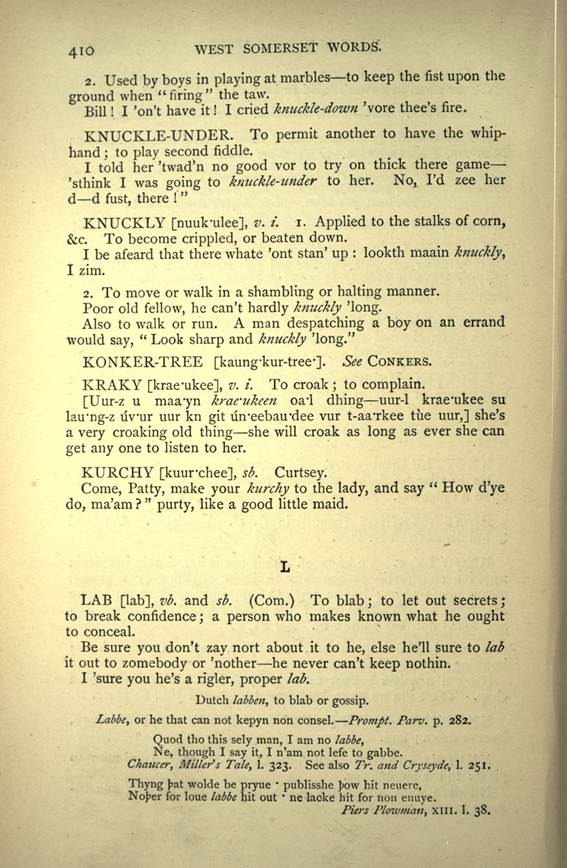
(delwedd B9270) (tudalen 410)
|
4io
WEST SOMERSET WORDS.
2. Used by boys in playing at marbles to keep
the fist upon the ground when
“firing" the taw.
Bill! I 'on't have it! I cried knuckle-down 'vore thee's fire.
KNUCKLE-UNDER. To permit another to have the whip-hand; to play second
fiddle.
I told her 'twad'n no good vor to try on thick there game 'sthink I was going to knuckle-under to
her. No, I'd zee her d dfust,
there!"
KNUCKLY [nuuk-ulee], v. f. i. Applied to the stalks of corn, &c. To become crippled, or beaten down.
I be afeard that there whate 'ont stan' up: lookth maain knuckly, I zim.
2. To move or walk in a shambling or halting manner. Poor old fellow, he can't hardly knuckly
'long. Also to walk or run. A man
despatching a boy on an errand would
say, “Look sharp and knuckly 'long."
KONKER-TREE [kaung-kur-tree 1 ]. See CONKERS.
KRAKY [krae'ukee], v. i. To croak; to complain.
[Uur-z u maa'yn krae'ukeen oa'l dhing uur-1 krae'ukee su lau'ng-z uvur uur kn git un'eebau'dee vur
t-aa'rkee tue uur,] she's a very
croaking old thing she will croak as long as ever she can get any one to listen to her.
KURCHY [kuurchee], sb. Curtsey.
Come, Patty, make your ktirchy to the lady, and say “How d'ye do, ma'am?” purty, like a good little maid.
LAB [lab], vb. and sb. (Com.) To blab; to let
out secrets; to break confidence; a
person who makes known what he ought
to conceal.
Be sure you don't zay nort about it to he, else he'll sure to lab it out to zomebody or 'nother he never
can't keep nothin.
I 'sure you he's a rigler, proper lab.
Dutch labben, to blab or gossip.
Labbe, or he that can not kepyn non consel. Prompt. Parv. p. 282.
Quod tho this sely man, I am no labbe,
Ne, though I say it, I n'am not lefe to gabbe. Chaucer, Miller's Tale, 1. 323. See also
Tr. and Cryseyde, \. 251.
Thyng J>at wolde be pryue publisshe >ow hit neuere, Nojjer for loue labbe hit out ne lacke hit
for non enuye.
Piers Plowman, xm. 1. 38.
|
|
|
|
|

(delwedd B9271) (tudalen 411)
|
WEST SOMERSET WORDS. 411
don't ye be a Labb o' tha Tongue in what cham a going to sey.
Ex. Scold. 1. 459.
LACE [lae'us], v. t. To flog with some weapon, as a strap or pliant cane. The word would not be used to imply a
beating with fists, stiff stick, or
cudgel. The idea of chastisement or correction is implied in this word. A mother would use it
to a child.
Let me zee thee do it agee-an! and zee nif I don't lace thy backside.
LACK [laak], v. t To be in need of; to fall short of. (The most usual word, especially in the hill
district.)
My Tommy was vourteen months old, lack a day (all but a day) when my man was a brought in dead a vailed
off a hay-rick.
I count you do lack vor ate some more beef an' pud den avore you'll be able vor t' an'le thick i. e. to
handle that tool.
I lacks, I want a thynge: I lacke a penne, jay faulte dune plume: I lacke nothyng, il ne me fault riens .
Palsgrave, p. 601.
I leue in to thi kepinge the v knifes, that bethe keperes of my dowter,
]>at hem want or lak nothing. Gesta
Roman, p. 140.
LACKY [laak'ee], v. i. To be wanting, or absent. Can er depend 'pon ee, eens you 'on't lacky
hon the time do come?
Nif tha com'st athert Rager Hosegood, tha wut lackee an overwhile avore
tha com'st hum. Ex. Scold. 1. 199.
LADE [lae'ud], v. t. i. To throw any liquid from one place or vessel to another by dipping some vessel
or ladle into it.
The water come in the back kitchen so vast as ever we could lade it out. (Always.)
LADYN', or lay water. Vatilo. Promp. Parv.
I laade water with a scoup or other thyng out of a dytche or pytte. Lade
this water out of this dytche. This
boye ladeth in water a pace. Palsgrave, p. 601.
To LADE (or draine) a river with pails, &c. Bacqueter, caqueter une
riviere.
Cotgrave (Sherwood).
Alsuo ase hit behouej) ofte ]>et ssip lhade out ]>et weter pet alneway
ge]> in.
Ayenbite of In ivy t, p. 178.
Like one that stands upon a promontory,
And spies a far-offshore where he would tread,
Wishing his foot were equal with his eye;
And chides the sea that sunders him from thence,
Saying he'll lade it dry to have his way. 3 Henry VI. III. ii.
2. To load;/./, [u-lae'udud], a-laded, not laden. [Naew doa'n-ee lae'ud aup dh-oa'l au\s
t-aevee,] now don't load up the old
horse too heavily.
LADYN', wythe byrdenys. Omistus, oneratus.
LADYN', or chargyn' wythe burdenys. Onero, sarcino. Promp. Parz 1 .
|
|
|
|
|

(delwedd B9272) (tudalen 412)
|
4 I2 WEST SOMERSET WORDS,
I lade, I charge a thyng with a bourden.
I wylle lade this carte and than I wytt come in to dynner. Palsgrave, p. 601.
And they laded their asses with corn and departed. Genesis xlii. 26.
LADE [lae-ud], sb. i. The framework or ladder which is hooked on to the front and back of a cart
or wagon, by means of which straw,
hay, faggots, or other light material may be piled up.
You can't do nort about car-rin' o' hay with thick wagin, 'cause there idn no lades to un.
2. That part of the side of a cart or wagon which projects outwards from the side over the wheel. A”
dung-butt” usually has no lades /. e.
it has only the upright sides.
[Toa'un niivur due* vur tu lae'ud dhik dhae'iir guurt dhing pun dhu wag-een, ee ul tae'ur dhu lae'iidz oa
un aul tue pees'ez,] it will never do
to load that great thing upon the wagon,” he” will “tear” the lades of it all
to pieces. The use of many tech. words
becomes confused this is one the part here described is properly a rave (q. v.).
LADE [lae-ud], sb. Person used depreciatingly of either sex nearly always qualified by purty. Pronun.
of lad.
Her's a purty old lade, her is, and no mistake; why, her'll d and b like any drag-oon.
He's another purty lade, let'n alone and zay nort, he'll put in 'bout of a two or dree bricks an hour. Said
of a lazy, drunken bricklayer. Same as
BLADE 2.
LADE-PAIL. See LATE-PAIL.
LADY [lae-udee], sb. A woman who can afford to live well without work.
Nif I was so well off s you be, I should be a lady. This is not to be confounded with a” real lady” i. e.
by birth and education.
LADY-BUG [lae-udee-buug]. | , . , ,. ,
LADY-COW [lae-udee-kaew]. j
LADY-DISH-WASH, LADY-WASH-DISH, LADY-DISHY-WASHY [dee-sh-wau'rsh,
wau'rsh-dee'sh, dee'shee-wau'rshee]. The
water-wagtail. See DISH-WASHER.
LADY-RED-TAIL [laendee-urd-taa-yul], sb. The Redstart (PImnicura rutidlla). The ordinary name
called also Fiery-tail
[vuyuree-taa'yul]. Redstart unknown.
LADY'S CUSHION [lae-udeez kuursheen], sb. Thrift. This or cushions the common name Armeria
vulgar.s.
LADY'S EAR-DROPS [lae'udeez yuur-draaps], sb. The common name for Fuschia.
|
|
|
|
|

(delwedd B9273) (tudalen 413)
|
WEST SOMERSET WORDS. 413
LADY'S FINGERS [lae-udeez ving-urz], sb. i. The common Orchis Orchis mascula.
2. Common foxglove Digitalis purpurea. Not so common as Snaps, Flops, Flap-dock, &c. This
flower and wild arum have perhaps more
names than any others. Very likely the latter is also called lady's fingers, but I have not
heard it.
LADY'S GARTERS [lae-udeez gaarturz]. The common garden striped ribbon grass. Digraphis, or
Phalaris arundinacea.
LADY'S KNIVES AND FORKS, i. Children are very fond of placing their hands in certain
positions, and changing them at each
couplet of the following:
Here's my Lady's knives and forks, and here's rny Lady's table; Here's my Lady's looking-glass, and here's
my Lady's cradle.
2. The club-moss Lycopodium clavatum. Very common on Dunkery and Porlock Hill.
LADY'S NAVEL [lae-udeez naa-vl, naa-ul], sb. The plant Cotyledon umbilicus.
LADY'S-SMOCK [lae-udee-smauk], sb. The cuckoo flower Cardamine pratensis. (Com.)
When daisies pied, and violets blue,
And lady-smocks all silver white, And
cuckoo-buds of yellow hue,
Do paint the meadows with delight.
. Love's Labour's Lost, V. ii. (Song.)
LADY'S THIMBLE [lae-udeez dhimvl], sb. The pretty blue flower campanula rotundifolia.
LAF [taa-f(t], v. t. and sb. i. Lath.
[Dree paewn u /tftf/naayulz,] three pounds of lath nails. I shan't be ready for you vore to-marra
mornin, I an't a finish laftin not
'eet; 'tis ever so vur over-n (the ceiling).
2. Same as LART, loft usually called cock-laf.
LAFTIN-HAMMER [laa-fteen-aanrur], sb. A peculiar hammer, joined to a small axe used by plasterers in
nailing on laths.
LAFTIN-NAILS [laa-fteen-naayulz], sb. A peculiar kind of nails used in nailing on laths by
plasterers; common lath-nails.
LAFTY [laa-ftee], v. t. To nail on laths for plastering. Our Jim's a good fellow to work, he'll
lafty vaster-n one here-n there. Who
can lafty 'pon they there crooked old rafters?
LAGLE [lae-ugl], sb. Label. (Com.)
There wad-n no mark 'pon the bottle, and I told-n to be sure-n
|
|
|
|
|

(delwedd B9274) (tudalen 414)
|
WEST SOMERSET WORDS.
put the lagle 'pon the laxitory; and
tidn my faut her-ve a tookt the
lotion, vor I could-n tell no difference.
LAKE [lae-uk], sb. Usually "lake of water"; a small running stream, as from a spring; a runnel. The word
is not applied to a large pond or
sheet of water, but always to running water. There are two hamlets in the parish of
Wellington, Bag/#; and Holy well Lake,
at both of which there is only a small running stream. At the latter, the Holywell is a spring rising
in the middle of the village, and
running out of a pipe, away by the roadside.
A very common direction is,” go on till you come to a lake o' water" /. e. a little running stream.
Running streams are of three kinds the smallest being a lake; a little larger, a small brook is a
"water" (y.v.)', a large stream
is a river. In this district all the streams are what are called stickle i. e. rapid-running and shallow,
except in pools.
Vrem rise to mouth there's lots o' lakes t
An' rivers zum that into'n vail,
Wher vish hurn'th up ta lie the'r spaan The Yaxty-water's best ev all.
Pulman, Rustic Sketches, The River Axe, p. 6.
In the following, /0&-ryftes must mean rifts or gullies worn by a lake or running stream.
J>e fox & ]>e folmarde to J?e fryth wynde}, Herttes to hyje he)>e, hare} to
gorste$, & lyoune^ & lebarde}
to J)e /tf/k-ryftes, Herne^ &
haueke} to ]>e hyje roche3.
Early Alliterative Poems, Cleanness, The Deluge, 1. 534.
LAM [laa'm], v. t. To thrash or beat, with or without instrument.
Mr. Bond catched the young osebird stealing apples, but he did-n summons-n tho, he pared-n down there
right, and, my eyes, nif he didn lam
un!
To LAM ME. Bastonner, battre, f rotter, estriller, fusliguer.
LAMMED. Bastonne, fustigue, frotte, estrille.
A LAMMING. Bastonnement. Cotgrave (Sherwood).
Vor es toz'd en, es lamb'd en, es lace'd en, &c. Ex. Scold. 1. 346.
LAMBS' TAILS [laanvz taa-yulz], sb. The catkins of willow and hazel.
LAMB-TONGUE [laanr-tuung], sb. i. The common hart's tongue fern Scolopendrium offidnarum. Usual
name.
2. A very common weed Chenopodium urbicum. (Always.)
LAMB-TOW [laanv-toa], sb. Lamb's wool when shorn. I count I've a got about o' vive pack (of
wool) 'thout the lamb-tow.
LAMENESS [lae'umnees], sb. Foot rot in sheep.
|
|
|
|
|
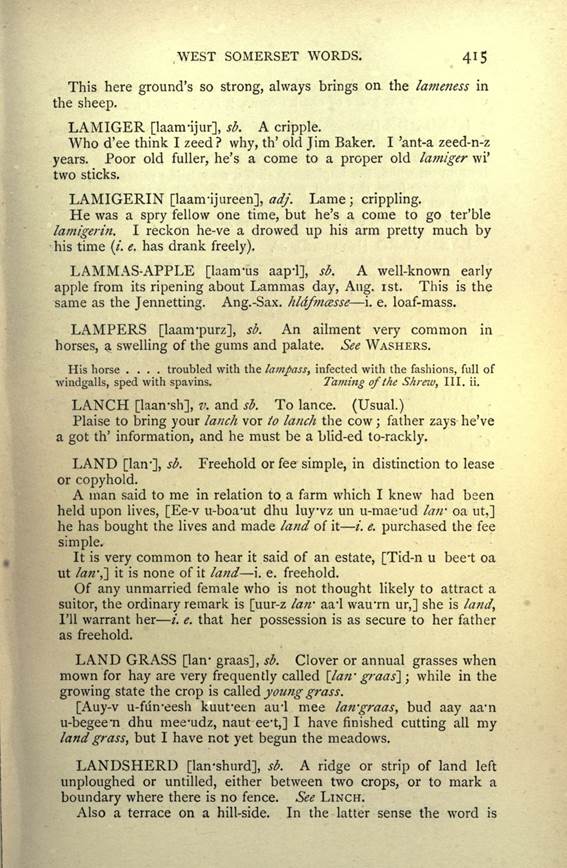
(delwedd B9275) (tudalen 415)
|
WEST SOMERSET WORDS. 415
This here ground's so strong, always brings on the lameness in the sheep.
LAMIGER [laam-ijur], sb. A cripple.
Who d'ee think I zeed? why, th' old Jim Baker. I 'ant-a zeed-n-z years. Poor old fuller, he's a come to a
proper old lamiger wi' two sticks.
LAMIGERIN [laanrijureen], adj. Lame; crippling.
He was a spry fellow one time, but he's a come to go ter'ble lamigerin. I reckon he-ve a drowed up his
arm pretty much by his time (/. e. has
drank freely).
LAMMAS-APPLE [laanvus aap-1], sb. A well-known early apple from its ripening about Lammas day,
Aug. ist. This is the same as the
Jennetting. Ang.-Sax. hldf masse i. e. loaf-mass.
LAMPERS [laanvpurz], sb. An ailment very common in horses, a swelling of the gums and palate.
See WASHERS.
His horse .... troubled with the lam-pass, infected with the fashions, full
of windgalls, sped with spavins.
Taming of the Shrew, III. ii.
LANCH [laan-sh], v. and sb. To lance. (Usual.) Plaise to bring your lanch vor to lanch the
cow; father zays he've a got th'
information, and he must be a blid-ed to-rackly.
LAND [Ian-], sb. Freehold or fee simple, in distinction to lease or copyhold.
A man said to me in relation to a farm which I knew had been held upon lives, [Ee-v u-boa'ut dhu luyvz
un u-mae'ud Ian' oa ut,] he has bought
the lives and made land of it i. e. purchased the fee simple.
It is very common to hear it said of an estate, [Tid-n u beet oa ut lan',~] it is none of it land i. e.
freehold.
Of any unmarried female who is not thought likely to attract a suitor, the ordinary remark is [uur-z Ian'
aa'l wairrn ur,] she is land, I'll
warrant her /'. e. that her possession is as secure to her father as freehold.
LAND GRASS [Ian* graas], sb. Clover or annual grasses when mown for hay are very frequently called \ -
lan ' graas]; while in the growing
state the crop is called young grass.
[Auy-v u-fun'eesh kuufeen au*l mee lan'graas, bud aay aa'n u-begee'n dhu mee-udz, naut ee%] I have
finished cutting all my land grass,
but I have not yet begun the meadows.
LANDSHERD [larrshurd], sb. A ridge or strip of land left unploughed or untilled, either between two
crops, or to mark a boundary where
there is no fence. See LINCH.
Also a terrace on a hill-side. In the latter sense the word is
|
|
|
|
|

(delwedd B9276) (tudalen 416)
|
41 6 WEST SOMERSET WORDS.
very rare in W. S., but in E. Som. and Dorset, where terraces are common on the sides of chalk downs, it is
the usual name.
LANDSIDE [larrzuyd], sb. Of a sull; an iron plate or shoe fastened to the breast of a plough on the
side which slides along against the
unploughed soil or land. It also forms the bed or bottom on which the implement slides, and
being renewable, takes off the wear
from the fixed parts. The landside is the part against which all the resistance of the raising and
turning of the sod presses. The share
is fixed to the” toe” of the landside.
LAND-YARD [lan-yaard], sb. A measure of length and of area: same as rod, pole, or perch, viz.
five and a half yards. Ordinarily this
measure or area is simply a yard, but when any confusion or mistake is likely to occur,
then land-yard is used. Allotments are
always let by the yard, T ^ of an acre. Applied to distance or length, it is in constant use
as the equivalent of J of a chain.
We hadn a-went no more'n two or dree Ian* -yard, hon off come the wheel, and there we was.
LANTERN-JAWED [lairturn-jaa'd], adj. Thin-faced, having hollow-looking cheeks. (Very com.)
Take an' bide 'ome an' mind thy own business, ya lantern-jawed old slatterpooch!
LAP [laap'], sb. Any weak beverage.
Call this here tay! I calls it lap. See FORBY, Gloss, of E. Anglia.
LAP [laap], v. t. To wrap, to fold.
I thort I wid'n lost 'n, zo I lap 'm up careful like, in my hangkecher.
Lappyn, or whappyn yn clo)?ys. Involvo. Promp. Parv,
To lappe; voluere. Cath. Ang. Plisse:
Plaited, foulded, lapped up. Cotgrave.
And whanne the bodi was takun, Joseph lappid it in a clene sendal, &
leide in his nevve biriel. Wiclif,
Matt. xxvn. 59.
I lappe this chylde well for the weather is colde.
Lappe this hoode aboute your heed. Palsgrave, p. 603.
and sy)>en alle )>yn o)>er lyme} lapped ful clene.
Early A I lit. Poems, Cleanness, 1. 175.
LAPFUL [laap-veol], sb. In several places on our hills are isolated heaps of stones, unlike any to be
found in the neighbour-hood. One of these is well known in the parish of
Winsford near Tarr-steps. It is a
large scattered heap chiefly of quartz boulders on the brow of a hill, and no stones of the
like formation are to be found
anywhere near. These heaps (one or two on the Brendon Hills) are known as” Devil's lapfith? and
it is believed that they
|
|
|
|
|
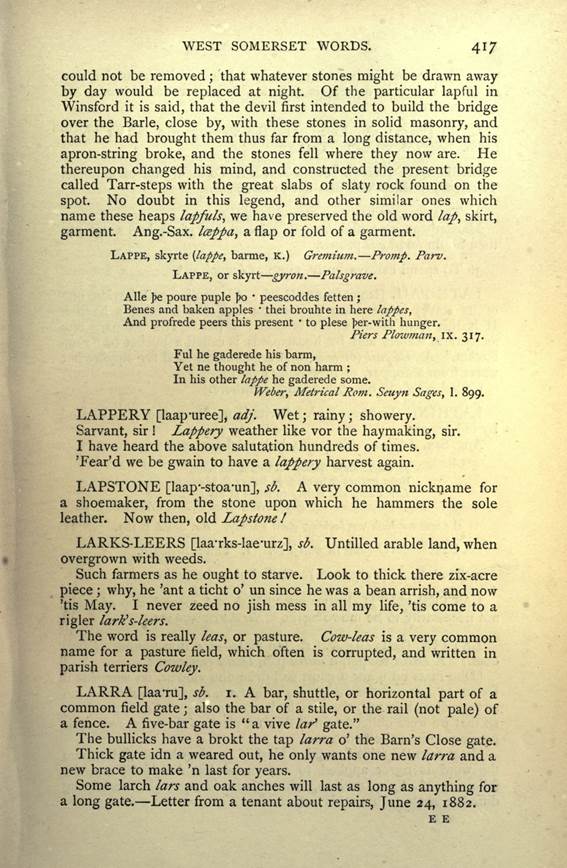
(delwedd B9277) (tudalen 417)
|
WEST SOMERSET WORDS. 417
could not be removed; that whatever stones might be drawn away by day would be replaced at night. Of the
particular lapful in Winsfcrd it is said,
that the devil first intended to build the bridge over the Barle, close by, with these stones
in solid masonry, and that he had
brought them thus far from a long distance, when his apron-string broke, and the stones fell
where they now are. He thereupon
changed his mind, and constructed the present bridge called Tarr-steps with the great slabs of
slaty rock found on the spot. No doubt
in this legend, and other similar ones which
name these heaps lapfuls, we have preserved the old word lap, skirt, garment. Ang.-Sax. lappa, a flap or fold of
a garment.
LAPPE, skyrte (lappe, barme, K.) Gremium. Promp. Parv. LAPPE, or skyrt gyron. Palsgrave.
Alle ]>e poure puple ]>o peescoddes fatten;
Benes and baken apples ' thei brouhte in here lappes,
And profrede peers this present ' to plese ]>er-with hunger.
Piers Plowman, IX. 317.
Ful he gaderede his barm,
Yet ne thought he of non harm;
In his other lappe he gaderede some.
Weber, Metrical Rom. Seuyn Sages, 1. 899.
LAPPERY [laap-uree], adj. Wet; rainy; showery. Sarvant, sir! Lappery weather like vor the
haymaking, sir. I have heard the above
salutation hundreds of times. 'Fear'd
we be gwain to have a lappery harvest again.
LAPSTONE [laap'-stoa-un], sb. A very common nickname for a shoemaker, from the stone upon which he
hammers the sole leather. Now then,
old Lapstone!
LARKS-LEERS [laa'rks-lae'urz], sb. Untilled arable land, when overgrown with weeds.
Such farmers as he ought to starve. Look to thick there zix-acre piece; why, he 'ant a ticht o' un since he
was a bean arrish, and now 'tis May. I
never zeed no jish mess in all my life, 'tis come to a rigler larKs-leers.
The word is really leas, or pasture. Cow-leas is a very common name for a pasture field, which often is
corrupted, and written in parish
terriers Cowley.
LARRA [laa-ru], sb. i. A bar, shuttle, or horizontal part of a common field gate; also the bar of a stile,
or the rail (not pale) of a fence. A
five-bar gate is "a vive lar' gate."
The bullicks have a brokt the tap larra o' the Barn's Close gate.
Thick gate idn a weared out, he only wants one new larra and a new brace to make 'n last for years.
Some larch lars and oak anches will last as long as anything for a long gate. Letter from a tenant about repairs,
June 24, 1882.
E E
|
|
|
|
|

(delwedd B9278) (tudalen 418)
|
41 8 WEST SOMERSET WORDS.
2. The moveable bar of a rack (q. v.) in which the under row of tenter-hooks is driven, is called a
larra, or rack-/0mz. See POLL SHEET.
LART [laart], sb. Loft. Also the flooring of a loft or upper room. See COCK-LART. TALLET.
LASH OUT [laarsh aewt], v. i. i. To kick, said of a horse. Take care o' thick 'oss, he's apt to larsh
out.
2. To swear, or use over strong language.
Maister's all very well, keep-m pleased, but when he's a zot up, then he do larsh out proper.
3. To spend extravagantly, same as launch out.
LATE PAIL [lae-ut paa-yul], sb. A peculiar pail, having one of its staves longer than the others, and
thus forming a handle. It is this form
alone which is called a pail. The ordinary one as used in stables and by housemaids is
called a bucket or” ring-bucket." A late-pail (or lade-pail] is commonly
used for dipping hot water from a
copper, or in making cider.
Called piggin in Shropshire and elsewhere.
LATHING [laa-theen], sb. Invitation. Rare, though still used by old people.
Ang.-Sax. Ionian. To invite, bid, send for, assemble.
]>e wayferande freke}, on fote & on hors, Bo]?e burnej & burdej, }>e better
& J>e wers, La\>ez hem alle
luflyly to lenge at my fest.
Early Alliterative Poems, Cleanness, 1. 79.
tha wut net look vor lathing, chell warndy. Ex. Scold. 1. 189. LATTER-END [laafur een], sb. i. Time of
death. 2. The seat. (Very com.) Called
also the tother end.
LATTER-MATH [laafur maa'th], sb. A second crop of grass, not necessarily to be mown again. 'See
AFTER-GRASS.
LATTIN [laafeen], sb. i. Tin plate/, e. iron tinned. (Very com.) A lattin tea-pot, a lattin pan,
lattin can'lestick.
[Dhu raats ud u aif u guurt oa-1 drue dhu vloo-ur, un wee wuz u foo'us tu naa-yul daewn u pees u laat'een,
eens dhai sheod-n km au-p-m dhu
chiinvur,] the rats had eaten a large hole in the floor, so that we were obliged to nail down a
piece of tin to prevent their coming
up into the bedroom.
Skeat says "a mixed metal, a kind of brass or bronze," but
here the word is never applied to any
metal but tin plate; and the following
M. E. quotations, where brass is. named as something different, seem to bear this out.
|
|
|
|
|
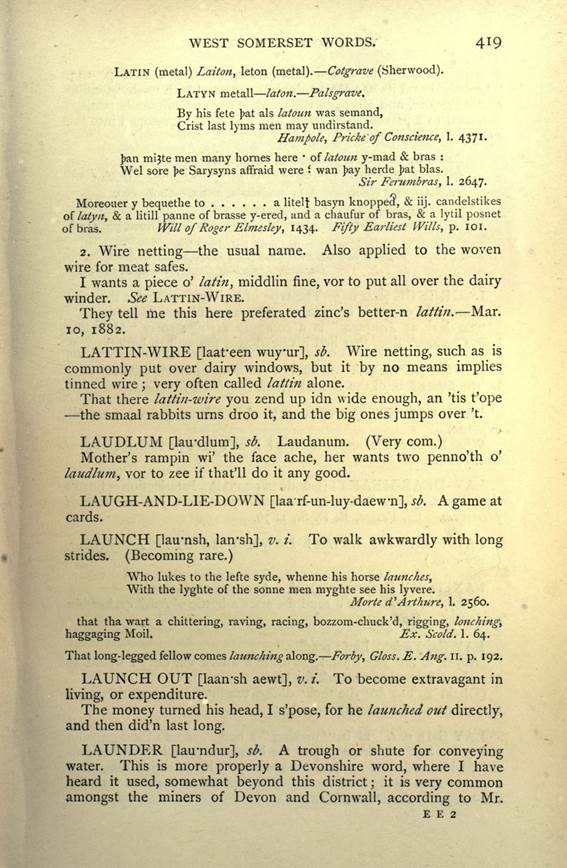
(delwedd B9279) (tudalen 419)
|
WEST
SOMERSET WORDS. 419
LATIN (metal) Laiton, leton (metal). Cotgrave (Sherwood). LATYN metall laton. Palsgrave.
By his fete ]>at als latonn was semand,
Crist last lyms men may undirstand.
Hampole, Pricke. of Conscience, 1. 4371.
]>an mi^te men many homes here ' of latoun y-mad & bras: Wei sore ]>e Sarysyns affraid were ' wan
]>ay herde J>at bias.
Sir Ferumbras, 1. 2647.
Moreouer y bequethe to a litelf basyn knoppeS, & iij. candelstikes
of latyn, & a litill panne of brasse y-ered, and a chaufur of bras, &
a lytil posnet of bras. Will of Roger
Elmesley, 1434. Fifty Earliest Wills, p. 101.
2. Wire netting the usual name. Also applied to the woven wire for meat safes.
I wants a piece o' latin, middlin fine, vor to put all over the dairy winder. See LATTIN-WIRE.
They tell me this here preferated zinc's better-n lattin. Mar. 10, 1882.
LATTIN-WIRE [laafeen wuyur], sb. Wire netting, such as is commonly put over dairy windows, but it by
no means implies tinned wire; very
often called lattin alone.
That there lattin-wire you zend up idn wide enough, an 'tis t'ope the smaal rabbits urns droo it, and the big
ones jumps over 't.
LAUDLUM [lau-dlum], sb. Laudanum. (Very com.)
Mother's rampin wi' the face ache, her wants two penno'th o' laudlum, vor to zee if that'll do it any
good.
LAUGH-AND-LIE-DOWN [laa'rf-un-luy-daewn], sb. A game at cards.
LAUNCH [lau*nsh, lan'sh], v. i. To walk awkwardly with long strides. (Becoming rare.)
Who lukes to the lefte syde, whenne his horse launches, With the lyghte of the sonne men myghte see
his lyvere.
Morte d'Arthure, 1. 2560.
that tha wart a chittering, raving, racing, bozzom-chuck'd, rigging,
lonching, haggaging Moil. Ex. Scold.
\. 64.
That long-legged fellow comes launching along. Forby, Gloss. E. Ang. n. p.
192.
LAUNCH OUT [laan-sh aewt], v. i. To become extravagant in living, or expenditure.
The money turned his head, I s'pose, for he launched out directly, and then did'n last long.
LAUNDER [lau-ndur], sb. A trough or shute for conveying water. This is more properly a Devonshire
word, where I have heard it used,
somewhat beyond this district; it is very common amongst the miners of Devon and Cornwall,
according to Mr.
E E 2
|
|
|
|
|
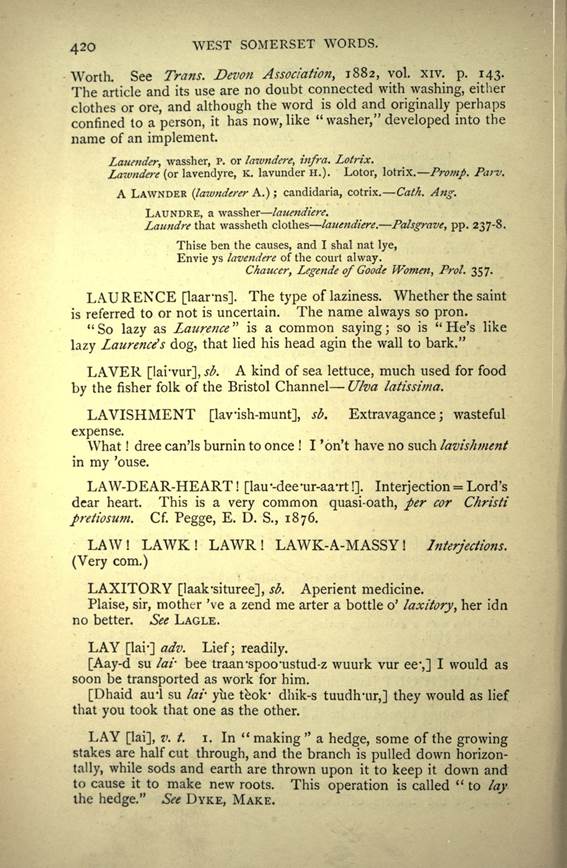
(delwedd B9280) (tudalen 420)
|
420 WEST SOMERSET WORDS.
Worth. See Trans. Devon Association, 1882, vol. xiv. p. 143. The article and its use are no doubt
connected with washing, either clothes
or ore, and although the word is old and originally perhaps confined to a person, it has now, like”
washer," developed into the name
of an implement.
Lauender, wassher, P. or lawndere, infra. Lotrix.
Laivndere (or lavendyre, K. lavunder H.). Lotor, lotrix. Promp. Parv.
A LAWNDER (lawnderer A.); candidaria, cotrix. Cath. Ang.
LAUNDRE, a wassher lauendiere.
Laundre that vvassheth clothes lauendiere. Palsgrave, pp. 237-8.
Thise ben the causes, and I shal nat lye,
Envie ys lavendere of the court alway.
Chaucer, Legende of Goode Women, Prol. 357.
LAURENCE [laarns]. The type of laziness. Whether the saint is referred to or not is uncertain. The
name always so pron.
"So lazy as Laurence" is a common saying; so is "He's
like lazy Laurence's dog, that lied
his head agin the wall to bark."
LAYER [lai'vur], sb. A kind of sea lettuce, much used for food by the fisher folk of the Bristol Channel
Ulva latissima.
LAVISHMENT [lavish-munt], sb. Extravagance; wasteful expense.
What! dree can'ls burnin to once! I 'on't have no such lavishment
in my 'ouse.
LAW-DEAR-HEART! [lau'-dee'ur-aa-rt!]. Interjection = Lord's dear heart. This is a very common
quasi-oath, per cor Christi pretiosum.
Cf. Pegge, E. D. S., 1876.
LAW! LAWK! LAWR! LAWK-A-MASSY! Interjections.
(Yery com.)
LAXITORY [laak-situree], sb. Aperient medicine. Plaise, sir, mother 've a zend me arter a
bottle o' laxitory, her idn no better.
See LAGLE.
LAY [lai-] adv. Lief; readily.
[Aay-d su lav bee traan-spoo'ustud-z wuurk vur ee 1 ,] I would as soon be transported as work for him.
[Dhaid au'l su lav yue teok' dhik-s tuudrrur,] they would as lief that you took that one as the other.
LAY [lai], v. t. i. In” making” a hedge, some of the growing stakes are half cut through, and the branch
is pulled down horizon-tally, while sods and earth are thrown upon it to keep
it down and to cause it to make new
roots. This operation is called” to lay
the hedge." See DYKE, MAKE.
|
|
|
|
|
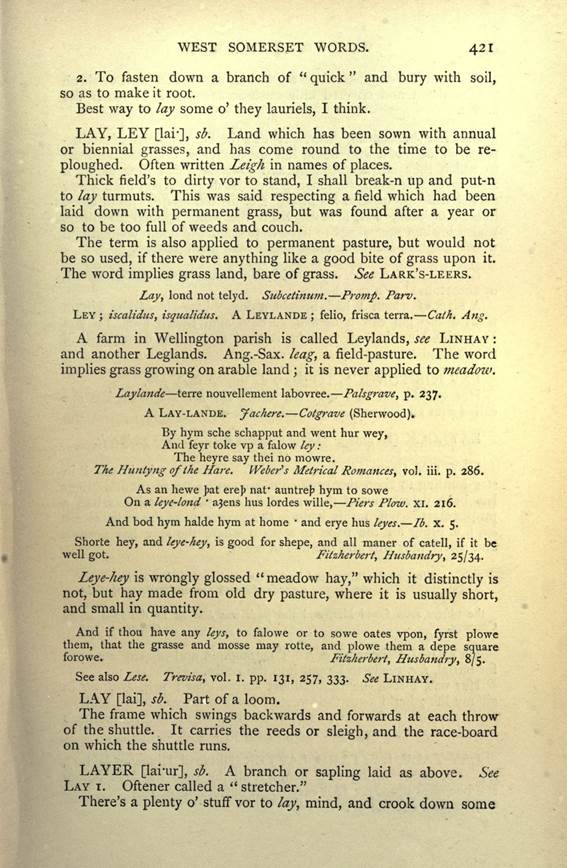
(delwedd B9281) (tudalen 421)
|
WEST SOMERSET WORDS. 421
2. To fasten down a branch of” quick” and bury with soil, so as to make it root.
Best way to lay some o' they lauriels, I think.
LAY, LEY [lai*], sb. Land which has been sown with annual or biennial grasses, and has come round to
the time to be re-ploughed. Often written Leigh in names of places.
Thick field's to dirty vor to stand, I shall break-n up and put-n to lay turmuts. This was said respecting a
field which had been laid down with
permanent grass, but was found after a year or so to be too full of weeds and couch.
The term is also applied to permanent pasture, but would not be so used, if there were anything like a
good bite of grass upon it. The word
implies grass land, bare of grass. See LARK'S-LEERS.
Lay, lond not telyd. Subcetinum. Promp. Parv.
LEY; iscalidus, isqualidus. A LEYLANDE; felio, frisca terra. Cath.
Ang.
A farm in Wellington parish is called Leylands, see LINHAY: and another Leglands. Ang.-Sax. leag, a
field-pasture. The word implies grass
growing on arable land; it is never applied to meadow.
Laylande terre nouvellement labovree. Palsgrave, p. 237. A LAY-LANDE. Jachere. Cotgrave (Sherwood).
By hym sche schapput and went hur wey,
And feyr toke vp a falow ley:
The heyre say thei no mowre. The
Huntyng of the Hare. Weber's Metrical Romances, vol. iii. p. 286.
As an hewe jjat ere}) naf auntrej? hym to sowe On a leye-lond ' a3ens hus lordes wille,
Piers Plow. xi. 2 1 6.
And bod hym halde hym at home and erye hus leyes.Ib. X. 5.
Shorte hey, and leye-hey, is good for shepe, and all maner of catell, if it
be well got. Fitzherbert, Husbandry,
25/34.
Leye-hey is wrongly glossed” meadow hay," which it distinctly is not, but hay made from old dry pasture,
where it is usually short, and small
in quantity.
And if thou have any leys, to falowe or to sowe oates vpon, fyrst plowe them, that the grasse and mosse may rotte,
and plowe them a depe square forowe.
Fitzherbert, Husbandry, 8/5.
See also Lese. Trevisa, vol. I. pp. 131, 257, 333. See LINHAY.
LAY [lai], sb. Part of a loom.
The frame which swings backwards and forwards at each throw of the shuttle. It carries the reeds or
sleigh, and the race-board on which
the shuttle runs.
LAYER [lai-ur], sb. A branch or sapling laid as above. See LAY i. Oftener called a”
stretcher." There's a plenty o'
stuff vor to lay, mind, and crook down some
|
|
|
|
|
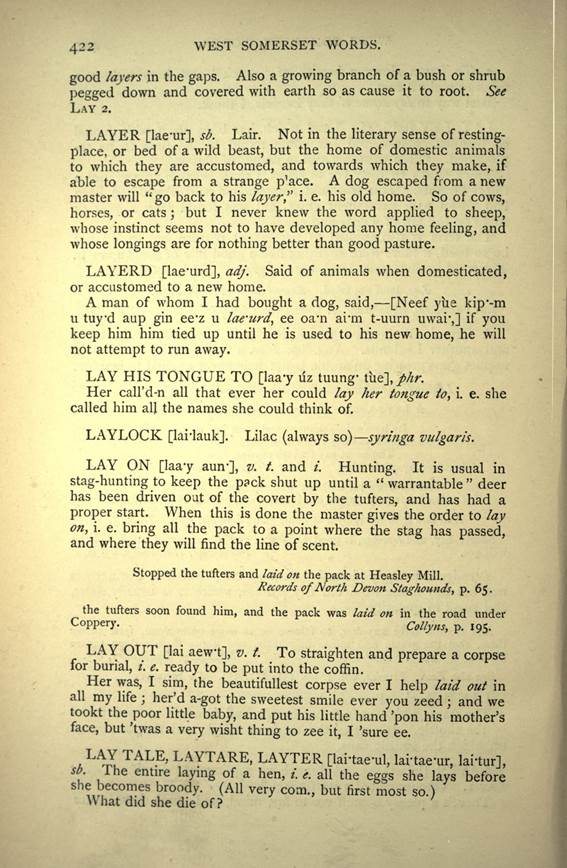
(delwedd B9282) (tudalen 422)
|
422 WEST SOMERSET WORDS.
good layers in the gaps. Also a growing branch of a bush or shrub pegged down and covered with earth so as
cause it to root. See LAY 2.
LAYER [lae'ur], sb. Lair. Not in the literary sense of resting-place, or bed
of a wild beast, but the home of domestic animals to which they are accustomed, and towards
which they make, if able to escape
from a strange p^ce. A dog escaped from a new
master will "go back to his layer? i. e. his old home. So of
cows, horses, or cats; but I never
knew the word applied to sheep, whose
instinct seems not to have developed any home feeling, and whose longings are for nothing better than
good pasture.
LAYERD [lae'urd], adj. Said of animals when domesticated, or accustomed to a new home.
A man of whom I had bought a dog, said, [Neef yue kip'-m u tuyd aup gin ee'z u lae'urd, ee oa*n arm
t-uurn uwai',] if you keep him him
tied up until he is used to his new home, he will not attempt to run away.
LAY HIS TONGUE TO [laay liz tuung - Her call'd-n all that ever her could lay
her tongue to, i. e. she called him
all the names she could think of.
LAYLOCK [larlauk]. Lilac (always sQ)syringa vulgar is.
LAY ON [laa-y auir], v. t. and /. Hunting. It is usual in stag-hunting to keep the pack shut up until
a” warrantable” deer has been driven
out of the covert by the tufters, and has had a proper start. When this is done the master
gives the order to lay on, i. e. bring
all the pack to a point where the stag has passed, and where they will find the line of scent.
Stopped the tufters and laid on the pack at Heasley Mill.
Records of North Devon Staghounds, p. 65.
the tufters soon found him, and the pack was laid on in the road under C PP er y- Collyns, p. 195.
-
LAY OUT [lai aewt], v. t. To straighten and prepare a corpse for burial, /. e. ready to be put into the
coffin.
Her was, I sim, the beautifullest corpse ever I help laid out in all my life; her'd a-got the sweetest smile
ever you zeed; and we tookt the poor
little baby, and put his little hand 'pon his mother's face, but 'twas a very wisht thing to zee
it, I 'sure ee.
LAY TALE, LAYTARE, LAYTER [lartae'ul, lartae'ur, lartur], Ihe entire laying of a hen, /. e. all the
eggs she lays before she becomes
broody. (All very com., but first most so )
What did she die of?
|
|
|
|
|
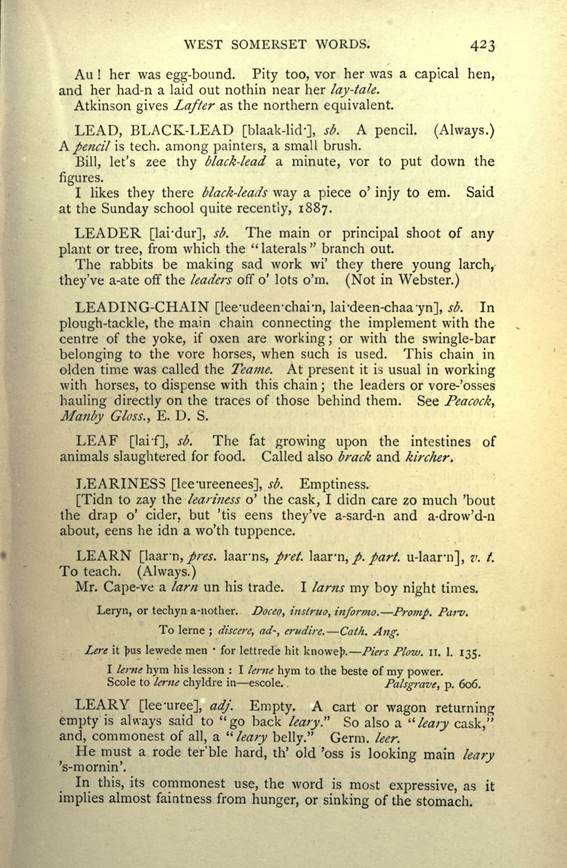
(delwedd B9283) (tudalen 423)
|
WEST SOMERSET WORDS. 423
Au! her was egg-bound. Pity too, vor her was a capical hen, and her had-n a laid out nothin near her
lay-tale. Atkinson gives Lafter as the
northern equivalent.
LEAD, BLACK-LEAD [blaak-lid-], sb. A pencil. (Always.) A pencil is tech. among painters, a small
brush.
Bill, let's zee thy black-lead a minute, vor to put down the figures.
I likes they there black-leads way a piece o' injy to em. Said at the Sunday school quite recently, 1887.
LEADER [lai'dur], sb. The main or principal shoot of any plant or tree, from which the” laterals”
branch out.
The rabbits be making sad work wi' they there young larch, they've a-ate off the leaders off o' lots
o'm. (Not in Webster.)
LEADING-CHAIN [lee'udeeircharn, lardeen-chaayn], sb. In plough-tackle, the main chain connecting
the implement with the centre of the
yoke, if oxen are working; or with the swingle-bar belonging to the vore horses, when such is
used. This chain in olden time was
called the Teame. At present it is usual in working with horses, to dispense with this chain;
the leaders or vore-'osses hauling
directly on the traces of those behind them. See Peacock, Manby Gloss., E. D. S.
LEAF [lai'f], sb. The fat growing upon the intestines of animals slaughtered for food. Called also
brack and kircher.
LEARINESS [lee'ureenees], sb. Emptiness.
[Tidn to zay the leanness o' the cask, I didn care zo much 'bout the drap o' cider, but 'tis eens they've
a-sard-n and a-drow'd-n about, eens he
idn a wo'th tuppence.
LEARN [laarn,/ry. laarns, pret. laarn, p. part, u-laarn], v. t. To teach. (Always.)
Mr. Cape-ve a larn un his trade. I larns my boy night times.
Leryn, or techyn a-nother. Doceo, instruo, in/or rno. Promp. Parv.
To lerne; discere, ad-, erudire. Cath. Ang.
Lere it ]ms lewede men for lettrede hit knowej). Piers Plow. n. 1.
135.
I lerne hym his lesson: I lerne hym to the beste of my power. Scole to lerne chyldre in escole. .
Palsgrave, p. 606.
LEARY [lee-uree], adj. Empty. A cart or wagon returning empty is always said to "go back
leary." So also a "leary cask," and, commonest of all, a” leary belly."
Germ. leer.
He must a rode ter'ble hard, th' old 'oss is looking main leary 's-mornin'.
In this, its commonest use, the word is most expressive, as it implies almost faintness from hunger, or
sinking of the stomach.
|
|
|
|
|
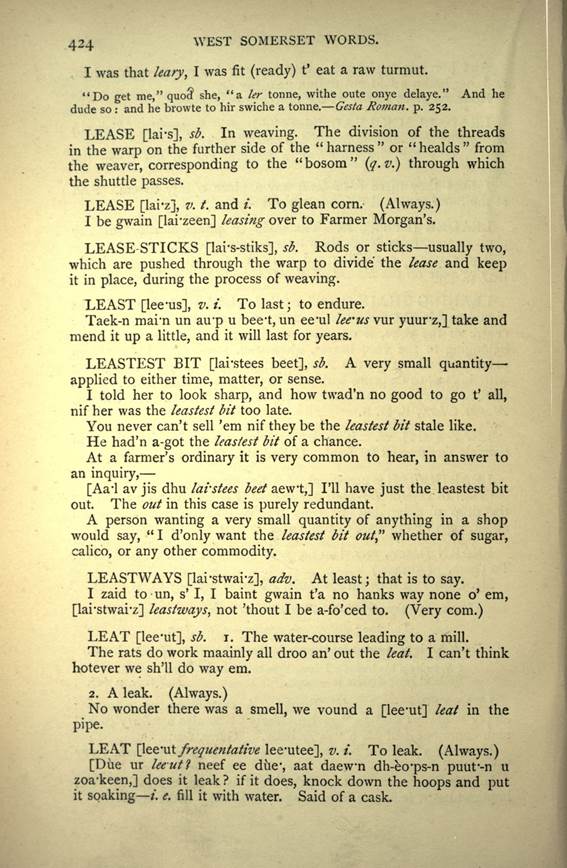
(delwedd B9284) (tudalen 424)
|
424 WEST SOMERSET WORDS.
I was that leary, I was fit (ready) t' eat a raw turmut.
"Do get me," quoS she, "a ler tonne, withe oute onye
delaye." And he dude so: and he
browte to hir swiche a tonne. Gesta Roman, p. 252.
LEASE [lai-s], sb. In weaving. The division of the threads in the warp on the further side of the
"harness" or "healds" from the weaver, corresponding to the
"bosom" (q. v.) through which
the shuttle passes.
LEASE [lai-z], v. t. and i. To glean corn. (Always.) I be gwain [lai'zeen] leasing over to
Farmer Morgan's.
LEASE-STICKS [lars-stiks], sb. Rods or sticks usually two, which are pushed through the warp to divide
the lease and keep it in place, during
the process of weaving.
LEAST [lee -us], v. i. To last; to endure.
Taek-n marn un au*p u bee't, un ee'ul lee'us vur yuurz,] take and mend it up a little, and it will last for
years.
LEASTEST BIT [lai'stees beet], sb. A very small quantity applied to either time, matter, or sense.
I told her to look sharp, and how twad'n no good to go t' all, nif her was the leastest bit too late.
You never can't sell 'em nif they be the leastest bit stale like.
He had'n a-got the leastest bit of a chance.
At a farmer's ordinary it is very common to hear, in answer to an inquiry,
[Aa*l av jis dhu lai'stees beet aewt,] I'll have just the leastest bit out. The out in this case is purely
redundant.
A person wanting a very small quantity of anything in a shop would say,” I d'only want the leastest bit
out" whether of sugar, calico, or
any other commodity.
LEASTWAYS [larstwai'z], adv. At least; that is to say. I zaid to un, s' I, I baint gwain t'a no
hanks way none o' em, [lai'stwai-z]
leastways, not 'thout I be a-fo'ced to. (Very com.)
LEAT [lee'ut], sb. i. The water-course leading to a mill. The rats do work maainly all droo an' out
the leaf. I can't think hotever we
sh'll do way em.
2. A leak. (Always.)
No wonder there was a smell, we vound a [lee-ut] leat in the pipe.
LEAT \\zw\. frequentative lee-utee], v. i. To leak. (Always.) [Due ur leeut? neef ee due-, aat daewn
dh-eo-ps-n puut'-n u
zoa-keen,] does it leak? if it does, knock down the hoops and put
it soaking/, e. fill it with water. Said of a cask.
|
|
|
|
|
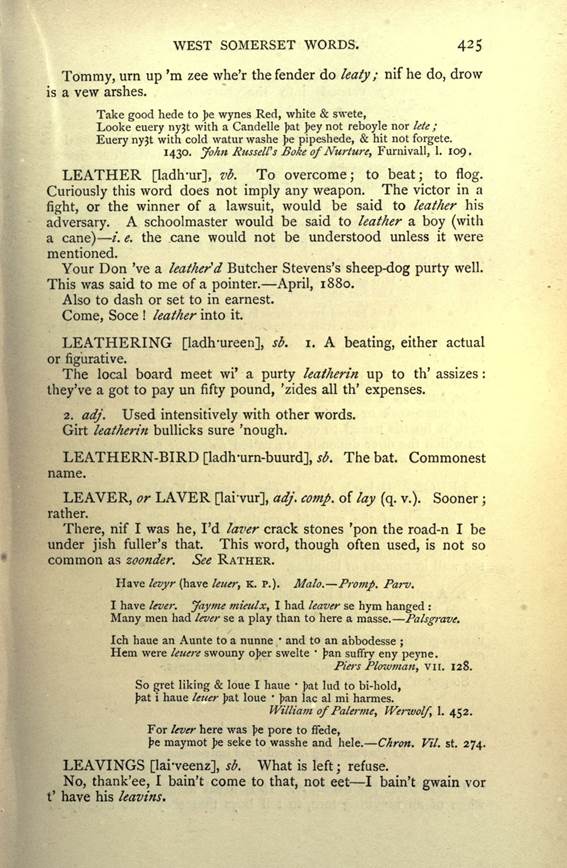
(delwedd B9285) (tudalen 425)
|
WEST SOMERSET WORDS. 425
Tommy, urn up 'm zee whe'r the fender do leaty; nif he do, drow is a vew arshes.
Take good hede to ]>e wynes Red, white & swete,
Looke euery ny$t with a Candelle >at >ey not reboyle nor lete;
Euery nyjt with cold watur washe J>e pipeshede, & hit not forgete.
1430. John Russell's Boke of Nurture, Furnivall, 1. 109.
LEATHER [ladrrur], vb. To overcome; to beat; to flog. Curiously this word does not imply any
weapon. The victor in a fight, or the
winner of a lawsuit, would be said to leather his adversary. A schoolmaster would be said to
leather a boy (with a cane) /. e. the
cane would not be understood unless it were
mentioned.
Your Don 've a leather d Butcher Stevens's sheep-dog purty well. This was said to me of a pointer. April,
1880.
Also to dash or set to in earnest.
Come, Soce! leather into it.
LEATHERING [ladh'ureen], sb. i. A beating, either actual or figurative.
The local board meet wi* a purty leatherin up to th' assizes: they've a got to pay un fifty pound, 'zides
all th' expenses.
2. adj. Used intensitively with other words.
Girt leatherin bullicks sure 'nough.
LEATHERN-BIRD [ladrrurn-buurd], sb. The bat. Commonest name.
LEAVER, or LAYER [lai'vur], adj. comp. of lay (q. v.). Sooner; rather.
There, nif I was he, I'd laver crack stones 'pon the road-n I be under jish fuller's that. This word, though
often used, is not so common as
zoonder. See RATHER.
Have levyr (have leuer, K. P.). Malo. Promp. Parv.
I have lever. Jayme mieulx, I had leaver se hym hanged: Many men had lever se a play than to here a
masse. Palsgrave.
Ich haue an Aunte to a nunne and to an abbodesse; Hem were leuere swouny o]>er swelte '
J>an suffry eny peyne.
Piers Plowman, vn. 128.
So gret liking & loue I haue ]>at lud to bi-hold, J?at i haue leuer J>at loue ]>an lac
al mi harmes.
William of Palerme, Werwolf, 1. 452.
For lever here was J>e pore to ffede,
J?e maymot jje seke to wasshe and hele. Chron. Vil. st. 274.
LEAVINGS [lai-veenz], sb. What is left; refuse. No, thank'ee, I bain't come to that, not
eet I bain't gwain vor t' have his
leavins.
|
|
|
|
|
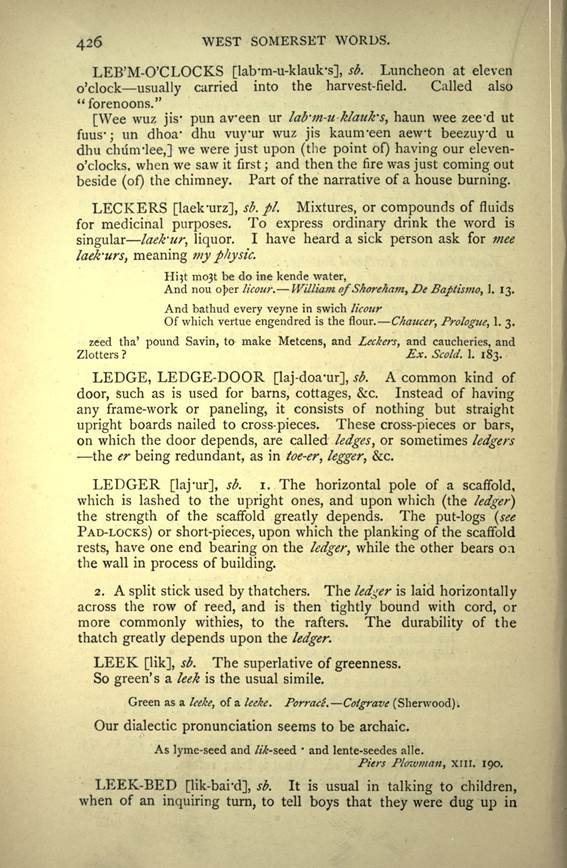
(delwedd B9286) (tudalen 426)
|
426 WEST SOMERSET WORDS.
LEB'M-O'CLOCKS [lab'm-u-klauk's], sb. Luncheon at eleven o'clock usually carried into the harvest-field.
Called also “forenoons."
[Wee wuz jis- pun aveen ur lab'm-u-klauk's, haun wee zee'd ut fuus-; un dhoa' dhu vuyur wuz jis kaunreen
aewt beezuyd u dhu chiinvlee,] we were
just upon (the point of) having our eleven-o'clocks, when we saw it first;
and then the fire was just coming out
beside (of) the chimney. Part of the narrative of a house burning.
LECKERS [laek'urz], sb. pi. Mixtures, or compounds of fluids for medicinal purposes. To express ordinary
drink the word is singular laek'ur,
liquor. I have heard a sick person ask for mee laek'urs, meaning my physic.
Hi}t mo3t be do ine kende water,
And nou o]>er licour. William of Shoreham, De Baptismo, 1. 13.
And bathud every veyne in swich licour
Of which vertue engendred is the flour. Chaucer, Prologue, 1. 3.
zeed tha' pound Savin, to make Metcens, and Leckers, and caucheries, and Zlotters? Ex. Scold. 1. 183.
LEDGE, LEDGE-DOOR [laj-doa'ur], sb. A common kind of door, such as is used for barns, cottages,
&c. Instead of having any
frame-work or paneling, it consists of nothing but straight upright boards nailed to cross-pieces.
These cross-pieces or bars, on which
the door depends, are called ledges, or sometimes ledgers the er being redundant, as in toe-er,
legger, &c.
LEDGER [laj-ur], sb. i. The horizontal pole of a scaffold, which is lashed to the upright ones, and
upon which (the ledger) the strength
of the scaffold greatly depends. The put-logs (see PAD-LOCKS) or short-pieces, upon which the
planking of the scaffold rests, have
one end bearing on the ledger, while the other bears 0:1 the wall in process of building.
2. A split stick used by thatchers. The ledger is laid horizontally across the row of reed, and is then tightly
bound with cord, or more commonly withies,
to the rafters. The durability of the
thatch greatly depends upon the ledger.
LEEK [lik], sb. The superlative of greenness.
So green's a leek is the usual simile.
Green as a leeke, of a leeke. Porrace.Cotgrave (Sherwood), Our dialectic pronunciation seems to be
archaic.
As lyme-seed and //-seed and lente-seedes alle.
Piers Plenum an, xni. 190.
LEEK-BED [lik-bard], sb. It is usual in talking to children, when of an inquiring turn, to tell boys
that they were dug up in
|
|
|
|
|
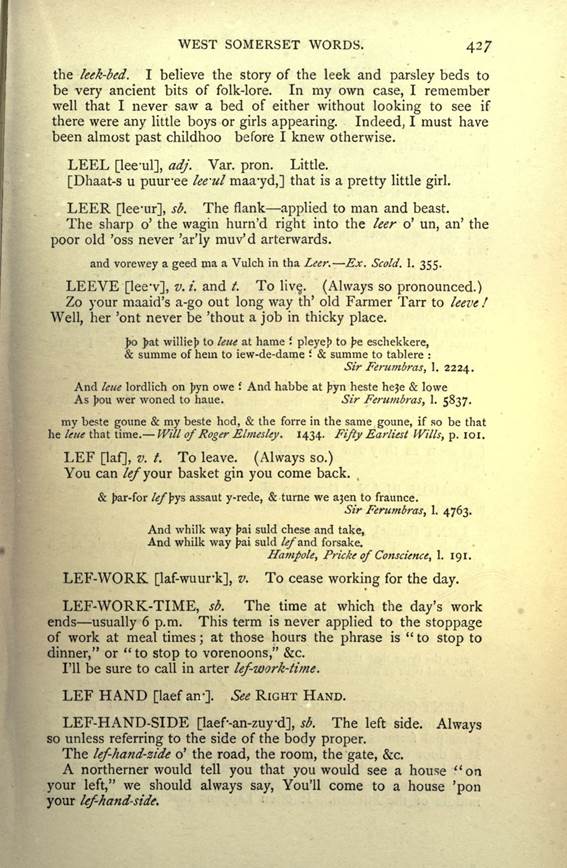
(delwedd B9287) (tudalen 427)
|
WEST SOMERSET WORDS. 427
the leek-bed. I believe the story of the leek and parsley beds to be very ancient bits of folk-lore. In my
own case, I remember well that I never
saw a bed of either without looking to see if
there were any little boys or girls appearing. Indeed, I must
have been almost past childhoo before
I knew otherwise.
LEEL [lee-ul], adj. Var. pron. Little.
[Dhaat-s u puuree lee'ul maayd,] that is a pretty little girl.
LEER [lee'tir], sb. The flank applied to man and beast. The sharp o' the wagin hurn'd right into
the leer o' un, an' the poor old 'oss
never 'ar'ly muv'd arterwards.
and vorewey a geed ma a Vulch in tha Leer. Ex. Scold, 1. 355.
LEEVE [lee'v], v. i. and /. To live,. (Always so pronounced.) Zo your maaid's a-go out long way th' old
Farmer Tarr to leeve / Well, her 'ont
never be 'thout a job in thicky place.
J)o Jjat willie]) to hue at hame ' pleye]) to j?e eschekkere, & summe of hem to iew-de-dame ' &
summe to tablere:
Sir Ferumbras, 1. 2224.
And hue lordlich on ]>yn owe ' And habbe at J?yn heste he^e &
lowe As ]>ou wer woned to haue. Sir
Ferumbras, 1. 5837.
my beste goune & my beste hod, & the forre in the same goune, if so
be that he If tie that time. Will of
Roger Elmesley. 1434. Fifty Earliest Wills, p. 101.
LEF [laf], v. t. To leave. (Always so.)
You can /^your basket gin you come back.
& J>ar-for lef\>ys assaut y-rede,
& turne we a3en to fraunce.
Sir Ferumbras, 1. 4763.
And whilk way J?ai suld chese and take,
And whilk way j>ai suld tefand forsake.
Hampole, Pricke of Conscience, 1. 191.
LEF-WORK [laf-wuurk], v. To cease working for the day.
LEF-WORK-TIME, sb. The time at which the day's work ends usually 6 p.m. This term is never
applied to the stoppage of work at
meal times; at those hours the phrase is” to stop to dinner," or” to stop to
vorenoons," &c.
I'll be sure to call in arter lef-work-time.
LEF HAND [laef an-]. See RIGHT HAND.
LEF-HAND-SIDE [laef'-an-zuyd], sb. The left side. Always so unless referring to the side of the body
proper.
The lef-hand-zide o' the road, the room, the gate, &c.
A northerner would tell you that you would see a house "on your left," we should always say,
You'll come to a house 'pon your
lef-hand-side.
|
|
|
|
|
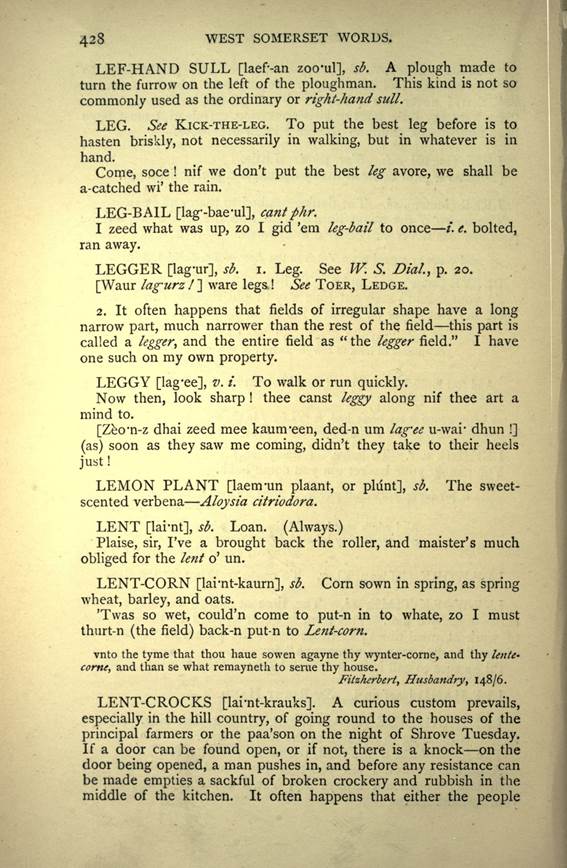
(delwedd B9288) (tudalen 428)
|
428 WEST SOMERSET WORDS.
LEF-HAND SULL [laef-an zoo-ul], sb. A plough made to turn the furrow on the left of the
ploughman. This kind is not so
commonly used as the ordinary or right-hand sull.
LEG. See KICK-THE-LEG. To put the best leg before is to hasten briskly, not necessarily in walking,
but in whatever is in hand.
Come, soce! nif we don't put the best leg avore, we shall be a-catched wi' the rain.
LEG-BAIL [lag'-bae-ul], cant phr.
I zeed what was up, zo I gid 'em leg-bail to once /. e. bolted, ran away.
LEGGER [lag-ur], sb. i. Leg. See W. S. Dial, p. 20. [Waur lag'urz! ] ware legs! See TOER,
LEDGE.
2. It often happens that fields of irregular shape have a long narrow part, much narrower than the rest of
the field this part is called a
legger, and the entire field as "the legger field." I have one such on my own property.
LEGGY [lag-ee], v. i. To walk or run quickly.
Now then, look sharp! thee canst leggy along nif thee art a mind to.
[Zeo'n-z dhai zeed mee kaunreen, ded-n um lag'ee u-wai* dhun!] (as) soon as they saw me coming, didn't
they take to their heels just!
LEMON PLANT [laenrun plaant, or plunt], sb. The sweet-scented verbena Aloysia
citrivdora.
LENT [lai-nt], sb. Loan. (Always.)
Plaise, sir, I've a brought back the roller, and maister's much obliged for the lent o' un.
LENT-CORN [larnt-kaurn], sb. Corn sown in spring, as spring wheat, barley, and oats.
'Twas so wet, could'n come to put-n in to whate, zo I must thurt-n (the field) back-n put-n to
Lent-corn.
vnto the tyme that thou haue sowen agayne thy wynter-corne, and thy
lente-corttf, and than se what remayneth to serue thy house.
Fitzherbert, Husbandry, 148/6.
LENT-CROCKS [lai'nt-krauks]. A curious custom prevails, especially in the hill country, of going
round to the houses of the principal
farmers or the paa'son on the night of Shrove Tuesday. If a door can be found open, or if not,
there is a knock on the door being
opened, a man pushes in, and before any resistance can be made empties a sackful of broken
crockery and rubbish in the middle of
the kitchen. It often happens that either the people
|
|
|
|
|
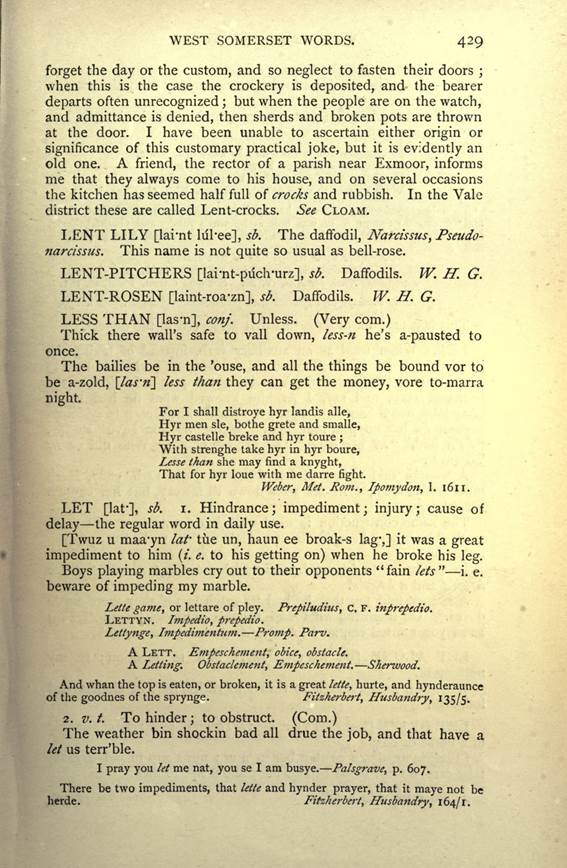
(delwedd B9289) (tudalen 429)
|
WEST SOMERSET WORDS. 429
forget the day or the custom, and so neglect to fasten their doors; when this is the case the crockery is
deposited, and the bearer departs
often unrecognized; but when the people are on the watch, and admittance is denied, then sherds and
broken pots are thrown at the door. I
have been unable to ascertain either origin or significance of this customary practical
joke, but it is evidently an old one.
A friend, the rector of a parish near Exmoor, informs me that they always come to his house, and
on several occasions the kitchen has
seemed half full of crocks and rubbish. In the Vale district these are called Lent-crocks. See
CLOAM.
LENT LILY [lai-nt luTee], sb. The daffodil, Narcissus, Pseudo-narcissus. This
name is not quite so usual as bell-rose.
LENT-PITCHERS [larnt-piiclvurz], sb. Daffodils. W. H. G. LENT-ROSEN [laint-roa-zn], sb. Daffodils.
W. H. G.
LESS THAN [las-n], conj. Unless. (Very com.)
Thick there wall's safe to vail down, less-n he's a-pausted to once.
The bailies be in the 'ouse, and all the things be bound vor to be a-zold, \las'ri\ less than they can get
the money, vore to-marra night.
For I shall distroye hyr landis alle,
Hyr men sle, bothe grete and smalle,
Hyr castelle breke and hyr toure;
With strenghe take hyr in hyr boure,
Lesse than she may find a knyght,
That for hyr loue with me darre fight.
Weber, Met. Rom., Ipomydon, 1. 1611.
LET [lat'], sb. i. Hindrance; impediment; injury; cause of delay the regular word in daily use.
[Twuz u maa-yn lat' tue un, haun ee broak-s lag',] it was a great impediment to him (/. e. to his getting on)
when he broke his leg.
Boys playing marbles cry out to their opponents "fain lets" i.
e. beware of impeding my marble.
Lette game, or lettare of pley. Prepiludius, C. F. inprepedio.
LETTYN. Impedio, prepedio.
Lettynge, Impedimentum. Promp. Parv.
A LETT. Empeschement, obice, obstacle.
A Letting. Obstaclement, Empeschement. Sherwood.
And whan the top is eaten, or broken, it is a great lette, hurte, and
hynderaunce of the goodnes of the
sprynge. Fitzherbert, Husbandry, 135/5.
2. v. t. To hinder; to obstruct (Com.)
The weather bin shockin bad all drue the job, and that have a let us terr'ble.
I pray you let me nat, you se I am busye. Palsgrave, p. 607.
There be two impediments, that lette and hynder prayer, that it maye not
be herde. Fitzherbert, Husbandry,
164/1.
|
|
|
|
|
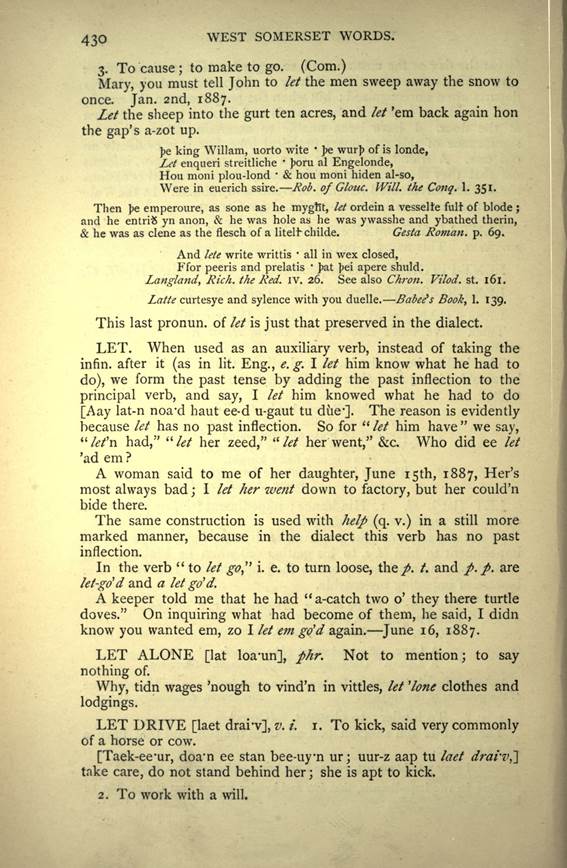
(delwedd B9290) (tudalen 430)
|
430 WEST SOMERSET WORDS.
3. To cause; to make to go. (Com.)
Mary, you must tell John to let the men sweep away the snow to once. Jan. 2nd, 1887.
Let the sheep into the gurt ten acres, and let 'em back again hon the gap's a-zot up.
)>e king Willam, uorto wite >e wur]> of is londe,
Let enqueri streitliche ' J>oru al Engelonde,
Hou moiii plou-lond & hou moni hiden al-so,
Were in euerich ssire. Rob. of Glouc. Will, the Conq. 1. 351.
Then J>e emperoure, as sone as he mygfit, let ordein a vesselte fult of
blode; and he entrifc yn anon, &
he was hole as he was ywasshe and ybathed therin, & he was as clene as the flesch of a
litelhchilde. Gesta Roman, p. 69.
And lete write writtis ' all in wex closed,
Ffor peeris and prelatis ' )>at |>ei apere shuld. Langland, Rich, the Red. IV. 26. See also
Chron. Vilod. st. 161.
Latte curtesye and sylence with you duelle. Babels Book, 1. 139. This last pronun. of let is just that
preserved in the dialect.
LET. When used as an auxiliary verb, instead of taking the infin. after it (as in lit. Eng., e. g. I
let him know what he had to do), we
form the past tense by adding the past inflection to the principal verb, and say, I let him knowed
what he had to do [Aay lat-n noa'd
haut ee-d u-gaut tu due']. The reason is evidently because let has no past inflection. So for”
let him have” we say, "/<?/'n
had," "let her zeed," "let her went," c. Who did ee
let 'ad em?
A woman said to me of her daughter, June i5th, 1887, Her's most always bad; I let her went down to
factory, but her could'n bide there.
The same construction is used with help (q. v.) in a still more marked manner, because in the dialect this
verb has no past inflection.
In the verb” to let go" i. e. to turn loose, the/. /. and p. p. are let-go 'd and a let go'd.
A keeper told me that he had "a-catch two o' they there turtle doves." On inquiring what had become
of them, he said, I didn know you
wanted em, zo I let em gcfd again. June 16, 1887.
LET ALONE [lat loa'un], phr. Not to mention; to say nothing of.
Why, tidn wages 'nough to vind'n in vittles, let 'lone clothes and lodgings.
LET DRIVE [laet drai'v], v. i. i. To kick, said very commonly of a horse or cow.
[Taek-ee'ur, doa'n ee stan bee-uyn ur; uur-z aap tu laet drai'v^\ take care, do not stand behind her; she is
apt to kick.
2. To work with a will.
|
|
|
|
|
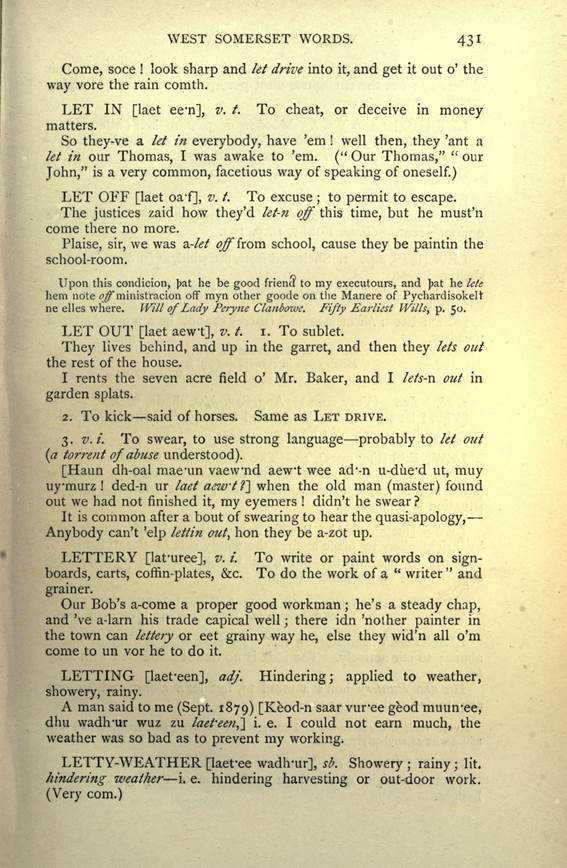
(delwedd B9291) (tudalen 431)
|
WEST SOMERSET WORDS. 43!
Come, soce! look sharp and let drive into it, and get it out o' the way vore the rain comth.
LET IN [laet ee*n], v. t. To cheat, or deceive in money matters.
So they-ve a let in everybody, have 'em! well then, they 'ant a let in our Thomas, I was awake to 'em.
(" Our Thomas,"“ our
John," is a very common, facetious way of speaking of oneself.)
LET OFF [laet oa'f], v. t. To excuse; to permit to escape.
The justices zaid how they'd let-n off this time, but he must'n come there no more.
Plaise, sir, we was &-let off from school, cause they be paintin the school-room.
Upon this condicion, ]>at he be good frtenS to my executours, and J>at
he lete hem note ^ministracion off myn
other goode on the Manere of Pychardisokelt
ne elles where. Will of Lady Peryne Clanbowc. Fifty Earliest Wills^ p.
5-
LET OUT [laet aewt], v. t. i. To sublet.
They lives behind, and up in the garret, and then they lets out the rest of the house.
I rents the seven acre field o' Mr. Baker, and I fets-n. out in garden splats.
2. To kick said of horses. Same as LET DRIVE.
3 . v. i. To swear, to use strong language probably to let out (a torrent of abuse understood).
[Haun dh-oal mae'un vaewnd aewt wee ad'-n u-due*d ut, muy uymurz! ded-n ur laet aewt?~\ when the old
man (master) found out we had not
finished it, my eyemers! didn't he swear?
It is common after a bout of swearing to hear the quasi-apology, Anybody can't 'elp let fin out, hon they be
a-zot up.
LETTERY [lafuree], v. i. To write or paint words on sign-boards, carts,
coffin-plates, &c. To do the work of a” writer” and grainer.
Our Bob's a-come a proper good workman; he's a steady chap, and 've a-larn his trade capical well;
there idn 'nother painter in the town
can lettery or eet grainy way he, else they wid'n all o'm come to un vor he to do it.
LETTING [laet'een], adj. Hindering; applied to weather, showery, rainy.
A man said to me (Sept. 1879) [Keod-n saar vuree geod muun'ee, dhu wadh-ur wuz zu laet'een,] i. e. I could
not earn much, the weather was so bad
as to prevent my working.
LETTY-WEATHER [laefee wadlvur], sb. Showery; rainy; lit. hindering weather i. e. hindering
harvesting or out-door work. (Very
com.)
|
|
|
|
|
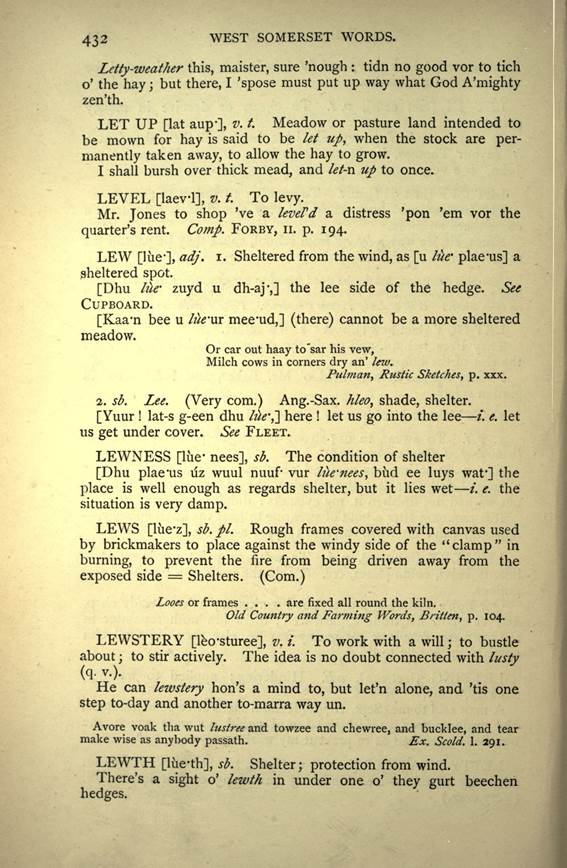
(delwedd B9292) (tudalen 432)
|
432 WEST SOMERSET WORDS.
Letty-weather this, maister, sure 'nough: tidn no good vor to tich o' the hay; but there, I 'spose must put up
way what God A'mighty zen'th.
LET UP [lat aupr], v. t. Meadow or pasture land intended to be mown for hay is said to be let up, when
the stock are permanently taken away, to allow the hay to grow.
I shall bursh over thick mead, and let-in, up to once.
LEVEL [laevl], v. t. To levy.
Mr. Jones to shop 've a leveTd a distress 'pon 'em vor the quarter's rent. Comp. FORBY, n. p. 194.
LEW [lue-], adj. i. Sheltered from the wind, as [u lue' plae'us] a .sheltered spot.
[Dhu lite- zuyd u dh-aj-,] the lee side of the hedge. See CUPBOARD.
[Kaa'n bee u lue'ui mee'ud,] (there) cannot be a more sheltered meadow.
Or car out haay to'sar his vew, Milch
cows in corners dry an' lew.
Pulman, Rustic Sketches, p. xxx.
2. sb. Lee. (Very com.) Ang.-Sax. hleo, shade, shelter. [Yuur! lat-s g-een dhu lue',~] here! let us
go into the lee /. e. let us get under
cover. See FLEET.
LEWNESS [hie- nees], sb. The condition of shelter
[Dhu plae'us liz wuul nuuf vur lue' nees, bud ee luys waf] the
place is well enough as regards shelter, but it lies wet /. e. the
situation is very damp.
LEWS [lue'z], sb. pi. Rough frames covered with canvas used by brickmakers to place against the windy
side of the "clamp" in
burning, to prevent the fire from being driven away from the exposed side = Shelters. (Com.)
Looes or frames .... are fixed all round the kiln.
Old Country and Farming Words, Britten, p. 104.
LEWSTERY [leo'sturee], v. i. To work with a will; to bustle about; to stir actively. The idea is no
doubt connected with lusty (q. v.).
He can lewstery hon's a mind to, but let'n alone, and 'tis one step to-day and another to-marra way un.
Avore voak tha wut histree and towzee and chewree, and bucklee, and tear make wise as anybody passath. Ex. Scold. 1.
291.
LEWTH [lue-th], sb. Shelter; protection from wind. There's a sight o' lewth in under one o'
they gurt beechen hedges.
|
|
|
|
|
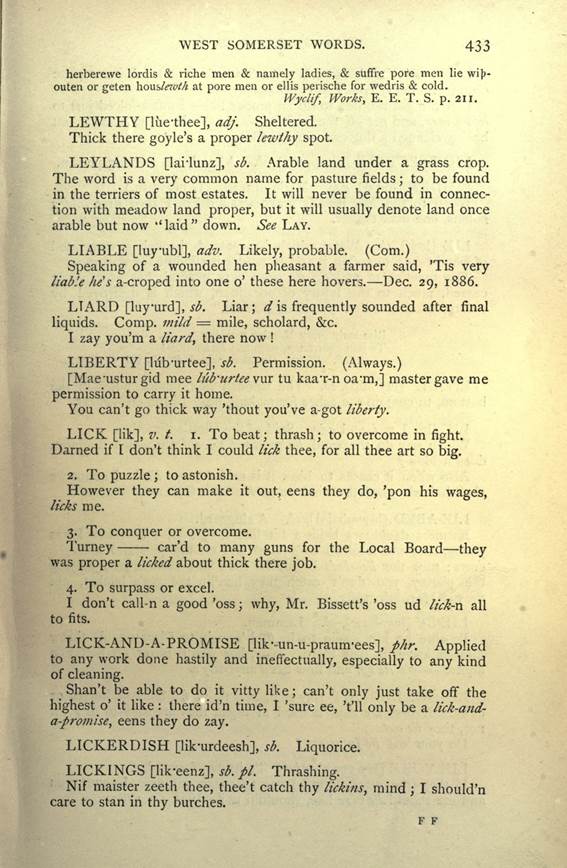
(delwedd B9293) (tudalen 433)
|
WEST SOMERSET WORDS. 433
herberewe lordis & riche men & namely ladies, & suffre pore men
lie wi]>-outen or geten hous/iw//* at pore men or ellis perische for
wedris & cold.
Wyclif, Works, E. E. T. S. p. 211.
LEWTHY [lue-tbee], adj. Sheltered.
Thick there goyle's a proper lewthy spot.
LEYLANDS [larlunz], sb. Arable land under a grass crop. The word is a very common name for pasture
fields; to be found in the terriers of
most estates. It will never be found in connection with meadow land proper,
but it will usually denote land once
arable but now u laid" down. See LAY.
LIABLE [luyubl], adv. Likely, probable. (Com.) Speaking of a wounded hen pheasant a farmer
said, 'Tis very liable he's a-croped
into one o' these here hovers. Dec. 29, 1886.
LTARD [luyurd], sb. Liar; d is frequently sounded after final liquids. Comp. mild mile, scholard,
&c. I zay you'm a Hard, there now!
LIBERTY [liib-urtee], sb. Permission. (Always.) [Mae'usturgid mee liib'urtee vur tu kaa'r-n
oa'm,] master gave me permission to
carry it home.
You can't go thick way 'thout you've a-got liberty.
LICK [lik], v. t. i. To beat; thrash; to overcome in fight. Darned if I don't think I could lick thee,
for all thee art so big.
2. To puzzle; to astonish.
However they can make it out, eens they do, 'pon his wages, licks me.
3. To conquer or overcome.
Turney - - car'd to many guns for the Local Board they was proper a licked about thick there job.
4. To surpass or excel.
I don't call-n a good 'oss; why, Mr. Bissett's 'oss ud lick-n. all to fits.
LICK-AND-A-PROMISE [lik- -un-u-praunrees], phr. Applied to any work done hastily and ineffectually,
especially to any kind of cleaning.
Shan't be able to do it vitty like; can't only just take off the highest o' it like: there id'n time, I
'sure ee, 't'll only be a lick-and-a-promise, eens they do zay.
LICKERDISH [lik-urdeesh], sb. Liquorice.
LICKINGS [lik-eenz], sb. pi. Thrashing.
Nif maister zeeth thee, thee't catch thy lickins, mind; I should'n care to stan in thy burches.
F F
|
|
|
|
|
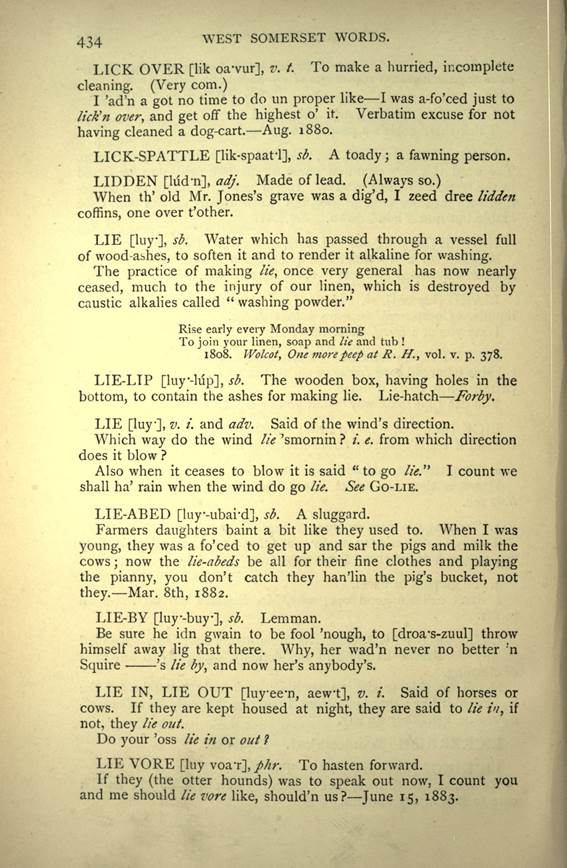
(delwedd B9294) (tudalen 434)
|
434 WEST SOMERSET WORDS.
LICK OVER [lik oa-vur], v. t. To make a hurried, incomplete cleaning. (Very com.)
I 'ad'n a got no time to do un proper like I was a-fo'ced just to licKn over, and get off the highest o' it.
Verbatim excuse for not having cleaned
a dog-cart. Aug. 1880.
LICK-SPATTLE [lik-spaaH], sb. A toady; a fawning person.
LIDDEN [liid-n], adj. Made of lead. (Always so.) When th' old Mr. Jones's grave was a dig'd,
I zeed dree lidden coffins, one over
t'other.
LIE [luy], sb. Water which has passed through a vessel full of wood-ashes, to soften it and to render
it alkaline for washing.
The practice of making //<?, once very general has now nearly ceased, much to the injury of our linen,
which is destroyed by caustic alkalies
called” washing powder."
Rise early every Monday morning
To join your linen, soap and lie and tub!
1808. Wolcot, One more peep at R. H., vol. v. p. 378.
LIE-LIP [luy-lup], sb. The wooden box, having holes in the bottom, to contain the ashes for making
lie. Lie-hatch Forby.
LIE [luy], v. i. and adv. Said of the wind's direction.
Which way do the wind lie 'smornin? i. e. from which direction does it blow?
Also when it ceases to blow it is said” to go lie. 11 I count we shall ha' rain when the wind do go lie. See
GO-LIE.
LIE-ABED [luy-ubai-d], sb. A sluggard.
Farmers daughters baint a bit like they used to. When I was young, they was a fo'ced to get up and sar
the pigs and milk the cows; now the
lie-abeds be all for their fine clothes and playing the pianny, you don't catch they han'lin
the pig's bucket, not they. Mar. 8th,
1882.
LIE-BY [luy-buy], sb. Lemman.
Be sure he idn gwain to be fool 'nough, to [droa's-zuul] throw himself away lig that there. Why, her wad'n
never no better; n Squire 's lie by,
and now her's anybody's.
LIE IN, LIE OUT [luyee-n, aewt], v. i. Said of horses or cows. If they are kept housed at night,
they are said to lie in, if not, they
lie out.
Do your 'oss lie in or out?
LIE VORE [luy voa'r],///r. To hasten forward.
If they (the otter hounds) was to speak out now, I count you and me should lie vore like, should'n us?
June 15, 1883.
|
|
|
|
|
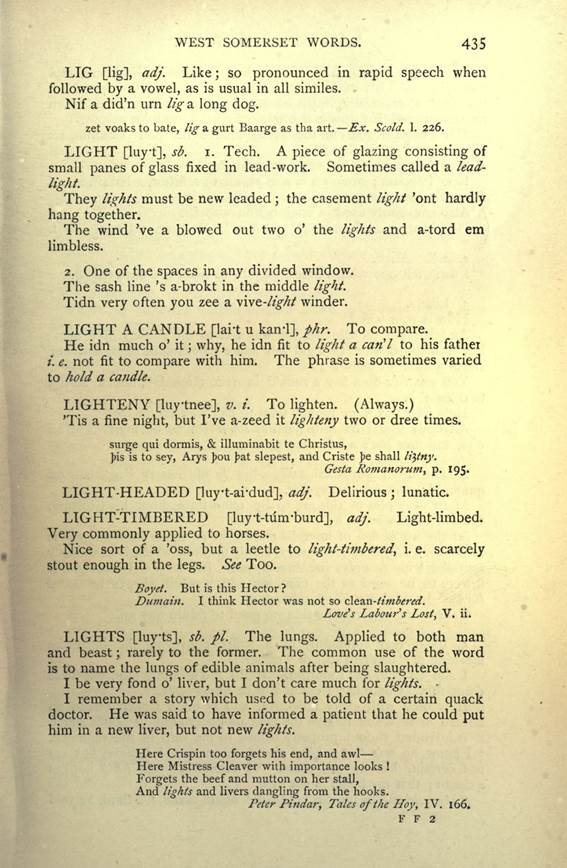
(delwedd B9295) (tudalen 435)
|
WEST SOMERSET WORDS. 435
LIG [lig], adj. Like; so pronounced in rapid speech when followed by a vowel, as is usual in all
similes. Nif a did'n urn lig a long
dog.
zet voaks to bate, lig a gurt Baarge as tha art. Ex. Scold. \. 226.
LIGHT [luyt], sb. i. Tech. A piece of glazing consisting of small panes of glass fixed in lead-work.
Sometimes called a lead-light.
They lights must be new leaded; the casement light 'ont hardly hang together.
The wind Ve a blowed out two o' the lights and a-tord em limbless.
2. One of the spaces in any divided window.
The sash line 's a-brokt in the middle light. Tidn very often you zee a vivt-light
winder.
LIGHT A CANDLE part u karri], phr. To compare.
He idn much o' it; why, he idn fit to light a can' I to his father /. e. not fit to compare with him. The
phrase is sometimes varied to hold a
candle.
LIGHTENY [luytnee], v. i. To lighten. (Always.)
'Tis a fine night, but I've a-zeed it lighteny two or dree times.
surge qui dormis, & illuminabit te Christus,
J)is is to sey, Arys )>ou J?at slepest, and Criste )>e shall Ityny.
Gesta Romanorum, p. 195.
LIGHT-HEADED puyt-ardud], adj. Delirious; lunatic.
LIGHT-TIMBERED [luyt-tuirrburd], adj. Light-limbed. Very commonly applied to horses.
Nice sort of a 'oss, but a leetle to light-timbered, i. e. scarcely stout enough in the legs. See Too.
Boyet. But is this Hector?
Dumain. I think Hector was not so clean- timbered.
Lovers Labour's Lost, V. ii.
LIGHTS [luyts], sb. pi. The lungs. Applied to both man and beast; rarely to the former. The common
use of the word is to name the lungs
of edible animals after being slaughtered.
I be very fond o' liver, but I don't care much for lights. I remember a story which used to be told of
a certain quack doctor. He was said to
have informed a patient that he could put
him in a new liver, but not new lights.
Here Crispin too forgets his end, and awl
Here Mistress Cleaver with importance looks! Forgets the beef and mutton on her
stall, And lights and livers dangling
from the hooks.
Peter Pindar, Talcs of the Hoy, IV. 166.
F F 2
|
|
|
|
|
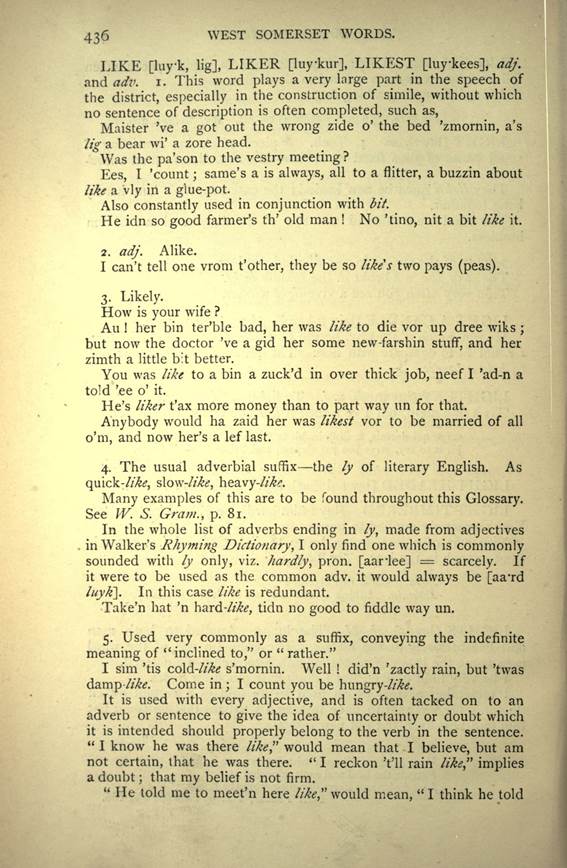
(delwedd B9296) (tudalen 436)
|
43<
LIKE [luyk, lig], LIKER [luykur], LIKEST [luykees], adj. and adv. i. This word plays a very large
part in the speech of the district,
especially in the construction of simile, without which no sentence of description is often
completed, such as,
Maister Ve a got out the wrong zide o' the bed 'zmornin, a's lig a bear \vi' a zore head.
Was the pa'son to the vestry meeting?
Ees, I 'count; same's a is always, all to a flitter, a buzzin about like a vly in a glue-pot.
Also constantly used in conjunction with bit.
He idn so good farmer's th' old man! No 'tino, nit a bit like it.
2. adj. Alike.
I can't tell one vrom t'other, they be so likes two pays (peas).
3. Likely.
How is your wife?
Au! her bin ter'ble bad, her was like to die vor up dree wiks; but now the doctor Ve a gid her some
new-farshin stuff, and her zimth a
little bit better.
You was like to a bin a zuck'd in over thick job, neef I 'ad-n a told 'ee o' it.
He's liker fax more money than to part way un for that.
Anybody would ha zaid her was likest vor to be married of all o'm, and now her's a lef last.
4. The usual adverbial suffix the ly of literary English. As
Many examples of this are to be found
throughout this Glossary. See W. S.
Gram., p. 81.
In the whole list of adverbs ending in ly, made from adjectives in Walker's Rhyming Dictionary, I only find
one which is commonly sounded with ly
only, viz. hardly, pron. [aarlee] = scarcely. If it were to be used as the common adv. it
would always be [aa*rd luyk']. In this
case like is redundant.
Take'n hat 'n hard-//fo, tidn no good to fiddle way un.
5. Used very commonly as a suffix, conveying the indefinite meaning of” inclined to," or”
rather."
I sim 'tis cold-//fo s'mornin. Well! did'n 'zactly rain, but 'twas damp-//fo. Come in; I count you be
hungry-//^?.
It is used with every adjective, and is often tacked on to an adverb or sentence to give the idea of
uncertainty or doubt which it is
intended should properly belong to the verb in the sentence. “I know he was
there like" would mean that I believe, but am not certain, that he was there.” I reckon
't'll rain like," implies a
doubt; that my belief is not firm.
" He told me to meet'n here like" would mean,” I think he told
|
|
|
|
|
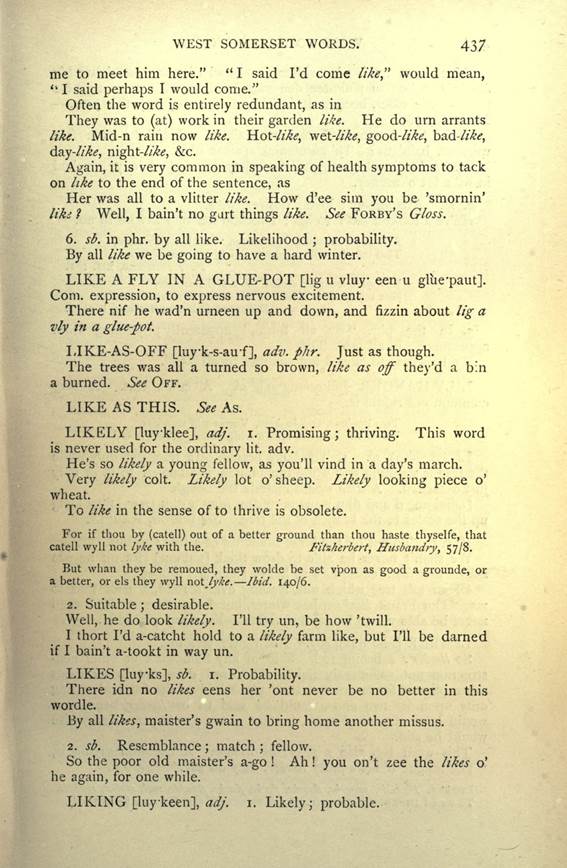
(delwedd B9297) (tudalen 437)
|
WEST SOMERSET WORDS. 437
me to meet him here."“ I said I'd come like" would mean, <k I said perhaps I would come."
Often the word is entirely redundant, as in
They was to (at) work in their garden like. He do urn arrants like. Mid-n rain now like. Hot-//><?,
wet-//&?, good-like, bad-tike,
day-tike, night-///<?, &c.
Again, it is very common in speaking of health symptoms to tack on like to the end of the sentence, as
Her was all to a vlitter like. How d'ee si in you be 'smornin' liki? Well, I bain't no gart things like.
See FORBY'S Gloss.
6. sb. in phr. by all like. Likelihood; probability. By all like we be going to have a hard
winter.
LIKE A FLY IN A GLUE-POT [lig u vluy een u glue-paut]. Com. expression, to express nervous
excitement.
There nif he wad'n urneen up and down, and fizzin about lig a vfy in a glue-pot.
LIKE-AS-OFF [luyk-s-airf], adv. phr. Just as though. The trees was all a turned so brown, like
as off they'd a bin a burned. See OFF.
LIKE AS THIS. See As.
LIKELY [luyklee], adj. i. Promising; thriving. This word is never used for the ordinary lit. adv.
He's so likely a young fellow, as you'll vind in a day's march.
Very likely colt. Likely lot o' sheep. Likely looking piece o' wheat.
To like in the sense of to thrive is obsolete.
For if them by (catell) out of a better ground than thou haste thyselfe,
that catell wyll not lyke with the.
Fitzherbert, Husbandry, 57/8.
But whan they be remoued, they wolde be set vpon as good a grounde, or a better, or els they wyll notjyke. Ibid.
140/6.
2. Suitable; desirable.
Well, he do look likely. I'll try un, be how 'twill. I thort I'd a-catcht hold to a likely farm
like, but I'll be darned if I bain't
a-tookt in way un.
LIKES [luyks], sb. i. Probability.
There idn no likes eens her 'ont never be no better in this wordle.
By all likes, maister's gwain to bring home another missus.
2. sb. Resemblance; match; fellow.
So the poor old maister's a-go! Ah! you on't zee the likes o' he again, for one while.
LIKING [luykeen], adj. i. Likely; probable.
|
|
|
|
|
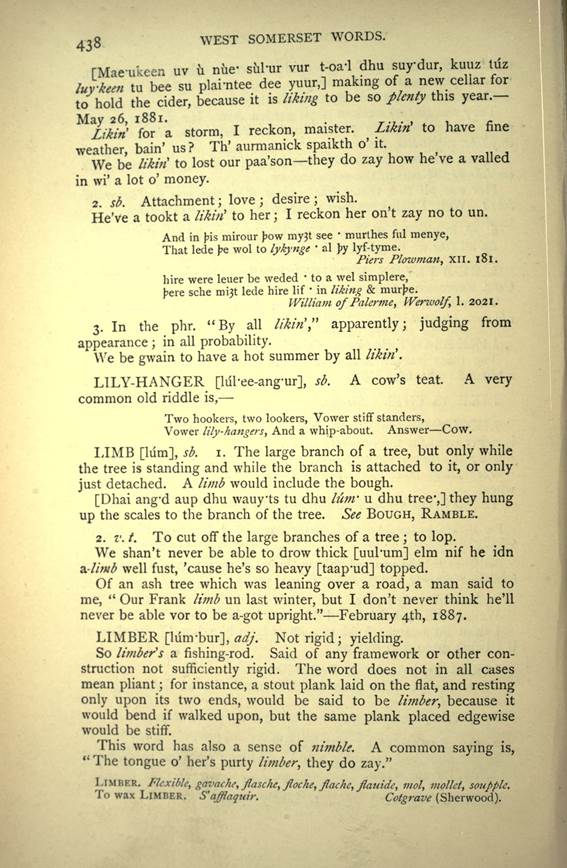
(delwedd B9298) (tudalen 438)
|
WEST SOMERSET WORDS.
[Mae-ukeen uv u nue- sul'ur vur t-oa'l dhu suydur, kuuz tiiz lurkeen tu bee su plarntee dee yuur,]
making of a new cellar for to hold the
cider, because it is liking to be so plenty this year.-
Mav 26, 1881.
Likiri for a storm, I reckon, maister. Likiri to have fine weather, bain' us? Th' aurmanick spaikth o'
it
We be likiri to lost our paa'son they do zay how he ve a vailed in wi' a lot o' money.
2 sb. Attachment; love; desire; wish.
He've a tookt a likiri to her; I reckon her on't zay no to un. And in bis mirour bow my}t see murthes ful
menye, That lede be wol to lykynge '
al >y lyf-tyme.
Piers Plowman, xi I. 181.
hire were leuer be weded to a wel simplere,
bere sche mi3t lede hire lif ' in liking & murbe.
William of Palerme, Werwolf, 1. 2021.
3. In the phr. "By all likiri? apparently; judging from appearance; in all probability.
We be gwain to have a hot summer by all likiri.
LILY-HANGER [luTee-ang-ur], sb. A cow's teat. A very common old riddle is,
Two hookers, two lookers, Vower stiff standers,
Vower lily-hangers, And a whip-about. Answer Cow.
LIMB [Mm], sb. i. The large branch of a tree, but only while the tree is standing and while the branch
is attached to it, or only just
detached. A limb would include the bough.
[Dhai ang-d aup dhu wauyts tu dhu him' u dhu tree',] they hung up the scales to the branch of the tree.
See BOUGH, RAMBLE.
2. v. t. To cut off the large branches of a tree; to lop.
We shan't never be able to drow thick [uul'um] elm nif he idn &-limb well fust, 'cause he's so heavy
[taap'ud] topped.
Of an ash tree which was leaning over a road, a man said to me,” Our Frank limb un last winter, but I
don't never think he'll never be able
vor to be a-got upright." February 4th, 1887.
LIMBER [liinrbur], adj. Not rigid; yielding.
So limber's a fishing-rod. Said of any framework or other construction not
sufficiently rigid. The word does not in all cases mean pliant; for instance, a stout plank
laid on the flat, and resting only
upon its two ends, would be said to be limber, because it would bend if walked upon, but the same
plank placed edgewise would be stiff.
This word has also a sense of nimble. A common saying is, “The tongue o' her's
purty litnber, they do zay."
I.IMHKR. Flexibly gavache, flasche, floche, fiache, fiauide, mol, mollct,
soupple. To wax LIMBER. Safflaquir.
Cotgrave (Sherwood).
|
|
|
|
|
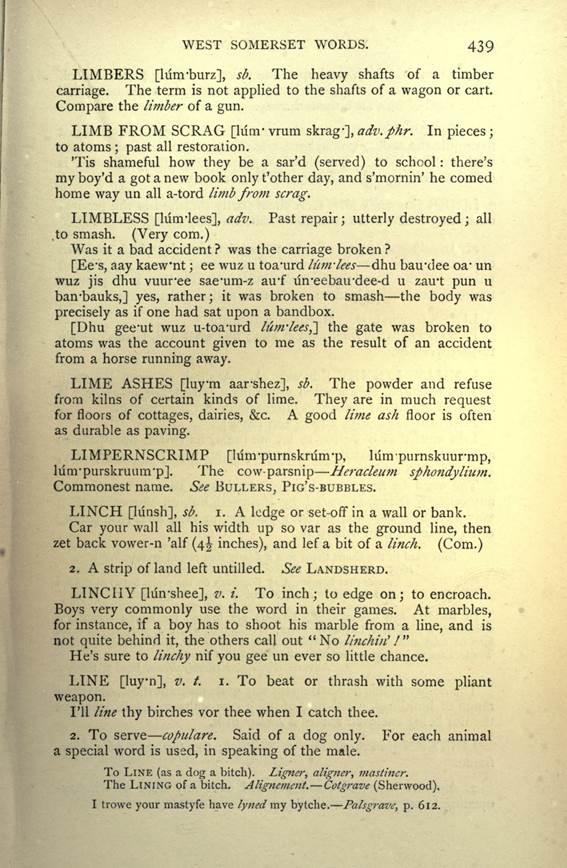
(delwedd B9299) (tudalen 439)
|
WEST SOMERSET WORDS. 439
LIMBERS [lurrrburz], sb. The heavy shafts of a timber carriage. The term is not applied to the
shafts of a wagon or cart. Compare the
limber of a gun.
LIMB FROM SCRAG [htm- vrum skrag-], adv.phr. In pieces; to atoms; past all restoration.
Tis shameful how they be a sar'd (served) to school: there's my boy'd a got a new book only t'other day,
and s'mornin' he corned home way un
all a-tord limb from scrag.
LIMBLESS [kirn-lees], adv. Past repair; utterly destroyed; all ,to smash. (Very com.)
Was it a bad accident? was the carriage broken?
[Ee - s, aay kaew'nt; ee wuz u toa'urd luwlees dhu bairdee oa* un wuz jis dhu vuuree sae'um-z au'f
un'eebairdee-d u zau't pun u
ban-bauks,] yes, rather; it was broken to smash the body was precisely as if one had sat upon a bandbox.
[Dhu gee'ut wuz u-toa'urd liim'lees,~\ the gate was broken to atoms was the account given to me as the
result of an accident from a horse
running away.
LIME ASHES [luym aarshez], sb. The powder and refuse from kilns of certain kinds of lime. They
are in much request for floors of
cottages, dairies, &c. A good lime ash floor is often as durable as paving.
LIMPERNSCRIMP [liinvpurnskrunrp, lunrpurnskuurmp, lum-purskruunvp]. The cow-parsnip Heracleum
sphondylium. Commonest name. See
BULLERS, PIG'S-BUBBLES.
LINCH [liinsh], sb. i. A ledge or set-off in a wall or bank. Car your wall all his width up so var as
the ground line, then zet back vower-n
'alf (4^ inches), and lef a bit of a linch. (Com.)
2. A strip of land left untilled. See LANDSHERD.
LINCIIY [liiirshee], v. i. To inch; to edge on; to encroach. Boys very commonly use the word in their
games. At marbles, for instance, if a
boy has to shoot his marble from a line, and is not quite behind it, the others call out
"No linchin'!"
He's sure to linchy nif you gee un ever so little chance.
LINE [luyn], v. t. i. To beat or thrash with some pliant weapon.
I'll line thy birches vor thee when I catch thee.
2. To serve copulare. Said of a dog only. For each animal a special word is used, in speaking of the
male.
To LINE (as a dog a bitch). Ligner, aligner^ mastincr. The LINING of a bitch. Alignement.Cotgrave
(Sherwood),
I trowe your mastyfe have lyned my bytche. Palsgrave, p. 612.
|
|
|
|
|
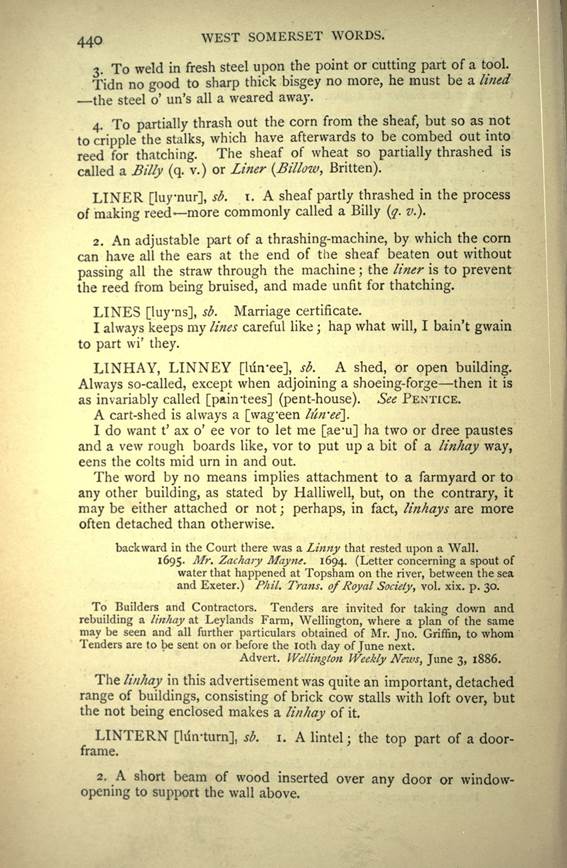
(delwedd B9300) (tudalen 440)
|
440 WEST SOMERSET WORDS.
3. To weld in fresh steel upon the point or cutting part of a tool. Tidn no good to sharp thick bisgey no more,
he must be a lined
the steel o' un's all a weared away.
4. To partially thrash out the corn from the sheaf, but so as not to cripple the stalks, which have
afterwards to be combed out into reed
for thatching. The sheaf of wheat so partially thrashed is called a Billy (q. v.) or Liner (Billow,
Britten).
LINER [luynur], sb. i. A sheaf partly thrashed in the process of making reed more commonly called a Billy
(q. v.}.
2. An adjustable part of a thrashing-machine, by which the corn can have all the ears at the end of the
sheaf beaten out without passing all
the straw through the machine; the liner is to prevent the reed from being bruised, and made unfit
for thatching.
LINES [luyns], sb. Marriage certificate.
I always keeps my lines careful like; hap what will, I bain't gwain to part wi' they.
LINHAY, LINNEY [hirree], sb. A shed, or open building. Always so-called, except when adjoining a
shoeing-forge then it is as invariably
called [pain tees] (pent-house). See PENTICE.
A cart-shed is always a [wag'een hin'ee].
I do want t' ax o' ee vor to let me [ae-u] ha two or dree paustes and a vew rough boards like, vor to put up
a bit of a linhay way, eens the colts
mid urn in and out.
The word by no means implies attachment to a farmyard or to any other building, as stated by Halliwell,
but, on the contrary, it may be either
attached or not; perhaps, in fact, linhay s are more often detached than otherwise.
backward in the Court there was a Linny that rested upon a Wall.
1695. Mr. Zachary Mayne. 1694. (Letter concerning a spout of water that happened at Topsham on the
river, between the sea and Exeter.)
Phil. Trans, of Royal Society, vol. xix. p. 30.
To Builders and Contractors. Tenders are invited for taking down and rebuilding a linhay at Leylands Farm,
Wellington, where a plan of the same
may be seen and all further particulars obtained of Mr. Jno. Griffin,
to whom Tenders are to be sent on or
before the loth day of June next.
Advert. Wellington Weekly News, June 3, 1886.
The linhay in this advertisement was quite an important, detached range of buildings, consisting of brick cow
stalls with loft over, but the not
being enclosed makes a linhay of it.
LINTERN [lun-turn], sb. i. A lintel; the top part of a door-frame.
2. A short beam of wood inserted over any door or window-opening to support
the wall above.
|
|
|
|
|
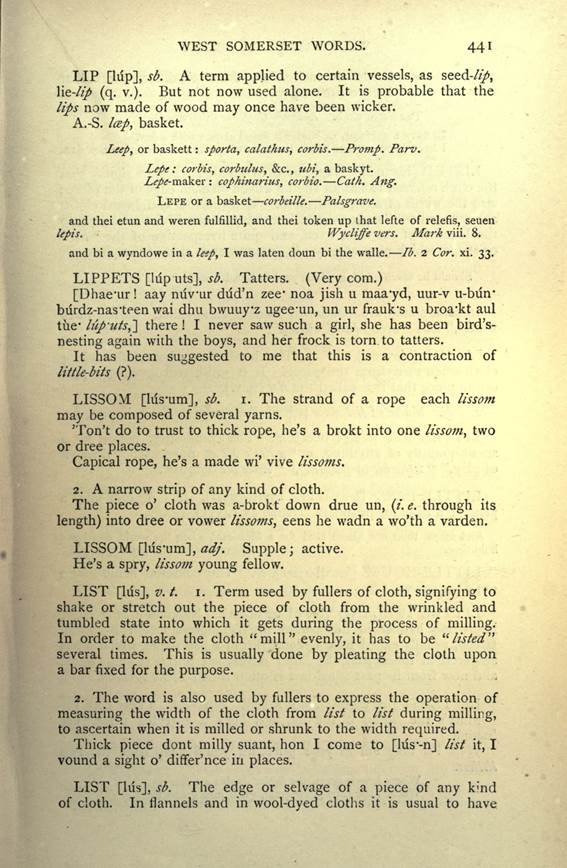
(delwedd B9301) (tudalen 441)
|
WEST SOMERSET WORDS. 441
LIP [liip], sb. A term applied to certain vessels, as seed-//)), \\Q-lip (q. v.). But not now used alone. It
is probable that the lips now made of
wood may once have been wicker.
A.-S. lap, basket.
Leep, or baskett: sporta, calathits, corbis. Promp. Parv.
Lepe: corbis, corbulus, &c. , ubi y a baskyt.
: cophinarius, corbio. Cath. Ang.
LEPE or a basket corbdlle. Palsgrave.
and thei etun and weren fulfillid, and thei token up that lefte of relefis,
seuen lefts. Wycliffe vers. Mark viii.
8.
and bi a wyndowe in a hep, I was laten doun bi the walle. Ib. 2 Cor. xi. 33.
LIPPETS [Idp-uts], sb. Tatters. (Very com.)
[Dhae'ur! aay niivur diid'n zee 4 noa jish u maa'yd, uur-v u-bun' burdz-nas'teen wai dhu bwuuyz ugee'un, un
ur frauk's u broa'kt aul tue*
lup'uts,~\ there! I never saw such a girl, she has been bird's-nesting again
with the boys, and her frock is torn to tatters.
It has been suggested to me that this is a contraction of little-bits (?).
LISSOM [liis'um], sb. i. The strand of a rope each lissom may be composed of several yarns.
; Ton't do to trust to thick rope, he's a brokt into one lissom, two or dree places.
Capical rope, he's a made wi' vive lissoms.
2. A narrow strip of any kind of cloth.
The piece o' cloth was a-brokt down drue un, (/". e. through its length) into dree or vower lissoms, eens he
wadn a wo'th a varden.
LISSOM [Ids-urn], tf^'. Supple; active.
He's a spry, lissom young fellow.
LIST [Ids], v. t. i. Term used by fullers of cloth, signifying to shake or stretch out the piece of cloth
from the wrinkled and tumbled state
into which it gets during the process of milling. In order to make the cloth "mill"
evenly, it has to be "listed"
several times. This is usually done by pleating the cloth upon a bar fixed for the purpose.
2. The word is also used by fullers to express the operation of measuring the width of the cloth from list
to list during milling, to ascertain
when it is milled or shrunk to the width required.
Thick piece dont milly suant, hon I come to [luV-n] list it, I vound a sight o' differ'nce in places.
LIST [Ids], sb. The edge or selvage of a piece of any kind of cloth. In flannels and in wool-dyed
cloths it is usual to have
|
|
|
|
|
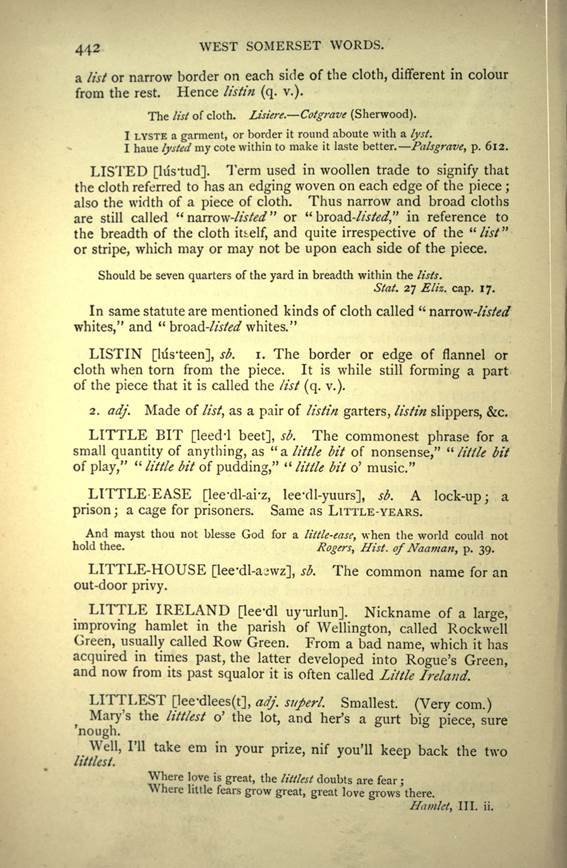
(delwedd B9302) (tudalen 442)
|
442 WEST SOMERSET WORDS.
a list or narrow border on each side of the cloth, different in colour from the rest. Hence listin (q. v.).
The list of cloth. Lisiere.Cotgrave (Sherwood).
I LYSTE a garment, or border it round aboute with a lyst.
I haue lysted my cote within to make it laste better. Palsgrave, p. 612.
LISTED [lus'tud]. Term used in woollen trade to signify that the cloth referred to has an edging woven
on each edge of the piece; also the
width of a piece of cloth. Thus narrow and broad cloths are still called” narrow-/z>/#/” or”
\xoad.-listed" in reference to
the breadth of the cloth itself, and quite irrespective of the
"list" or stripe, which may
or may not be upon each side of the piece.
Should be seven quarters of the yard in breadth within the lists.
Stat. 27 Eliz. cap. 17.
In same statute are mentioned kinds of cloth called” narrow-listed whites," and” broad-listed whites."
LISTIN [Ms-teen], sb. i. The border or edge of flannel or cloth when torn from the piece. It is while
still forming a part of the piece that
it is called the list (q. v.).
2. adj. Made of list, as a pair of listin garters, listin slippers, &c.
LITTLE BIT [leed-1 beet], sb. The commonest phrase for a small quantity of anything, as” a little
bit of nonsense,"“ little bit of
play,"“ little bit of pudding,"“ little bit o' music."
LITTLE-EASE [lee'dl-ai'z, lee'dl-yuurs], sb. A lock-up; a prison; a cage for prisoners. Same as
LITTLE-YEARS.
And mayst thou not blesse God for a little-ease, when the world could
not hold thee. Rogers, Hist, of
Naaman, p. 39.
LITTLE-HOUSE [lee-dl-aswz], sb. The common name for an out-door privy.
LITTLE IRELAND [lee'dl uyurlun]. Nickname of a large, improving hamlet in the parish of
Wellington, called Rockwell Green,
usually called Row Green. From a bad name, which it has acquired in times past, the latter
developed into Rogue's Green, and now
from its past squalor it is often called Little Ireland.
LITTLEST [lee-dlees(t], adj. sttperl. Smallest. (Very com.) Mary's the littlest o' the lot, and her's a
gurt big piece sure 'no ugh.
Well, I'll take em in your prize, nif you'll keep back the two littlest.
Where love is great, the littlest doubts are fear; Where little fears grow great, great love
grows there.
Hamlet, III. ii.
|
|
|
|
|
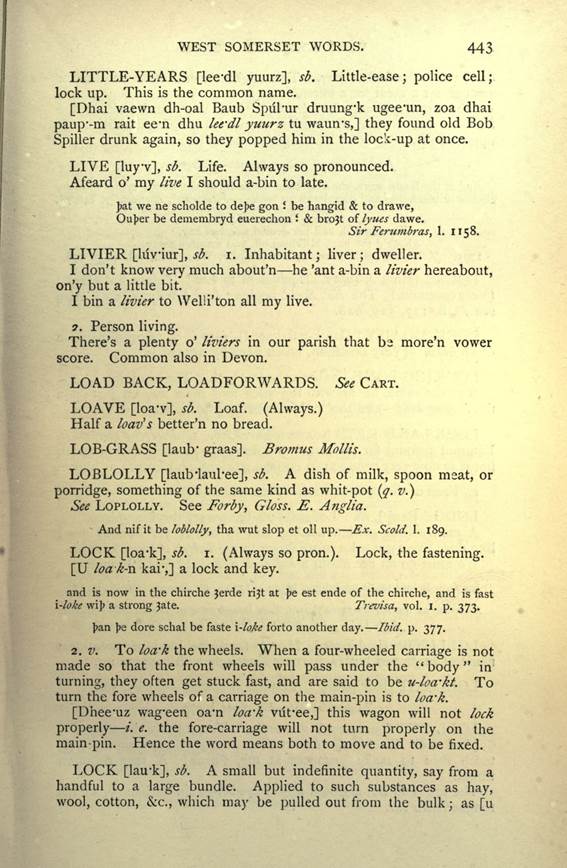
(delwedd B9303) (tudalen 443)
|
WEST SOMERSET WORDS. 443
LITTLE-YEARS [lee-dl yuurz], sb. Little-ease; police cell; lock up. This is the common name.
[Dhai vaewn dh-oal Baub SpuTur druung'k ugee'un, zoa dhai paup - -m rait ee*n dhu lec'dl yuurz tu
waun's,] they found old Bob Spiller
drunk again, so they popped him in the lock-up at once.
LIVE [luyv], sb. Life. Always so pronounced.
Afeard o' my live I should a-bin to late.
)>at we ne scholde to de]?e gon ' be hangid & to drawe, Ou]jer be demembryd euerechon ' & bro^t
of lyues dawe.
Sir FcrumbraS) 1. 1158.
LIVIER [hiviur], sb. i. Inhabitant; liver; dweller. I don't know very much about'n he 'ant
a-bin a livier hereabout, on'y but a
little bit.
I bin a livier to Welii'ton all my live.
?. Person living.
There's a plenty o' liviers in our parish that bs more'n vower score. Common also in Devon.
LOAD BACK, LOADFORWARDS. See CART.
LOAVE [loa-v], sb. Loaf. (Always.)
Half a loads better'n no bread.
LOB-GRASS [laub- graas]. Bromus Mollis.
LOBLOLLY [laub'laul'ee], sb. A dish of milk, spoon meat, or porridge, something of the same kind as
whit-pot (q. v.) See LOPLOLLY. See
Forby, Gloss. E. Anglia.
And nif it be loblolly, tha wut slop et oil up. Ex. Scold. 1. 189.
LOCK [loa'k], sb. i. (Always so pron.). Lock, the fastening. [U loak-i\ kai',] a lock and key.
and is now in the chirche Jerde ri^t at ]>e est ende of the chirche, and
is fast \-loke wij) a strong jate.
Trevisa, vol. i. p. 373.
|>an ])e dore schal be faste \-loke forto another day. Ibid. p. 377.
2. v. To loa'k the wheels. When a four-wheeled carriage is not made so that the front wheels will pass
under the "body" in turning,
they often get stuck fast, and are said to be u-loa'kt. To turn the fore wheels of a carriage on the
main-pin is to loa'k.
[Dhee-uz wag-een oa! n loa'k viit-ee,] this wagon will not lock properly i. e. the fore-carriage will not
turn properly on the main-pin. Hence
the word means both to move and to be fixed.
LOCK [lairk], sb. A small but indefinite quantity, say from a handful to a large bundle. Applied to such
substances as hay, wool, cotton,
&c., which may be pulled out from the bulk; as [u
|
|
|
|
|
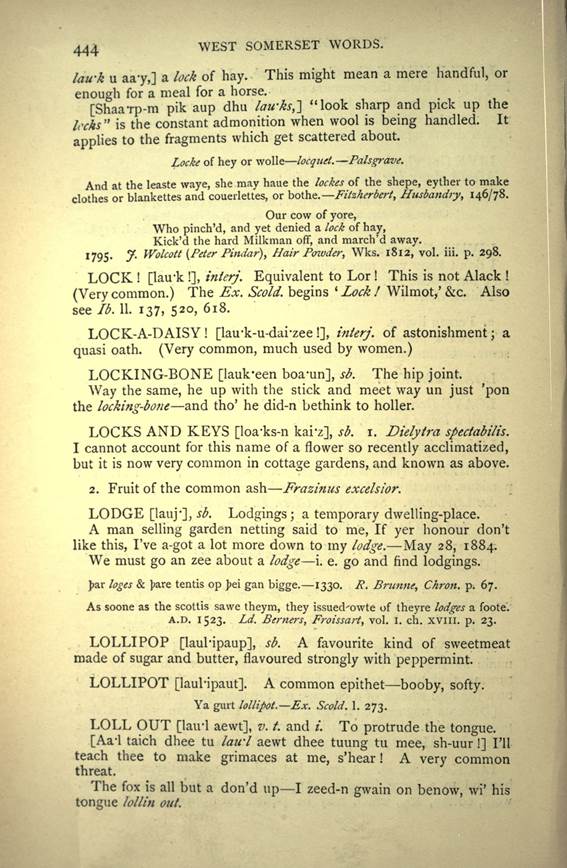
(delwedd B9304) (tudalen 444)
|
444 WEST SOMERSET WORDS.
lau-k u aa-y,] a lock of hay. This might mean a mere handful, or enough for a meal for a horse.
[Shaa-rp-m pik aup dhu lau'ks,~\ "look sharp and pick up the Icchs" is the constant admonition when
wool is being handled. It applies to
the fragments which get scattered about.
Locke of hey or wolle locquet. Palsgrave.
And at the leaste waye, she may haue the lockes of the shepe, eyther to
make clothes or blankettes and
couerlettes, or bothe. Fitzherbert, Husbandry, 146/78.
Our cow of yore,
Who pinch 'd, and yet denied a lock of hay,
Kick'd the hard Milkman off, and march'd away. '795- 7- Wolcott (Peter Pindar), Hair Powder,
Wks. 1812, vol. iii. p. 298.
LOCK! [lau-k!], inter/. Equivalent to Lor! This is not Alack! (Very common.) The Ex. Scold, begins
''Lock! Wilmot,' &c. Also see Ib.
11. 137, 5 20 > 6l8 -
LOCK-A-DAISY! [lairk-u-dai-zee!], inter/, of astonishment; a quasi oath. (Very common, much used by
women.)
LOCKING-BONE [lauk'een boa'un], sb. The hip joint. Way the same, he up with the stick and meet
way un just 'pon the locking-bo?ie and
tho' he did-n bethink to holler.
LOCKS AND KEYS [loa'ks-n kai'z], sb. i. Dielytra spectabilis. I cannot account for this name of a flower
so recently acclimatized, but it is
now very common in cottage gardens, and known as above.
2. Fruit of the common ash Frazinus excelsior.
LODGE [lauj'J, sb. Lodgings; a temporary dwelling-place. A man selling garden netting said to me, If
yer honour don't like this, I've a-got
a lot more down to my lodge. May 28, 1884.
We must go an zee about a lodge \. e. go and find lodgings.
J>ar loges & J>are tentis op >ei gan bigge. 1330. R. Brunnf,
Chron. p. 67.
As soone as the scottis sawe theym, they issued'owte of theyre lodges a
foote. A.D. 1523. Ld. Berners,
Froissart, vol. I. ch. xvm. p. 23.
LOLLIPOP [lauHpaup], sb. A favourite kind of sweetmeat made of sugar and butter, flavoured
strongly with peppermint.
LOLLIPOT [lauHpaut]. A common epithet booby, softy. Ya gurt lollipot.Ex. Scold. 1. 273.
LOLL OUT [lau-1 aewt], v. t. and *. To protrude the tongue.
[Aa-1 taich dhee tu lau'l aewt dhee tuung tu mee, sh-uur!] I'll teach thee to make grimaces at me, s'hear!
A very common threat.
The fox is all but a don'd up I zeed-n gwain on benow, wi' his tongue lollin out.
|
|
|
|
|
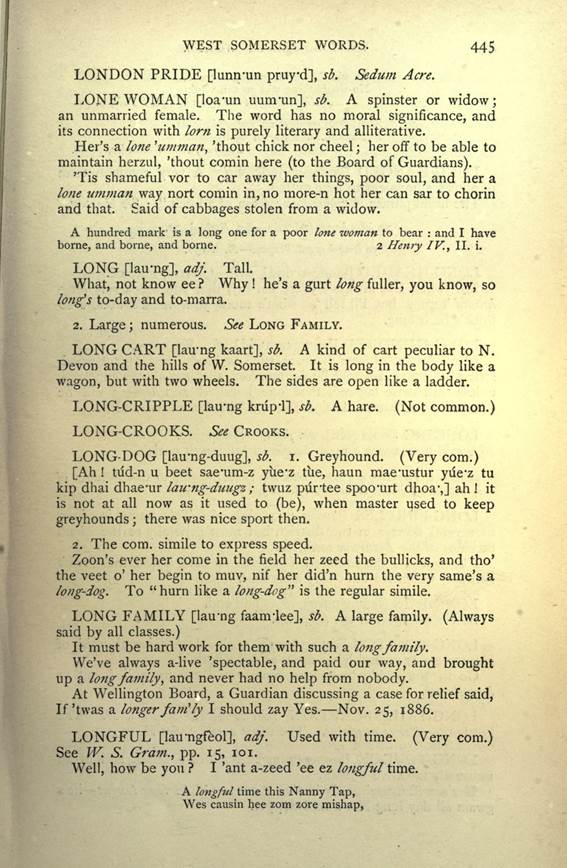
(delwedd B9305) (tudalen 445)
|
WEST SOMERSET WORDS. 445
LONDON PRIDE [lumrun pruyd], sb. Sedum Acre.
LONE WOMAN [loa'un uunrun], sb. A spinster or widow; an unmarried female. The word has no moral
significance, and its connection with
lorn is purely literary and alliterative.
Her's a lone 'umman, 'thout chick nor cheel; her off to be able to maintain herzul, 'thout comin here (to the
Board of Guardians).
'Tis shameful vor to car away her things, poor soul, and her a lone umman way nort comin in, no more-n hot
her can sar to chorin and that. Said
of cabbages stolen from a widow.
A hundred mark is a long one for a poor lone woman to bear: and I have borne, and borne, and borne. 2 Henry IV.,
II. i.
LONG [lau-ng], adj. Tall.
What, not know ee? Why! he's a gurt long fuller, you know, so long's to-day and to-marra.
2. Large; numerous. See LONG FAMILY.
LONG CART [lairng kaart], sb. A kind of cart peculiar to N. Devon and the hills of W. Somerset. It is
long in the body like a wagon, but
with two wheels. The sides are open like a ladder.
LONG-CRIPPLE [lau-ng knip-1], sb. A hare. (Not common.) LONG-CROOKS. See CROOKS.
LONG-DOG [lau'ng-duug], sb. i. Greyhound. (Very com.) [Ah! tiid-n u beet sae'um-z yue'z tue, haun
mae'ustur yue'z tu kip dhai dhae'ur
lau'ng-duugz; twtiz piirtee spoo'urt dhoa',] ah 1 it is not at all now as it used to (be), when
master used to keep greyhounds; there
was nice sport then.
2. The com. simile to express speed.
Zoon's ever her come in the field her zeed the bullicks, and tho' the veet o' her begin to muv, nif her did'n
hurn the very same's a long-dog. To
"hurn like a long-dog" is the regular simile.
LONG FAMILY [lau'ng faanvlee], sb. A large family. (Always said by all classes.)
It must be hard work for them with such a long family.
We've always a-live 'spectable, and paid our way, and brought up a long family, and never had no help
from nobody.
At Wellington Board, a Guardian discussing a case for relief said, If 'twas a longer f airily I should zay
Yes. Nov. 25, 1886.
LONGFUL [lau-ngfeol], adj. Used with time. (Very com.) See W. S. Gram., pp. 15, 101.
Well, how be you? I 'ant a-zeed 'ee ez longful time.
A longful time this Nanny Tap, Wes
causin hee zom zore mishap,
|
|
|
|
|
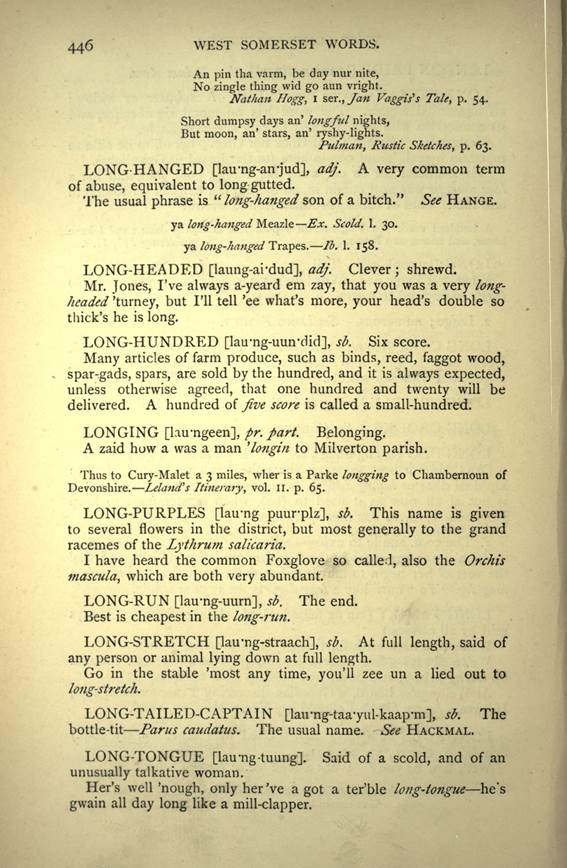
(delwedd B9306) (tudalen 446)
|
446 WEST SOMERSET WORDS.
An pin tha varm, be day nur nite, No
zingle thing wid go aun vright.
Nathan Hogg, I ser., Jan Vaggis's Tale, p. 54.
Short dumpsy days an' longfnl nights,
But moon, an' stars, an' ryshy-lights.
Pulman, Rustic Sketches, p. 63.
LONG-HANGED [lairng-atrjud], adj. A very common term of abuse, equivalent to long gutted.
The usual phrase is "long-hanged son of a bitch." See HANGE.
ya long-hanged Meazle Ex. Scold. 1. 30.
ya long-hanged Trapes. Ib. 1. 158.
LONG-HEADED [laung-ai'dud], adj. Clever; shrewd.
Mr. Jones, I've always a-yeard em zay, that you was a very long-headed
'turney, but I'll tell 'ee what's more, your head's double so thick's he is long.
LONG-HUNDRED [lairng-uun'did], sb. Six score.
Many articles of farm produce, such as binds, reed, faggot wood, spar-gads, spars, are sold by the hundred,
and it is always expected, unless
otherwise agreed, that one hundred and twenty will be delivered. A hundred of five score is
called a small-hundred.
LONGING [lairngeen], pr. part. Belonging.
A zaid how a was a man 'longin to Milverton parish.
Thus to Cury-Malet a 3 miles, wher is a Parke longging to Chambernoun of Devonshire. LelancCs Itinerary, vol. II. p.
65.
LONG-PURPLES [lairng puurplz], sb. This name is given to several flowers in the district, but
most generally to the grand racemes of
the Ly thrum salicaria.
I have heard the common Foxglove so called, also the Orchis mascula, which are both very abundant.
LONG-RUN [lairng-uurn], sb. The end.
Best is cheapest in the long-run.
LONG-STRETCH [lau'ng-straach], sb. At full length, said of any person or animal lying down at full
length.
Go in the stable 'most any time, you'll zee un a lied out to long-stretch.
LONG-TAILED-CAPTAIN [lairng-taa-yul-kaap-m], sb. The bottle-tit Parus caudatus. The usual name.
See HACKMAL.
LONG-TONGUE [lairng-tuung]. Said of a scold, and of an unusually talkative woman.
Her's well 'nough, only her Ve a got a ter'ble long-tongue he's gwain all day long like a mill-clapper.
|
|
|
|
|
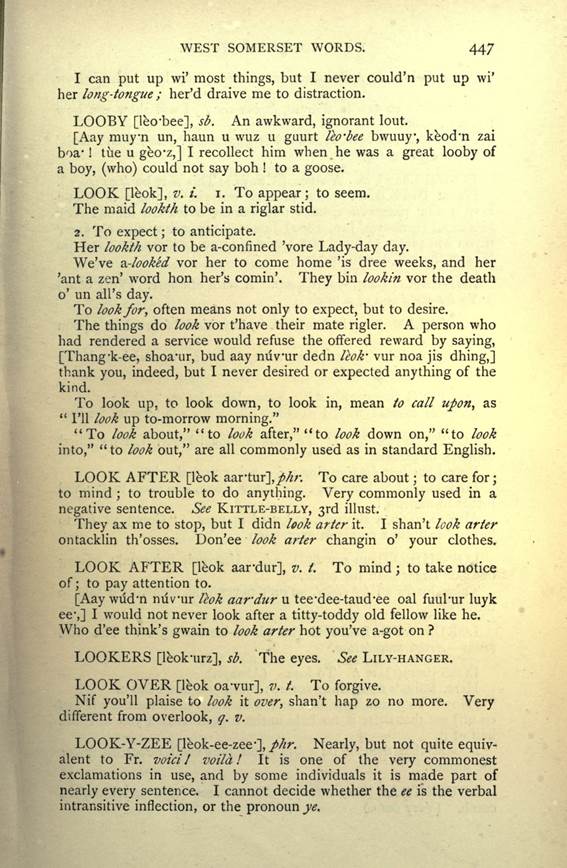
(delwedd B9307) (tudalen 447)
|
WEST SOMERSET WORDS. 447
I can put up wi' most things, but I never could'n put up wi' her long-tongue; her'd draive me to
distraction.
LOOBY [leo'bee], sb. An awkward, ignorant lout.
[Aay muyn un, haun u wuz u guurt leo'bee bwuuy, keod'n zai boa-! tue u geo-z,] I recollect him when he
was a great looby of a boy, (who)
could not say boh! to a goose.
LOOK [leok], v. i. i. To appear; to seem.
The maid lookth to be in a riglar stid.
2. To expect; to anticipate.
Her lookth vor to be a-confined 'vore Lady-day day.
We've ^-looked vor her to come home 'is dree weeks, and her 'ant a zen' word hon her's comin'. They bin
lookin vor the death o' un all's day.
To look for, often means not only to expect, but to desire.
The things do look vor t'have their mate rigler. A person who had rendered a service would refuse the
offered reward by saying, [Thang'k-ee,
shoa'ur, bud aay mivur dedn leok' vur noa jis dhing,] thank you, indeed, but I never desired or
expected anything of the kind.
To look up. to look down, to look in, mean to call upon, as “I'll look up
to-morrow morning."
"To look about," "to look after," "to look down
on," "to look into,"“
to look out," are all commonly used as in standard English.
LOOK AFTER [leok aartur], //;;-. To care about; to care for; to mind; to trouble to do anything. Very
commonly used in a negative sentence.
See KITTLE-BELLY, 3rd illnst.
They ax me to stop, but I didn look arter it. I shan't look arter ontacklin th'osses. Don'ee look arter
changin o' your clothes.
LOOK AFTER [leok aardur], v. t. To mind; to take notice of; to pay attention to.
[Aay wiid'n niivur leok aar'dur u tee'dee-taud'ee oal fuul'ur luyk ee',] I would not never look after a
titty-toddy old fellow like he. Who
d'ee think's gwain to look arter hot you've a-got on?
LOOKERS [leok-urz], sb. The eyes. See LILY-HANGER.
LOOK OVER [leok oa-vur], v. t. To forgive.
Nif you'll plaise to look it over, shan't hap zo no more. Very different from overlook, q. v.
LOOK-Y-ZEE [leok-ee-zee-],//^. Nearly, but not quite equivalent to Fr. void!
voilal It is one of the very commonest
exclamations in use, and by some individuals it is made part of nearly every sentence. I cannot decide
whether the ee is the verbal
intransitive inflection, or the pronoun ye.
|
|
|
|
|
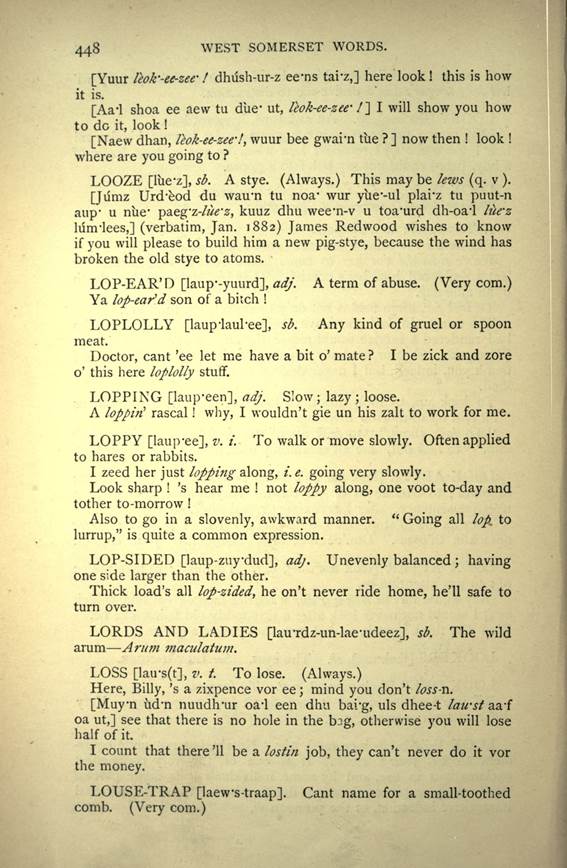
(delwedd B9308) (tudalen 448)
|
448 WEST SOMERSET WORDS.
[Yuur leok'-ef-zee-! dhiish-ur-z ee'ns tai'z,] here look! this is how it is.
[Aa-1 shoa ee aevv tu due' ut, leok-ee-zee- /] I will show you how to do it, look!
[Naew dhan, leok-ee-zee'!^ wuur bee gwai'n tue? ] now then! look! where are you going to?
LOOZE [liie-z], sb. A stye. (Always.) This may be lews (q. v ).
[Jiimz Urd'eod du wau'n tu noa* wur yue'-ul plai'z tu puut-n aup' u nue* paeg'z-7^'0, kuuz dhu wee*n-v u
toa'urd dh-oa*l liie'z liinrlees,]
(verbatim, Jan. 1882) James Redwood wishes to know if you will please to build him a new
pig-stye, because the wind has broken
the old stye to atoms.
LOP-EAR' D [laup'-yuurd], adj. A term of abuse. (Very com.) Ya lop-ear 1 d son of a bitch!
LOPLOLLY [laup-laul'ee], sb. Any kind of gruel or spoon meat.
Doctor, cant 'ee let me have a bit o' mate? I be zick and zore o' this here loplolly stuff.
LOPPING [laup-een], adj. Slow; lazy; loose.
A loppiri rascal! why, I wouldn't gie un his zalt to work for me.
LOPPY [laup-ee], v. i. To walk or move slowly. Often applied to hares or rabbits.
I zeed her just lopping along, /. e. going very slowly.
Look sharp! 's hear me! not loppy along, one voot to-day and tother to-morrow!
Also to go in a slovenly, awkward manner.” Going all lop to lurrup," is quite a common expression.
LOP-SIDED [laup-zuydud], adj. Unevenly balanced; having one side larger than the other.
Thick load's all lop-zided, he on't never ride home, he'll safe to turn over.
LORDS AND LADIES [lau'rdz-un-lae'udeez], sb. The wild arum Arum maculatum.
LOSS [lairs(t], v. t. To lose. (Always.)
Here, Billy, 's a zixpence vor ee; mind you don't loss-n.
[Muyn uoVn nuudlvur oa'l een dhu bai'g, uls dhee-t lau-st aa-f oa ut,] see that there is no hole in the
b^g, otherwise you will lose half of
it.
I count that there'll be a lostin job, they can't never do it vor the money.
LOUSE-TRAP [laews-traap]. Cant name for a small-toothed cornb. (Very com.)
|
|
|
|
|
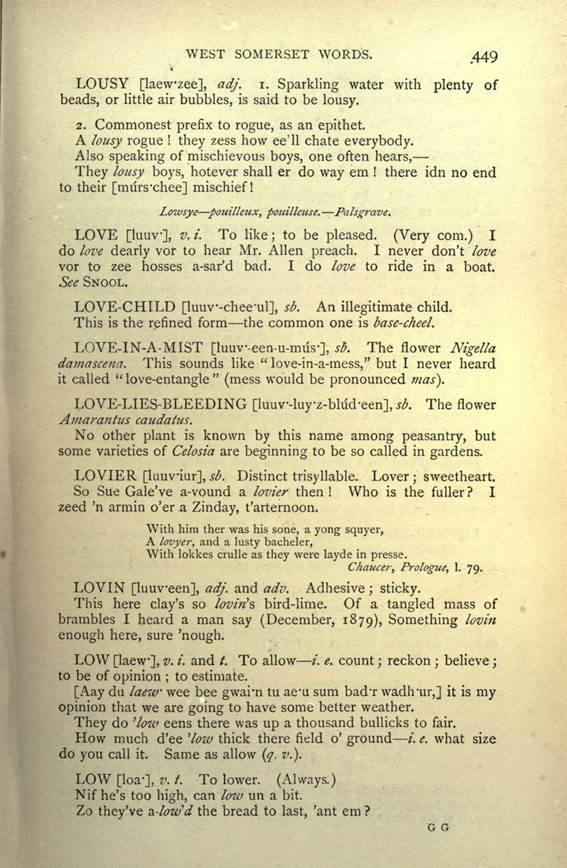
(delwedd B9309) (tudalen 449)
|
WEST SOMERSET WORDS. 449
LOUSY [laewzee], adj. i. Sparkling water with plenty of beads, or little air bubbles, is said to be
lousy.
2. Commonest prefix to rogue, as an epithet.
A lousy rogue! they zess how ee'll chare everybody. Also speaking of mischievous boys, one
often hears, They lousy boys, hotever
shall er do way em! there idn no end
to their [miirs'chee] mischief!
LowsyepOHiUeux t pouilleuse. Palsgrave.
LOVE [luuv], v.i. To like; to be pleased. (Very com.) I do love dearly vor to hear Mr. Allen
preach. I never don't love vor to zee
bosses a-sar'd bad. I do love to ride in a boat. See SNOOL.
LOVE-CHILD [luuv-chee-ul], sb. An illegitimate child. This is the refined form the common one is
base-cheel.
LOVE-IN-A-MIST [luuv-een-u-muV], sb. The flower Nigella damascena. This sounds like”
love-in-a-mess," but I never heard
it called” love-entangle” (mess would be pronounced mas).
LOVE-LIES-BLEEDING [luuv-luyz-bldd-een], sb. The flower Amarantus caudatus.
No other plant is known by this name among peasantry, but some varieties of Celosia are beginning to
be so called in gardens.
LOVIER [luuviur], sb. Distinct trisyllable. Lover; sweetheart. So Sue Gale've a-vound a lovier then! Who
is the fuller? I zeed 'n armin o'er a
Zinday, t'arternoon.
With him ther was his sone, a yong squyer,
A lovyer, and a lusty bacheler,
With lokkes crulle as they were layde in presse.
Chaucer, Prologue, 1. 79.
LOVIN [luuveen], adj. and adv. Adhesive; sticky.
This here clay's so lovin's bird-lime. Of a tangled mass of brambles I heard a man say (December,
1879), Something lovin enough here,
sure 'nough.
LOW [laew], v. i. and /. To allow /. e. count; reckon; believe; to be of opinion; to estimate.
[Aay du laew wee bee gwarn tu ae'u sum bad'r wadlvur,] it is my opinion that we are going to have some
better weather.
They do 'low eens there was up a thousand bullicks to fair.
How much d'ee 'low thick there field o' ground /. e. what size do you call it. Same as allow (q. v.).
LOW [loa-], v. t. To lower. (Always.)
Nif he's too high, can low un a bit.
Zo they've z-low'd the bread to last, 'ant em?
G G
|
|
|
|
|
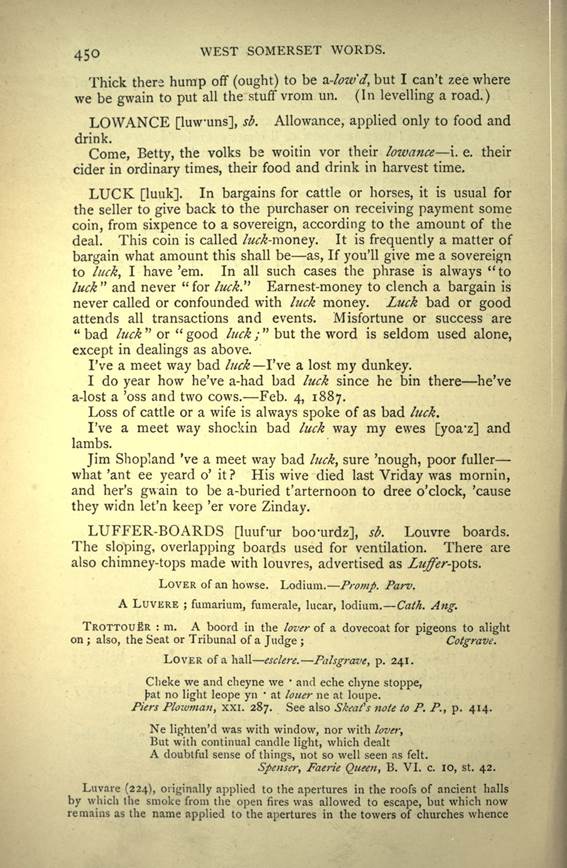
(delwedd B9310) (tudalen 450)
|
450
WEST SOMERSET WORDS.
Thick there hump off (ought) to be z.-lowd,
but I can't zee where we be gwain to
put all the stuff vrom un. (In levelling a road.)
LOWANCE [luwuns], sb. Allowance, applied only to food and drink.
Come, Betty, the volks be woitin vor their lowance i. e. their cider in ordinary times, their food and
drink in harvest time.
LUCK [luuk]. In bargains for cattle or horses, it is usual for the seller to give back to the purchaser on
receiving payment some coin, from
sixpence to a sovereign, according to the amount of the deal. This coin is called /tf^fc-money. It
is frequently a matter of bargain what
amount this shall be as, If you'll give me a sovereign to luck, I have 'em. In all such cases the
phrase is always "to luck"
and never "for luck." Earnest-money to clench a bargain is never called or confounded with luck money.
Luck bad or good attends all
transactions and events. Misfortune or success are "bad luck" or "good
luck;" but the word is seldom used alone, except in dealings as above.
I've a meet way bad luckI've a lost my dunkey.
I do year how he've a-had bad luck since he bin there he've a-lost a 'oss and two cows. Feb. 4, 1887.
Loss of cattle or a wife is always spoke of as bad luck.
I've a meet way shockin bad luck way my ewes [yoa'z] and lambs.
Jim Shopland Ve a meet way bad luck, sure 'nough, poor fuller what 'ant ee yeard o* it? His wive died
last Vriday was mornin, and her's
gwain to be a-buried t'arternoon to dree o'clock, 'cause they widn let'n keep 'er vore Zinday.
LUFFER-BOARDS [luuf'ur boo-urdz], sb. Louvre boards. The sloping, overlapping boards used for
ventilation. There are also
chimney-tops made with louvres, advertised as Z^r-pots.
LOVER of an howse. Lodium. Promp. Parv.
A LUVERE; fumarium, fumerale, lucar, lodium. Cath. Ang.
TROTTOUE'R: m. A boord in the lover of. a dovecoat for pigeons to alight on; also, the Seat or Tribunal of a Judge;
Cotgrave.
LOVER of a \u\\-esclere. Palsgrave, p. 241.
Cheke we and cheyne we and eche chyne stoppe,
)?at no light leope yn * at loner ne at loupe. Piers Plowman, xxi. 287. See also Skeafs
note to P. P., p. 414.
Ne lighten'd was with window, nor with lover t
But with continual candle light, which dealt
A doubtful sense of things, not so well seen as felt.
Spenser, Faerie Queen, B. VI. c. 10, st. 42.
Luvare (224), originally applied to the apertures in the roofs of ancient
halls by which the smoke from the open
fires was allowed to escape, but which now
remains as the name applied to the apertures in the towers of churches
whence
|
|
|
|
|
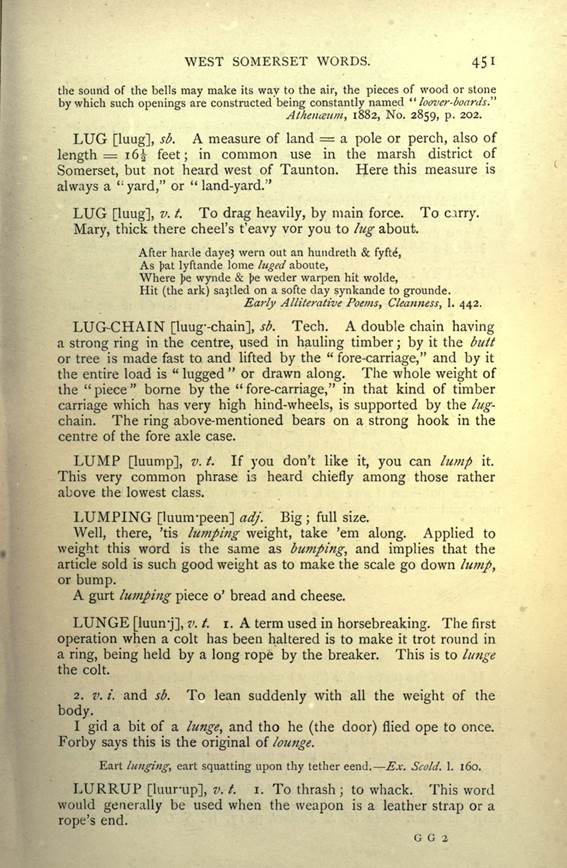
(delwedd B9311) (tudalen 451)
|
WEST SOMERSET WORDS. 451
the sound of the bells may make its way to the air, the pieces of wood or
stone by which such openings are
constructed being constantly named” loover-boards."
AtkeiHzuin, 1882, No. 2859, p. 202.
LUG [luug], sb. A measure of land = a pole or perch, also of length = i6 feet; in common use in the
marsh district of Somerset, but not
heard west of Taunton. Here this measure is
always a <: yard," or” land-yard."
LUG [luug], v. t. To drag heavily, by main force. To carry. Mary, thick there cheel's t'eavy vor you to
lug about.
After harJe daye} warn out an hundreth & fyfte,
As t>at lyftande lome luged aboute,
Where }>e wynde & t>e weder warpen hit wolde,
Hit (the ark) sa3tled on a softe day synkande to grounde.
Early Alliterative Poems, Cleanness, 1. 442.
LUG-CHAIN [luug'-chain], sb. Tech. A double chain having a strong ring in the centre, used in
hauling timber; by it the butt or tree
is made fast to and lifted by the” fore-carriage," and by it the entire load is” lugged” or drawn along.
The whole weight of the” piece” borne
by the” fore-carriage," in that kind of timber carriage which has very high hind-wheels, is
supported by the lug-chain. The ring above-mentioned bears on a strong hook
in the centre of the fore axle case.
LUMP [luump], v. t. If you don't like it, you can lump it. This very common phrase is heard chiefly
among those rather above the lowest
class.
LUMPING [luunrpeen] adj. Big; full size.
Well, there, 'tis lumping weight, take 'em along. Applied to weight this word is the same as bumping,
and implies that the article sold is
such good weight as to make the scale go down lump, or bump.
A gurt lumping piece o' bread and cheese.
LUNGE [luunj], v. t. i. A term used in horsebreaking. The first operation when a colt has been haltered is
to make it trot round in a ring, being
held by a long rope by the breaker. This is to lunge the colt.
2. v. i. and sb. To lean suddenly with all the weight of the body.
I gid a bit of a lunge, and tho he (the door) flied ope to once. Forby says this is the original of lounge.
Eart lunging, eart squatting upon thy tether eend. Ex. Scold. 1. 160.
LURRUP [luurup], v. t. i. To thrash; to whack. This word would generally be used when the weapon is
a leather strap or a rope's end.
o G 2
|
|
|
|
|
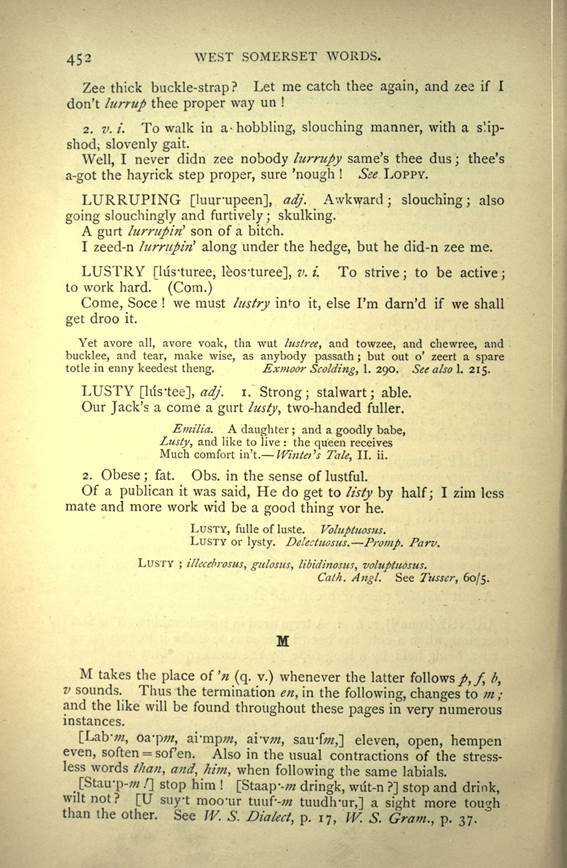
(delwedd B9312) (tudalen 452)
|
452
WEST SOMERSET WORDS.
Zee thick buckle-strap? Let me catch thee
again, and zee if I don't lurrup thee
proper way un!
2. v. i. To walk in a -hobbling, slouching manner, with a slip-shod, slovenly
gait.
Well, I never didn zee nobody lurrupy same's thee dus; thee's a-got the hayrick step proper, sure 'nough!
See LOPPY.
LURRUPING [luurupeen], adj. Awkward; slouching; also going slouchingly and furtively;
skulking. A gurt lurrupiri son of a
bitch. I zeed-n lurrupiri along under
the hedge, but he did-n zee me.
LUSTRY [luVturee, leosturee], v. i. To strive; to be active; to work hard. (Com.)
Come, Soce! we must lustry into it, else I'm darn'd if we shall get droo it.
Yet avore all, avore voak, tha wut lustree, and towzee, and chewree, and bucklee, and tear, make wise, as anybody
passath; but out o' zeert a spare
totle in enny keedest theng. Exmoor Scolding, 1. 290. See also 1. 215.
LUSTY [his -tee], adj. i. Strong; stalwart; able. Our Jack's a come a gurt lusty, two-handed
fuller.
Emilia. A daughter; and a goodly babe,
Lusty, and like to live: the queen receives Much comfort in't. Winters Tale, II. ii.
2. Obese; fat. Obs. in the sense of lustful.
Of a publican it was said, He do get to listy by half; I zim less mate and more work wid be a good thing vor
he.
LUSTY, fulle of luste. Vohiptnosus.
LUSTY or lysty. Delectuosus. Promp. Parv.
LUSTY; illecebrosus, giilosns, Ubidinosus, voluptuosus.
Calk. Angl. See Tusser, 60/5.
M takes the place of ' (q. v.) whenever the
latter follows/,/ b, v sounds. Thus
the termination en, in the following, changes to m; and the like will be found throughout these
pages in very numerous instances.
[Lab-w, oa-p;#, armpw, arvm, sairf/0,] eleven, open, hempen even, soften = sof 'en. Also in the usual
contractions of the stressless words than, and, him, when following the same
labials.
> [Stairp-w /] stop him! [Staap--;^ dringk, wut-n?] stop and drink, wilt not? [U suyt moo'ur tuuf--; tuudh'ur,]
a sight more touh than the other. See
W. S. Dialect, p. 17, W. S. Gram., p. 37.
|
|
|
|
|
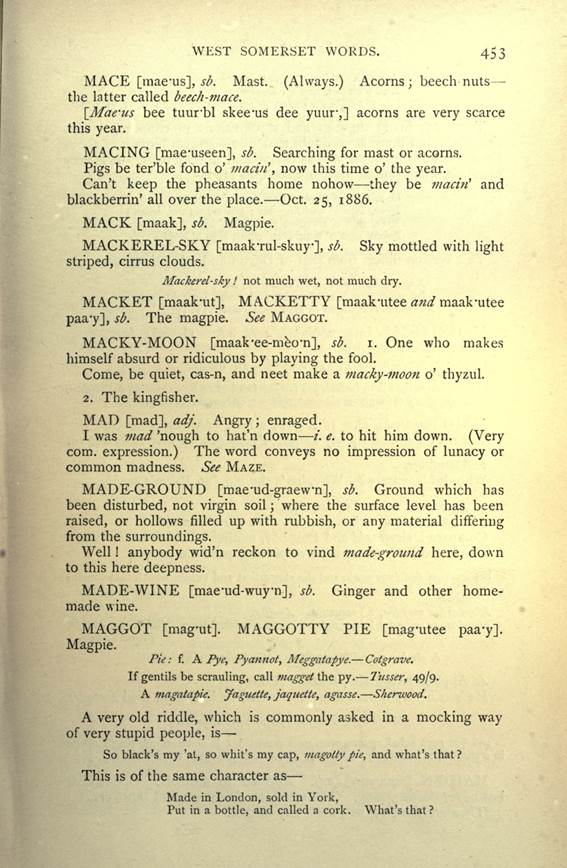
(delwedd B9313) (tudalen 453)
|
WEST SOMERSET WORDS. 453
MACE [mae-us], sb. Mast. (Always.) Acorns; beech nuts the latter called beech-mace.
[Afae'us bee tuurbl skee'us dee yuur,] acorns are very scarce this year.
MACING [mae'useen], sb. Searching for mast or acorns. Pigs be ter'ble fond o' macin\ now this
time o' the year. Can't keep the pheasants
home nohow they be ma fin' and
blackberrin' all over the place. Oct. 25, 1886.
MACK [maak], sb. Magpie.
MACKEREL-SKY [maak'rul-skuy], sb. Sky mottled with light striped, cirrus clouds.
Mackerel-sky! not much wet, not much dry.
MACKET [maak-ut], M ACKETTY [maak'utee and maak-utee paa-y], sb. The magpie. See MAGGOT.
MACKY-MOON [maak-ee-meo-n], sb. i. One who makes himself absurd or ridiculous by playing the
fool.
Come, be quiet, cas-n, and neet make a macky-moon o' thyzul.
2. The kingfisher.
MAD [mad], adj. Angry; enraged.
I was mad 'nough to hat'n down /. e. to hit him down. (Very com. expression.) The word conveys no
impression of lunacy or common
madness. See MAZE.
MADE-GROUND [mae'ud-graewn], sb. Ground which has been disturbed, not virgin soil \ where the
surface level has been raised, or
hollows filled up with rubbish, or any material differing from the surroundings.
Well! anybody wid'n reckon to vind made-ground here, down to this here deepness.
MADE-WINE [mae'ud-wuyn], sb. Ginger and other home-made wine.
MAGGOT [mag-ut]. MAGGOTTY PIE [mag-utee paa-y]. Magpie.
Pie: f. A Pye, Pyannot, Meggatapye. Cotgrave.
If gentils be scrauling, call magget the py. Tusser, 49/9.
A magatapie. Jaguctte, jaquette, agasse. Sherwood.
A very old riddle, which is commonly asked in a mocking way of very stupid people, is
So black's my 'at, so whit's my cap, magotty pie, and what's that? This is of the same character as
Made in London, sold in York,
Put in a bottle, and called a cork. What's that?
|
|
|
|
|
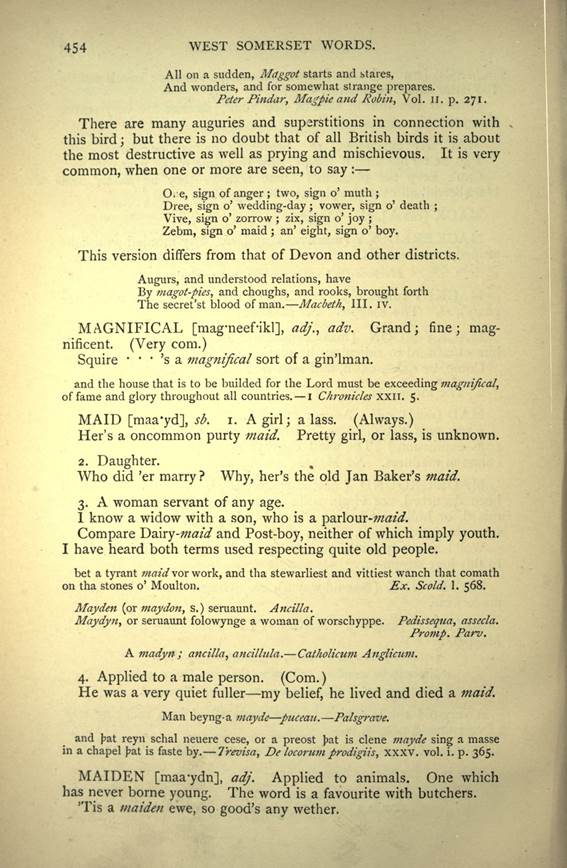
(delwedd B9314) (tudalen 454)
|
454 WEST SOMERSET WORDS.
All on a sudden, Maggot starts and stares,
And wonders, and for somewhat strange prepares.
Peter Pindar, Magpie and Robin, Vol. n. p. 271.
There are many auguries and superstitions in connection with this bird; but there is no doubt that of
all British birds it is about the most
destructive as well as prying and mischievous. It is very common, when one or more are seen, to say:
O. e, sign of anger; two, sign o' muth;
Dree, sign o' wedding-day; vower, sign o' death;
Vive, sign o' zorrow; zix, sign o' joy;
Zebra, sign o' maid; an' eight, sign o' boy.
This version differs from that of Devon and other districts.
Augurs, and understood relations, have
By magot-pies, and choughs, and rooks, brought forth
The secret'st blood of man. Macbeth, III. iv.
MAGNIFICAL [mag-neef'ikl], adj., adv. Grand; fine; magnificent. (Very com.)
Squire 's a magnificat sort of a gin'lman.
and the house that is to be builded for the Lord must be exceeding
magnificat^ of fame and glory
throughout all countries. I Chronicles xxn. 5.
MAID [maa'yd], sb. i. A girl; a lass. (Always.)
Her's a oncommon purty maid. Pretty girl, or lass, is unknown.
2. Daughter.
Who did 'er marry? Why, her's the old Jan Baker's maid.
3. A woman servant of any age.
I know a widow with a son, who is a parlour- maid. Compare Dairy-maid and Post-boy, neither of
which imply youth. I have heard both terms
used respecting quite old people.
bet a tyrant maid vor work, and tha stewarliest and vittiest wanch that
comath on tha stones o' Moulton. Ex.
Scold. 1. 568.
Mayden (or may don, S.) seruaunt. Ancilla.
Maydyn, or seruaunt folowynge a woman of worschyppe. Pedissequa, assecla.
Promp. Parv.
A madyn ' j ancilla, ancillula. Catholicum Anglicnm.
4. Applied to a male person. (Com. )
He was a very quiet fuller my belief, he lived and died a maid.
Man beyng-a mayde puceau. Palsgrave.
and f?at reyn schal neuere cese, or a preost J?at is clene mayde sing a
masse in a chapel }>at is faste by.
7revisa, De locorum prodigiis, xxxv. vol. i. p. 365.
MAIDEN [maa-ydn], adj. Applied to animals. One which has never borne young. The word is a
favourite with butchers. Tis a maiden
ewe, so good's any wether.
|
|
|
|
|
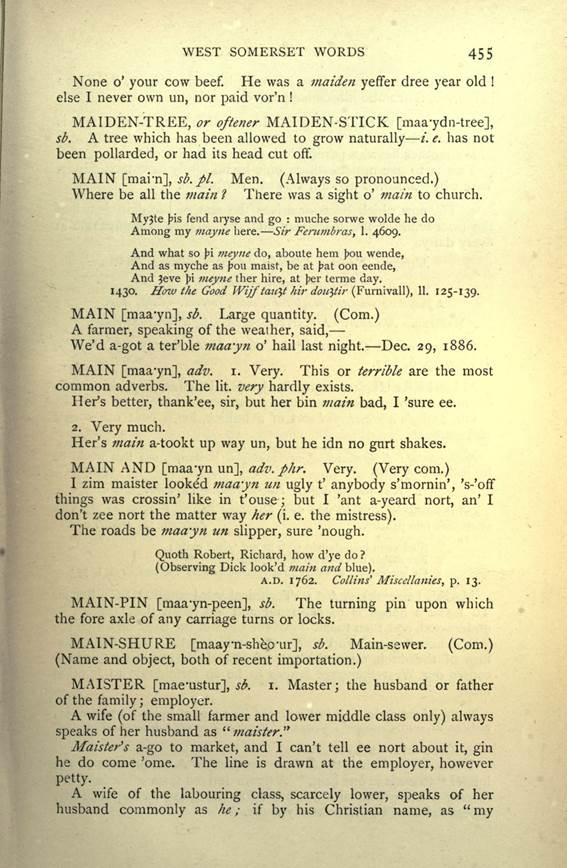
(delwedd B9315) (tudalen 455)
|
WEST SOMERSET WORDS 455
None o' your cow beef. He was a maiden yeffer dree year old! else I never own un, nor paid vor'n!
MAIDEN-TREE, or oftener MAIDEN-STICK [maa-ydn-tree], sb. A tree which has been allowed to grow
naturally /. e. has not been
pollarded, or had its head cut off.
MAIN [marn], sb.pl. Men. (Always so pronounced.) Where be all the main? There was a sight o'
main to church.
My3te Jns fend aryse and go: muche sorwe wolde he do Among my mayne here. Sir Fenimbras, \.
4609.
And what so \>\ meyne do, aboute hem Jiou wende, And as myche as J>ou maist, be at J?at
oon eende, And ^eve )>i meyne ther
hire, at )?er terme day. 1430. How the
Good Wijf tatty hir doityir (Furnivall), 11. 125-139.
MAIN [maa'yn], sb. Large quantity. (Com.)
A farmer, speaking of the weather, said,
We'd a-got a ter'ble maayn o' hail last night. Dec. 29, 1886.
MAIN [maa'yn], adv. i. Very. This or terrible are the most common adverbs. The lit. very hardly
exists.
Her's better, thank'ee, sir, but her bin main bad, I 'sure ee.
2. Very much.
Her's main a-tookt up way un, but he idn no gurt shakes.
MAIN AND [maa'yn un], adv. phr. Very. (Very com.) I zim maister looke'd maa'yn un ugly t'
anybody s'mornin', Voff things was
crossin' like in t'ouse; but I 'ant a-yeard nort, an' I don't zee nort the matter way her (i. e.
the mistress). The roads be maayn un
slipper, sure 'nough.
Quoth Robert, Richard, how d'ye do?
(Observing Dick look'd main and blue).
A.D. 1762. Collins' Miscellanies, p. 13.
MAIN-PIN [maa-yn-peen], sb. The turning pin upon which the fore axle of any carriage turns or locks.
MAIN-SHU RE [maayn-sheo-ur], sb. Main-sewer. (Com.) (Name and object, both of recent
importation.)
MAISTER [mae'ustur], sb. i. Master; the husband or father of the family; employer.
A wife (of the small farmer and lower middle class only) always speaks of her husband as
"maister"
Maister's a-go to market, and I can't tell ee nort about it, gin he do come 'ome. The line is drawn at the
employer, however petty.
A wife of the labouring class, scarcely lower, speaks of her husband commonly as he; if by his Christian
name, as” my
|
|
|
|
|
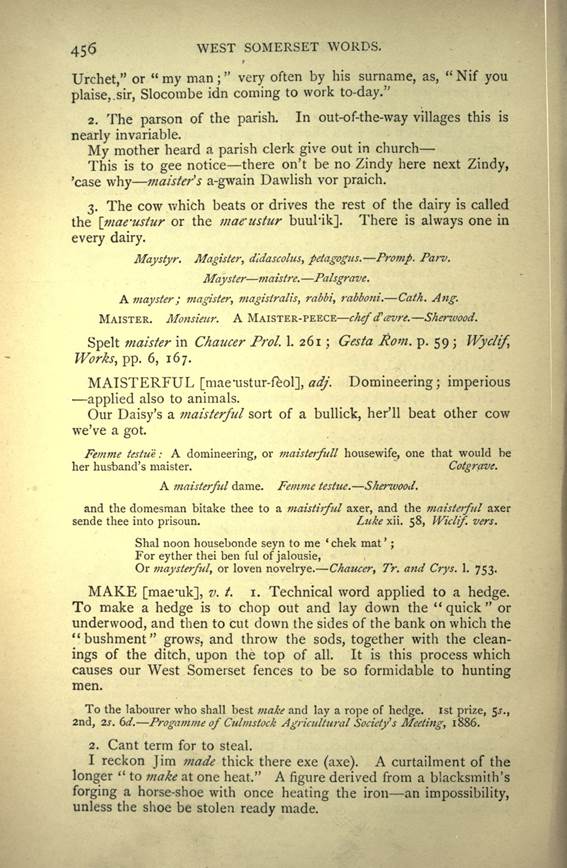
(delwedd B9316) (tudalen 456)
|
456 WEST SOMERSET WORDS.
Urchet," or” my man;” very often by his surname, as,” Nif you plaise,.sir, Slocombe idn coming to work
to-day."
2. The parson of the parish. In out-of-the-way villages this is nearly invariable.
My mother heard a parish clerk give out in church This is to gee notice there on't be no
Zindy here next Zindy, 'case why
maister' s a-gwain Dawlish vor praich.
3. The cow which beats or drives the rest of the dairy is called the {tnae'ustur or the mae'icstur buuHk].
There is always one in every dairy.
Maystyr. Magister, dldascolus, petagogus. Promp. Pai~v.
Mayster maistre. Palsgrave.
A mayster; magister, magistralis, rabbi, rabboni. Cath. Ang. MAISTER. Monsieur. A MAISTER-PEECE
chefeTavrt. Shenvood.
Spelt maister in Chaucer Prol. 1. 261; Gesta Rom. p. 59; Wydif, Works^ pp. 6, 167.
MAISTERFUL [mae'ustur-feol], adj. Domineering; imperious applied also to animals.
Our Daisy's a maisterful sort of a bullick, her'll beat other cow we've a got.
Femme testue: A domineering, or maisterfull housewife, one that would be her husband's maister. Cotgrave.
A maisterful dame. Femme testue. Sherwood.
and the domesman bitake thee to a maistirful axer, and the maisterful
axer sende thee into prisoun. Luke
xii. 58, Widif. rnrs.
Shal noon housebonde seyn to me 'chek mat';
For eyther thei ben ful of jalousie,
Or maysterful, or loven novelrye. Chaucer, Tr. and Crys. 1. 753.
MAKE [mae*uk], v. t. i. Technical word applied to a hedge. To make a hedge is to chop out and lay down
the "quick" or underwood,
and then to cut down the sides of the bank on which the "bushment" grows, and throw the
sods, together with the cleanings of the ditch, upon the top of all. It is
this process which causes our West
Somerset fences to be so formidable to hunting men.
To the labourer who shall best make and lay a rope of hedge, ist prize, 5^., 2nd, 2s. 6d. Pro gamine of Culmstock
Agricultural Society's Meeting, 1886.
2. Cant term for to steal.
I reckon Jim made thick there exe (axe). A curtailment of the longer” to make at one heat." A figure
derived from a blacksmith's forging a
horse-shoe with once heating the iron an impossibility, unless the shoe be stolen ready made.
|
|
|
|
|
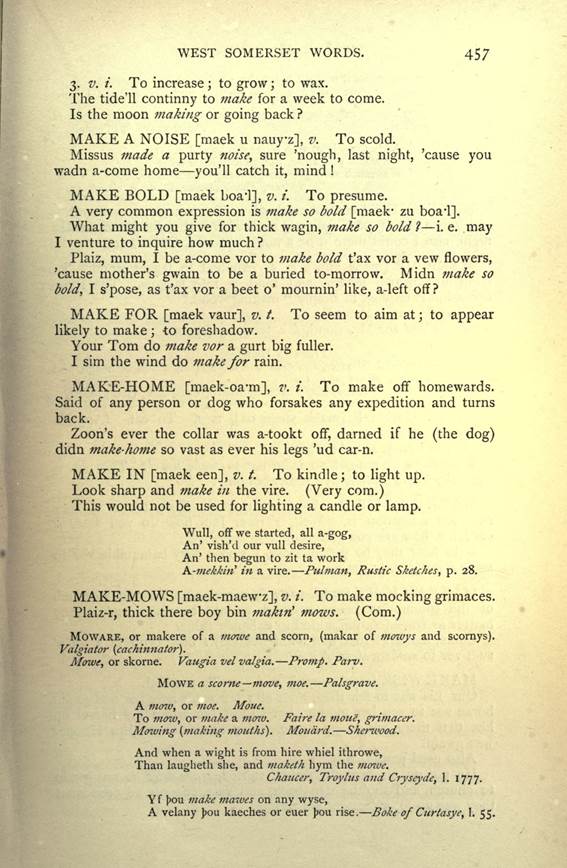
(delwedd B9317) (tudalen 457)
|
WEST
SOMERSET WORDS. 457
3. v. i. To increase; to grow; to wax.
The tide'll continny to make for a week to come.
Is the moon making or going back?
MAKE A NOISE [maek u nauyz], v. To scold.
Missus made a purty noise, sure 'nough, last night, 'cause you wadn a-come home you'll catch it, mind!
MAKE BOLD [maek boa'l], v. i. To presume.
A very common expression is make so bold [maek' zu boa*l].
What might you give for thick wagin, make so boldl i. e. may I venture to inquire how much?
Plaiz, mum, I be a-come vor to make bold t'ax vor a vew flowers, 'cause mother's gwain to be a buried
to-morrow. Midn make so bold, I
s'pose, as t'ax vor a beet o' mournin' like, a-left off?
MAKE FOR [maek vaur], v. t. To seem to aim at; to appear likely to make; -to foreshadow.
Your Tom do make vor a gurt big fuller.
I sim the wind do make for rain.
MAKE-HOME [maek-oa'm], v. i. To make off homewards. Said of any person or dog who forsakes any
expedition and turns back.
Zoon's ever the collar was a-tookt off, darned if he (the dog) didn make-home so vast as ever his legs 'ud
car-n.
MAKE IN [maek een], v. t. To kindle; to light up. Look sharp and make in the vire. (Very
com.) This would not be used for
lighting a candle or lamp.
Wull, off we started, all a-gog,
An' vish'd our vull desire,
An' then begun to zit ta work
A.-mekkin* in a vire. Pulman, Rustic Sketches, p. 28.
MAKE-MOWS [maek-maewz], v. i. To make mocking grimaces. Plaiz-r, thick there boy bin maktn* mows.
(Com.)
MOWARE, or makere of a mowe and scorn, (makar of mowys and scornys). Valgiator (cachinnator). Mowe, or skorne. Vaugia velvalgia. Promp.
Parv.
MOWE a sco me move, moe. Palsgrave.
A mcnv, or moe. Moue.
To mow, or make a mmv. Fat re la moue, grimacer.
Mowing (making mouths}. Monard. Sherwood.
And when a wight is from hire whiel ithrowe,
Than laugheth she, and maketh hym the mowe.
Chaucer, Troy his and Cryseyde, 1. 1777.
Y f JJQU make mawes on any wyse,
A velany Jjou kaeches or euer J>ou rise. Boke of Curtasye, 1. 55.
|
|
|
|
|
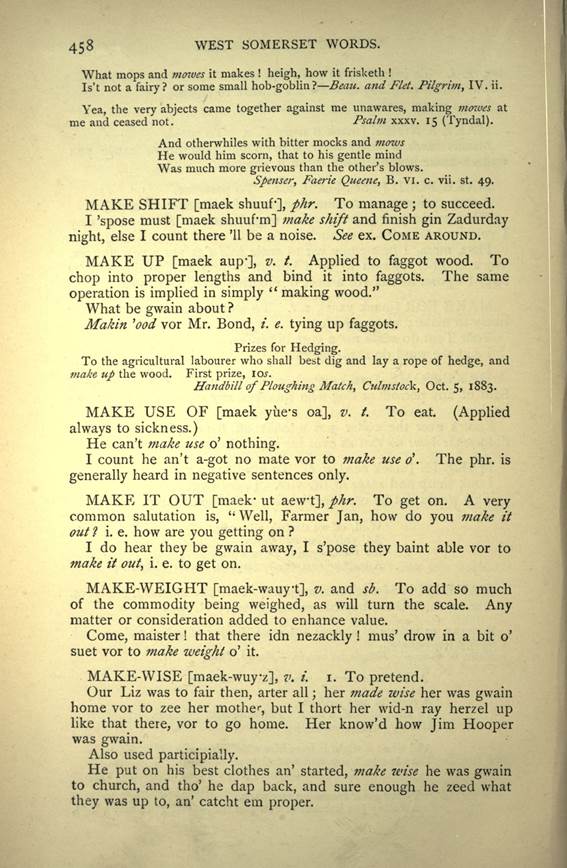
(delwedd B9318) (tudalen 458)
|
458 WEST SOMERSET WORDS.
What mops and mowes it makes! heigh, how it frisketh!
Is't not a fairy? or some small hob-goblin? Beau, and Flet. Pilgrim, IV. ii.
Yea, the very abjects came together against me unawares, making mowes at me and ceased not. Psalm xxxv. 15 (Tyndal).
And otherwhiles with bitter mocks and mows
He would him scorn, that to his gentle mind Was much more grievous than the other's
blows.
Spenser, Faerie Queene, B. vi. c. vii. st. 49.
MAKE SHIFT [maek shuuf'], phr. To manage; to succeed. I 'spose must [maek shuuf'm] make shift and
finish gin Zadurday night, else I
count there '11 be a noise. See ex. COME AROUND.
MAKE UP [maek aup-], v. t. Applied to faggot wood. To chop into proper lengths and bind it into
faggots. The same operation is implied
in simply” making wood."
What be gwain about?
Makin 'ood vor Mr. Bond, /'. e. tying up faggots.
Prizes for Hedging.
To the agricultural labourer who shall best dig and lay a rope of hedge,
and make up the wood. First prize,
los.
Handbill of Ploughing Match, Ctilmstock, Oct. 5, 1883.
MAKE USE OF [maek yue's oa], v. t. To eat. (Applied always to sickness.)
He can't make use o' nothing.
I count he an't a-got no mate vor to make use o\ The phr. is generally heard in negative sentences only.
MAKE IT OUT [maek- ut aewt], phr. To get on. A very common salutation is, '' Well, Farmer Jan,
how do you make it out? i. e. how are
you getting on?
I do hear they be gwain away, I s'pose they baint able vor to make it out, i. e. to get on.
MAKE-WEIGHT [maek-wauyt], v. and sb. To add so much of the commodity being weighed, as will
turn the scale. Any matter or
consideration added to enhance value.
Come, maister! that there idn nezackly! mus' drow in a bit o' suet vor to make weight o' it.
MAKE-WISE [maek-wuyz], v. i. i. To pretend.
Our Liz was to fair then, arter all; her made wise her was gwain home vor to zee her mother, but I thort her
wid-n ray herzel up like that there,
vor to go home. Her know'd how Jim Hooper
was gwain.
Also used participially.
He put on his best clothes an' started, make wise he was gwain to church, and tho' he dap back, and sure
enough he zeed what they was up to,
an' catcht em proper.
|
|
|
|
|
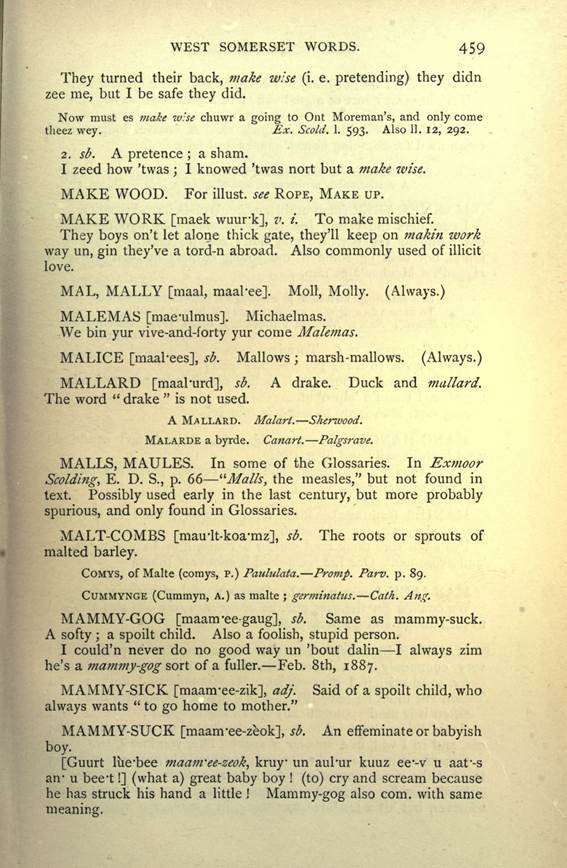
(delwedd B9319) (tudalen 459)
|
WEST SOMERSET WORDS. 459
They turned their back, make wise (i. e. pretending) they didn zee me, but I be safe they did.
Now must es make ivise chuwr a going to Out Moreman's, and only come tlieez wey. Ex. Scold. \. 593. Also 11. 12,
292.
2. sb. A pretence; a sham.
I zeed how 'twas; I knowed 'twas nort but a make wise.
MAKE WOOD. For illust. see ROPE, MAKE UP.
MAKE WORK [maek wuurk], v. t. To make mischief.
They boys on't let alone thick gate, they'll keep on makin work way un, gin they've a tord-n abroad. Also
commonly used of illicit love.
MAL, MALLY [maal, maal'ee]. Moll, Molly. (Always.)
MALEMAS [mae-ulmus]. Michaelmas. We
bin yur vive-and-forty yur come Malemas.
MALICE [maal'ees], sb. Mallows; marsh-mallows. (Always.)
MALLARD [maal'urd], sb. A drake. Duck and mallard. The word” drake” is not used.
A MALLARD. Malarl. Sherwood. MALARDE a
byrde. Canart. Palgsrave.
MALLS, MAULES. In some of the Glossaries. In Exmoor Scolding, E. D. S., p. bb "Malls, the
measles," but not found in text.
Possibly used early in the last century, but more probably spurious, and only found in Glossaries.
MALT-COMBS [mairlt-koa-mz], sb. The roots or sprouts of malted barley.
COMYS, of Malte (comys, P.) Paululata. Promp. Parv. p. 89. CUMMYNGE (Cummyn, A.) as malte; gsrminatus.
Cath. Ang.
MAMMY-GOG [maarrree-gaug], sb. Same as mammy-suck. A softy; a spoilt child. Also a foolish,
stupid person.
I could' n never do no good way un 'bout dalin I always zim he's a mammy-gog sort of a fuller. Feb.
8th, 1887.
MAMMY-SICK [maanree-zik], adj. Said of a spoilt child, who always wants” to go home to mother."
MAMMY-SUCK [maanree-zeok], sb. An effeminate or babyish boy.
[Guurt lue'bee maanvee-zeok, kruy un aul'ur kuuz ee p -v u aat'-s an - u beet!] (what a) great baby boy! (to)
cry and scream because he has struck
his hand a little! Mammy-gog also com. with same meaning.
|
|
|
|
|
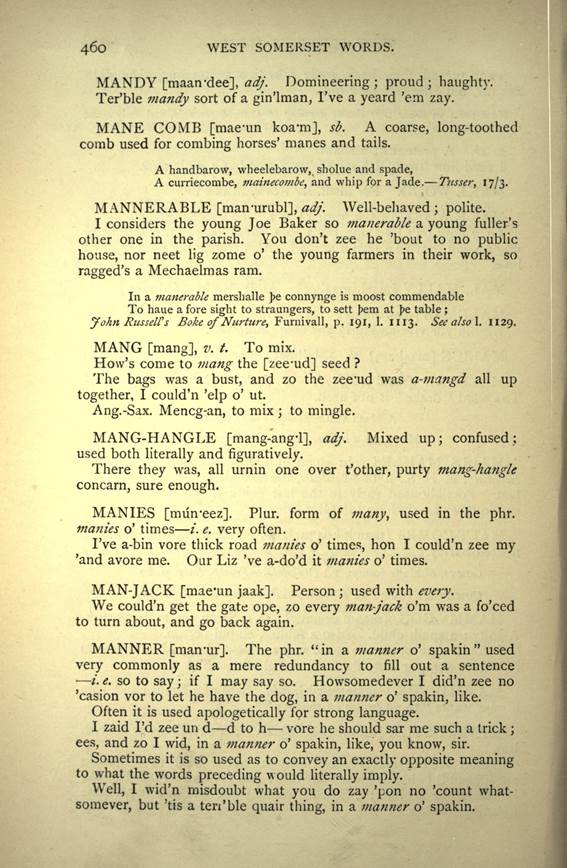
(delwedd B9320) (tudalen 460)
|
460 WEST SOMERSET WORDS.
MANDY [maarrdee], adj. Domineering; proud; haughty. Ter'ble mandy sort of a gin'lman, I've a
yeard 'em zay.
MANE COMB [mae'un koa'm], sb. A coarse, long-toothed comb used for combing horses' manes and
tails.
A handbarow, wheelebarow, sholue and spade,
A curriecombe, mainecombe, and whip for a Jade. Tnsser, 17/3.
MANNERABLE [man nimbi], adj. Well-behaved; polite.
I considers the young Joe Baker so manerable a young fuller's other one in the parish. You don't zee he
'bout to no public house, nor neet lig
zome o' the young farmers in their work, so
ragged's a Mechaelmas ram.
In a manerable mershalle J>e connynge is moost commendable To haue a fore sight to straungers, to sett
J>em at J>e table; John
Russell's Boke of Nurture, Furnivall, p. 191, 1. 1113. See also 1. 1129.
MANG [mang], v. t. To mix. How's come
to mang the [zee'ud] seed?
The bags was a bust, and zo the zee'ud was a-mangd all up together, I could'n 'elp o' ut.
Ang.-Sax. Mencg-an, to mix; to mingle.
MANG-HANGLE [mang-ang-1], adj. Mixed up; confused; used both literally and figuratively.
There they was, all urnin one over t'other, purty mang-hanglc concarn, sure enough.
MANIES [miiireez]. Plur. form of many, used in the phr. manies o' times /. e. very often.
I've a-bin vore thick road manies o' times, hon I could'n zee my 'and avore me. Our Liz 've a-do'd it manies
o' times.
MAN-JACK [mae'un jaak]. Person; used with every. We could'n get the gate ope, zo every
man-jack o'm was a fo'ced to turn
about, and go back again.
MANNER [marrur]. The phr. "in a manner o' spakin" used very commonly as a mere redundancy to fill
out a sentence i.e. so to say; if I
may say so. Howsomedever I did'n zee no
'casion vor to let he have the dog, in a manner o' spakin, like.
Often it is used apologetically for strong language.
I zaid I'd zee un d d to h vore he should sar me such a trick; ees, and zo I wid, in a manner o' spakin,
like, you know, sir.
Sometimes it is so used as to convey an exactly opposite meaning to what the words preceding would literally
imply.
Well, I wid'n misdoubt what you do zay 'pon no 'count whatsomever, but 'tis a
ten'ble quair thing, in a manner o' spakin.
|
|
|
|
|
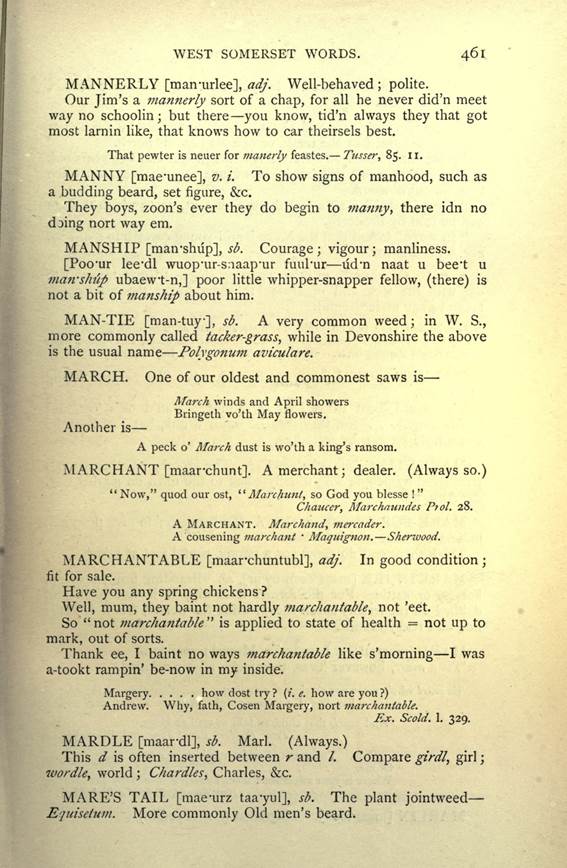
(delwedd B9321) (tudalen 461)
|
WEST SOMERSET WORDS. 461
MANNERLY [mairurlee], adj. Well-behaved; polite.
Our Jim's a mannerly sort of a chap, for all he never did'n meet way no schooling but there you know, tid'n
always they that got most larnin like,
that knows how to car theirsels best.
That pewter is neuer for manerly feastes. Tnsser, 85. II.
MANNY [mae'unee], v. i. To show signs of manhood, such as a budding beard, set figure, &c.
They boys, zoon's ever they do begin to manny, there idn no doing nort way em.
MANSHIP [matvshiip], sb. Courage; vigour; manliness.
[Poo'ur lee'dl wuop'ur-s:iaap*ur fuul'ur lid'n naat u beet u man'shup ubaewt-n,] poor little whipper-snapper
fellow, (there) is not a bit of
manship about him.
MAN-TIE [man-tuy], sb. A very common weed; in W. S., more commonly called tacker-grass, while in
Devonshire the above is the usual name
Polygonum aviculare.
MARCH. One of our oldest and commonest saws is
March winds and April showers Bringeth
vo'th May flowers. Another is
A peck o' March dust is wo'th a king's ransom. MARCHANT [maarchunt]. A merchant; dealer.
(Always so.)
"Now," quod our ost,” Marchunt, so God you blesse!”
Chaucer, Marchaundes PtoL 28.
A MARCHANT. Marc hand, mercadcr.
A cousening marchant ' Maquignon. Sherwood.
MARCHANTABLE [maarchuntubl], adj. In good condition; fit for sale.
Have you any spring chickens?
Well, mum, they baint not hardly marchantable^ not 'eet.
So "not merchantable" is applied to state of health = not up
to mark, out of sorts.
Thank ee, I baint no ways marchantable like s'morning I was a-tookt rampin' be-now in my inside.
Margery how dost try? (i.e. how are you?)
Andrew. Why, fath, Cosen Margery, nort marchantable.
Ex. Scold. 1. 329.
MARDLE [maardl], sb. Marl. (Always.)
This d is often inserted between r and /. Compare girdl, girl; wordle, world; Chardles^ Charles, &c.
MARE'S TAIL [mae-urz taa-yul], sb. The plant jointweed Equisetum. More commonly Old men's beard.
|
|
|
|
|
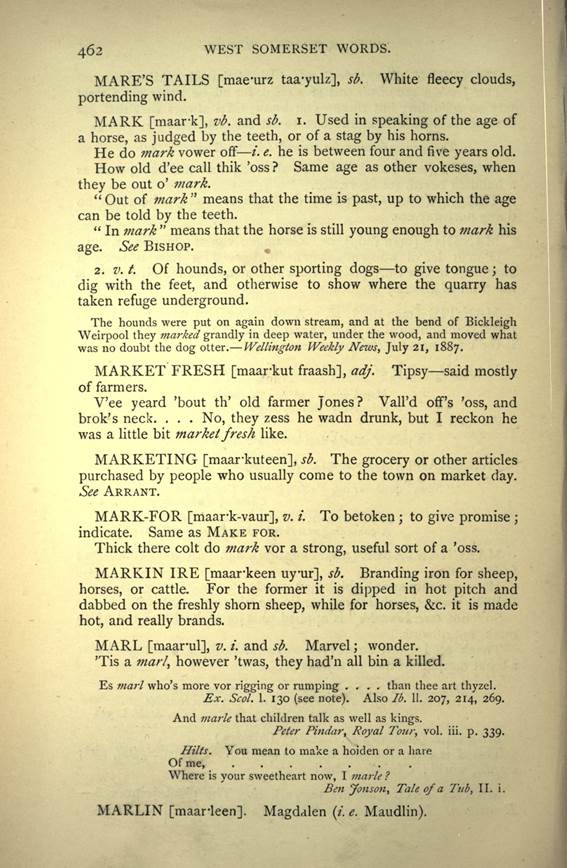
(delwedd B9322) (tudalen 462)
|
462 WEST SOMERSET WORDS.
MARE'S TAILS [mae'urz taa-yulz], sb. White fleecy clouds, portending wind.
MARK [maark], vb. and sb. i. Used in speaking of the age of a horse, as judged by the teeth, or of a
stag by his horns.
He do mark vower off /*. e. he is between four and five years old.
How old d'ee call thik 'oss? Same age as other vokeses, when they be out o' mark.
"Out of mark" means that the time is past, up to which the age can be told by the teeth.
" In mark” means that the horse is still young enough to mark his age. See BISHOP.
2. v. t. Of hounds, or other sporting dogs to give tongue; to dig with the feet, and otherwise to show
where the quarry has taken refuge
underground.
The hounds were put on again down stream, and at the bend of Bickleigh Weirpool they marked grandly in deep water,
under the wood, and moved what was no
doubt the dog otter. Wellington Weekly News, July 21, 1887.
MARKET FRESH [maarkut fraash], adj. Tipsy said mostly of farmers.
V'ee yeard 'bout th' old farmer Jones? Vall'd off's 'oss, and brok's neck. . . . No, they zess he wadn
drunk, but I reckon he was a little
bit market fresh like.
MARKETING [maarkuteen], sb. The grocery or other articles purchased by people who usually come to the
town on market day. See ARRANT.
MARK-FOR [maark-vaur], v. i. To betoken; to give promise; indicate. Same as MAKE FOR.
Thick there colt do mark vor a strong, useful sort of a 'oss.
MARKIN IRE [maarkeen uyur], sb. Branding iron for sheep, horses, or cattle. For the former it is
dipped in hot pitch and dabbed on the
freshly shorn sheep, while for horses, &c. it is made hot, and really brands.
MARL [maarul], v. i. and sb. Marvel; wonder.
'Tis a mar^ however 'twas, they had'n all bin a killed.
Es marl who's more vor rigging or rumping .... than thee art thyzel. Ex. Scol. 1. 130 (see note). Also Ib. 11.
207, 214, 269.
And marie that children talk as well as kings.
Peter Pindar t Royal Tour, vol. iii. p. 339.
Hilts. You mean to make a hoiden or a hare
Of me,
Where is your sweetheart now, I marie?
Ben jfonson, Tale of a Tub, II. i.
MARLIN [maarleen]. Magdalen (/. e. Maudlin).
|
|
|
|
|
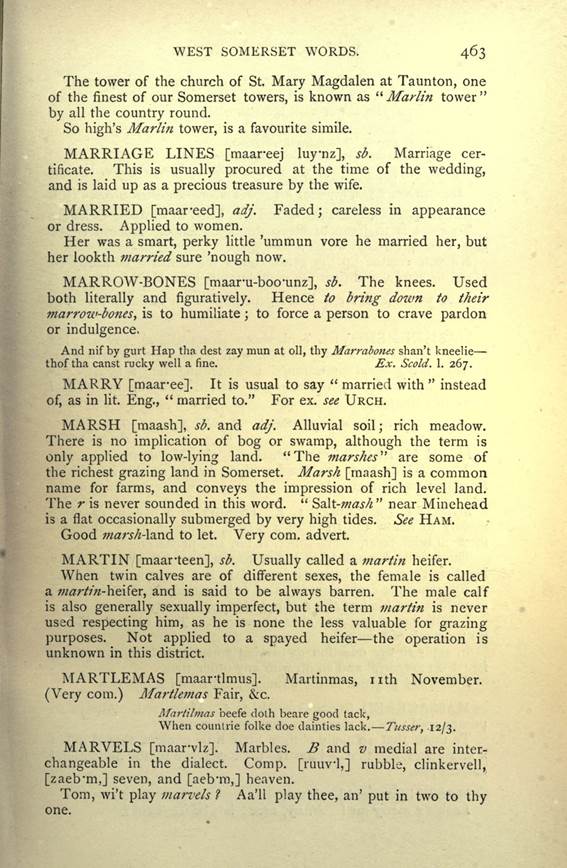
(delwedd B9323) (tudalen 463)
|
WEST SOMERSET WORDS. 463
The tower of the church of St. Mary Magdalen at Taunton, one of the finest of our Somerset towers, is
known as "Martin tower" by
all the country round.
So high's Marlin tower, is a favourite simile.
MARRIAGE LINES [maareej luynz], sb. Marriage certificate. This is usually
procured at the time of the wedding,
and is laid up as a precious treasure by the wife.
MARRIED [maareed], adj. Faded; careless in appearance or dress. Applied to women.
Her was a smart, perky little 'ummun vore he married her, but her iookth married sure 'nough now.
MARROW-BONES [maaru-boo'unz], sb. The knees. Used both literally and figuratively. Hence to
bring down to their marrow-bones, is
to humiliate; to force a person to crave pardon or indulgence,
And nif by gurt Hap tha dest zay mun at oil, thy Marrabones shan't
Uneelie thof tha canst rucky well a
fine. Ex. Scold. 1. 267.
MARRY [maaree]. It is usual to say” married with” instead of, as in lit. Eng.,” married to." For
ex. see URCH.
MARSH [maash], sb. and adj. Alluvial soil; rich meadow. There is no implication of bog or swamp,
although the term is only applied to
low-lying land. "The marshes" are some of the richest grazing land in Somerset. Marsh
[rnaash] is a common name for farms,
and conveys the impression of rich level land. The r is never sounded in this word.”
Salt-mas/i" near Minehead is a
flat occasionally submerged by very high tides. See HAM.
Good marsh-land to let. Very com. advert.
MARTIN [maarteen], sb. Usually called a martin heifer.
When twin calves are of different sexes, the female is called a;0/tf;Vz-heifer, and is said to be always
barren. The male calf is also
generally sexually imperfect, but the term martin is never used respecting him, as he is none the less
valuable for grazing purposes. Not
applied to a spayed heifer the operation is
unknown in this district.
MARTLEMAS [maartlmus]. Martinmas, nth November. (Very com.) Martlemas Fair, &c.
Martilmas beefe doth beare good tack,
When countrie folke doe dainties lack. Tusser, 12/3.
MARVELS [maarvlz]. Marbles. B and v medial are interchangeable in the
dialect. Comp. [ruuvl,] rubble, clinkervell,
[zaeb'm,] seven, and [aeb'm,] heaven.
Tom, wi't play marvels? Aa'll play thee, an' put in two to thy one.
|
|
|
|
|

(delwedd B9324) (tudalen 464)
|
464 WEST SOMERSET WORDS.
MAS [maas]. Contr. of master, before a name. (Very com.) Mas' Chardles, I wish you'd let they there
tools alone. I likes Mas' Jim better-n
all the rest o'm.
Tipto. What, Burst? Pierce. Mas
Bartolmew Burst, One that hath been a
citizen, since a coin-tier.
Ben Jonson, N&v Inn, III. i. Pen.
Sen. But mas Broker here, He shall
attend you, nephew; her grace's usher. Ib. Staple of News, II. i.
MASH [maash, mursh], vb. and sb. Used in speaking of hares.
To mash is to jump or creep through a fence. A mash is the gap or creep through which a hare goes.
Nif you vreathe up the gates, zoon's the corn's a cut, they be fo'ced to mashy, and then the night-hunters
be a doo'd.
2. A warm feed for a horse generally bran scalded with hot water.
MASHING SHOVEL [mursheen shaewul], sb. A brewing implement, having a long handle, with cross
pieces at the end, so that the general
appearance is something like a shovel. It
is used in stirring up the mash, or wetted malt, in the act of extracting the wort.
MASCHEL, or rothyr, or masch-scherel. Remulus, palmula, mixtorium.
Promp. Parv.
MASH MALL1CE [maash maal'ees], sb. Marsh mallows. Mash malltce tay's the finedest thing in
the wordle vor th' infermation (inflammation).
MASON Y [mae'usnee], v. i. To work as a mason, or more usually to follow the trade of a mason,
which in W. S. includes those of
brick-layer, stone-waller, slater, and plasterer.
The infinitive termination added to the substantive name of any handicraft's man, verbalizes it, and gives
it the frequentative force of
following the craft, as well as of only working at it specifically, as \.Q farmery, blacksmithy, taildery,
doctory, zaddlery, &c.
I did'n know you was able to masony. This means, able to do the work of a mason.
In reply to the question as to what a man's trade is, the answer is,” I do masony" and so on with any
other trade.
I sar'd my perntice to the hutching, but now I do masony.
MASSACREED [maas'ukreed], p. p. Massacred. Always so pronounced; by no means an uncommon word.
To think that so many o' they poor little chillern should a bin a massacreed like that. June 1883.
Reference to the Sunderland
catastrophe.
MASSY! [mas-ee! ]. Mercy.
Lauk's a massy me! Massy, soce! hot be 'ee 'bout?
|
|
|
|
|
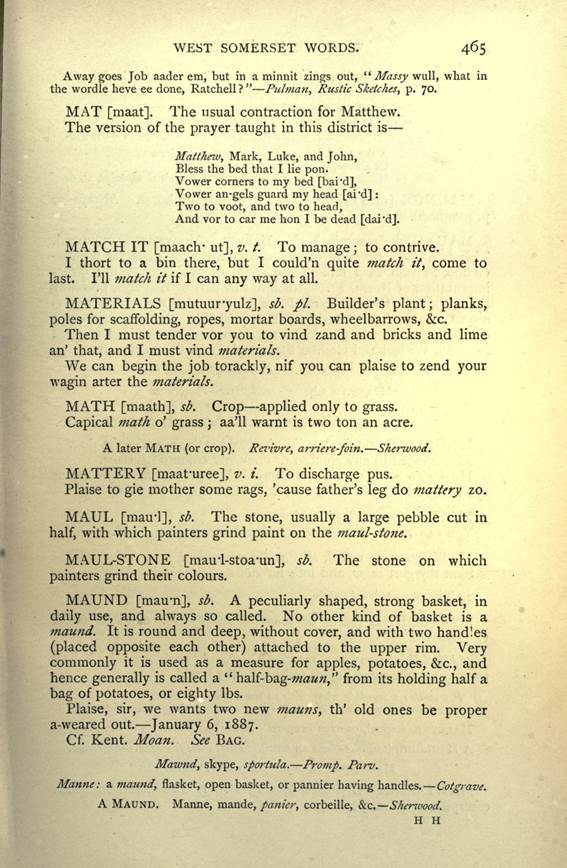
(delwedd B9325) (tudalen 465)
|
WEST SOMERSET WORDS. 465
Away goes Job aader em, but in a minnit zings out, "Massy wull, what
in the wordle heve ee done,
Ratchell?" Pulman, Rustic Sketches, p. 70.
MAT [maat]. The usual contraction for Matthew. The version of the prayer taught in this
district is
Matthew, Mark, Luke, and John,
Bless the bed that I lie pon.
Vower corners to my bed [bard],
Vower an-gels guard my head [ai'd]:
Two to voot, and two to head,
And vor to car me lion I be dead [dai *d].
MATCH IT [maach- ut], v. t. To manage; to contrive. I thort to a bin there, but I could'n quite
match if, come to last. I'll match it
if I can any way at all.
MATERIALS [mutuuryulz], sb. pi. Builder's plant; planks, poles for scaffolding, ropes, mortar
boards, wheelbarrows, &c.
Then I must tender vor you to vind zand and bricks and lime an' that, and I must vind materials.
We can begin the job torackly, nif you can plaise to zend your wagin arter the materials.
MATH [maath], sb. Crop applied only to grass.
Capical math o' grass; aa'll warnt is two ton an acre.
A later MATH (or crop). Revivre, arriere-foin. Sherwood.
MATTERY [maafuree], v. i. To discharge pus.
Plaise to gie mother some rags, 'cause father's leg do mattery zo.
MAUL [mairl], sb. The stone, usually a large pebble cut in half, with which painters grind paint on
the maul-stone.
MAUL-STONE [mairl-stoa-un], sb. The stone on which painters grind their colours.
MAUND [mairn], sb. A peculiarly shaped, strong basket, in daily use, and always so called. No other
kind of basket is a mound. It is round
and deep, without cover, and with two handles
(placed opposite each other) attached to the upper rim. Very commonly it is used as a measure for
apples, potatoes, &c., and hence
generally is called a” half-bag-mo**,' 1 from its holding half a bag of potatoes, or eighty Ibs.
Plaise, sir, we wants two new mauns, th' old ones be proper a-weared out. January 6, 1887.
Cf. Kent. Moan. See BAG.
Mawnd, skype, sportula. Pro tup. Parv.
Manne: a maund, flasket, open basket, or pannier having handles.
Cotgrave. A MAUND. Manne, mande,
panicr, corbeille, &c. Sherwood.
H H
|
|
|
|
|
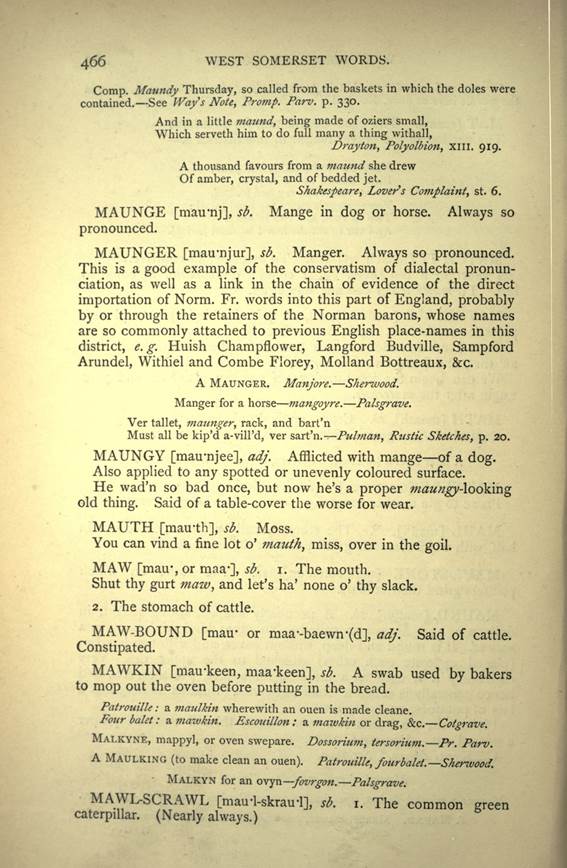
(delwedd B9326) (tudalen 466)
|
466 WEST SOMERSET WORDS.
Comp. Maundy Thursday, so called from the baskets in which the doles
were contained. See Way's Note, Promp.
Parv. p. 330.
And in a little maund, being made of oziers small, Which serveth him to do full many a thing
withall,
Drayton, Polyolbion, XIII. 919.
A thousand favours from a maund she drew
Of amber, crystal, and of bedded jet.
Shakespeare, Lover's Complaint, st. 6.
MAUNGE [mairnj], sb. Mange in dog or horse. Always so pronounced.
MAUNGER [mairnjur], sb. Manger. Always so pronounced. This is a good example of the conservatism
of dialectal pronunciation, as well as a link in the chain of evidence of the
direct importation of Norm. Fr. words
into this part of England, probably by
or through the retainers of the Norman barons, whose names are so commonly attached to previous
English place-names in this district,
e. g. Huish Champflower, Langford Budville, Sampford Arundel, Withiel and Combe Florey, Molland
Bottreaux, &c.
A MAUNGER. Manjore. Sherwood. Manger
for a horse mangoyre. Palsgrave.
Ver tallet, maunger, rack, and bart'n
Must all be kip'd a-vill'd, ver sart'n.-r-/Wwa#, Rustic Sketches, p. 20.
MAUNGY [mau-njee], adj. Afflicted with mange of a dog. Also applied to any spotted or unevenly
coloured surface. He wad'n so bad
once, but now he's a proper maungy-lookmg
old thing. Said of a table-cover the worse for wear.
MAUTH [matrth], sb. Moss.
You can vind a fine lot o' mauth, miss, over in the goil.
MAW [mair, or maa*], sb. i. The mouth.
Shut thy gurt maw, and let's ha' none o' thy slack.
2. The stomach of cattle.
MAW-BOUND [mair or maa'-baewn ((!], adj. Said of cattle. Constipated.
MAWKIN [mau-keen, maa'keen], sb. A swab used by bakers to mop out the oven before putting in the
bread.
Patrouille: a manikin wherewith an ouen is made cleane.
Four balet: a mawkin. Escouillon: a mawkin or drag, &c. Cotgrave.
MALKYNE, mappyl, or oven swepare. Dossorium, tersorium. Pr. Parv. A MAULKING (to make clean an ouen).
Patrouille, fourbalet. Sherwood.
MALKYN for an o\ynfovrgon. Palsgrave.
MAWL-SCRAWL [mau-1-skrairl], sb. i. The common green caterpillar. (Nearly always.)
|
|
|
|
|
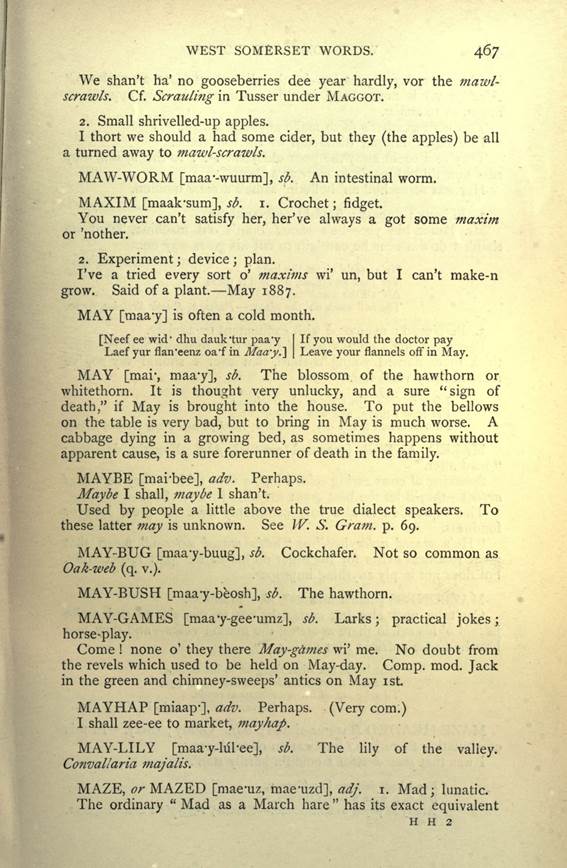
(delwedd B9327) (tudalen 467)
|
WEST SOMERSET WORDS. 467
We shan't ha' no gooseberries dee year hardly, vor the mawl-scrawls. Cf.
Scrauling in Tusser under MAGGOT.
2. Small shrivelled-up apples.
I thort we should a had some cider, but they (the apples) be all a turned away to mawl-scrawls.
MAW-WORM [maa'-wuurm], sb. An intestinal worm.
MAXIM [maak'sum], sb. i. Crochet; fidget.
You never can't satisfy her, her've always a got some maxim or 'nother.
2. Experiment; device; plan.
I've a tried every sort o' maxims wi' un, but I can't make-n grow. Said of a plant. May 1887.
MAY [maay] is often a cold month.
[Neef ee wid' dhu dauk'tur paa'y I If you would the doctor pay Laef yur flan'eenz oa'f in Maa'yJ\ \ Leave
your flannels off in May.
MAY [mar, maa'y], sb. The blossom of the hawthorn or whitethorn. It is thought very unlucky, and
a sure ''sign of death," if May
is brought into the house. To put the bellows
on the table is very bad, but to bring in May is much worse. A cabbage dying in a growing bed, as
sometimes happens without apparent
cause, is a sure forerunner of death in the family.
MAYBE [mai-bee], adv. Perhaps. Maybe I
shall, maybe 1 shan't.
Used by people a little above the true dialect speakers. To these latter may is unknown. See W. S.
Gram. p. 69.
MAY BUG [maa'y-buug], sb. Cockchafer. Not so common as Oak-web (q. v.).
MAY-BUSH [maay-beosh], sb. The hawthorn.
MAY-GAMES [maa'y-gee'umz], sb. Larks; practical jokes; horse-play.
Come! none o' they there May-games wi' me. No doubt from the revels which used to be held on
May-day. Comp. mod. Jack in the green
and chimney-sweeps' antics on May ist.
MAYHAP [miaap'], adv. Perhaps. (Very com.)
I shall zee-ee to market, mayhap.
MAY-LILY [maa-y-luTee], sb. The lily of the valley. Convallaria majalis.
MAZE, or MAZED [mae f uz, mae'uzd], adj. i. Mad; lunatic. The ordinary” Mad as a March hare” has its
exact equivalent
H H 2
|
|
|
|
|
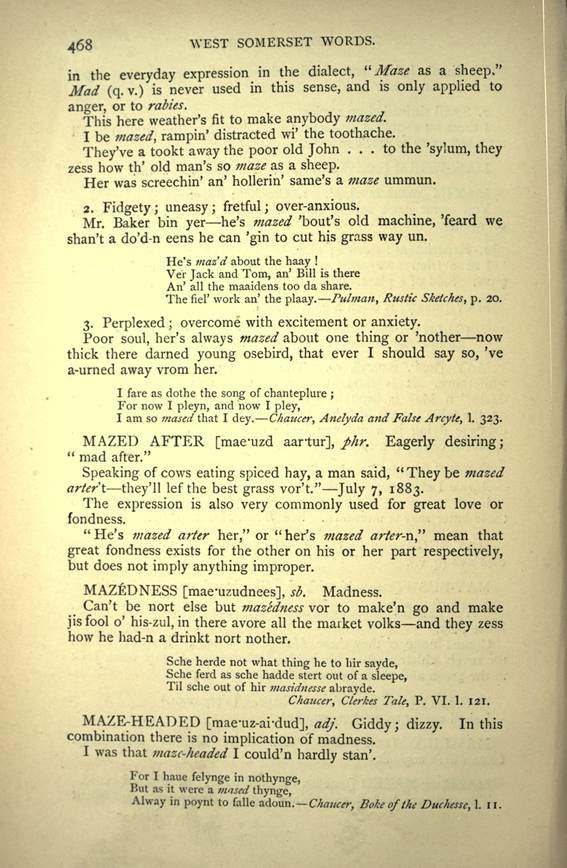
(delwedd B9328) (tudalen 468)
|
468 WEST SOMERSET WORDS.
in the everyday expression in the dialect, "Maze as a sheep," Mad (q. v.) is never used in this sense,
and is only applied to anger, or to
rabies.
This here weather's fit to make anybody mazed.
I be mazed, rampin' distracted wi' the toothache.
They've a tookt away the poor old John ... to the 'sylum, they zess how th' old man's so maze as a sheep.
Her was screechin' an' hollerin' same's a maze ummun.
2. Fidgety; uneasy; fretful; over-anxious.
Mr. Baker bin yer he's mazed 'bout's old machine, 'feard we shan't a do'd-n eens he can 'gin to cut his
grass way un.
He's mazd about the haay!
Ver Jack and Tom, an' Bill is there
An' all the maaidens too da share.
The fiel' work an' the plaay. Pulman, Rustic Sketches, p. 20.
3. Perplexed; overcome with excitement or anxiety.
Poor soul, her's always mazed about one thing or 'nother now thick there darned young osebird, that ever
I should say so, 've a-urned away vrom
her.
I fare as dothe the song of chanteplure;
For now I pleyn, and now I pley,
I am so mased that I dey. Chaucer, Anelyda and False Arcyte, 1. 323.
MAZED AFTER [mae'uzd aartur], phr. Eagerly desiring; “mad after."
Speaking of cows eating spiced hay, a man said,” They be mazed arter\ they'll lef the best grass
vor't." July 7, 1883.
The expression is also very commonly used for great love or fondness.
"He's mazed arter her," or "her's mazed arter-n" mean
that great fondness exists for the
other on his or her part respectively,
but does not imply anything improper.
MAZEDNESS [mae'uzudnees], sb. Madness.
Can't be nort else but mazedness vor to make'n go and make jisfool o' his-zul, in there avore all the
market volks and they zess how he
had-n a drinkt nort nother.
Sche herde not what thing he to hir sayde,
Sche ferd as sche hadde stert out of a sleepe, Til sche out of hir masidnesse abrayde.
Chaucer, Clerkes Tale, P. VI. 1. 121.
MAZE-HEADED [mae'uz-ai'dud], adj. Giddy; dizzy. In this combination there is no implication of
madness. I was that maze-headed I
could'n hardly stan'.
For I haue felynge in nothynge,
But as it were a mased thynge,
Alway in poynt to falle adoun. Chaucer, Boke of the Duchessc, 1. 11.
|
|
|
|
|
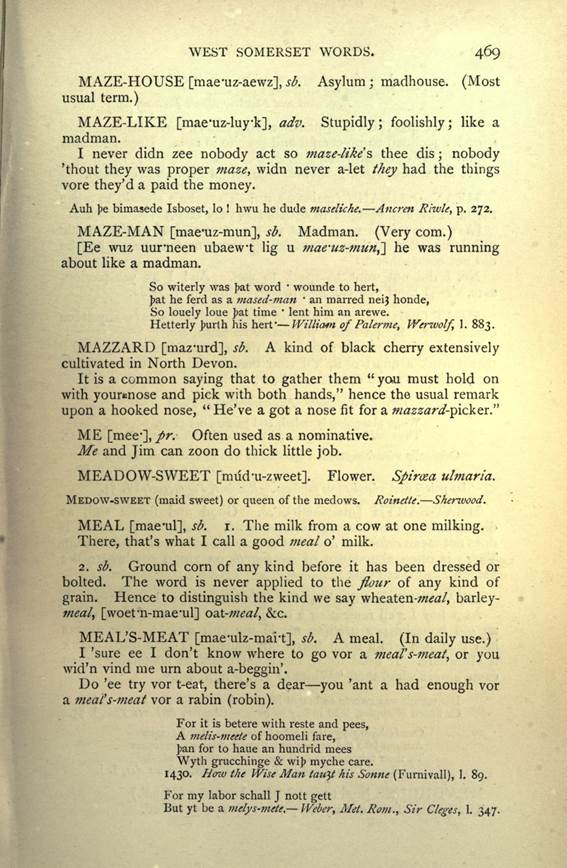
(delwedd B9329) (tudalen 469)
|
WEST SOMERSET WORDS. 469
MAZE-HOUSE [maeniz-aewz], sb. Asylum; madhouse. (Most usual term.)
MAZE-LIKE [mae'uz-luyk], adv. Stupidly; foolishly; like a madman.
I never didn zee nobody act so maze-like 's thee dis; nobody 'thout they was proper maze, widn never
a-let they had the things vore they'd
a paid the money.
Auh )>e bimasede Isboset, lo! hwu he dude maseliche. Ancren Riivle, p.
272.
MAZE-MAN [mae'uz-mun], sb. Madman. (Very com.) [Ee wuz uurneen ubaewt lig u mae'uz-mun,~\
he was running about like a madman.
So witerly was J>at word wounde to hert,
j>at he ferd as a mased-man ' an marred neij honde,
So louely loue ]>at time ' lent him an arewe.
Hetterly Jwrth his herf William of Palerme, Wei-wolf, 1. 883.
MAZZARD [maz-urd], sb. A kind of black cherry extensively cultivated in North Devon.
It is a common saying that to gather them” you must hold on with yourtnose and pick with both
hands," hence the usual remark
upon a hooked nose,” He've a got a nose fit for a
mazzard-picker."
ME [mee 1 ], pr.- Often used as a nominative.
Me and Jim can zoon do thick little job.
MEADOW-SWEET [miid'u-zweet]. Flower. Spircea ulmaria. MEDOW-SWEET (maid sweet) or queen of the
medows. Roinette. Shenvood.
MEAL [mae'ul], sb. i. The milk from a cow at one milking. There, that's what I call a good meal o'
milk.
2. sb. Ground corn of any kind before it has been dressed or bolted. The word is never applied to the
flour of any kind of grain. Hence to
distinguish the kind we say wheaten-/w<?tf/, barley-meal) [woet'n-mae'ul]
oa.t-mea/, &c.
MEAL'S-MEAT [mae-ulz-mart], sb. A meal. (In daily use.) I 'sure ee I don't know where to go vor a
meal's-meat, or you
wid'n vind me urn about a-beggin'.
Do 'ee try vor t-eat, there's a dear you 'ant a had enough vor
a meats-meat vor a rabin (robin).
For it is betere with reste and pees,
A melis-meete of hoomeli fare, fan
for to haue an hundrid mees Wyth
grucchinge & wi}> myche care.
1430. How the Wise Man tau^t his Sonne (Furnivall), 1. 89.
For my labor schall J nott gett
But yt be a melys-mete Weber, Met. Rom., Sir Cleges, 1. 347.
|
|
|
|
|
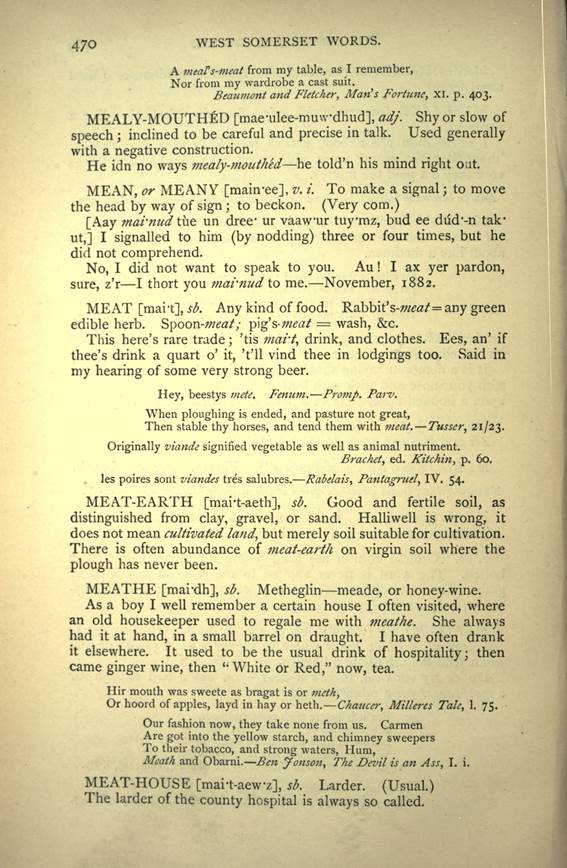
(delwedd B9330) (tudalen 470)
|
470 WEST SOMERSET WORDS.
A meats-meat from my table, as I remember,
Nor from my wardrobe a cast suit.
Beaumont and Fletcher, Man's Fortune, XI. p. 403.
MEALY-MOUTHED [mae'ulee-mmvdhud], adj. Shy or slow of speech; inclined to be careful and precise
in talk. Used generally with a
negative construction.
He idn no ways mealy-mouthed he told'n his mind right out.
MEAN, or ME ANY [manree], v. i. To make a signal; to move the head by way of sign; to beckon. (Very
com.)
[Aay mai'nudthe un dree- ur vaawur tuymz, bud ee diid'-n tak-ut,] I signalled
to him (by nodding) three or four times, but he did not comprehend.
No, I did not want to speak to you. Au! I ax yer pardon, sure, z'r I thort you mai'nud to me.
November, 1882.
MEAT [mart], sb. Any kind of food. Rabbit's-aw0/= any green edible herb. Spoon-meat; pig's-meat = wash,
&c.
This here's rare trade; 'tis mart, drink, and clothes. Ees, an' if thee's drink a quart o' it, 't'll vind thee
in lodgings too. Said in my hearing of
some very strong beer.
Hey, beestys mete. Fenum. Promp. Parv.
When ploughing is ended, and pasture not great,
Then stable thy horses, and tend them with meat. Tusser, 21/23.
Originally viande signified vegetable as well as animal nutriment.
Bracket, ed. Kitchin, p. 60.
les poires sont viandes tres salubres. Rabelais, Pantagruel, IV. 54.
MEAT-EARTH [mart-aeth], sb. Good and fertile soil, as distinguished from clay, gravel, or sand.
Halliwell is wrong, it does not mean
cultivated land, but merely soil suitable for cultivation. There is often abundance of meat-earth on
virgin soil where the plough has never
been.
MEATHE [mardh], sb. Metheglin meade, or honey-wine.
As a boy I well remember a certain house I often visited, where an old housekeeper used to regale me with
meathe. She always had it at hand, in
a small barrel on draught. I have often drank
it elsewhere. It used to be the usual drink of hospitality; then came ginger wine, then "White or
Red," now, tea.
Hir mouth was sweete as bragat is or meth,
Or hoord of apples, layd in hay or heth. Chaucer, Milleres Tale, 1. 75.
Our fashion now, they take none from us. Carmen
Are got into the yellow starch, and chimney sweepers
To their tobacco, and strong waters, Hum,
Meath and Obarni. Ben Jonson, The Devil is an Ass, I. i.
MEAT-HOUSE [mart-aewz], sb. Larder. (Usual.)
The larder of the county hospital is always so called.
|
|
|
|
|
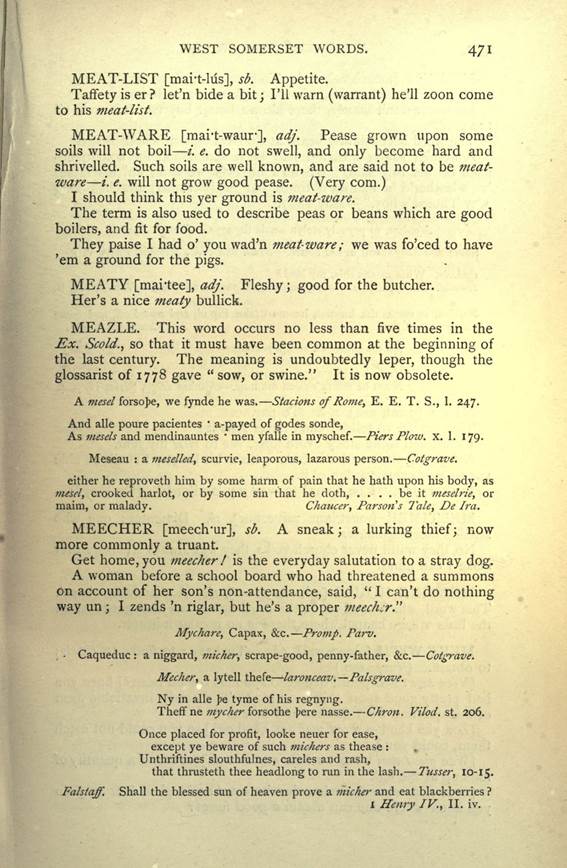
(delwedd B9331) (tudalen 471)
|
WEST SOMERSET WORDS. 4/1
MEAT-LIST [mart-Ms], sb. Appetite.
Taffety is er? let'n bide a bit; I'll warn (warrant) he'll zoon come to his meat-list.
MEAT-WARE [mai't-waur], adj. Pease grown upon some soils will not boil i. e. do not swell, and
only become hard and shrivelled. Such
soils are well known, and are said not to be meat-ware /. e. will not grow
good pease. (Very com.)
I should think this yer ground is meat-ware.
The term is also used to describe peas or beans which are good boilers, and fit for food.
They paise I had o' you wad'n meat-ware; we was fo'ced to have 'em a ground for the pigs.
MEATY [mai-tee], adj. Fleshy; good for the butcher. Her's a nice meaty bullick.
MEAZLE. This word occurs no less than five times in the Ex. Scold., so that it must have been
common at the beginning of the last
century. The meaning is undoubtedly leper, though the glossarist of 1778 gave” sow, or
swine." It is now obsolete.
A mesel forso)>e, we fynde he was. Stations of Rome, E. E. T. S., 1. 247.
And alle poure pacientes * a-payed of godes sonde,
As mesels and mendinauntes * men yfalle in myschef. Piers Plow. X. 1. 179.
Meseau: a meselled, scurvie, leaporous, lazarous person. Cotgrave.
either he reproveth him by some harm of pain that he hath upon his body,
as mesel, crooked harlot, or by some
sin that he doth, . . . . be it meselrie, or
maim, or malady. Chaucer, Parson s Tale, De Ira.
MEECHER [meech'ur], sb. A sneak; a lurking thief; now more commonly a truant.
Get home, you meechcr! is the everyday salutation to a stray dog.
A woman before a school board who had threatened a summons on account of her son's non-attendance,
said,” I can't do nothing way un; I
zends 'n riglar, but he's a proper meecfcr."
Mychare, Capax, &c. Promp. Parv.
Caqueduc: a niggard, micher, scrape-good, penny-father, &c.
Cotgrave. Meeker, a lytell thefe
laronceav. Palsgrave.
Ny in alle ]>e tyme of his regnyng.
Theff ne my c her forsothe J>ere nasse. Chron. Vilod. st. 206.
Once placed for profit, looke neuer for ease,
except ye beware of such michers as thease: *
Unthriftines slouthfulnes, careles and rash,
that thrusteth thee headlong to run in the lash. Tusser, 10-15.
Falstaff. Shall the blessed sun of heaven prove a micher and eat
blackberries?
I Henry IV., II. iv.
|
|
|
|
|
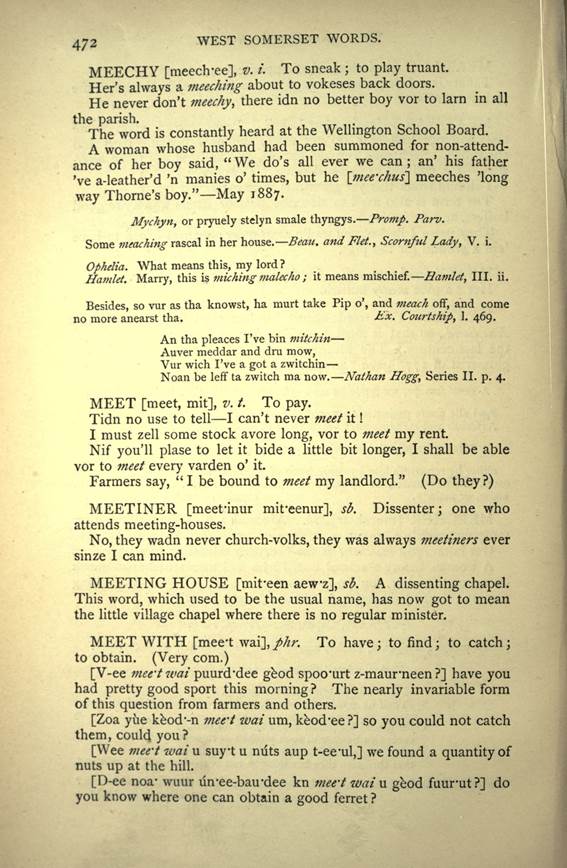
(delwedd B9332) (tudalen 472)
|
472
WEST SOMERSET WORDS.
MEECHY [meech-ee], v. f. To sneak; to play
truant.
Her's always a meeching about to vokeses back doors.
He never don't meechy, there idn no better boy vor to larn in all
The word is constantly heard at the Wellington School Board.
A woman whose husband had been summoned for non-attendance of her boy said,
"We do's all ever we can; an' his father
've a-leather'd 'n manies o' times, but he \ - mee*chus\ meeches 'long way Thome's boy." May 1887.
Mychyn, or pryuely stelyn smale thyngys. /V00*/. Parv. Some matching rascal in her house. Beau,
and /%/., Scornful Lady, V. i.
Ophelia. What means this, my lord?
Hamlet. Marry, this is miching malecho; it means mischief. Hamlet, III. ii.
Besides, so vur as tha knowst, ha murt take Pip o', and meach off, and
come no more anearst tha. MX.
Courtship, 1. 469.
An tha pleaces I've bin mitchin
Auver meddar and dru mow,
Vur wich I've a got a zwitchin
Noan be leff ta zwitch ma now. Nathan Hogg, Series II. p. 4.
MEET [meet, mit], v. t. To pay. Tidn
no use to tell I can't never meet it!
I must zell some stock avore long, vor to meet my rent. Nif you'll plase to let it bide a little
bit longer, I shall be able vor to
meet every varden o' it.
Farmers say,” I be bound to meet my landlord." (Do they?)
MEETINER [meet'inur mifeenur], sb. Dissenter; one who attends meeting-houses.
No, they wadn never church-volks, they was always meetiners ever sinze I can mind.
MEETING HOUSE [mifeen aewz], sb. A dissenting chapel. This word, which used to be the usual name,
has now got to mean the little village
chapel where there is no regular minister.
MEET WITH [mee-t wai],//;r. To have; to find; to catch; to obtain. (Very com.)
[V-ee mee't wai puurd'dee geod spoo'urt z-maurneen?] have you had pretty good sport this morning? The
nearly invariable form of this
question from farmers and others.
[Zoa yue keod'-n mee't wai um, keod'ee?] so you could not catch them, could you?
[Wee mee-t wai u suyt u nuts aup t-ee'ul,] we found a quantity of nuts up at the hill.
[D-ee noa- wuur lin-ee-bau'dee kn mee't wai u geod fuurut?] do you know where one can obtain a good
ferret?
|
|
|
|
|
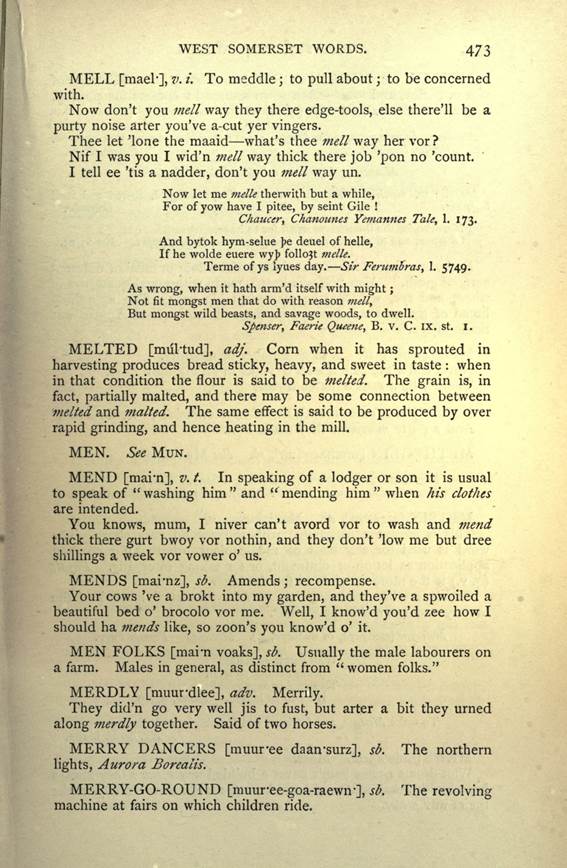
(delwedd B9333) (tudalen 473)
|
WEST SOMERSET WORDS. 473
MELL [mael'], v. i. To meddle; to pull about; to be concerned with.
Now don't you mell way they there edge-tools, else there'll be a purty noise arter you've a-cut yer vingers.
Thee let 'lone the maaid what's thee mell way her vor?
Nif I was you I wid'n mell way thick there job 'pon no 'count.
I tell ee 'tis a nadder, don't you mell way un.
Now let me melle therwith but a while,
For of yow have I pitee, by seint Gile!
Chaucer; Chanounes Yemannes Talc, 1. 173.
And bytok hym-selue J>e deuel of helle,
If he wolde euere wy)> follojt melle.
Terme of ys lyues day. Sir Ferumfiras, 1. 5749.
As wrong, when it hath arm'd itself with might;
Not fit mongst men that do with reason mell,
But mongst wild beasts, and savage woods, to dwell.
Spenser, Faerie Queene, B. v. C. IX. st. i.
MELTED [muTtud], adj. Corn when it has sprouted in harvesting produces bread sticky, heavy,
and sweet in taste: when in that
condition the flour is said to be melted. The grain is, in fact, partially malted, and there may be
some connection between melted and
malted. The same effect is said to be produced by over rapid grinding, and hence heating in the
mill.
MEN. See MUN.
MEND [mai-n], v. t. In speaking of a lodger or son it is usual to speak of "washing him" and
"mending him" when his clothes
are intended.
You knows, mum, I niver can't avord vor to wash and mend thick there gurt bwoy vor nothin, and they
don't 'low me but dree shillings a
week vor vower o' us.
MENDS [marnz], sb. Amends; recompense.
Your cows Ve a brokt into my garden, and they've a spwoiled a beautiful bed o' brocolo vor me. Well, I
know'd you'd zee how I should ha mends
like, so zoon's you know'd o' it.
MEN FOLKS [marn voaks], sb. Usually the male labourers on a farm. Males in general, as distinct from”
women folks."
MERDLY [muurdlee], adv. Merrily.
They did'n go very well jis to fust, but arter a bit they urned along merdly together. Said of two horses.
MERRY DANCERS [muuree daarrsurz], sb. The northern lights, Aurora Borealis.
MERRY-GO-ROUND [muuree-goa-raewir], sb. The revolving machine at fairs on which children ride.
|
|
|
|
|
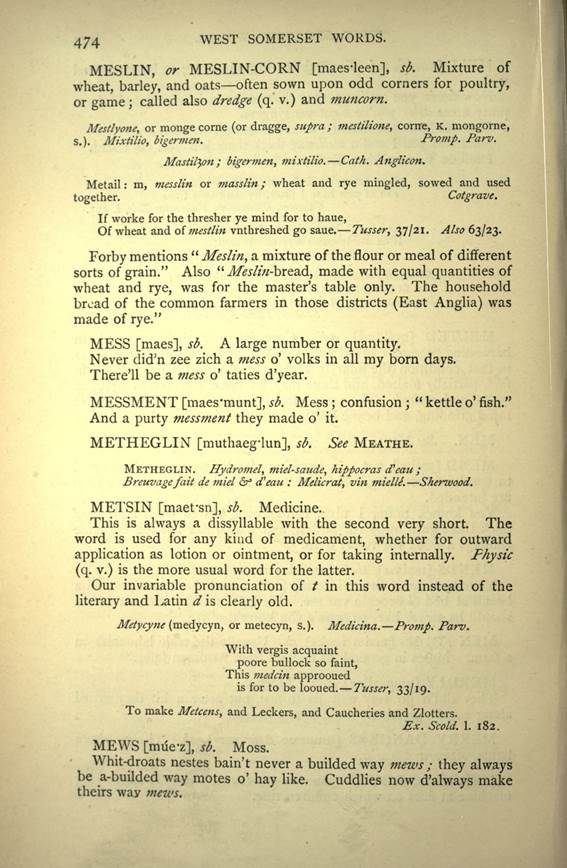
(delwedd B9334) (tudalen 474)
|
474 WEST SOMERSET WORDS.
MESLIN, or MESLIN-CORN [maes-leen], sb. Mixture of wheat, barley, and oats often sown upon odd
corners for poultry, or game; called
also dredge (q. v.) and muncorn.
Mestlyone, or monge corne (or dragge, supra; mestilione, come, K.
mongorne, S.). Mixtilio, bigermen.
Promp. Parv.
Mastifyon; bigermen, mixtilio. Cath. Anglican.
Metail: m, messlin or mass/in; wheat and rye mingled, sowed and used together. Cotgrave.
If worke for the thresher ye mind for to haue,
Of wheat and of mestlin vnthreshed go saue. Tusser, 37/21. Also 63/23.
Forby mentions” Meslin, a mixture of the flour or meal of different sorts of grain." Also” Mestm-bre&d,
made with equal quantities of wheat
and rye, was for the master's table only. The household bread of the common farmers in those
districts (East Anglia) was made of
rye."
MESS [maes], sb. A large number or quantity.
Never did'n zee zich a mess o' volks in all my born days.
There'll be a mess o' taties d'year.
MESSMENT [inaes'munt], sb. Mess; confusion;” kettle o' fish." And a purty messment they made o' it.
METHEGLIN [muthaeg-lun], sb. See MEATHE.
METHEGLIN. Hydroniel, miel-saude, hippocras d? eau;
Breuv age fait de miel &* d'eau: Mclicrat, vin mielle. Sherwood.
METSIN [maet-sn], sb. Medicine.
This is always a dissyllable with the second very short. The word is used for any kind of medicament,
whether for outward application as lotion
or ointment, or for taking internally. Physic
(q. v.) is the more usual word for the latter.
Our invariable pronunciation of / in this word instead of the literary and Latin d is clearly old.
Metycyne (medycyn, or metecyn, s.). Medicina. Promp. Parv.
With vergis acquaint
poore bullock so faint, This medcin
approoued
is for to be looued. Tusser, 33/19.
To make Metcens, and Leckers, and Caucheries and Zlotters.
Ex. Scold. 1. 182.
MEWS [mue-z], sb. Moss.
Whit-droats nestes bain't never a builded way mews; they always be a-builded way motes o' hay like.
Cuddlies now d'always make theirs way
mews.
|
|
|
|
|
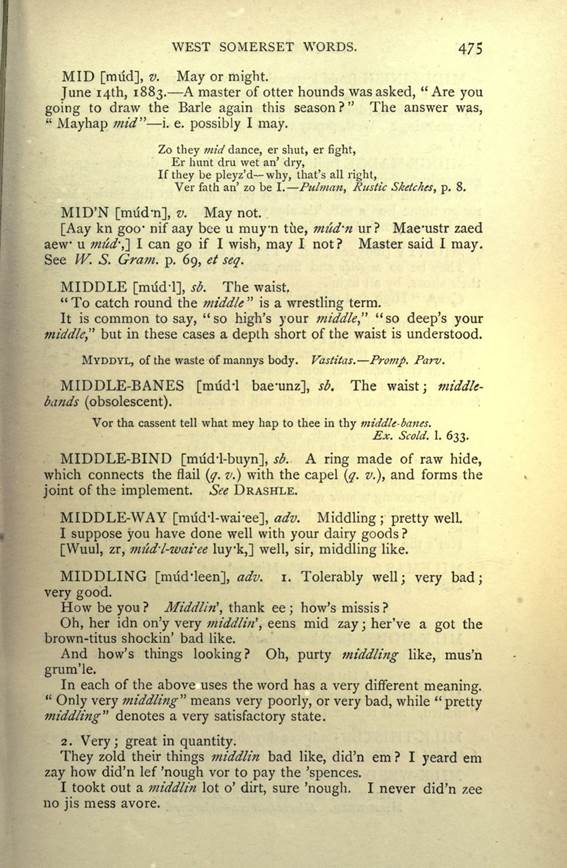
(delwedd B9335) (tudalen 475)
|
WEST SOMERSET WORDS. 475
MID [miid], v. May or might.
June i4th, 1883. A master of otter hounds was asked, "Are you going to draw the Barle again this season?”
The answer was, “Mayhap mid" i. e. possibly I may.
Zo they mid dance, er shut, er fight,
Er hunt dru wet an' dry, If they be
pleyz'd why, that's all right,
Ver fath an' zo be I. Pulman, Rustic Sketches, p. 8.
MID'N [miid-n], v. May not.
[Aay kn goo* nif aay bee u muyn tue, mud'n ur? Mae'ustr zaed aew u mud-,'] I can go if I wish, may I
not? Master said I may. See W. S.
Gram. p. 69, et seq.
MIDDLE [mud-1], sb. The waist. “To catch round the middle” is a wrestling
term. It is common to say, "so
high's your middle" "so deep's your
middle" but in these cases a depth short of the waist is
understood.
MYDDYL, of the waste of mannys body. Vastitas. Promp. Parv.
MIDDLE-BANES [mud'l bae'unz], sb. The waist; middle-bands (obsolescent).
Vor tha cassent tell what mey hap to thee in thy middle-banes.
Ex. Scold. \. 633.
MIDDLE-BIND [mii<H-buyn], sb. A ring made of raw hide, which connects the flail (g. v.} with the
capel (q. v.), and forms the joint of
the implement. See DRASHLE.
MIDDLE-WAY [mud'l-waree], adv. Middling; pretty well. I suppose you have done well with your
dairy goods? [Wuul, zr, miid'l-wai'ee
luyk,] well, sir, middling like.
MIDDLING [mud'leen], adv. i. Tolerably well; very bad; very good.
How be you? Middling thank ee; how's missis?
Oh, her idn on'y very middling eens mid zay; her've a got the brown-titus shockin' bad like.
And how's things looking? Oh, purty middling like, mus'n grum'le.
In each of the above uses the word has a very different meaning. “Only very
middling" means very poorly, or very bad, while "pretty middling" denotes a very satisfactory
state.
2. Very; great in quantity.
They zold their things middlin bad like, did'n em? I yeard em zay how did'n lef 'nough vor to pay the
'spences.
I tookt out a middlin lot o' dirt, sure 'nough. I never did'n zee no jis mess avore.
|
|
|
|
|
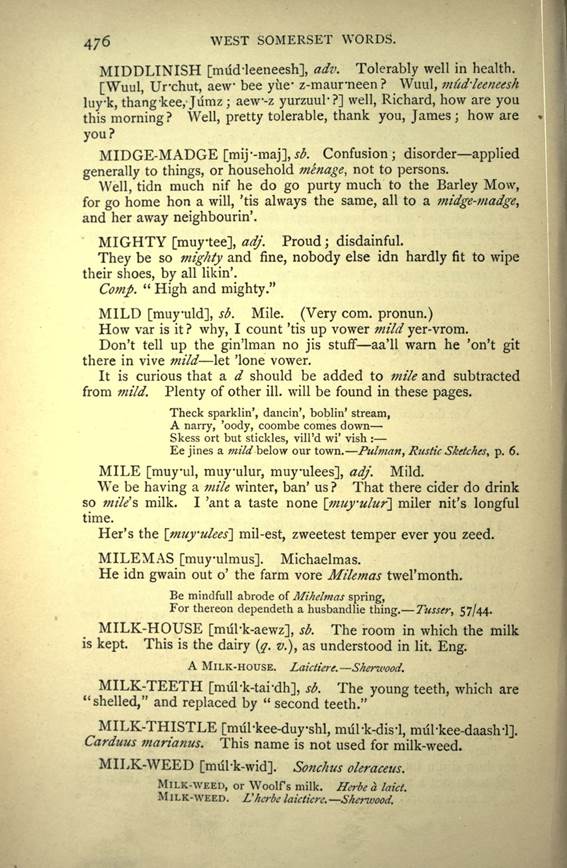
(delwedd B9336) (tudalen 476)
|
476 WEST SOMERSET WORDS.
MIDDLINISH [miid'leeneesh], adv. Tolerably well in health.
[Wuul, Urchut, aew bee yiie' z-maurneen? Wuul, mfid'leeneesh luyk, thang-kee,'Jumz; aew-z yurzuul 1?]
well, Richard, how are you this
morning? Well, pretty tolerable, thank you, James; how are you?
MIDGE-MADGE [mij--maj],^. Confusion; disorder applied generally to things, or household menage,
not to persons.
Well, tidn much nif he do go purty much to the Barley Mow, for go home hon a will, 'tis always the
same, all to a midge-madge, and her
away neighbourin'.
MIGHTY [muytee], adj. Proud; disdainful.
They be so mighty and fine, nobody else idn hardly fit to wipe their shoes, by all likin'. Comp.” High and mighty."
MILD [muyuld], sb. Mile. (Very com. pronun.)
How var is it? why, I count 'tis up vower mild yer-vrom.
Don't tell up the gin'lman no jis stuff aa'll warn he 'on't git there in vive mild let 'lone vower.
It is curious that a d should be added to mile and subtracted from mild. Plenty of other ill. will be
found in these pages.
Theck sparklin', dancin', boblin' stream,
A narry, 'oody, coombe comes down
Skess ort but stickles, vill'd wi' vish:
Ee jines a mild below our town. Pulman, Rustic Sketches^ p. 6.
MILE [muyul, muyulur, muyulees], adj. Mild.
We be having a mile winter, ban' us? That there cider do drink so mile's milk. I 'ant a taste none \rnuy
ulur\ miler nit's longful time.
Her's the {muyulees'] mil-est, zweetest temper ever you zeed.
MILEMAS [muyulmus]. Michaelmas.
He idn gwain out o' the farm vore Milemas twel'month.
Be mindfull abrode of Mihelmas spring,
For thereon dependeth a husbandlie thing. Tusser, 57/44.
MILK-HOUSE [miil-k-aewz], sb. The room in which the milk is kept. This is the dairy (q. z/.), as
understood in lit. Eng.
A MILK-HOUSE. Laictierc.Sheru'ood.
MILK-TEETH [imil-k-tai'dh], sb. The young teeth, which are "shelled," and replaced by”
second teeth."
MILK-THISTLE [miil-kee-duyshl, mul'k-dis-1, miil'kee-daaslrl]. Carduus marianus. This name is not used for
milk-weed.
MILK-WEED [miil-k-wid]. Sonchus oleraceus.
MILK-WEED, or Woolf s milk. Herbe a laid.
M I LK- WEED. L'hcrbe laicticre. Shenvood.
|
|
|
|
|
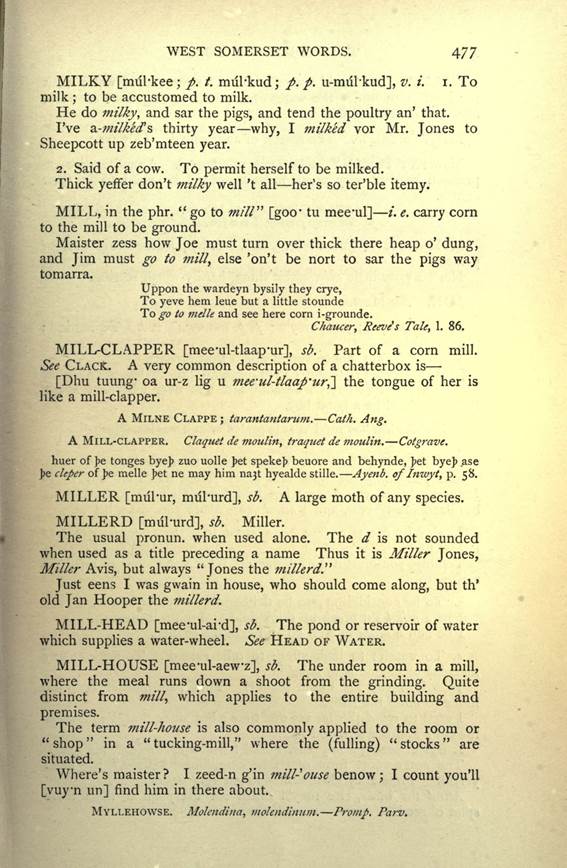
(delwedd B9337) (tudalen 477)
|
WEST SOMERSET WORDS. 477
MILKY [muTkee; p. t. muTkud; /. p. u-muTkud], v. i. i. To milk; to be accustomed to milk.
He do milky, and sar the pigs, and tend the poultry an' that.
I've a.-milked's thirty year why, I milked vor Mr. Jones to Sheepcott up zeb'mteen year.
2. Said of a cow. To permit herself to be milked. Thick yeffer don't milky well 't all her's
so ter'ble itemy.
MILL, in the phr.” go to mill" [goo* tu mee'ul] /. e. carry corn to the mill to be ground.
Maister zess how Joe must turn over thick there heap o' dung, and Jim must go to mill, else 'on't be nort
to sar the pigs way tomarra.
Uppon the wardeyn bysily they crye, To
yeve hem leue but a little stounde To
go to melle and see here corn i-grounde.
Chaucer, Reeve's Tale, 1. 86.
MILL-CLAPPER [mee'ul-tlaap'ur], sb. Part of a corn mill. See CLACK. A very common description of a
chatterbox is
[Dhu tuung* oa ur-z lig u mee'ul-tlaap'ur^\ the tongue of her is like a mill-clapper.
A MILNE CLAPPE; tarantantarum. Cath. Ang.
A MILL-CLAPPER. Claquet de moulin, traquet de moulin. Cotgravc.
huer of e tonges bye]) zuo uolle )>et spekej) beuore and behynde, ]>et
bye]> ase J>e cleper of )>e
melle J?et ne may him na3t hyealde stille. Ayenb, of Inwyt, p. 58.
MILLER [muTur, muTurd], sb. A large moth of any species.
MILLERD [nuil-urd], sb. Miller.
The usual pronun. when used alone. The d is not sounded when used as a title preceding a name Thus
it is Miller Jones, Miller Avis, but
always "Jones the miller d."
Just eens I was gwain in house, who should come along, but th' old Jan Hooper the millerd.
MILL-HEAD [mee'ul-ai'd], sb. The pond or reservoir of water which supplies a water-wheel. See HEAD OF
WATER.
MILL-HOUSE [mee-ul-aewz], sb. The under room in a mill, where the meal runs down a shoot from the
grinding. Quite distinct from mill,
which applies to the entire building and
premises.
The term mill-house is also commonly applied to the room or “shop” in a”
tucking-mill," where the (fulling)” stocks” are situated.
Where's maister? I zeed-n g'in mill-ouse benow; I count you'll [vuyn un] find him in there about.
MYLLEHOWSE. Molendina, molendinum, Promp. Parv.
|
|
|
|
|
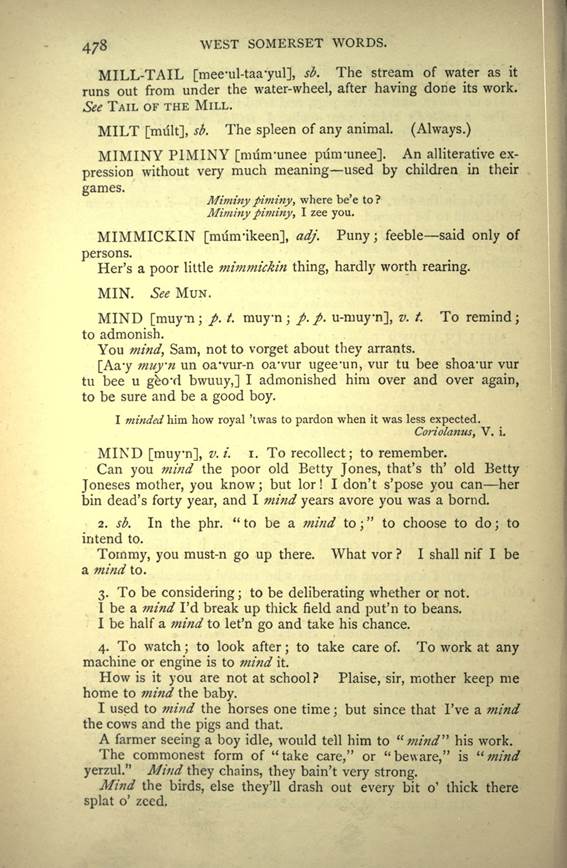
(delwedd B9338) (tudalen 478)
|
478 WEST SOMERSET WORDS.
MILL-TAIL [mee-ul-taayul], sb. The stream of water as it runs out from under the water-wheel, after
having done its work. See TAIL OF THE
MILL.
MILT [mult], sb. The spleen of any animal. (Always.)
MIMINY P1MINY [munrunee piinrunee]. An alliterative expression without very
much meaningused by children in their
games.
Miminy piminy, where be'e to? Miminy
pi miny, I zee you.
MIMMICKIN [munrikeen], adj. Puny; feeble said only of persons.
Her's a poor little mimmickin thing, hardly worth rearing.
MIN. See MUN.
MIND [muyn; /. /. muyn; p. p. u-muyn], v. t. To remind; to admonish.
You mind, Sam, not to vorget about they arrants.
[Aay muyn un oa*vur-n oa'vur ugee'un, vur tu bee shoa-ur vur tu bee u geo'd bwuuy,] I admonished him
over and over again, to be sure and be
a good boy.
I minded "him. how royal 'twas to pardon when it was less expected.
Coriolanus, V. i.
MIND [muyn], v.i. i. To recollect; to remember.
Can you mind the poor old Betty Jones, that's th' old Betty Joneses mother, you know; but lor! I don't
s'pose you can her bin dead's forty
year, and I mind years avore you was a bornd.
2. sb. In the phr. "to be a mind to;” to choose to do; to intend to.
Tommy, you must-n go up there. What vor? I shall nif I be a mind to.
3. To be considering; to be deliberating whether or not. 1 be a mind I'd break up thick field and
put'n to beans. I be half a mind to
let'n go and take his chance.
4. To watch; to look after; to take care of. To work at any machine or engine is to mind it.
How is it you are not at school? Plaise, sir, mother keep me home to mind the baby.
I used to mind the horses one time; but since that I've a mind the cows and the pigs and that.
A farmer seeing a boy idle, would tell him to "mind" his work.
The commonest form of "take care," or "beware," is
"mind yerzul." Mind they
chains, they bain't very strong.
Mind the birds, else they'll drash out every bit o' thick there splat o' zeed.
|
|
|
|
|
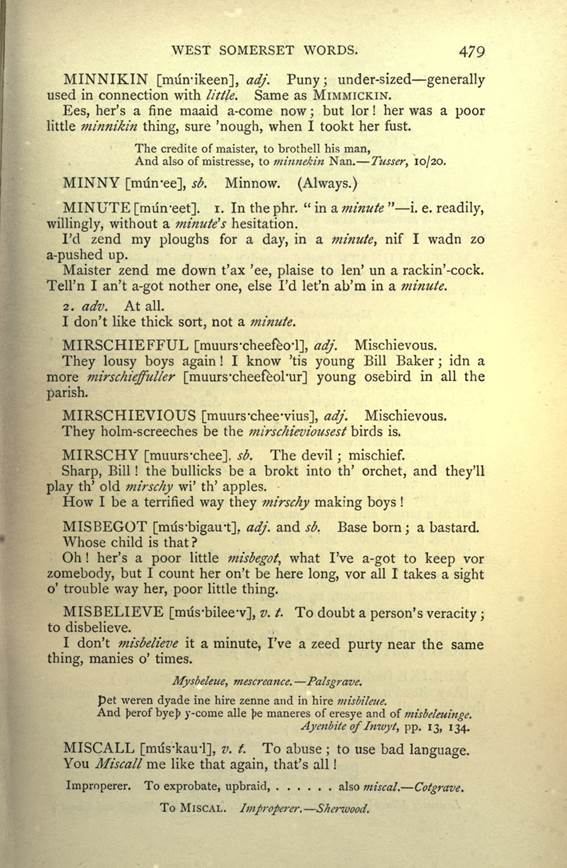
(delwedd B9339) (tudalen 479)
|
WEST SOMERSET WORDS. 479
MINNIKIN [miin-ikeen], adj. Puny; under-sized generally used in connection with little. Same as
MIMMICKIN.
Ees, her's a fine maaid a-come now; but lor! her was a poor little minnikin thing, sure 'nough, when I
tookt her fust.
The credite of maister, to brothell his man,
And also of mistresse, to minnekin Nan. Tusser, 10/20.
MINNY [miin'ee], sb. Minnow. (Always.)
MINUTE [mun-eet]. i. In the phr.” in a minute” i. e. readily, willingly, without a minute's hesitation.
I'd zend my ploughs for a day, in a minute, nif I wadn zo a-pushed up.
Maister zend me down t'ax 'ee, plaise to len' un a rackin'-cock. Tell'n I an't a-got nother one, else I'd
let'n ab'm in a minute.
2. adv. At all.
I don't like thick sort, not a minute.
MIRSCHIEFFUL [muurs'cheefeo-1], adj. Mischievous.
They lousy boys again! I know 'tis young Bill Baker; idn a more mirschieffuller [muurs'cheefeol'ur]
young osebird in all the parish.
MIRSCHIEVIOUS [muurs-chee-vius], adj. Mischievous. They holm-screeches be the mirschieviousest
birds is.
MIRSCHY [muurs-chee]. sb. The devil; mischief. Sharp, Bill! the bullicks be a brokt into
th' orchet, and they'll play th' old
mirschy wi' th' apples.
How I be a terrified way they mirschy making boys!
MISBEGOT [muVbigau-t], adj. and sb. Base born; a bastard.
Whose child is that?
Oh! her's a poor little misbtgot, what I've a-got to keep vor zomebody, but I count her on't be here
long, vor all I takes a sight o'
trouble way her, poor little thing.
MISBELIEVE [muVbilee'v], v. t. To doubt a person's veracity; to disbelieve.
I don't misbelieve it a minute, I've a zeed purty near the same thing, manies o' times.
Mysbeleue, mescreance. Palsgrave.
pet weren dyade ine hire zenne and in hire misbilette. And J>erof bye]) y-come alle J>e
maneres of eresye and of misbeleuinge.
Ayenbite of Inwyt, pp. 13, 134.
MISCALL [mus-kau'l], v. t. To abuse; to use bad language. You Miscall me like that again, that's all!
Improperer. To exprobate, upbraid, also miscal. Cotgrave.
To MISCAL. Improperer. Shenvood.
|
|
|
|
|
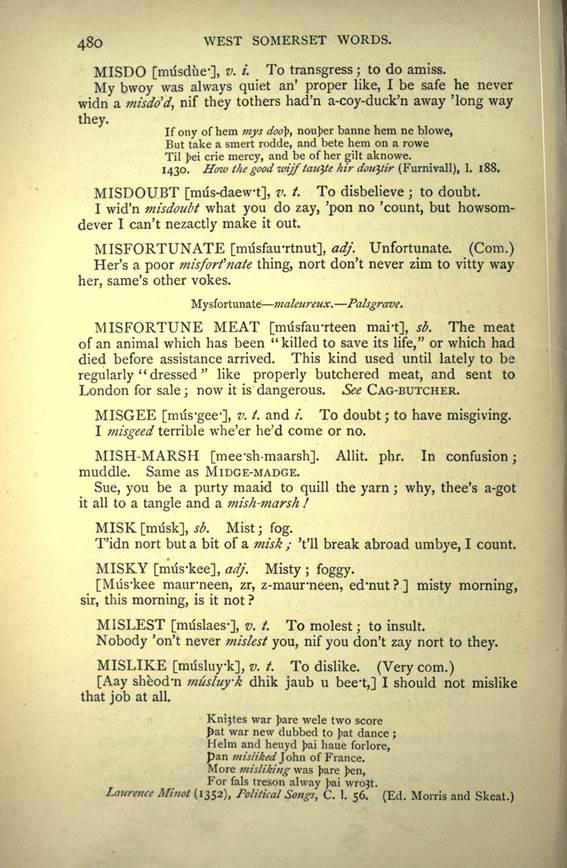
(delwedd B9340) (tudalen 480)
|
480 WEST SOMERSET WORDS.
MISDO [miisdue-], v. i. To transgress; to do amiss. My bwoy was always quiet an' proper like, I
be safe he never widn a misdtfd, nif
they tothers had'n a-coy-duck'n away 'long way
they.
If ony of hem mys doo\>, nouj>er banne hem ne blowe,
But take a smert rodde, and bete hem on a rowe
Til J)ei crie mercy, and be of her gilt aknowe.
1430. How the good wijf tauye hir douyir (Furnivall), 1. 188.
MISDOUBT [miis-daewt], v. t. To disbelieve; to doubt. I wid'n misdoubt what you do zay, 'pon no
'count, but howsomdever I can't nezactly make it out.
MISFORTUNATE [musfau-rtnut], adj. Unfortunate. (Com.) Her's a poor misforf nate thing, nort don't
never zim to vitty way her, same's
other vokes.
Mysfortunate maleureux. Palsgrave.
MISFORTUNE MEAT [rmisfauTteen mart], sb. The meat of an animal which has been "killed to
save its life," or which had died
before assistance arrived. This kind used until lately to be regularly” dressed” like properly butchered
meat, and sent to London for sale; now
it is dangerous. See CAG-BUTCHER.
MISGEE [muVgee-], v. t. and /. To doubt; to have misgiving. I misgeed terrible whe'er he'd come or no.
MISH-MARSH [mee'sh-maarsh]. Allit. phr. In confusion; muddle. Same as MIDGE-MADGE.
Sue, you be a purty maaid to quill the yarn; why, thee's a-got it all to a tangle and a mish-marsh!
MISK [musk], sb. Mist; fog.
T'idn nort but a bit of a misk; 't'll break abroad umbye, I count.
MISKY [mus-kee], adj. Misty; foggy.
[Mus-kee maurneen, zr, z-maurneen, ed'nut? ] misty morning, sir, this morning, is it not?
MISLEST [muslaes-], v. t. To molest; to insult.
Nobody 'on't never mislest you, nif you don't zay nort to they.
MISLIKE [miisluyk], v. t. To dislike. (Very com.) [Aay sheod-n musluyk dhik jaub u bee't,] I
should not mislike that job at all.
Knijtes war ]>are wele two score at
war new dubbed to >at dance; Helm
and heuyd >ai haue forlore, pan
misliked]oh\\ of France. More
misliking was J>are J?en, For fals
treson alway ]>ai wro3t. Laurence
Minot (1352), Political Songs, C. 1. 56. (Ed. Morris and Skeat.)
|
|
|
|
|
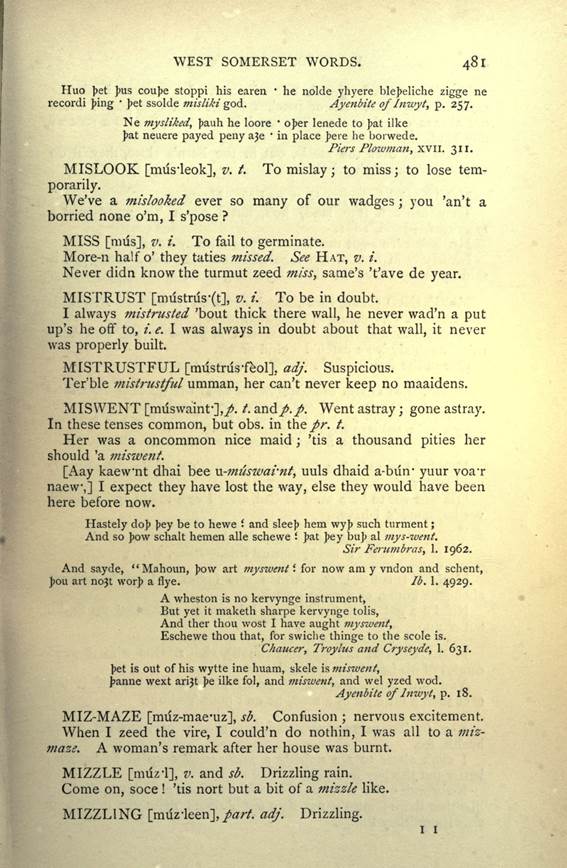
(delwedd B9341) (tudalen 481)
|
WEST SOMERSET WORDS. 48 1
Huo J>et )>us cou]>e stoppi his earen * he nolde yhyere
ble]>eliche zigge ne record!
j>ing ]>et ssolde misliki god. Ayenbite of Inwyt, p. 257.
Ne mysliked, J>auh he loore oj>er lenede to )>at ilke J>at neuere payed peny a}e ' in place
jjere he borwede.
Piers Plowman, XVII. 311.
MISLOOK [muVleok], v. t. To mislay; to miss; to lose temporarily.
We've a mislooked ever so many of our wadges; you 'an't a borried none o'm, I s'pose?
MISS [mus], v. i. To fail to germinate.
More-n half o' they taties missed. See HAT, v. i.
Never didn know the turmut zeed miss, same's 't'ave de year.
MISTRUST [mustruV(t], v. i. To be in doubt.
I always mistrusted 'bout thick there wall, he never wad'n a put up's he off to, /". e. I was always in
doubt about that wall, it never was
properly built.
MISTRUSTFUL [mustruVfeol]. adj. Suspicious.
Ter'ble mistrustful umman, her can't never keep no maaidens.
MISWENT [rmiswainf],/. /. and/./. Went astray; gone astray. In these tenses common, but obs. in the//',
t.
Her was a oncommon nice maid; 'tis a thousand pities her should 'a miswent.
[Aay kaewnt dhai bee M-mfowai'nt, uuls dhaid a-biin* yuur voa'r naew,] I expect they have lost the way,
else they would have been here before
now.
Hastely do]> ]?ey be to hewe and slee]) hem wyj) such turment; And so fow schalt hemen alle schewe '
)>at )>ey bu)> al mys-ivent.
Sir Ferumbras, 1. 1962.
And sayde,” Mahoun, ]>o\v art mysivcnt for now am y vndon and schent, ]>ou art no^t worj) a flye. Ib. 1. 4929.
A wheston is no kervynge instrument,
But yet it maketh sharpe kervynge tolis, And ther thou wost I have aught
mysiuent, Eschewe thou that, for
swiche thinge to the scole is.
Chaucer, Troylus and Cryseyde, 1. 631.
]>et is out of his wytte ine huam, skele is miswent,
j>anne wext ari3t ]>e ilke fol, and miswent, and wel yzed wod.
Ayenbite of Inwyt, p. 18.
MIZ-MAZE [muz-mae'uz], sb. Confusion; nervous excitement. When I zeed the vire, I could'n do nothin,
I was all to a miz-maze. A woman's remark after her house was burnt.
MIZZLE [muz-1], v. and sb. Drizzling rain.
Come on, soce! 'tis nort but a bit of a mizzle like.
MIZZLING [miizieen],/rtr/. adj. Drizzling.
i i
|
|
|
|
|
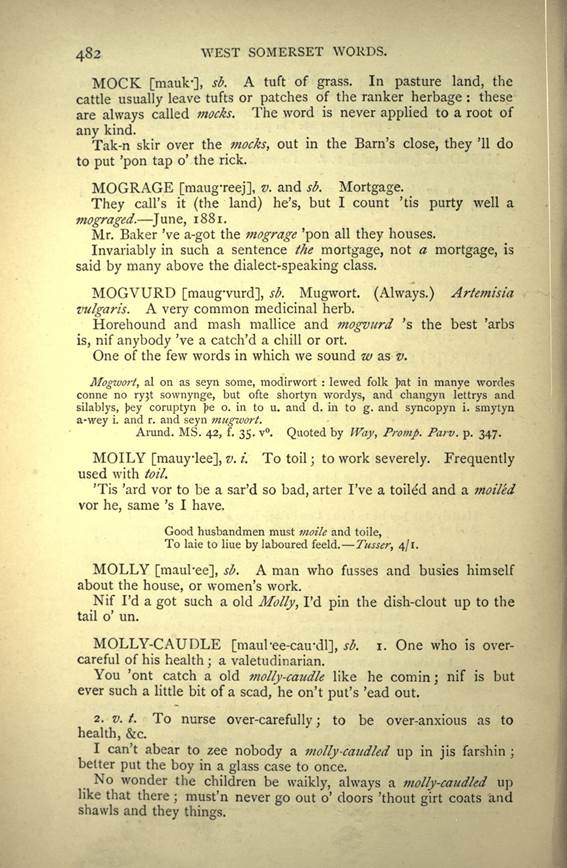
(delwedd B9342) (tudalen 482)
|
482 WEST SOMERSET WORDS.
MOCK [mauk-], sb. A tuft of grass. In pasture land, the cattle usually leave tufts or patches of
the ranker herbage: these are always
called mocks. The word is never applied to a root of any kind.
Tak-n skir over the mocks, out in the Barn's close, they '11 do to put 'pon tap o' the rick.
MOGRAGE [maug-reej], v. and sb. Mortgage.
They call's it (the land) he's, but I count 'tis purty well a mograged. J un e, 1 8 8 1 .
Mr. Baker Ve a-got the mograge 'pon all they houses.
Invariably in such a sentence the mortgage, not a mortgage, is said by many above the dialect-speaking
class.
MOGVURD [maug'vurd], sb. Mugwort. (Always.) Artemisia vulgaris. A very common medicinal herb.
Horehound and mash mallice and mogvurd 's the best 'arbs is, nif anybody 've a catch'd a chill or
ort.
One of the few words in which we sound w as v.
Mogwort, al on as seyn some, modirwort: lewed folk ])at in manye vvordes conne no ry3t sownynge, but ofte shortyn
wordys, and changyn lettrys and
silablys, f>ey coruptyn ]>e o. in to u. and d. in to g. and
syncopyn i. smytyn a-wey i. and r. and
seyn mugwort.
A rand. MS. 42, f. 35. v. Quoted by Way, Promp. Parv. p. 347.
MOILY [mauylee], v. i. To toil; to work severely. Frequently used with toil.
'Tis 'ard vor to be a sar'd so bad, arter I've a toiled and a moiled vor he, same 's I have.
Good husbandmen must moile and toile,
To laie to liue by laboured feeld. Tusser, 4/1.
MOLLY [maul'ee], sb. A man who fusses and busies himself about the house, or women's work.
Nif I'd a got such a old Molly, I'd pin the dish-clout up to the tail o' un.
MOLLY-CAUDLE [maul-ee-cairdl], sb. i. One who is over-careful of his health;
a valetudinarian.
You 'ont catch a old molly-caudle like he comin; nif is but ever such a little bit of a scad, he on't
put's 'ead out.
2. v. t. To nurse over-careful ly; to be over-anxious as to health, &c.
I can't abear to zee nobody a molly -candled up in jis farshin; belter put the boy in a glass case to once.
No wonder the children be waikly, always a molly-caudled up like that there; must'n never go out o'
doors 'thout girt coats and shawls and
they things.
|
|
|
|
|
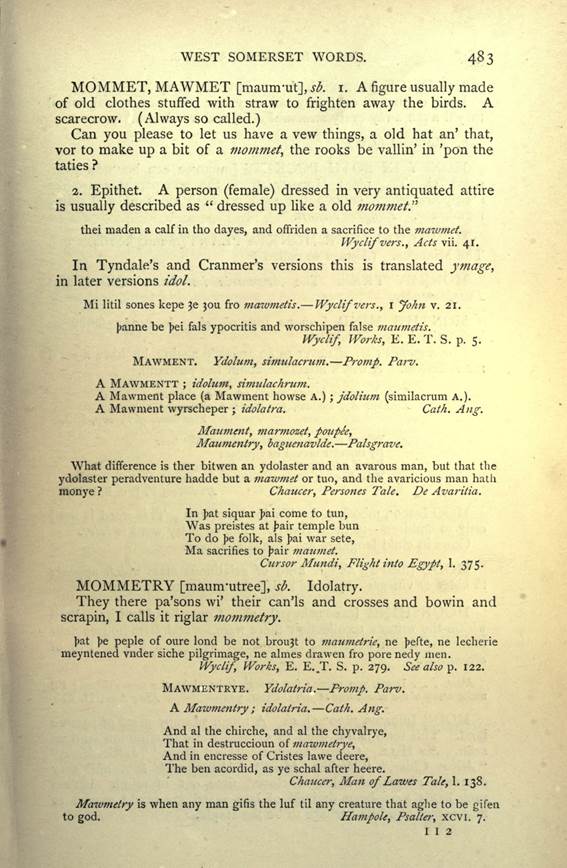
(delwedd B9343) (tudalen 483)
|
WEST SOMERSET WORDS. 483
MOMMET, MAWMET [maunrut], sb. i. A figure usually made of old clothes stuffed with straw to
frighten away the birds. A scarecrow,
(Always so called.)
Can you please to let us have a vew things, a old hat an' that, vor to make up a bit of a mommet, the rooks
be vallin' in 'pon the taties?
2. Epithet. A person (female) dressed in very antiquated attire is usually described as” dressed up like a
old mommet"
thei maden a calf in tho dayes, and offriden a sacrifice to the mawmet.
Wyclif vers., Acts vii. 41.
In Tyndale's and Cranmer's versions this is translated ymage, in later versions idol.
Mi litil sones kepe }e 3011 fro mawmetis. Wyclif vers., I John v. 21.
|>anne be ]>ei fals ypocritis and worschipen false maumetis.
Wyclif, Works, E. E. T. S. p. 5.
MAWMENT. Ydolum, simulacrum. Promp. Pai~v.
A MAWMENTT; idolum, simulachrum.
A Mawment place (a Mawrnent howse A.); jdolium (similacrum A.).
A Mawment wyrscheper; idolatra. Cath. Aug.
Maument, marmozet, poupee, Maumentry,
baguenavlde. Palsgrave.
What difference is ther bitwen an ydolaster and an avarous man, but that
the ydolaster peradventure hadde but a
mawmet or tuo, and the avaricious man hatli
monye? Chaucer, Persones Tale. De Avaritia.
In J>at siquar J>ai come to tun,
Was preistes at f>air temple bun
To do J>e folk, als ]>ai war sete, Ma sacrifies to J?air maiimet.
Cursor Mundi, Flight into Egypt, I. 375.
MOMMETRY [maunvutree], sb. Idolatry.
They there pa'sons wi' their can'ls and crosses and bowin and scrapin, I calls it riglar mommetry.
]>at ]>e peple of cure lond be not broujt to maumetrie, ne ]>efte,
ne lecherie
edy men. See also p. 122.
MAWMENTRYE. Ydolatria. Promp. Parv. A
Ma^umentry; idolatria. Cath. Ang.
And al the chirche, and al the chyvalrye,
That in destruccioun of mawmetrye,
And in encresse of Cristes lawe deere,
The ben acordid, as ye schal after heere.
Chaucer, Man of Lawes Tale, 1. 138.
Maiumetry is when any man gifts the luf til any creature that aghe to be
gifen to god. Ham pole, Psalter, xcvi.
7.
I I 2
meyntened vnder siche pilgrimage, ne almes
drawen fro porenedy men. Wyclif,
Works, E. E..T. S. p. 279. See
|
|
|
|
|
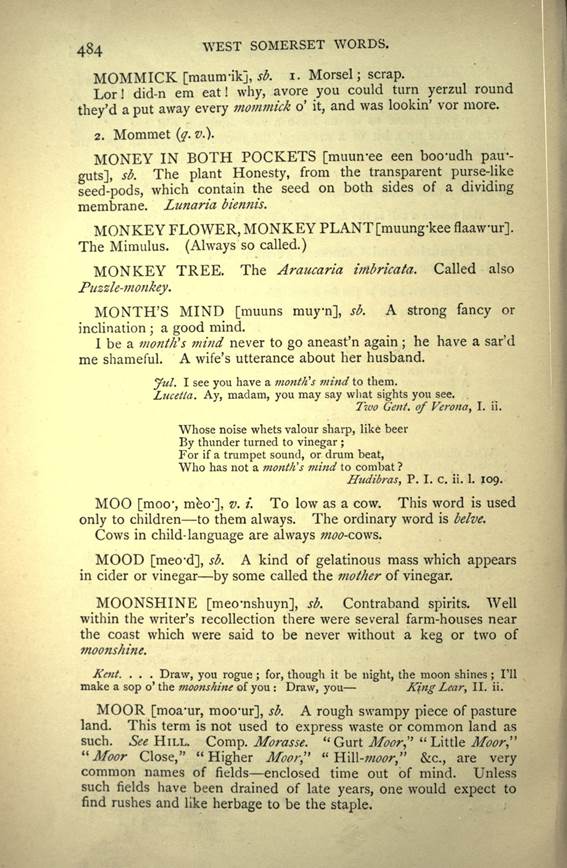
(delwedd B9344) (tudalen 484)
|
484 WEST SOMERSET WORDS.
MOMMICK [maunrikj, sb. i. Morsel; scrap.
Lor! did-n em eat! why, avore you could turn yerzul round they'd a put away every mommick o' it, and
was lookin' vor more.
2. Mommet (q. v.}.
MONEY IN BOTH POCKETS [muurree een boo-udh pair-guts], sb. The plant Honesty,
from the transparent purse-like
seed-pods, which contain the seed on both sides of a dividing membrane. Lunaria biennis.
MONKEY FLOWER, MONKEY PLANT [muung'kee flaawur]. The Mimulus. (Always so called.)
MONKEY TREE. The Araucaria imbricata. Called also Puzzle-monkey.
MONTH'S MIND [muuns muyn], sb. A strong fancy or inclination; a good mind.
I be a month's mind never to go aneast'n again; he have a sar'd me shameful. A wife's utterance about her
husband.
Jul. I see you have a monttis mind to them.
Lucetla. Ay, madam, you may say what sights you see.
Two Gent, of Verona, I. ii.
Whose noise whets valour sharp, like beer
By thunder turned to vinegar;
For if a trumpet sound, or drum beat,
Who has not a month's mind to combat?
Htidibras, P. I. C. ii. 1. 109.
MOO [moo-, meo-], v. i. To low as a cow. This word is used only to children to them always. The
ordinary word is belve. Cows in child-
language are always moo-cows.
MOOD [meo'd], sb. A kind of gelatinous mass which appears in cider or vinegar by some called the
mother of vinegar.
MOONSHINE [meo-nshuyn], sb. Contraband spirits. Well within the writer's recollection there were
several farm-houses near the coast
which were said to be never without a keg or two of moonshine.
Kent. . . . Draw, you rogue; for, though it be night, the moon shines;
I'll make a sop o' the moonshine of
you: Draw, you King Lear, II. ii.
MOOR [moa'ur, moo*ur], sb. A rough swampy piece of pasture land. This term is not used to express
waste or common land as such. See
HILL. Comp. Morasse. "Gurt Moor," "Little Moor" "Moor Close," "Higher Moor?”
tti\\-moor," &c., are very
common names of fields enclosed time out of mind. Unless such fields have been drained of late
years, one would expect to find rushes
and like herbage to be the staple.
|
|
|
|
|
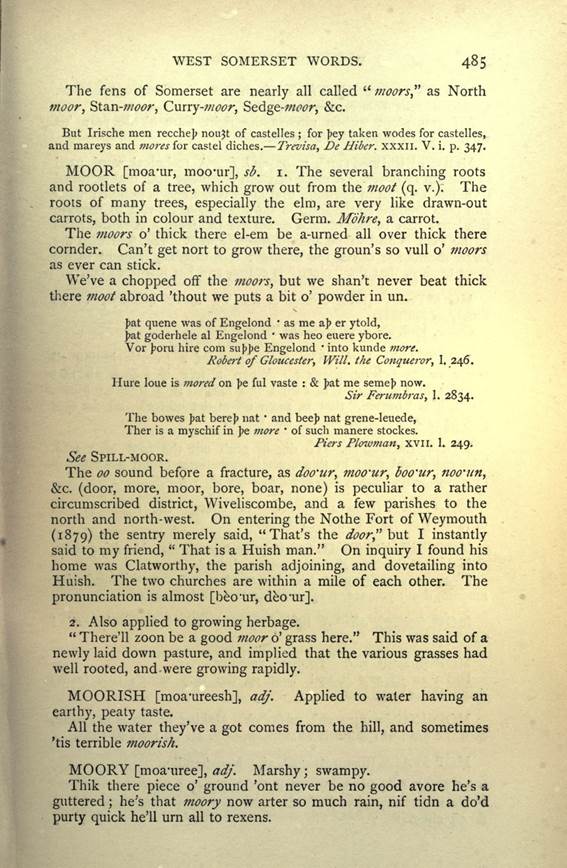
(delwedd B9345) (tudalen 485)
|
WEST SOMERSET WORDS. 485
The fens of Somerset are nearly all called” moors" as North moor, Stan-;;/w, Cuny-w0r, Sedge-/w<wr,
&c.
But Irische men recchej; nou^t of castelles; for |>ey taken wodes for
castelles, and mareys and mores for
castel diches. Trevisa, De Hiber. xxxii. V. i. p. 347.
MOOR [moa-ur, moo'ur], sb. i. The several branching roots and rootlets of a tree, which grow out from
the moot (q. v.). The roots of many
trees, especially the elm, are very like drawn-out carrots, both in colour and texture. Germ.
Mohre, a carrot.
The moors o' thick there el-em be a-urned all over thick there cornder. Can't get nort to grow there, the
groun's so vull o' moors as ever can
stick.
We've a chopped off the moors, but we shan't never beat thick there moot abroad 'thout we puts a bit o'
powder in un.
j>at quene was of Engelond ' as me a)> er ytold, j>at goderhele al Engelond * was heo
euere ybore. Vor J?oru hire com
suj>))e Engelond * into kunde more.
Robert of Gloucester, Will, the Conqueror, 1. 246.
Hure loue is mored on )>e ful vaste: & ]>at me semej> now.
Sir Ferumbras, 1. 2834.
The bowes Jjat berejj nat * and bee]) nat grene-leuede, Ther is a myschif in )>e more ' of such
manere stockes.
Piers Plowman, xvil. 1. 249.
See SPILL-MOOR.
The oo sound before a fracture, as doo'ur, moo'ur, boo'ur, noo'itn, &c. (door, more, moor, bore, boar,
none) is peculiar to a rather
circumscribed district, Wiveliscombe, and a few parishes to the north and north-west. On entering the Nothe
Fort of Weymouth (1879) tne sentry
merely said, "That's the door" but I instantly said to my friend,” That is a Huish
man." On inquiry I found his home
was Clatworthy, the parish adjoining, and dovetailing into Huish. The two churches are within a mile
of each other. The pronunciation is
almost [beo'ur, deo'ur].
2. Also applied to growing herbage.
" There'll zoon be a good moor o' grass here." This was said of
a newly laid down pasture, and implied
that the various grasses had well
rooted, and were growing rapidly.
MOORISH [moa'ureesh], adj. Applied to water having an earthy, peaty taste.
All the water they've a got comes from the hill, and sometimes 'tis terrible moorish.
MOORY [moa'uree], adj. Marshy; swampy.
Thik there piece o' ground 'ont never be no good avore he's a guttered; he's that moory now arter so much
rain, nif tidn a do'd purty quick
he'll urn all to rexens.
|
|
|
|
|
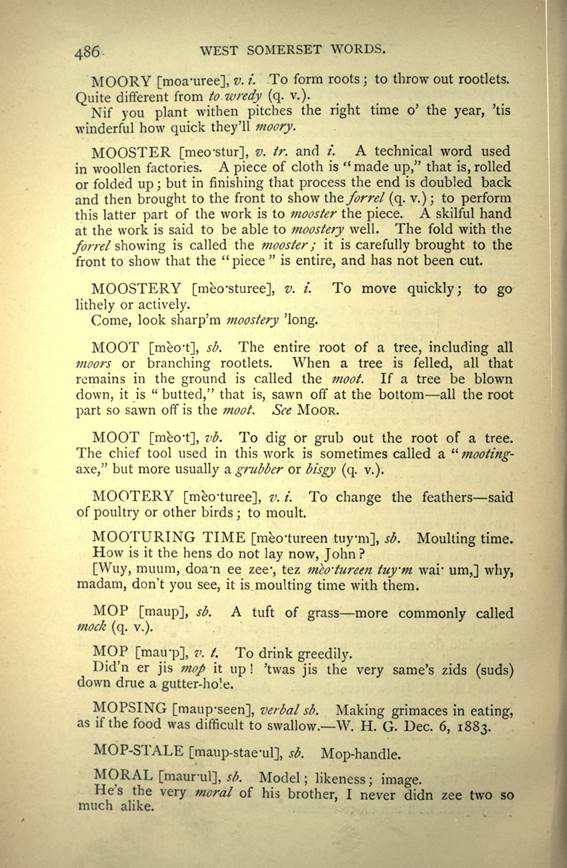
(delwedd B9346) (tudalen 486)
|
4 86 WEST SOMERSET WORDS.
MOORY [moa-uree], v. i. To form roots; to throw out rootlets. Quite different from to wredy (q. v.).
Nif you plant withen pitches the right time o' the year, 'tis winderful how quick they'll moory.
MOOSTER [meo'stur], v. tr. and /. A technical word used in woollen factories. A piece of cloth is”
made up," that is, rolled or
folded up; but in finishing that process the end is doubled back and then brought to the front to show
i\\&forrel (q. v.); to perform
this latter part of the work is to mooster the piece. A skilful hand at the work is said to be able to moostery^
well. The fold with the forrel showing
is called the mooster; it is carefully brought to the front to show that the "piece” is
entire, and has not been cut.
MOOSTER Y [meo-sturee], v. i. To move quickly; to go lithely or actively.
Come, look sharp'm moostery 'long.
MOOT [meo-t], sb. The entire root of a tree, including all moors or branching rootlets. When a tree is
felled, all that remains in the ground
is called the moot. If a tree be blown
down, it is” butted," that is, sawn off at the bottom all the
root part so sawn off is the moot. See
MOOR.
MOOT [meo-t], vb. To dig or grub out the root of a tree. The chief tool used in this work is
sometimes called a” mooting-axe," but more usually a grubber or bisgy
(q. v.).
MOOTERY [meo-turee], v. i. To change the feathers said of poultry or other birds; to moult.
MOOTURING TIME [meo'tureen tuym], sb. Moulting time. How is it the hens do not lay now, John?
[Wuy, muum, doa'n ee zee*, tez meo' tureen tuym war um,] why, madam, don't you see, it is moulting time
with them.
MOP [maup], sb. A tuft of grass more commonly called mock (q. v.).
MOP [mairp], v. t. To drink greedily.
Did'n er jis mop it up! 'twas jis the very same's zids (suds) down drue a gutter-hole.
MOPSING [maup-seen], verbal sb. Making grimaces in eating, as if the food was difficult to swallow. W.
H. G. Dec. 6, 1883.
MOP-STALE [matip-stae'ul], sb. Mop-handle.
MORAL [maur-ul], sb. Model; likeness; image.
He's the very moral of his brother, I never didn zee two so much alike.
|
|
|
|
|
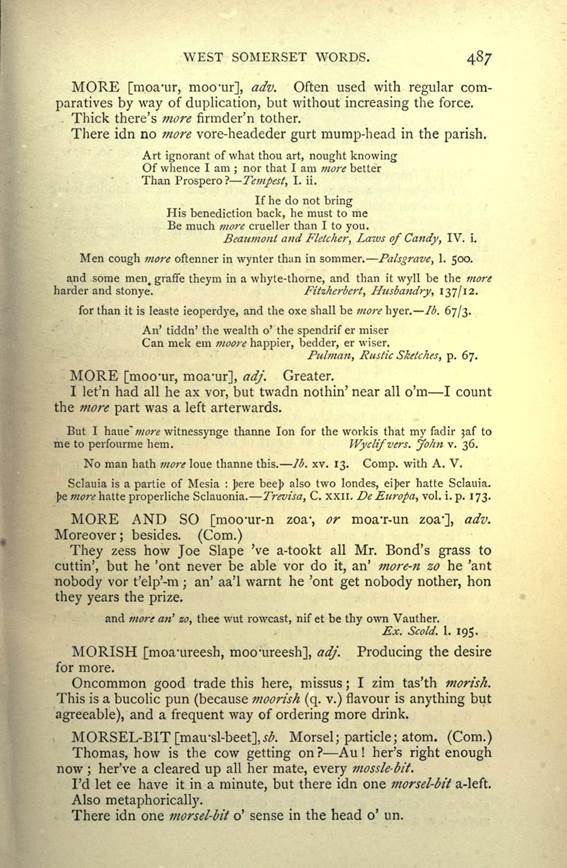
(delwedd B9347) (tudalen 487)
|
WEST SOMERSET WORDS. 487
MORE [moa'ur, moo f ur], adv. Often used with regular comparatives by way of
duplication, but without increasing the force. Thick there's more firmder'n tother. There idn no more vore-headeder gurt
mump-head in the parish.
Art ignorant of what thou art, nought knowing
Of whence I am; nor that I am more better Than Prospero? Tempest, I. ii.
If he do not bring
His benediction back, he must to me Be
much more crueller than I to you.
Beaiimont and Fletcher, jLaws of Candy, IV. i.
Men cough more oftenner in wynter than in sommer. Palsgrave, 1. 5-
and some men. graffe theym in a whyte-thorne, and than it wyll be the
more harder and stonye. Fitzherbert,
Husbandry, 137/12.
for than it is leaste ieoperdye, and the oxe shall be more hyer. Ib. 67/3.
An' tiddn' the wealth o' the spendrif er miser Can mek em moore happier, bedder, er wiser.
Pulman, Rustic Sketches, p. 67.
MORE [moo-ur, moa'ur], adj. Greater.
I let'n had all he ax vor, but twadn nothin' near all o'm I count the more part was a left arterwards.
But I haue" more witnessynge thanne Ion for the workis that my fadir jaf
to me to perfourme hem. Wydifvers.
John v. 36.
No man hath more loue thanne this. Ib. xv. 13. Comp. with A. V.
Sclauia is a partie of Mesia: ]?ere bee]) also two londes, ei]?er hatte
Sclauia. >e more hatte properliche
Sclauonia. Trevisa, C. xxn. De Europa, vol. i. p. 173.
MORE AND SO [moo'ur-n zoa*, or moa'r-un zoa*], adv. Moreover; besides. (Com.)
They zess how Joe Slape 've a-tookt all Mr. Bond's grass to cuttin', but he 'ont never be able vor do
it, an' more-n zo he 'ant nobody vor
t'elp'-m; an' aa'l warnt he 'ont get nobody nother, hon they years the prize.
and more an* zo, thee wut rowcast, nif et be thy own Vauther.
Ex. Scold. 1. 195.
MORISH [moa-ureesh, moo'ureesh], adj. Producing the desire for more.
Oncommon good trade this here, missus; I zim tas'th morish. This is a bucolic pun (because moorish (q.
v.) flavour is anything but
agreeable), and a frequent way of ordering more drink.
MORSEL-BIT [mairsl-beet],^. Morsel; particle; atom. (Com.) Thomas, how is the cow getting on? Au!
her's right enough now; her've a
cleared up all her mate, every mossle-bit.
I'd let ee have it in a minute, but there idn one morsel-bit a-left.
Also metaphorically.
There idn one morsel-bit o' sense in the head o' un.
|
|
|
|
|
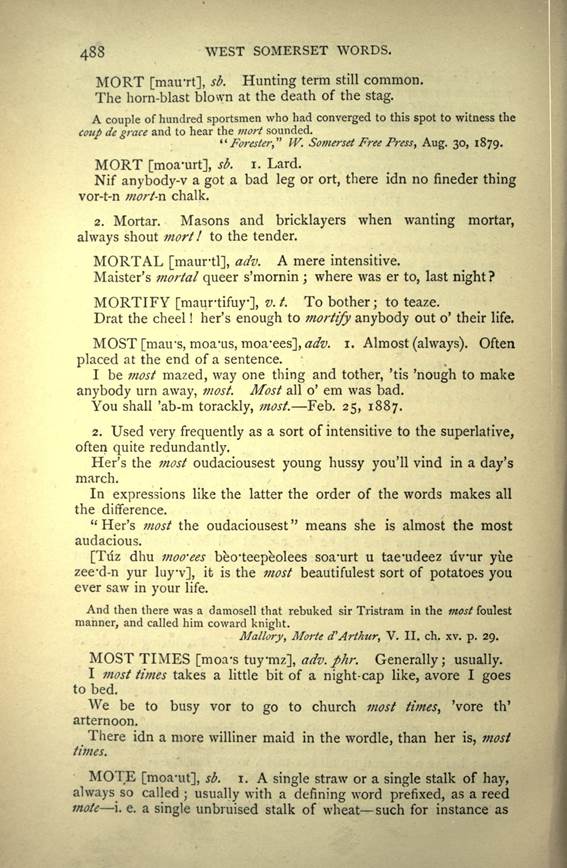
(delwedd B9348) (tudalen 488)
|
4 S8 WEST SOMERSET WORDS.
MORT [mairrt], sb. Hunting term still common.
The horn-blast blown at the death of the stag.
A couple of hundred sportsmen who had converged to this spot to witness
the coup de grace and to hear the
niort sounded.
"Forester," W. Somerset Free Press, Aug. 30, 1879.
MORT [moa-urt], sb. i. Lard.
Nif anybody-v a got a bad leg or ort, there idn no fineder thing vor-t-n mort-n. chalk.
2. Mortar. Masons and bricklayers when wanting mortar, always shout mart I to the tender.
MORTAL [maurtl], adv. A mere intensitive.
Maister's mortal queer s'mornin; where was er to, last night?
MORTIFY [maurtifuy], v. t. To bother; to teaze.
Drat the cheel! her's enough to mortify anybody out o' their life.
MOST [mairs, moa'us, moa'ees], adv. i. Almost (always). Often placed at the end of a sentence.
I be most mazed, way one thing and tother, 'tis 'nough to make anybody urn away, most. Most all o' em was
bad.
You shall 'ab-m torackly, most. Feb. 25, 1887.
2. Used very frequently as a sort of intensitive to the superlative, often quite redundantly.
Her's the most oudaciousest young hussy you'll vind in a day's march.
In expressions like the latter the order of the words makes all the difference.
" Her's most the oudaciousest” means she is almost the most audacious.
[Tiiz dim moo'ees beo'teepeolees soa'urt u tae'udeez dvur yue zee'd-n yur luyv], it is the most beautifulest
sort of potatoes you ever saw in your
life.
And then there was a damosell that rebuked sir Tristram in the most
foulest manner, and called him coward
knight.
Mallory, Morte <T Arthur, V. II. ch. xv. p. 29.
MOST TIMES [moa-s tuymz], adv. fhr. Generally; usually.
I most times takes a little bit of a night-cap like, avore I goes to bed.
We be to busy vor to go to church most times, Vore th' arternoon.
There idn a more williner maid in the wordle, than her is, most times.
MOTE [moa-ut], sb. i. A single straw or a single stalk of hay, always so called; usually with a defining
word prefixed, as a reed mote i. e. a
single unbruised stalk of wheat such for instance as
|
|
|
|
|
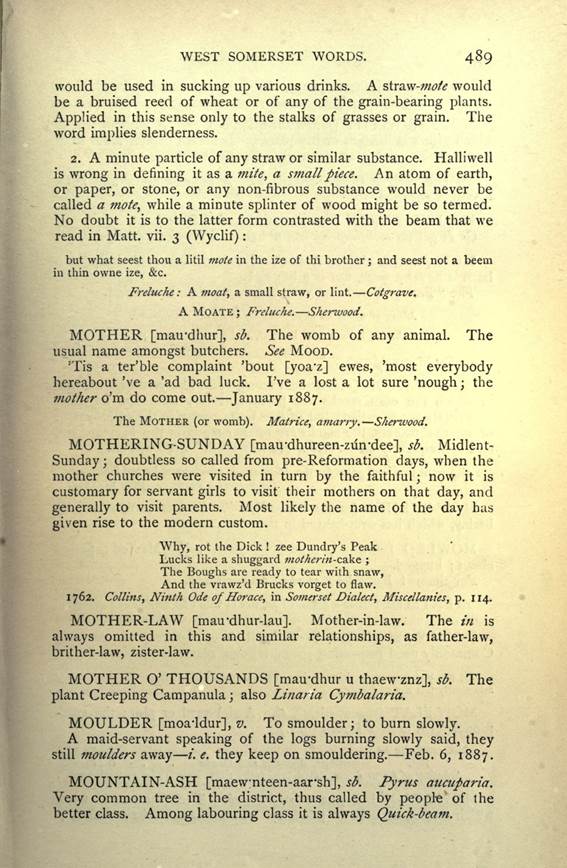
(delwedd B9349) (tudalen 489)
|
WEST SOMERSET WORDS. 489
would be used in sucking up various drinks. A straw-mate would be a bruised reed of wheat or of any of the
grain-bearing plants. Applied in this
sense only to the stalks of grasses or grain. The word implies slenderness.
2. A minute particle of any straw or similar substance. Halliwell is wrong in denning it as a mite, a small
piece. An atom of earth, or paper, or
stone, or any non-fibrous substance would never be called a mote, while a minute splinter of
wood might be so termed. No doubt it
is to the latter form contrasted with the beam that we read in Matt. vii. 3 (Wyclif):
but what seest thou a litil mote in the ize of thi brother; and seest not a
beem in thin owne ize, &c.
Freluche: A moat, a small straw, or lint. Cotgrave. A Mo ATE; Freluche. Sherwood.
MOTHER [mairdhur], sb. The womb of any animal. The usual name amongst butchers. See MOOD.
'Tis a ter'ble complaint 'bout [yoa'z] ewes, 'most everybody hereabout 've a 'ad bad luck. I've a lost a
lot sure 'nough; the mother o'm do
come out. January 1887.
The MOTHER (or womb). Matrice, amarry. Sherwood.
MOTHERING-SUNDAY [mairdhureen-ziiirdee], sb. Midlent-Sunday; doubtless so
called from pre-Reformation days, when the
mother churches were visited in turn by the faithful; now it is customary for servant girls to visit their
mothers on that day, and generally to
visit parents. Most likely the name of the day has given rise to the modern custom.
Why, rot the Dick! zee Dundry's Peak
Lucks like a shuggard tnotheriri-aikt;
The Boughs are ready to tear with snaw, And the vrawz'd Brucks vorget to flaw. 1762. Collins , Ninth Ode of Horace, in
Somerset Dialect, Miscellanies, p. 114.
MOTHER-LAW [mairdhur-lau]. Mother-in-law. The in is always omitted in this and similar
relationships, as father-law,
brither-law, zister-law.
MOTHER O' THOUSANDS [mairdhur u thaewznz], sb. The plant Creeping Campanula; also Linaria
Cymbalaria.
MOULDER [moa'ldur], v. To smoulder; to burn slowly. A maid-servant speaking of the logs burning
slowly said, they still moulders away
/*. e. they keep on smouldering. Feb. 6, 1887.
MOUNTAIN-ASH [maewnteen-aarsh], sb. Pyrus ancuparia. Very common tree in the district, thus
called by people of the better class.
Among labouring class it is always Quick-beam.
|
|
|
|
|
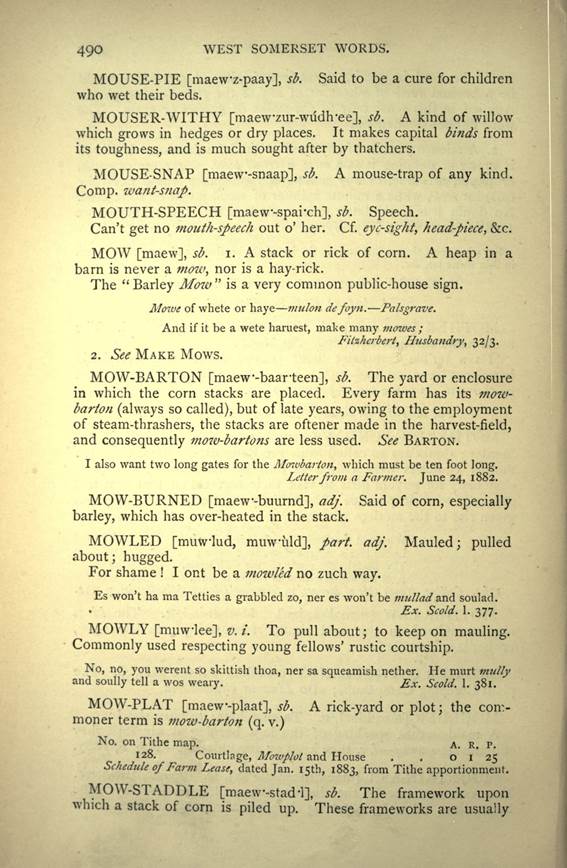
(delwedd B9350) (tudalen 490)
|
490 WEST SOMERSET WORDS.
MOUSE-PIE [maewz-paay], sb. Said to be a cure for children who wet their beds.
MOUSER- WITHY [maewzur-wiidrree], sb. A kind of willow which grows in hedges or dry places. It
makes capital binds from its
toughness, and is much sought after by thatchers.
MOUSE-SNAP [maew-snaap], sb. A mouse-trap of any kind. Comp. want-snap.
MOUTH-SPEECH [maew-spai-ch], sb. Speech.
Can't get no mouth-speech out o' her. Cf. eye-sight, head-piece, &c.
MOW [maew], sb. i. A stack or rick of corn. A heap in a barn is never a mow, nor is a hay-rick.
The” Barley Mow” is a very common public-house sign.
Mowe of whete or haye mulon defoyn. Palsgrave.
And if it be a wete haruest, make many mowes;
Fitzherbert, Husbandry, 32/3.
2. See MAKE Mows.
MOW-BARTON [maew-baarteen], sb. The yard or enclosure in which the corn stacks are placed. Every
farm has its mow-barton (always so called), but of late years, owing to the
employment of steam-thrashers, the
stacks are oftener made in the harvest-field,
and consequently mow-bartons are less used. See BARTON.
I also want two long gates for the Moivbarton, which must be ten foot long.
Letter from a Farmer. June 24, 1882.
MOW-BURNED [maew-buurnd], adj. Said of corn, especially barley, which has over-heated in the stack.
MOWLED [muvvlud, muwuld], part. adj. Mauled; pulled about; hugged.
For shame! I out be a mowled no zuch way.
Es won't ha ma Tetties a grabbled zo, ner es won't be mnl/ad and soulad.
Ex. Scold. 1. 377.
^ MOWLY [muwlee], v. i. To pull about; to keep on mauling. Commonly used respecting young fellows'
rustic courtship.
No, no, you werent so skittish thoa, ner sa squeamish nether. He murt
imilly and soully tell a wos weary.
Ex. Scold. 1. 381.
MOW-PLAT [maew-plaat], sb. A rick-yard or plot; the commoner term is
mow-barton (q. v.)
No. on Tithe map. A. R. P.
128. Courtage, Mowplot and House . . o i 25
Schedule of Farm Lease, dated Jan. I5th, 1883, from Tithe apportionment.
MOW-STADDLE [maew-stad'l], sb. The framework upon which a stack of corn is piled up. These
frameworks are usually
|
|
|
|
|
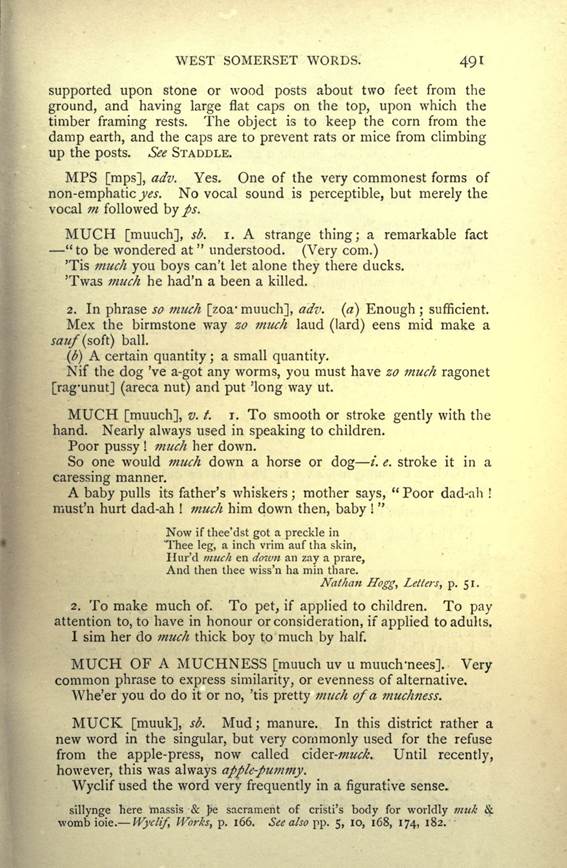
(delwedd B9351) (tudalen 491)
|
WEST SOMERSET WORDS. 49 1
supported upon stone or wood posts about two feet from the ground, and having large flat caps on the
top, upon which the timber framing
rests. The object is to keep the corn from the damp earth, and the caps are to prevent
rats or mice from climbing up the
posts. See STADDLE.
MPS [mps], adv. Yes. One of the very commonest forms of non-emphatic yes. No vocal sound is
perceptible, but merely the vocal m
followed by ps.
MUCH [muuch], sb. i. A strange thing; a remarkable fact "to be wondered at” understood. (Very
com.) 'Tis much you boys can't let
alone they there ducks. 'Twas much he
had'n a been a killed.
2. In phrase so much [zoa* muuch], adv. (a] Enough; sufficient.
Mex the birmstone way zo much laud (lard) eens mid make a sauf(soft) ball.
(b) A certain quantity; a small quantity.
Nif the dog Ve a-got any worms, you must have zo much ragonet [rag'unut] (areca nut) and put 'long way
ut.
MUCH [muuch], v. /. i. To smooth or stroke gently with the hand. Nearly always used in speaking to
children.
Poor pussy! much her down.
So one would much down a horse or dog i. e. stroke it in a caressing manner.
A baby pulls its father's whiskers; mother says,” Poor dad-ah! must'n hurt dad-ah! much him down then,
baby!”
Now if thee'dst got a preckle in Thee
leg, a inch vrim auf tha skin, Hur'd much
en down an zay a prare, And then thee
wiss'n ha min thare.
Nathan Hogg, Letters, p. 51.
2. To make much of. To pet, if applied to children. To pay attention to, to have in honour or
consideration, if applied to adults, I
sim her do much thick boy to much by half.
MUCH OF A MUCHNESS [muuch uv u muuch'nees]. Very common phrase to express similarity, or
evenness of alternative. Whe'er you do
do it or no, 'tis pretty much of a muchness.
MUCK [muuk], sb. Mud; manure. In this district rather a new word in the singular, but very commonly
used for the refuse from the
apple-press, now called ci&zi-muck. Until recently, however, this was always apple-pummy.
Wyclif used the word very frequently in a figurative sense.
sillynge here massis & )>e sacrament of cristi's body for worldly muk
& \vombioie. Wyclif, Works, p.
166. See also pp. 5, 10, 168, 174, 182.
|
|
|
|
|
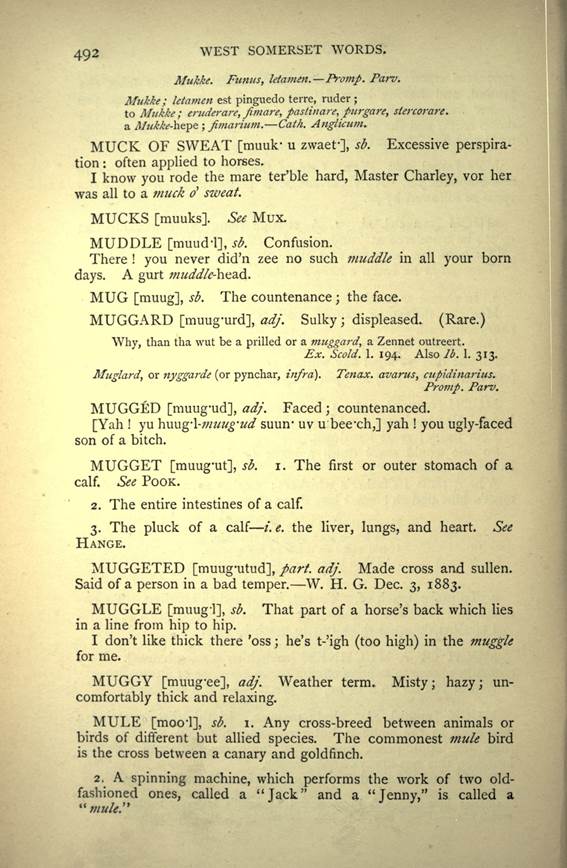
(delwedd B9352) (tudalen 492)
|
492 WEST SOMERSET WORDS.
Mukke. Fumts, letamen.Promp. Parv.
Mnkke; ktamen est pinguedo terre, ruder;
to Mukke; eniderare, fimare, pastinare, purgare, stercorare.
a Mukke-hzipe; fimarium. Cath. Anglicum.
MUCK OF SWEAT [muuk- u zwaef], sb. Excessive
perspiration: often applied to horses.
I know you rode the mare ter'ble hard, Master Charley, vor her was all to a muck tf sweat.
MUCKS [muuks]. See Mux.
MUDDLE [muud-l], sb. Confusion.
There! you never did'n zee no such muddle in all your born days. A gurt muddle-head.
MUG [muug], sb. The countenance; the face.
MUGGARD [muug-urd], adj. Sulky; displeased. (Rare.)
Why, than tha wut be a prilled or a muggard, a Zennet outreert.
Ex. Scold. 1. 194. Also Ib. 1. 313.
Milliard, or nyggarde (or pynchar, infra). Tenax. avarus, cupidinarius.
Pronip. Parv.
MUGGED [muug-ud], adj. Faced; countenanced.
[Yah! yu \\\\\\g\-muug'ud suuir uv u bee'ch,] yah! you ugly-faced son of a bitch.
MUGGET [muug'ut], sb. i. The first or outer stomach of a calf. See POOK.
2. The entire intestines of a calf.
3. The pluck of a calf i.e. the liver, lungs, and heart. See HANGE.
MUGGETED [muug-utud], part. adj. Made cross and sullen. Said of a person in a bad temper. W. H. G.
Dec. 3, 1883.
MUGGLE [muug-1], sb. That part of a horse's back which lies in a line from hip to hip.
I don't like thick there 'oss; he's t-'igh (too high) in the muggle for me.
MUGGY [muug'ee], adj. Weather term. Misty; hazy; uncomfortably thick and
relaxing.
MULE [moo'l], sb. i. Any cross-breed between animals or birds of different but allied species. The
commonest mule bird is the cross
between a canary and goldfinch.
2, A spinning machine, which performs the work of two old-fashioned ones,
called a "Jack" and a” Jenny," is called a "*&."
|
|
|
|
|
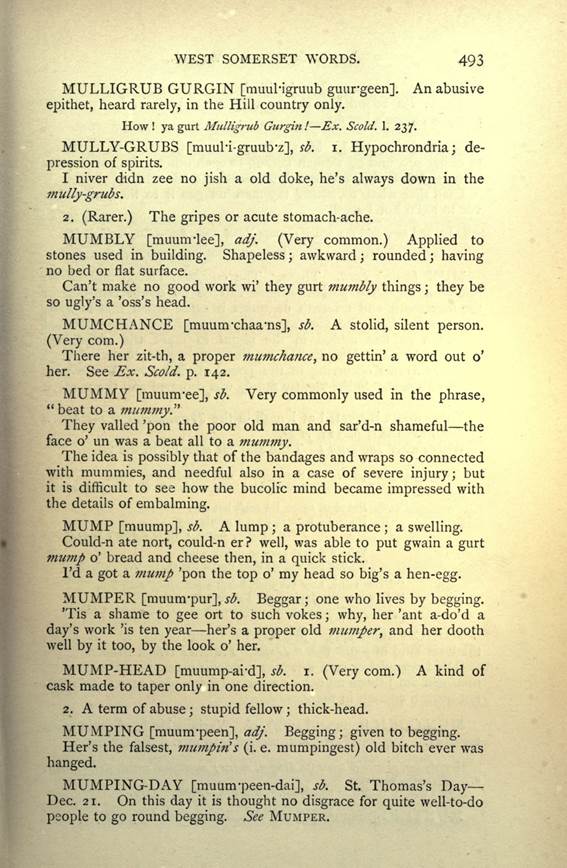
(delwedd B9353) (tudalen 493)
|
WEST SOMERSET WORDS. 493
MULLIGRUB GURGIN [muuHgruub guurgeen]. An abusive epithet, heard rarely, in the Hill country
only.
How! ya gurt Mulligrub Gurgin!Ex. Scold. 1. 237.
MULLY-GRUBS [muuH-gruub'z], sb. i. Hypochrondria; depression of spirits.
I niver didn zee no jish a old doke, he's always down in the mully-grubs.
2. (Rarer.) The gripes or acute stomach-ache.
MUMBLY [muunvlee], adj. (Very common.) Applied to stones used in building. Shapeless;
awkward; rounded; having no bed or
flat surface.
Can't make no good work wi' they gurt mumbly things; they be so ugly's a 'oss's head.
MUMCHANCE [muunvchaa'ns], sb. A stolid, silent person. (Very com.)
There her zit-th, a proper mumchance, no gettin' a word out o' her. See Ex. Scold, p. 142.
MUMMY [muunree], sb. Very commonly used in the phrase, “beat to a
mummy."
They vailed 'pon the poor old man and sar'd-n shameful the face o' un was a beat all to a mummy.
The idea is possibly that of the bandages and wraps so connected with mummies, and needful also in a case of
severe injury; but it is difficult to
see how the bucolic mind became impressed with the details of embalming.
MUMP [muump], sb. A lump; a protuberance; a swelling. Could-n ate nort, could-n er? well, was
able to put gwain a gurt mump o' bread
and cheese then, in a quick stick.
I'd a got a mump 'pon the top o' my head so big's a hen-egg.
MUMPER [muunrpur], sb. Beggar; one who lives by begging.
'Tis a shame to gee ort to such vokes; why, her 'ant a-do'd a day's work 'is ten year her's a proper old
mumper, and her dooth well by it too,
by the look o' her.
MUMP-HEAD [muump-ai-d], sb. i. (Very com.) A kind of cask made to taper only in one direction.
2. A term of abuse; stupid fellow; thick-head.
MUMPING [muunrpeen], adj. Begging; given to begging. Her's the falsest, mumpiris (i. e.
mumpingest) old bitch ever was hanged.
MUMPING-DAY [muunvpeen-dai], sb. St. Thomas's Day Dec. 21. On this day it is thought no
disgrace for quite well-to-do people
to go round begging. See MUMPER.
|
|
|
|
|
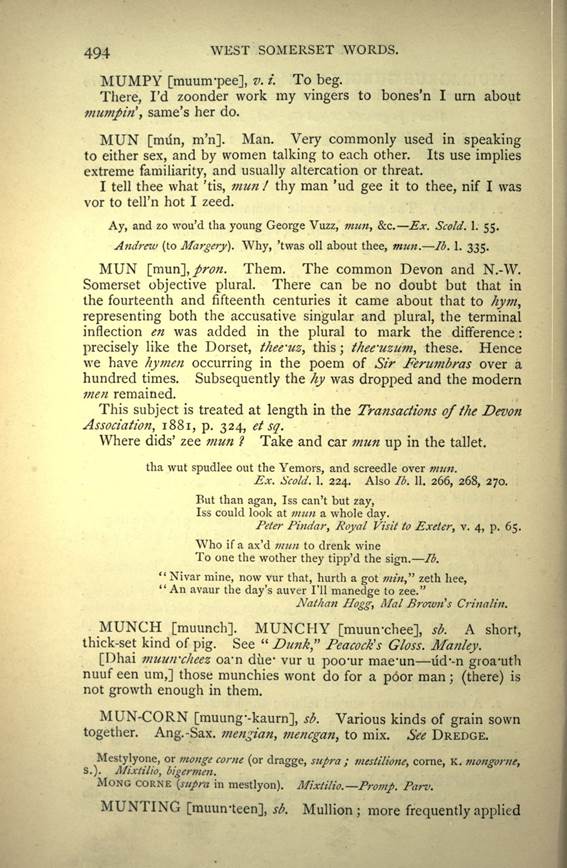
(delwedd B9354) (tudalen 494)
|
494 WEST SOMERSET WORDS.
MUMPY [muunrpee], v. i. To beg.
There, I'd zoonder work my vingers to bones'n I urn about mumpiri , same's her do.
MUN [mun, m'n]. Man. Very commonly used in speaking to either sex, and by women talking to each
other. Its use implies extreme
familiarity, and usually altercation or threat.
I tell thee what 'tis, mun! thy man 'ud gee it to thee, nif I was vor to tell'n hot I zeed.
Ay, and zo wou'd tha young George Vuzz, mun, &c. Ex. Scold. 1. 55. Andrew (to Margery]. Why, 'twas oil about
thee, mun. Ib. 1. 335.
MUN \m\m~\, pron. Them. The common Devon and N.-W. Somerset objective plural. There can be no
doubt but that in the fourteenth and
fifteenth centuries it came about that to hym, representing both the accusative singular
and plural, the terminal inflection en
was added in the plural to mark the difference: precisely like the Dorset, thee'uz, this;
thee-uzum, these. Hence we have hymen
occurring in the poem of Sir JFerumbras over a hundred times. Subsequently the hy was
dropped and the modern men remained.
This subject is treated at length in the Transactions of the Devon Association, 1881, p. 324, et sq.
Where dids' zee mun? Take and car mun up in the tallet.
tha wut spudlee out the Yemors, and screed le over mun.
Ex. Scold. 1. 224. Also Ib. 11. 266, 268, 270.
But than agan, Iss can't but zay, Iss
could look at imm a whole day.
Peter Pindar, Royal Visit to Exeter, v. 4, p. 65.
Who if a ax'd mun to drenk wine
To one the wother they tipp'd the sign. Ib.
" Nivar mine, now vur that, hurth a got mm," zeth hee, "An avaur the day's auver I'll manedge
to zee."
Nathan Hogg, Mai Brown 's Crinalin.
MUNCH [muunch]. MUNCHY [muuirchee], sb. A short, thick-set kind of pig. See” Dunk"
Peacocks Gloss. Manley.
[Dhai muutrcheez oa'n due- vur u poo'ur mae'un lid'-n groa'uth nuuf een um,] those munchies wont do for a
p6or man; (there) is not growth enough
in them.
M UN-CORN [mining --kaurn], sb. Various kinds of grain sown together. Ang.-Sax. median, mencgan, to
mix. See DREDGE.
Mestylyone, or monge corne (or dragge, supra; mestilione, corne, K. mongorne, S.). Alixtilio, bigermen.
MONO CORNE (supra in mestlyon). Mixtilio. Promp. Parv.
MUNTING [mumrteen], sb. Mullion; more frequently applied
|
|
|
|
|
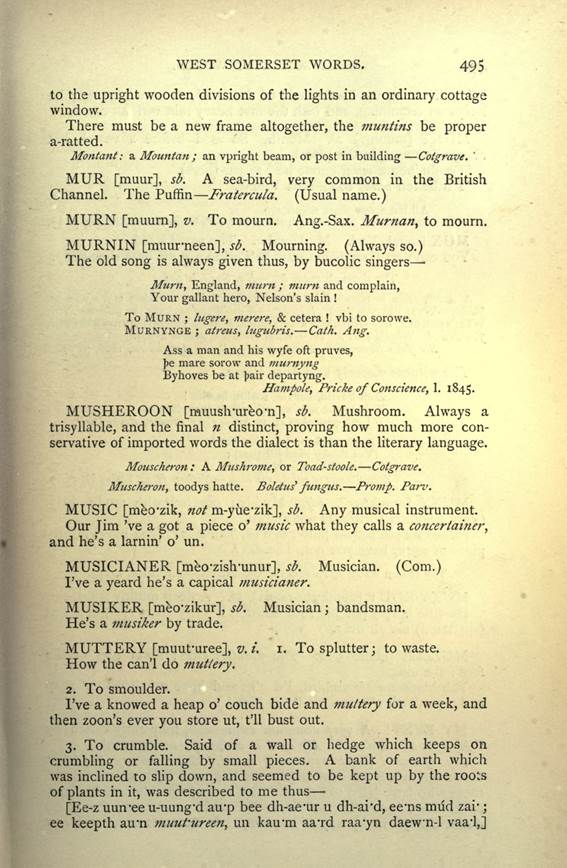
(delwedd B9355) (tudalen 495)
|
WEST SOMERSET WORDS.
495
to the upright wooden divisions of the lights
in an ordinary cottage window.
There must be a new frame altogether, the muntins be proper a-ratted.
Montant: a Mountan; an vpright beam, or post in building Cotgrave. '
MUR [muur], sb. A sea-bird, very common in the British Channel. The Puffin Fratercula. (Usual
name.)
MURN [muum], v. To mourn. Ang.-Sax. Murnan^ to mourn.
MURNIN [muurneen], sb. Mourning. (Always so.)
The old song is always given thus, by bucolic singers
Murn y England, murn; murn and complain,
Your gallant hero, Nelson's slain!
To MURN; lugere, merere, & cetera! vbi to sorovve. MURNYNGE; atreus, lugubris. Cath. Ang.
Ass a man and his wyfe oft pruves,
J>e mare sorow and murnyng
Byhoves be at ]>air departyng.
Hampole, Pricke of Conscience, 1. 1845.
MUSHEROON [muuslrureo'n], sb. Mushroom. Always a trisyllable, and the final n distinct,
proving how much more conservative of imported words the dialect is than the
literary language.
Mouse heron: A Mushrome, or Toad-stoole. Cotgrave. Muscheron, toodys hatte. Boletus 1 fungus.
Prom p. Parv.
MUSIC [meo'zik, not m-yue'zik], sb. Any musical instrument. Our Jim Ve a got a piece o' music what they
calls a concertainer, and he's a
larnin' o' un.
MUSICIANER [meo-zish-unur], sb. Musician. (Com.) I've a yeard he's a capical musidaner.
MUSIKER [meo'zikur], sb. Musician; bandsman.
He's a musiker by trade.
MUTTERY [muufuree], v. i. i. To splutter; to waste. How the can'l do muttery.
2. To smoulder.
I've a knowed a heap o' couch bide and muttery for a week, and then zoon's ever you store ut, t'll bust
out.
3. To crumble. Said of a wall or hedge which keeps on crumbling or falling by small pieces. A
bank of earth which was inclined to
slip down, and seemed to be kept up by the roots of plants in it, was described to me thus
[Ee-z uun'ee u-uung'd au'p bee dh-ae'ur u dh-ai'd, ee'ns mud zai'; ee keepth airn muut'ureen, un kau'm aa'rd
raa'yn daewn-1 vaa 1!,]
|
|
|
|
|
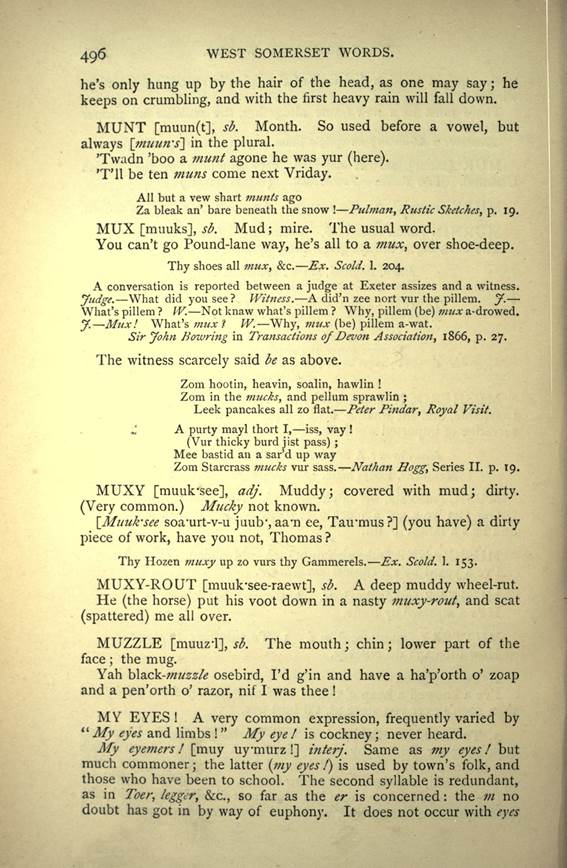
(delwedd B9356) (tudalen 496)
|
496 WEST SOMERSET WORDS.
he's only hung up by the hair of the head, as one may say; he keeps on crumbling, and with the first
heavy rain will fall down.
MUNT [muun(t], sb. Month. So used before a vowel, but always {muun's} in the plural.
'Twadn 'boo a munt agone he was yur (here).
'Til be ten muns come next Vriday.
All but a vew shart munts ago
Za bleak an' bare beneath the snow! Pulman, Rustic Sketches, p. 19.
MUX [muuks], sb. Mud; mire. The usual word.
You can't go Pound-lane way, he's all to a mux, over shoe-deep.
Thy shoes all mux, &c. Ex. Scold. 1. 204.
A conversation is reported between a judge at Exeter assizes and a
witness. Judge. What did you see?
Witness. A did'n zee nort vur the pillem. J.
What's pillem? W. Not knaw what's pillem? Why, pillem (be) mux
a-drowed. J.Mnx! What's nmx? W. Why,
nmx (be) pillem a-wat.
Sir John Bowring in Transactions of Devon Association, 1 866, p. 27.
The witness scarcely said be as above.
Zom hootin, heavin, soalin, hawlin!
Zom in the mucks, and pellum sprawlin;
Leek pancakes all zo flat. Peter Pindar, Royal Visit.
J A purty mayl thort I, iss, vay!
(Vur thicky burd jist pass); Mee
bastid an a sar'd up way Zom Starcrass
mucks vur sass. Nathan Hogg, Series II. p. 19.
MUXY [muuk-see], adj. Muddy; covered with mud; dirty. (Very common.) Mucky not known.
\Muuk' ste soa'urt-v-u juub', aa - n ee, Tau'mus?] (you have) a dirty piece of work, have you not, Thomas?
Thy Hozen muxy up zo vurs thy Gammerels. Ex. Scold. 1. 153.
MUXY-ROUT [muuk'see-raewt], sb. A deep muddy wheel-rut. He (the horse) put his voot down in a nasty
muxy-rout, and scat (spattered) me all
over.
MUZZLE [muuz'l], sb. The mouth; chin; lower part of the face; the mug.
Yah b\a.ck-muzzte osebird, I'd g'in and have a ha'p'orth o' zoap and a pen'orth o' razor, nif I was thee!
MY EYES! A very common expression, frequently varied by “My eyes and limbs!”
My eye / is cockney; never heard.
My eyemers / [muy uymurz!] interj. Same as my eyes / but much commoner; the latter (my eyes /) is
used by town's folk, and those who
have been to school. The second syllable is redundant, as in Toer, leggcr, &c., so far as the
er is concerned: the;;/ no doubt has
got in by way of euphony. It does not occur with eyes
|
|
|
|
|
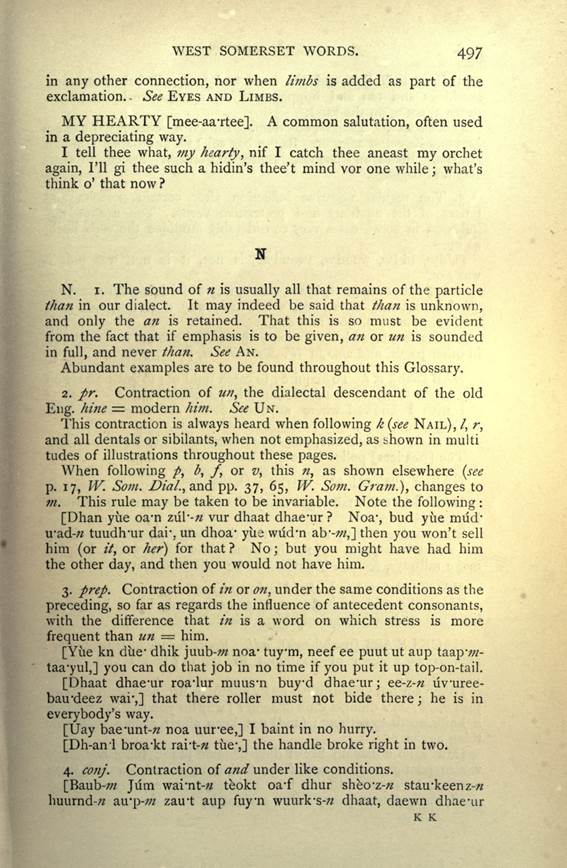
(delwedd B9357) (tudalen 497)
|
WEST SOMERSET WORDS. 497
in any other connection, nor when limbs is added as part of the exclamation. See EYES AND LIMBS.
MY HEARTY [mee-aa'rtee]. A common salutation, often used in a depreciating way.
I tell thee what, my hearty, nif I catch thee aneast my orchet again, I'll gi thee such a hidin's thee't mind
vor one while; what's think o' that
now?
N
N. i. The sound of n is usually all that remains of the particle than in our dialect. It may indeed be said
that than is unknown, and only the an
is retained. That this is so must be evident
from the fact that if emphasis is to be given, an or un is
sounded in full, and never than. See
AN.
Abundant examples are to be found throughout this Glossary.
2. pr. Contraction of un, the dialectal descendant of the old Eng. hine = modern him. See UN.
This contraction is always heard when following k (see NAIL), /, r, and all dentals or sibilants, when not
emphasized, as shown in multi tudes of
illustrations throughout these pages.
When following p, b, f, or v, this n, as shown elsewhere (see p. 17, W. Som. Dial, and pp. 37, 65, W.
Som. Gram.}, changes to m. This rule
may be taken to be invariable. Note the following:
[Dhan yue oa'n ziil'- vur dhaat dhae'ur? Noa', bud yue mud' irad- tuudh'ur dai\ un dhoa* yiis wiid'n ab
-/,] then you won't sell him (or it,
or her) for that? No; but you might have had him the other day, and then you would not have
him.
3. prep. Contraction of in or on, under the same conditions as the preceding, so far as regards the influence
of antecedent consonants, with the
difference that in is a word on which stress is more frequent than un = him.
[Yue kn due- dhik juub-w noa- tuym, neef ee puut ut aup taapv;/-taa'yul,] you
can do that job in no time if you put it up top-on-tail.
[Dhaat dhae'ur roa'lur muus'n buyd dhae'ur; ee-z- livuree-bau'deez war,] that
there roller must not bide there; he is in
everybody's way.
[Uay bae'unt-^ noa uuree,] I baint in no hurry.
[Dh-anl broa'kt rai't- rue',] the handle broke right in two.
4. conj. Contraction of and under like conditions.
[Baub-;;z Jum warnt-# teokt oa'f dhur sheo'z- stau'keenz-^ huurnd-w airp-;# zau-t aup fuyn wuurk's-;?
dhaat, daewn dhae'ur
K K
|
|
|
|
|
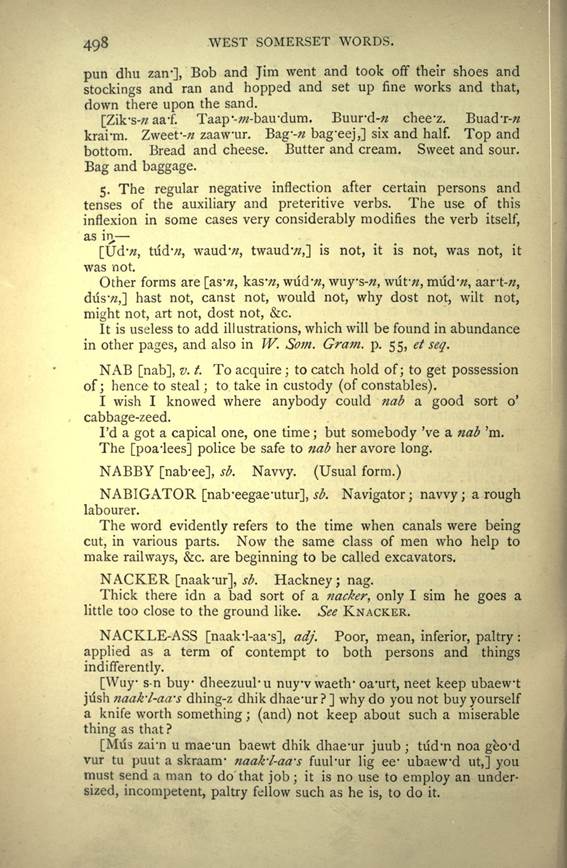
(delwedd B9358) (tudalen 498)
|
498 WEST SOMERSET WORDS.
pun dim zarr], Bob and Jim went and took off their shoes and stockings and ran and hopped and set up
fine works and that, down there upon
the sand.
[Zik's-n aaf. Taap'-w-bau'dum. Buurd-;z chee'z. Buad'r-^ krai-m. Zweet'-n zaawur. Bag'- bag'eej,]
six and half. Top and bottom. Bread
and cheese. Butter and cream. Sweet and sour.
Bag and baggage.
5. The regular negative inflection after certain persons and tenses of the auxiliary and preteritive
verbs. The use of this inflexion in
some cases very considerably modifies the verb itself, as in,
[\Jd-n, tiidvz, waudvz, twaudvz,] is not, it is not, was not, it was not.
Other forms are [as'72, kasvz, wiidvz, wuys-, wiit', rniid'^, aart-;z, diisvz,] hast not, canst not, would not,
why dost not, wilt not, might not, art
not, dost not, &c.
It is useless to add illustrations, which will be found in abundance in other pages, and also in W. Som. Gram.
p. 55, et seq.
NAB [nab], v. t. To acquire; to catch hold of; to get possession of; hence to steal; to take in custody (of
constables).
I wish I knowed where anybody could nab a good sort o' cabbage-zeed.
I'd a got a capical one, one time; but somebody Ve a nab 'm.
The [poa'lees] police be safe to nab her avore long.
NABBY [nab-ee], sb. Navvy. (Usual form.)
NABIGATOR [nab'eegae'utur], sb. Navigator; navvy; a rough labourer.
The word evidently refers to the time when canals were being cut, in various parts. Now the same class
of men who help to make railways,
&c. are beginning to be called excavators.
N ACKER [naak'ur], sb. Hackney; nag.
Thick there idn a bad sort of a nacker, only I sim he goes a little too close to the ground like. See
KNACKER.
NACKLE-ASS [naak'1-aa's], adj. Poor, mean, inferior, paltry: applied as a term of contempt to both
persons and things indifferently.
[Wuy s-n buy dheezuul'u nuyv waeth' oa'urt, neet keep ubaewt jtish naak'l-aa's dhing-z dhik dhae'ur? ]
why do you not buy yourself a knife
worth something; (and) not keep about such a miserable thing as that?
[Mils zai'n u mae'un baewt dhik dhae'ur juub; tiid'n noa geo'd vur tu puut a skraanv naak'l-aa's fuul'ur
lig ee' ubaewd ut,] you must send a
man to do that job; it is no use to employ an under-sized, incompetent,
paltry fellow such as he is, to do it.
|
|
|
|
|
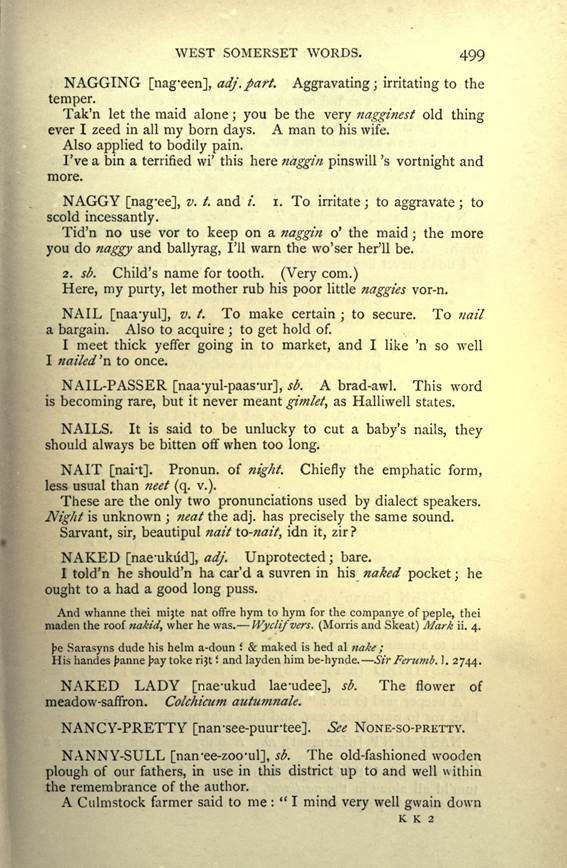
(delwedd B9359) (tudalen 499)
|
WEST SOMERSET WORDS. 499
NAGGING [nag'een], adj. part. Aggravating; irritating to the temper.
Tak'n let the maid alone; you be the very nagginest old thing ever I zeed in all my born days. A man to
his wife.
Also applied to bodily pain.
I've a bin a terrified wi' this here naggin pins will 's vortnight and more.
NAGGY [nag-ee], v. t. and /". i. To irritate; to aggravate; to scold incessantly.
Tid'n no use vor to keep on a naggin o' the maid; the more you do naggy and ballyrag, I'll warn the
wo'ser her'll be.
2. sb. Child's name for tooth. (Very com.)
Here, my purty, let mother rub his poor little naggies vor-n.
NAIL [naa-yul], v. t. To make certain; to secure. To nail a bargain. Also to acquire; to get hold of.
I meet thick yeffer going in to market, and I like 'n so well I nailed 'n to once.
NAIL-PASSER [naa-yul-paas-ur], sb. A brad-awl. This word is becoming rare, but it never meant
gimlet, as Halliwell states.
NAILS. It is said to be unlucky to cut a baby's nails, they should always be bitten off when too long.
NAIT [nai't]. Pronun. of night. Chiefly the emphatic form, less usual than neet (q. v.).
These are the only two pronunciations used by dialect speakers. Night is unknown; neat the adj. has
precisely the same sound.
Sarvant, sir, beautipui nait to-naif, idn it, zir?
NAKED [nae-ukud], adj. Unprotected; bare.
I told'n he should'n ha car'd a suvren in his naked pocket; he ought to a had a good long puss.
And whanne thei mijte nat ofifre hym to hym for the companye of peple,
thei madeu the roof nakid, wher he
was. Wyclifvers. (Morris and Skeat) Mark ii. 4.
f>e Sarasyns dude his helm a-doun ' & maked is hed al nake;
His handes Jeanne J?ay toke ri}t '. and layden him be-hynde. Sir Ferumb. 1.
2744.
NAKED LADY [nae-ukud lae-udee], sb. The flower of meadow-saffron. Colchicum autumnale.
NANCY-PRETTY [nairsee-puurtee]. See NONE-SO-PRETTY.
NANNY-SULL [nan'ee-zoo'ul], sb. The old-fashioned wooden plough of our fathers, in use in this
district up to and well \\ ithin the
remembrance of the author.
A Culmstock farmer said to me:” I mind very well gwain down
K K 2
|
.....









































































































































































































